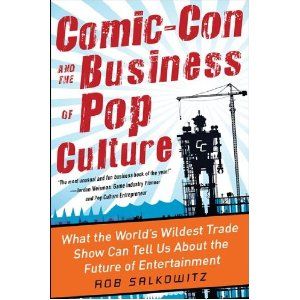
This past weekend, over 130,000 people descended on the San Diego Convention Center to take part in Comic-Con 2012. Each year, a growing amalgamation of costumed super heroes, comics geeks, sci-fi enthusiasts and die-hard fans of more mainstream entertainment pop culture mix together to celebrate and share the popular arts. Some are there to observe, some to find future employment and others to do business, as beautifully depicted in this year’s Morgan Spurlock documentary Comic-Con Episode IV: A Fan’s Hope. But Comic-Con San Diego is more than just a convention or a pop culture phenomenon. It is a symbol of the big business that comics and transmedia pop culture has become. It is a harbinger of future profits in the entertainment industry, which often uses Comic-Con to gauge buzz about releases and spot emerging trends. And it is also a cautionary tale for anyone working at the intersection of television, film, video games and publishing about the meteoric rise of an industry and the uncertainty of where it goes next. We review Rob Salkowitz’s new book Comic-Con and the Business of Pop Culture, an engaging insider perspective on the convergence of geekdom and big business.
Comic-Con wasn’t always the packed, “see and be seen” cultural juggernaut it’s become, as Salkowitz details in the early chapters of his book. In fact, 43 years ago, when the first Con was held at the US Grant hotel in San Diego, led by the efforts of comics superfan Shel Dorf, only 300 people came! In its early days, Comic-Con was a casual place where the titans of comics publishers such as DC and Marvel would gather with fans and other semi-professional artists to exchange ideas and critique one another’s work in an intimate setting. In fact, Salkowitz, a long-time Con attendee who has garnered quite a few insider perks along the way over the years, recalls that his early days of attendance were not quite so harried and frantic. The audience for Comic-Con steadily grew until about 2000, when attendance began skyrocketing, to the point that it now takes over an entire American city for a week each year. Why did this happen? Salkowitz argues that this time period is when a quantum leap shift occurred away from comic books and towards comics culture, a platform that transcends graphic novels and traditional comic books and usurps the entertainment and business matrices of television, film, video games and other “mainstream” art. Indeed, when ScriptPhD last covered Comic-Con in 2010, even their slogan changed to “celebrating the popular arts,” a seismic shift in focus and attention. (This year, Con organizers made explicit attempts to explore the history and heritage partially in order to assuage purists who argue that the event has lost sight of its roots.) In theory, this meteoric rise is wonderful, right? With all that money flowing, everyone wins! Not so fast.
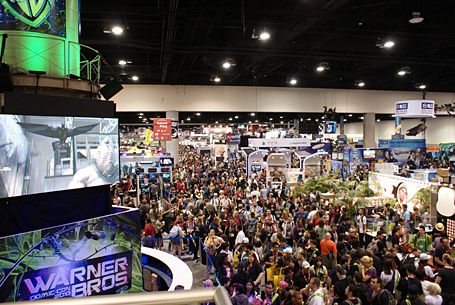
Lost amidst the pomp and circumstance of the yearly festivities is the fact that within this mixed array of cultural forces, there are cracks in the armor. For one thing, comics themselves are not doing well at all. For example, more than 70 million people bought a ticket to the 2008 movie The Dark Knight, but fewer than 70,000 people bought the July 2011 issue of Batman: The Dark Knight. Salkowitz postulates that we may be nearing the unimaginable: a “future of the comics industry that does not include comic books.” To unravel the backstory behind the upstaging of an industry at its own event, Salkowitz structures the book around the four days of the 2011 San Diego Comic-Con. In a rather clever bit of exposition, he weaves between four days of events, meetings, exclusive parties, panels of various size and one-on-one interactions to take the reader on a guided tour of Comic-Con, while in the process peeling back the layers of transmedia and business collaborations
that are the underbelly of the current “peak geek” saturation. A brief divergence to the downfall of the traditional publishing industry, including bookstores (the traditional sellers of comics), the reliance of comics on movie adaptations and the pitfalls of digital publication is a must-read primer for anyone wishing to work in the industry. Even more strapped are merchants that sell rare comics and collectibles on the convention floor. Often relegated to the side corners with famous comics artists so that entertainment conglomerates can occupy prime real estate on the floor, many dealers struggle just to break even. Among them are independent comics, self-published artists, and “alternative” comics, all hoping to cash in on the Comic-Con sweepstakes. Comics may be big business, but not for everyone. Forays into the world of grass-roots publishing, the microcosm of the yearly Eisner Awards for achievement in comics and the alternative con within a Con called Trickster (a more low-key networking event that harkens to the days of yore) all remind the reader of the tight-knit relationship that comics have with their fan base.
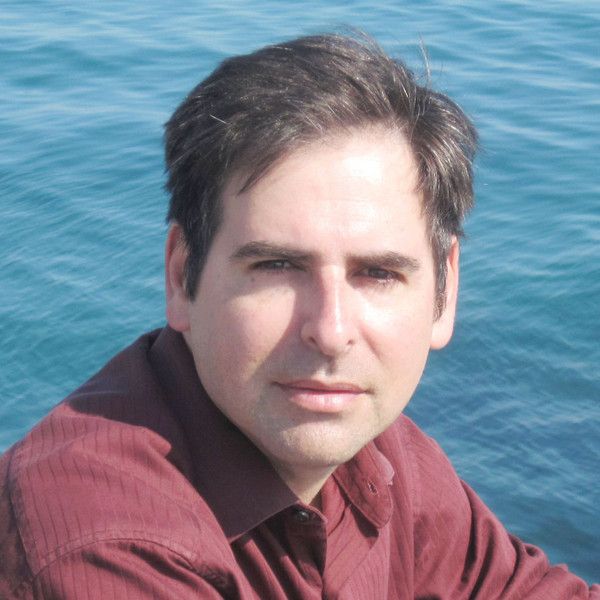
In many ways, the comics crisis that Salkowitz describes is not only very real, but difficult to resolve. The erosion of print media is unlikely to be reversed, nor is the penchant towards acquiring free content in the digital universe. Furthermore, video games, represent one of the biggest single-cause reasons for the erosion of comics in the last 20 years. Games such as Halo, Mass Effect, Grand Theft Auto and others, execute recurring linear storylines in a more cost-conscious three-dimensional interactive platform. On the other hand, there are also a myriad of reasons to be positive about the future of comics. The advent of tablets (notably the iPad) represents an unprecedented opportunity to re-establish comics’ popularity and distribution profits. Traditional and casual fans of comics haven’t gone anywhere, they’re just temporarily drowned out by the lines for the Twilight panel. A rising demographic of geek girls represents a potential growth segment in audience. And finally, a tremendous rise in popularity of traditional comics (even the classics) in global markets such as India and China portends a new global model for marketing and distribution. If superheroes are to continue as the mainstay of live-action media, the entertainment industry is highly dependent upon a viable, continued production of good stories. Movies need for comics to stay robust. The creativity and ingenuity that has been the hallmark of great comics continues to thrive with independent artists, some of whose work has gone viral and garnered publishing contracts.
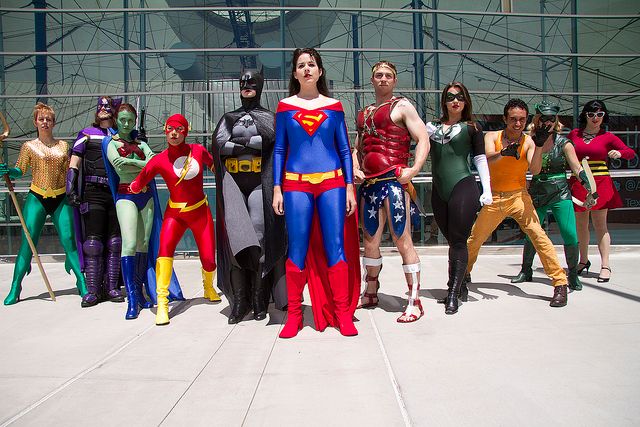
Make no mistake, comics fans and enthusiastic geeks. Comic-Con and the Business of Pop Culture is very much a business and brand strategy book, centered around a very trendy and chic brand. There’s no question that casual fans and people interested in the more technical side of comics transmedia will find it an interesting, if at times esoteric, read. But for those working in (or aspiring to) the intersection of comics and entertainment, it is an essential read. Cautioning both the entertainment and comics industries against complacency against what could be a temporary “gold rush” cultural phenomenon, Salkowitz nevertheless peppers the book with salient advice for sustaining comics-based entertainment and media, while fortifying traditional comics and their creative integrity for the next generation of fans. The final portion of the book is its strongest; a hypothetical journey several years into the future, utilizing what he calls “scenario planning” to prognosticate what might happen. Comic-Con (and all the business that it represents) might grow larger than ever, an absolute phenomenon, might scale back to account for a diminishing fan interest, might stay the same or fraction into a series of global events to account for the growing overseas interest in traditional comics. Which one will come to fruition depends on brand synergy, fan growth and engagement, distribution with digital and interactive media, and a carefully cultivated relationship between comics audiences, creators and publishers. Salkowitz calls Comic-Con a “laboratory in which the global future of media is unspooling in real time.” What will happen next? Like any good scientist knows, experiments, even under controlled circumstances, are entirely unpredictable. See you in San Diego next year!
Rob Salkowitz is the cofounder and Principal Consultant of Seattle-based MediaPlant LLC and is the author of two other books, Young World Rising and Generation Blend. He also teaches in the Digital Media program at the University of Washington. Follow Rob on Twitter.
~*ScriptPhD*~
*****************
ScriptPhD.com covers science and technology in entertainment, media and advertising. Hire our consulting company for creative content development.
Subscribe to free email notifications of new posts on our home page.
]]>
As Comic-Con winds down on the shortened Day 4, we conclude our coverage with two panels that exemplify what Comic-Con is all about. As promised, we dissect the “Comics Design” panel of the world’s top logo designers deconstructing their work, coupled with images of their work. We also bring you an interesting panel of ethnographers, consisting of undergraduate and graduate student, studying the culture and the varying forces that shape Comic-Con. Seriously, they’re studying nerds! Finally, we are delighted to shine our ScriptPhD.com spotlight on new sci-fi author Charles Yu, who presented his new novel at his first (of what we are sure are many) Comic-Con appearance. We sat down and chatted with Charles, and are pleased to publish the interview. And of course, our Day 4 Costume of the Day. Comic-Con 2010 (through the eyes of ScriptPhD.com) ends under the “continue reading” cut!
Comics Design

We are not ashamed to admit that here at ScriptPhD.com, we are secret design nerds. We love it, particularly since good design so often elevates the content of films, television, and books, but is a relatively mysterious process. One of THE most fascinating panels that we attended at Comic-Con 2010 was on the design secrets behind some of your favorite comics and book covers. A panel of the world’s leading designers revealed their methodologies (and sometimes failures) in the design process behind their hit pieces, lifting the shroud of secrecy that designers often envelop themselves in. An unparalleled purview into the mind of the designer, and the visual appeal that so often subliminally contributes to the success of a graphic novel, comic, or even regular book. We do, as it turns out, judge books by their covers.
As promised, we revisit this illuminating panel, and thank Christopher Butcher, co-founder of The Toronto Comic Arts Festival and co-owner of The Beguiling, Canada’s finest comics bookstore. Chris was kind enough to provide us with high-quality images of the Comics Design panel’s work, for which we at ScriptPhD.com are grateful. Chris had each of the graphic artists discuss their work with an example of design that worked, and design that didn’t (if available or so inclined). The artist was asked to deconstruct the logo or design and talk about the thought process behind it.
Mark Ciarello – (art + design director at DC Comics)
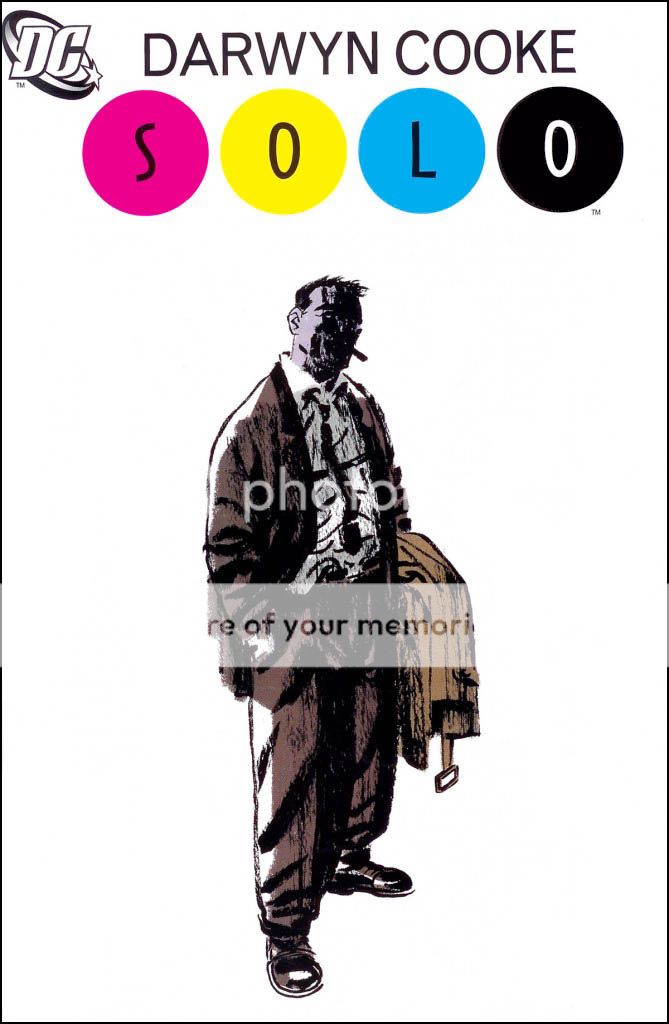
Mark chose to design the cover of this book with an overall emphasis on the individual artist. Hence the white space on the book, and a focus on the logo above the “solo” artist.
Adam Grano – (designer at Fantagraphics)
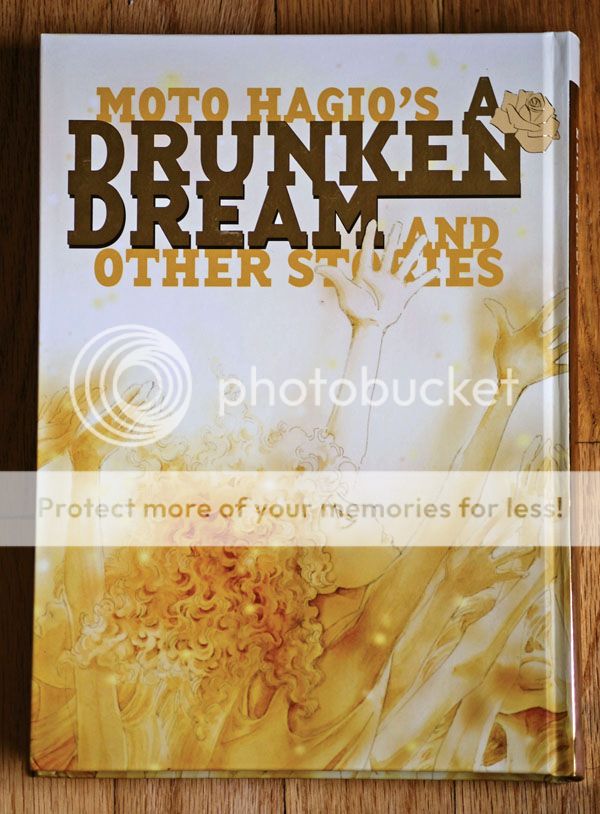
Adam took the title of this book quite literally, and let loose with his design to truly emphasize the title. He called it “method design.” He wanted the cover to look like a drunken dream.
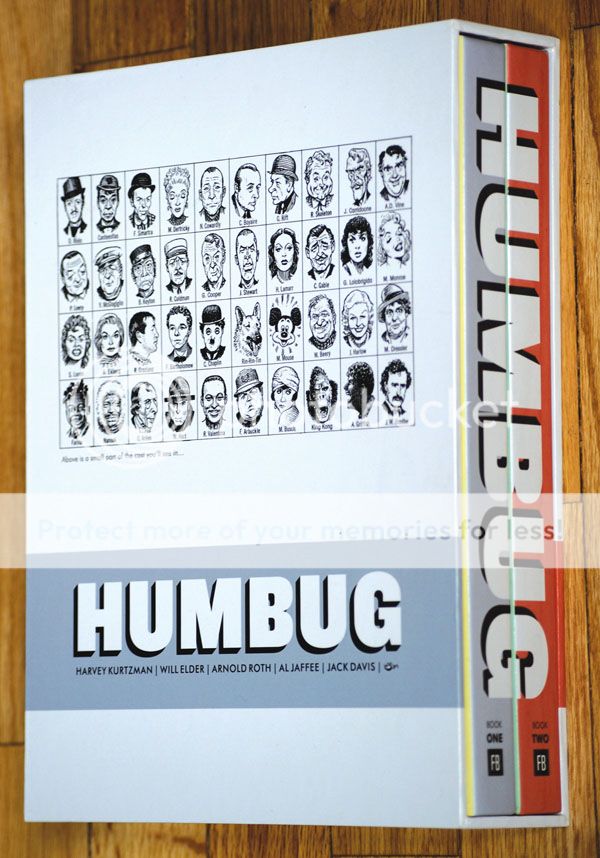
For the Humbug collection, Grano tried hard not to impress too much of himself (and his tastes) in the design of the cover. He wanted to inject simplicity in a project that would stand the test of time, because it was a collector’s series.
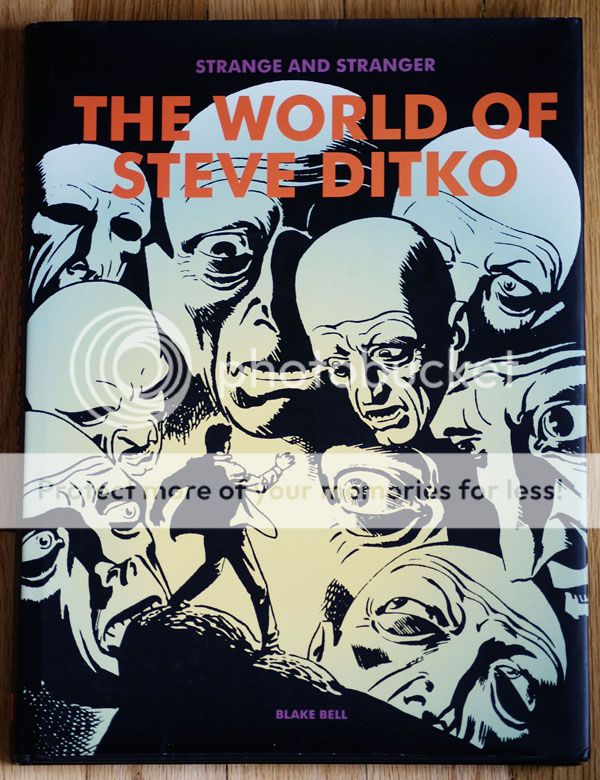
Grano considered this design project his “failure.” It contrasts greatly with the simplicity and elegance of Humbug. He mentioned that everyone on the page is scripted and gridded, something that designers try to avoid in comics.
Chip Kidd – (designer at Random House)
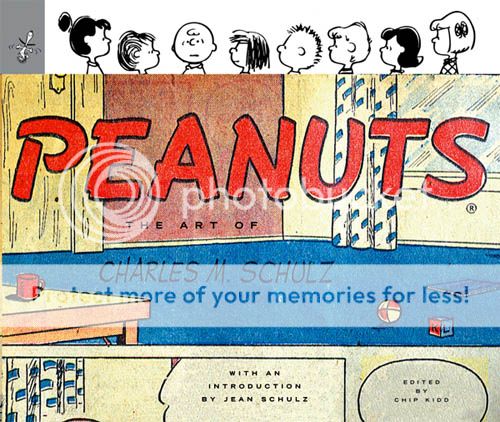
Chip Kidd had the honor of working on the first posthumous Peanuts release after Charles M. Schultz’s death, and took to the project quite seriously. In the cover, he wanted to deconstruct a Peanuts strip. All of the human element is taken out of the strip, with the characters on the cover up to their necks in suburban anxiety.
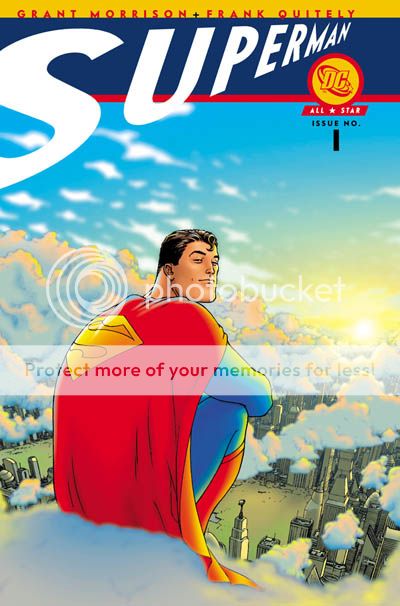
Kidd likes this cover because he considers it an updated spin on Superman. It’s not a classic Superman panel, so he designed a logo that deviated from the classic “Superman” logo to match.
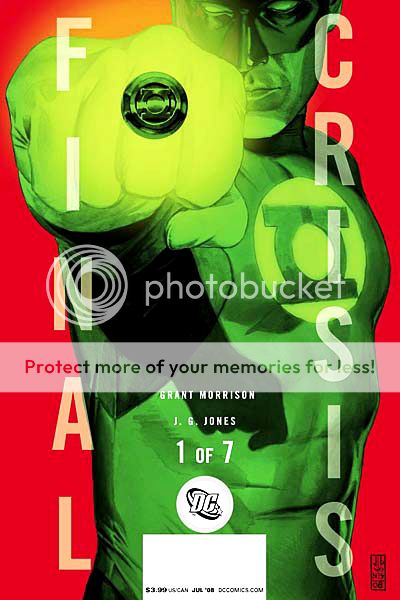
Kidd chose this as his design “failure”, but not the design itself. The cover represents one of seven volumes, in which the logo pictured disintegrates by the seventh issue, to match the crisis in the title. Kidd’s only regret here is that he was too subtle. He wishes he’d chosen to start the logo disintegration progression sooner, as there’s very little difference between the first few volumes.
Fawn Lau – (designer at VIZ)

Fawn was commissioned to redesign this book cover for an American audience. Keeping this in mind, and wanting the Japanese animation to be more legible for the American audience, she didn’t want too heavy-handed of a logo. In an utterly genius stroke of creativity, Lau went to an art store, bought $70 worth of art supplies, and played around with them until she constructed the “Picasso” logo. Clever, clever girl!
Mark Siegel – (First Second Books)
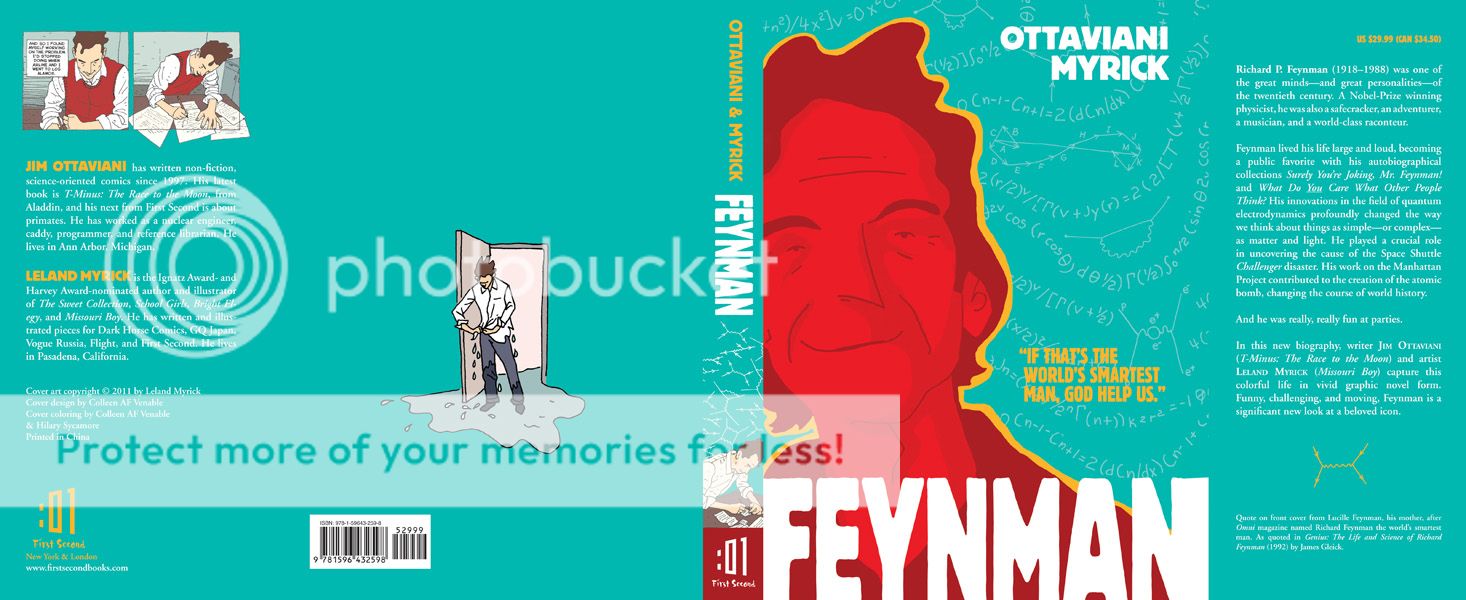
Mark Siegel was hired to create the cover of the new biography Feynman, an eponymous title about one of the most famous physicists of all time. Feynman was an amazing man who lived an amazing life, including a Nobel Prize in physics in 1965. His biographer, Ottaviani Myrick, a nuclear physicist and speed skating champion, is an equally accomplished individual. The design of the cover was therefore chosen to reflect their dynamic personalities. The colors were chosen to represent the atomic bomb and Los Alamos, New Mexico, where Feynman assisted in the development of The Manhattan Project. Incidentally, the quote on the cover – “If that’s the world’s smartest man, God help us!” – is from Feynman’s own mother.
Keith Wood – (Oni Press)
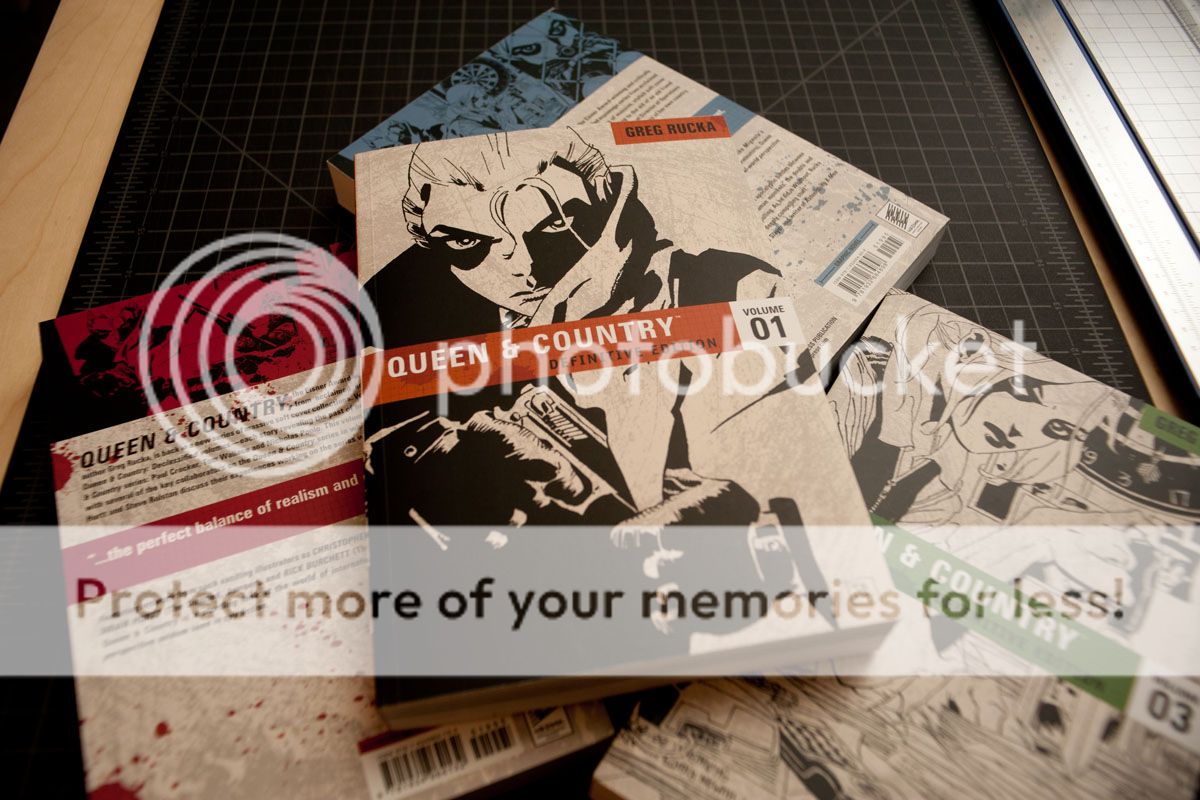
Wood remarked that this was the first time he was able to do design on a large scale, which really worked for this project. He chose a very basic color scheme, again to emphasize a collection standing the test of time, and designed all the covers simultaneously, including color schemes and graphics. He felt this gave the project a sense of connectedness.
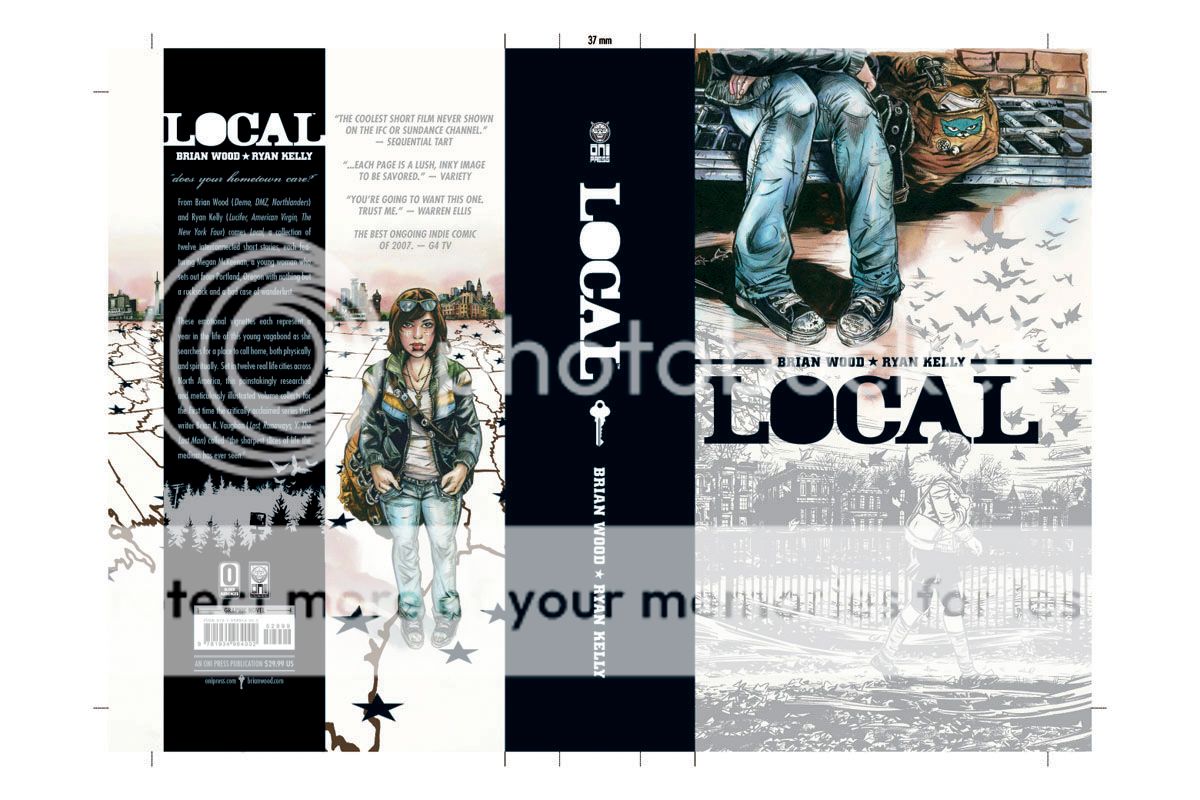
Wood chose a pantone silver as the base of this design with a stenciled typeface meant to look very modern. The back of the cover and the front of the cover were initially going to be reversed when the artists first brought him the renderings. However, Wood felt that since the book’s content is about the idea of a girl’s traveling across the United States, it would be more compelling and evocative to use feet/baggage as the front of the book. He was also the only graphic artist to show a progression of 10-12 renderings, playing with colors, panels and typeface, that led to the final design. He believes in a very traditional approach to design, which includes hand sketches and multiple renderings.
The Culture of Popular Things: Ethnographic Examinations of Comic-Con 2010
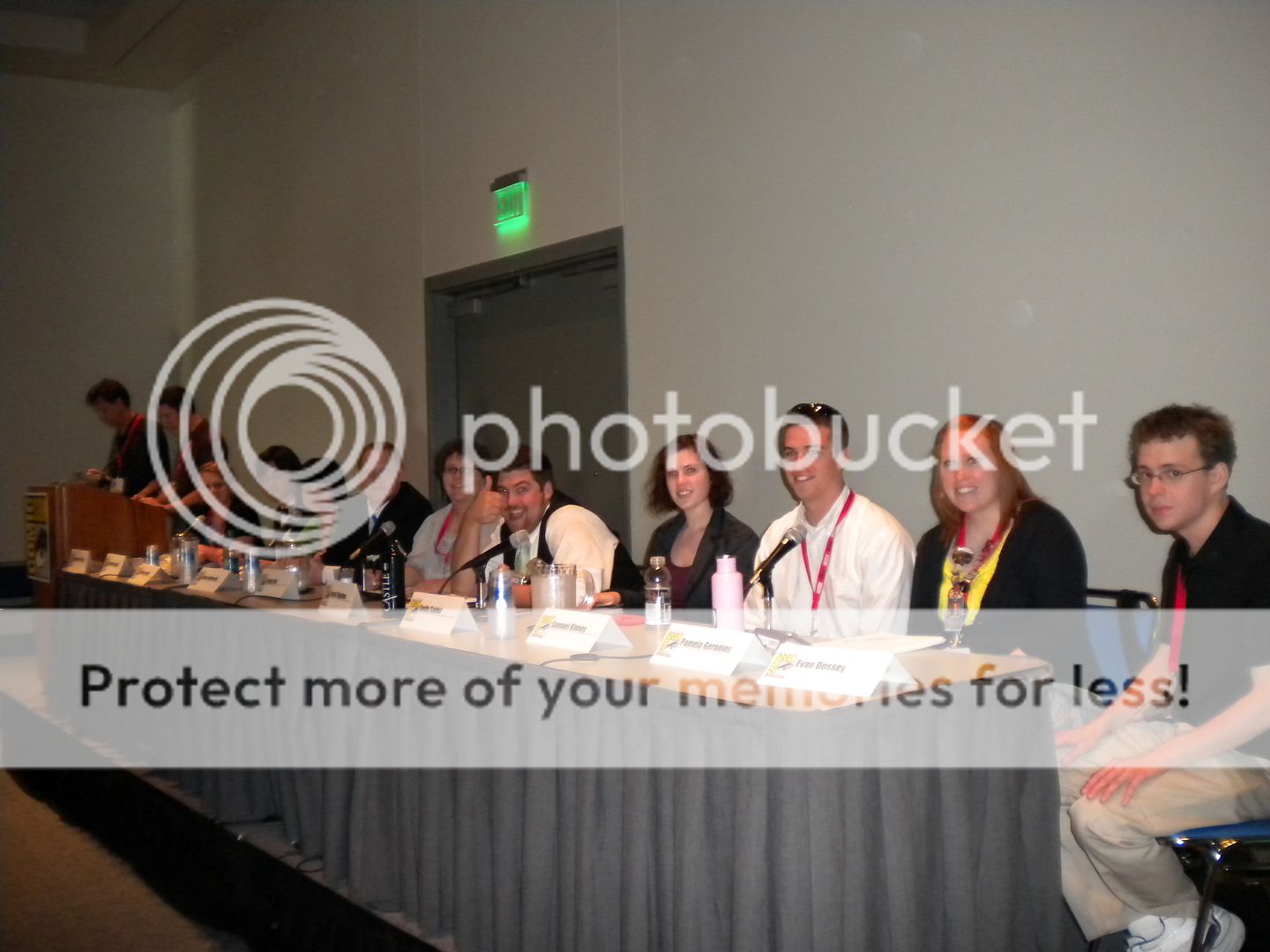
Each year, for the past four years, Comic-Con ends on an academic note. Matthew J. Smith, a professor at Wittenberg University in Ohio, takes along a cadre of students, graduate and undergraduate, to study Comic-Con; the nerds, the geeks, the entertainment component, the comics component, to ultimately understand the culture of what goes on in this fascinating microcosm of consumerism and fandom. By culture, the students embrace the accepted definition by famous anthropologist Raymond J. DeMallie: “what is understood by members of a group.” The students ultimately wanted to ask why people come to Comic-Con in general. They are united by the general forces of being fans; this is what is understood in their group. After milling around the various locales that constituted the Con, the students deduced that two ultimate forces were simultaneously at play. The fan culture drives and energizes the Con as a whole, while strong marketing forces were on display in the exhibit halls and panels.
Maxwell Wassmann, a political economy student at Wayne State University, pointed out that “secretly, what we’re talking about is the culture of buying things.” He compared Comic-Con as a giant shopping mall, a microcosm of our economic system in one place. “If you’ve spent at least 10 minutes at Comic-Con,” he pointed out, “you probably bought something or had something tried to be sold to you. Everything is about marketing.” As a whole, Comic-Con is subliminally designed to reinforce the idea that this piece of pop culture, which ultimately advertises an even greater subset of pop culture, is worth your money. Wassmann pointed out an advertising meme present throughout the weekend that we took notice of as well—garment-challenged ladies advertising the new Green Hornet movie. The movie itself is not terribly sexy, but by using garment-challenged ladies to espouse the very picture of the movie, when you leave Comic-Con and see a poster for Green Hornet, you will subconsciously link it to the sexy images you were exposed to in San Diego, greatly increasing your chances of wanting to see the film. By contrast, Wassmann also pointed out that there is a concomitant old-town economy happening; small comics. In the fringes of the exhibition center and the artists’ space, a totally different microcosm of consumerism and content exchange.
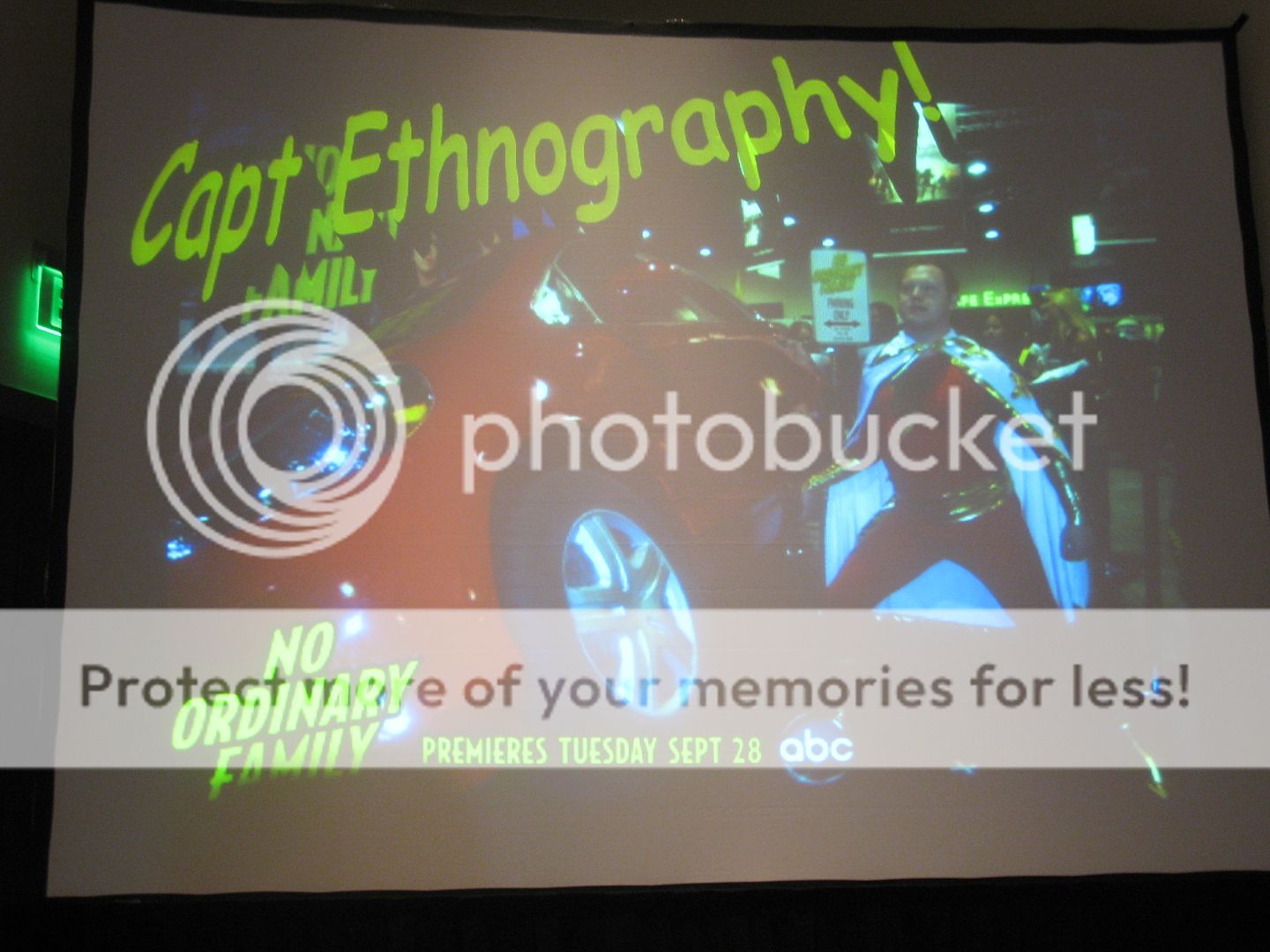
Kane Anderson, a PhD student at UC Santa Barbara getting his doctorate in “Superheroology” (seriously, why didn’t I think of that back in graduate school??), came to San Diego to observe how costumes relate to the superhero experience. To fully absorb himself in the experience, and to gain the trust of Con attendees that he’d be interviewing, Anderson came in full costume (see above picture). Overall, he deduced that the costume-goers, who we will openly admit to enjoying and photographing during our stay in San Diego, act as goodwill ambassadors for the characters and superheroes they represent. They also add to the fantasy and adventure of Comic-Con goers, creating the “experience.” The negative side to this is that it evokes a certain “looky-loo” effect, where people are actively seeking out, and singling out, costume-wearers, even though they only constitute 5% of all attendees.
Tanya Zuk, a media masters student from the University of Arizona, and Jacob Sigafoos, an undergraduate communications major at Wittenberg University, both took on the mighty Hollywood forces invading the Con, primarily the distribution of independent content, an enormous portion of the programming at Comic-Con (and a growing presence on the web). Zuk spoke about original video content, more distinctive of new media, is distributed primarily online. It allows for more exchange between creators and their audience than traditional content (such as film and cable television), and builds a community fanbase through organic interaction. Sigafoos expanded on this by talking about how to properly market such material to gain viral popularity—none at all! Lack of marketing, at least traditional forms, is the most successful way to promote a product. Producing a high-quality product, handing it off to friends, and promoting through social media is still the best way to grow a devoted following.
And speaking of Hollywood, their presence at Comic-Con is undeniable. Emily Saidel, a Master’s student at NYU, and Sam Kinney, a business/marketing student at Wittenberg University, both took on the behemoth forces of major studios hawking their products in what originally started out as a quite independent gathering. Saidel tackled Hollywood’s presence at Comic-Con, people’s acceptance/rejection thereof, and how comics are accepted by traditional academic disciplines as didactic tools in and of themselves. The common thread is a clash between the culture and the community. Being a member of a group is a relatively simple idea, but because Comic-Con is so large, it incorporates multiple communities, leading to tensions between those feeling on the outside (i.e. fringe comics or anime fans) versus those feeling on the inside (i.e. the more common mainstream fans). Comics fans would like to be part of that mainstream group and do show interest in those adaptations and changes (we’re all movie buffs, after all), noted Kinney, but feel that Comic-Con is bigger than what it should be.
But how much tension is there between the different subgroups and forces? The most salient example from last year’s Con was the invasion of the uber-mainstream Twilight fans, who not only created a ruckus on the streets of San Diego, but also usurped all the seats of the largest pavilion, Hall H, to wait for their panel, locking out other fans from seeing their panels. (No one was stabbed.) In reality, the supposed clash of cultures is blown out of proportion, with most fans not really feeling the tension. To boot, Seidel pointed out that tension isn’t necessarily a bad thing, either. She gave a metaphor of a rubber band, which only fulfills its purpose with tension. The different forces of Comic-Con work in different ways, if sometimes imperfectly. And that’s a good thing.
Incidentally, if you are reading this and interested in participating in the week-long program in San Diego next year, visit the official website of the Comic-Con field study for more information. Some of the benefits include: attending the Comic-Con programs of your choice, learning the tools of ethnographic investigation, and presenting the findings as part of a presentation to the Comics Arts Conference. Dr. Matthew Smith, who leads the field study every year, is not just a veteran attendee of Comic-Con, but also the author of The Power of Comics.
COMIC-CON SPOTLIGHT ON: Charles Yu, author of How To Live Safely in a Science Fictional Universe.
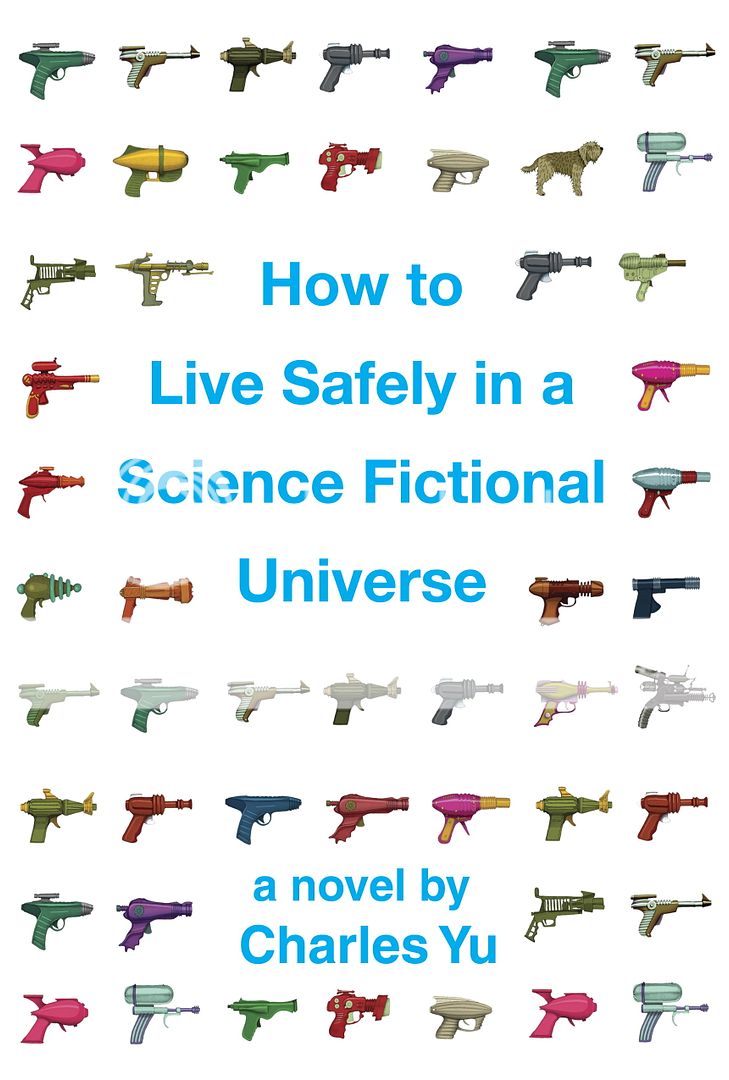
Here at ScriptPhD.com, we love hobnobbing with the scientific and entertainment elite and talking to writers and filmmakers at the top of their craft as much as the next website. But what we love even more is seeking out new talent, the makers of the books, movies and ideas that you’ll be talking about tomorrow, and being proud to be the first to showcase their work. This year, in our preparation for Comic-Con 2010, we ran across such an individual in Charles Yu, whose first novel, How To Live Safely in a Science Fictional Universe premieres this fall, and who spoke about it at a panel over the weekend. We had an opportunity to have lunch with Charles in Los Angeles just prior Comic-Con, and spoke in-depth about his new book, along with the state of sci-fi in current literature. We’re pretty sure Charles Yu is a name science fiction fans are going to be hearing for some time to come. ScriptPhD.com is proud to shine our 2010 Comic-Con spotlight on Charles and his debut novel, which is available September 7, 2010.
How To Live Safely in a Science Fictional Universe is the story of a son searching for his father… through quantum-space time. The story takes place on Minor Universe 31, a vast story-space on the outskirts of fiction, where paradox fluctuates like the stock market, lonely sexbots beckon failed protagonists, and time travel is serious business. Every day, people get into time machines and try to do the one thing they should never do: try to change the past. That’s where the main character, Charles Yu, time travel technician, steps in. Accompanied by TAMMY (who we consider the new Hal), an operating system with low self-esteem, and a nonexistent but ontologically valid dog named Ed, Charles helps save people from themselves. When he’s not on the job, Charles visits his mother (stuck in a one-hour cycle, she makes dinner over and over and over) and searches for his father, who invented time travel and then vanished.
Questions for Charles Yu
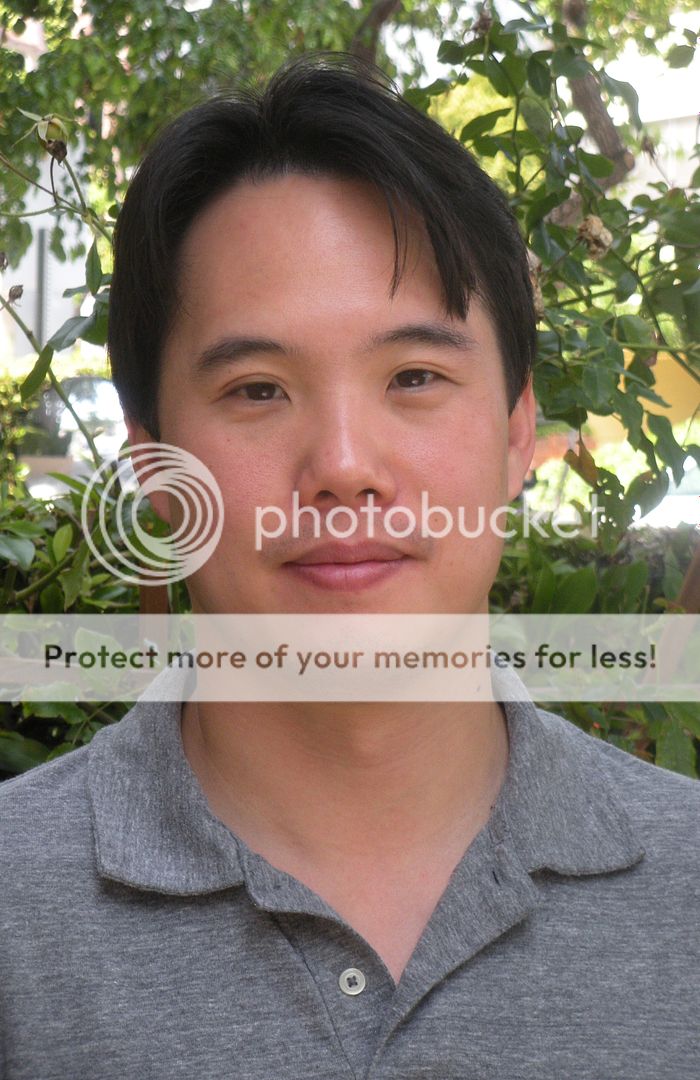
ScriptPhD.com: Charles, the story has tremendous traditional sci-fi roots. Can you discuss where the inspiration for this came from?
Charles Yu: Well the sci-fi angle definitely comes from being a kid in the 80s, when there were blockbuster sci-fi things all over the place. I’ve always loved [that time], as a casual fan, but also wanted to write it. I didn’t even start doing that until after I’d graduated from law school. I did write, growing up, but I never wrote fiction—I didn’t think I’d be any good at it! I wrote poetry in college, minored in it, actually. Fiction and poetry are both incredibly hard, and poetry takes more discipline, but at least when I failed in my early writing, it was a 100 words of failure, instead of 5,000 words of it.
SPhD: What were some of your biggest inspirations growing up (television or books) that contributed to your later work?
CY: Definitely The Foundation Trilogy. I remember reading that in the 8th grade, and I remember spending every waking moment reading, because it was the greatest thing I’d ever read. First of all, I was in the 8th grade, so I hadn’t read that many things, but the idea that Asimov created this entire self-contained universe, it was the first time that I’d been exposed to that idea. And then to have this psychohistory on top, it was kind of trippy. Psychohistory is the idea that social sciences can be just as rigorously captured with equations as any physical science. I think that series of books is the main thing that got me into sci-fi.
SPhD: Any regrets about having named the main character after yourself?
CY: Yes. For a very specific reason. People in my life are going to think it’s biographical, which it’s very much not. And it’s very natural for people to do that. And in my first book of short stories, none of the main characters was named after anyone, and still I had family members that asked if that was about our family, or people that gave me great feedback but then said, “How could you do that to your family?” And it was fiction! I don’t think the book could have gotten written had I not left that placeholder in, because the one thing that drove any sort of emotional connection for the story for me was the idea of having less things to worry about. The other thing is that because the main character is named after you, as you’re writing the book, it acts as a fuel or vector to help drive the emotional completion.
SPhD: In the world of your novel, people live in a lachrymose, technologically-driven society. Any commentary therein whatsoever on the technological numbing of our own current culture?
CY: Yes. But I didn’t mean it as a condemnation, in a sense. I wouldn’t make an overt statement about technology and society, but I am more interested in the way that technology can sometimes not connect people, but enable people’s tendency to isolate themselves. Certainly, technology has amazing connective possibilities, but that would have been a much different story, obviously. The emotional plot-level core of this book is a box. And that sort of drove everything from there. The technology is almost an emotional technology that [Charles, the main character] has invented with his dad. It’s a larger reflection of his inability to move past certain limitations that he’s put on himself.
SPhD: What drives Charles, the main character of this book?
CY: What’s really driving Charles emotionally is looking for his dad. But more than that, is trying to move through time, to navigate the past without getting stuck in it.
SPhD: Both of his companions are non-human. Any significance to that?
CY: It probably speaks more to my limitations as a writer [laughs]. That was all part of the lonely guy type that Charles is being portrayed as. If he had a human with him, he’d be a much different person.
SPhD: The book abounds in scientific jargon and technological terminology, which is par for the course in science fiction, but was still very ambitious. Do you have high expectations of the audience that will read this book?
CY: Yeah. I was just reading an interview where the writer essentially said “You can never go wrong by expecting too much [of your audience].” You can definitely go wrong the other way, because that would come off as terrible, or assuming that you know more. But actually, my concerns were more in the other direction, because I knew I was playing fast and loose with concepts that I know I don’t have a great grasp of. I’m writing from the level of amateur who likes reading science books, and studied science in college—an entertainment layreader. My worry was whether I was BSing too much [of the science]. There are parts where it’s clearly fictional science, but there are other parts that I cite things that are real, and is anyone who reads this who actually knows something about science going to say “What the heck is this guy saying?”
SPhD: How To Live… is written in a very atavistic, retro 80s style of science fiction, and really reminded me of the best of Isaac Asimov. How do you feel about the current state of sci-fi literature as relates to your book?
CY: Two really big keys for me, and things I was thinking about while writing [this book], were one, there is kind of a kitchiness to sci-fi, and I think that’s kind of intentional. It has a kind of do-it-yourself aesthetic to it. In my book, you basically have a guy in the garage with his dad, and yes the dad is an engineer, but it’s in a garage without great equipment, so it’s not going to look sleek, you can imagine what it’s going to look like—it’s going to look like something you’d build with things you have lying around in the garage. On the other hand, it is supposed to be this fully realized time machine, and you’re not supposed to be able to imagine it. Even now, when I’m in the library in the science-fiction section, I’ll often look for anthologies that are from the 80s, or the greatest time travel stories from the 20th Century that cover a much greater range of time than what’s being published now. It’s almost like the advancement of real-world technology is edging closer to what used to be the realm of science fiction. The way that I would think about that is that it’s not exploting what the real possibility of science fiction is, which is to explore a current world or any other completely strange world, but not a world totally envisionable ten years from now. You end up speculating on what’s possible or what’s easily extrapollatable from here; that’s not necessarily going to make for super emotional stories.
Charles Yu is a writer and attorney living in Los Angeles, CA.
Last, but certainly not least, is our final Costume of the Day. We chose this young ninja not only because of the coolness of his costume, but because of his quick wit. As we were taking the snapshot he said, “I’m smiling, you just can’t see it.” And a check mate to you, young sir.
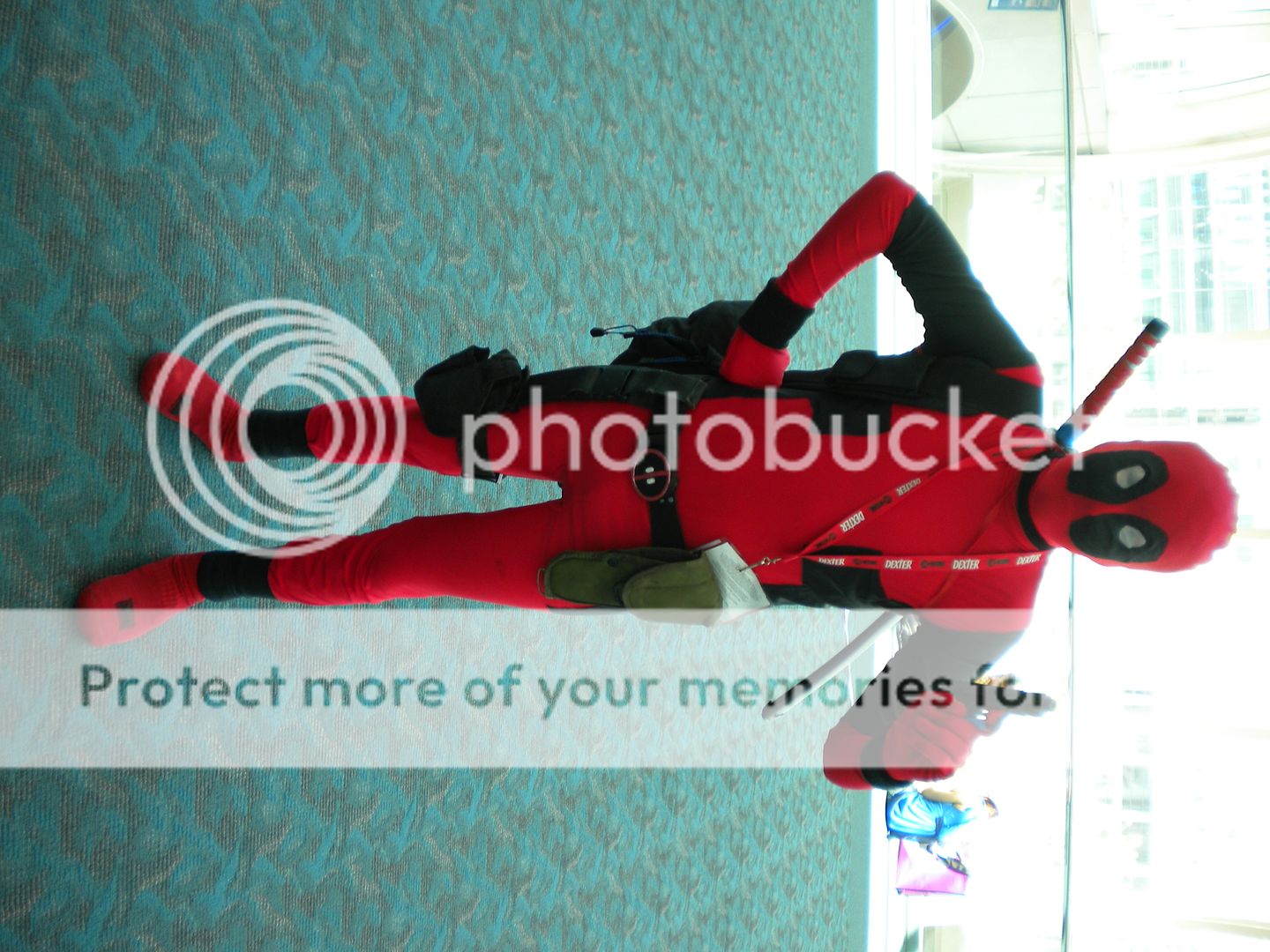
Incidentally, you can find much more photographic coverage of Comic-Con on our Facebook fan page. Become a fan, because this week, we will be announcing Comic-Con swag giveaways that only Facebook fans are eligible for.
~*ScriptPhD*~
*****************
ScriptPhD.com covers science and technology in entertainment, media and advertising. Hire our consulting company for creative content development.
Subscribe to free email notifications of new posts on our home page.
]]>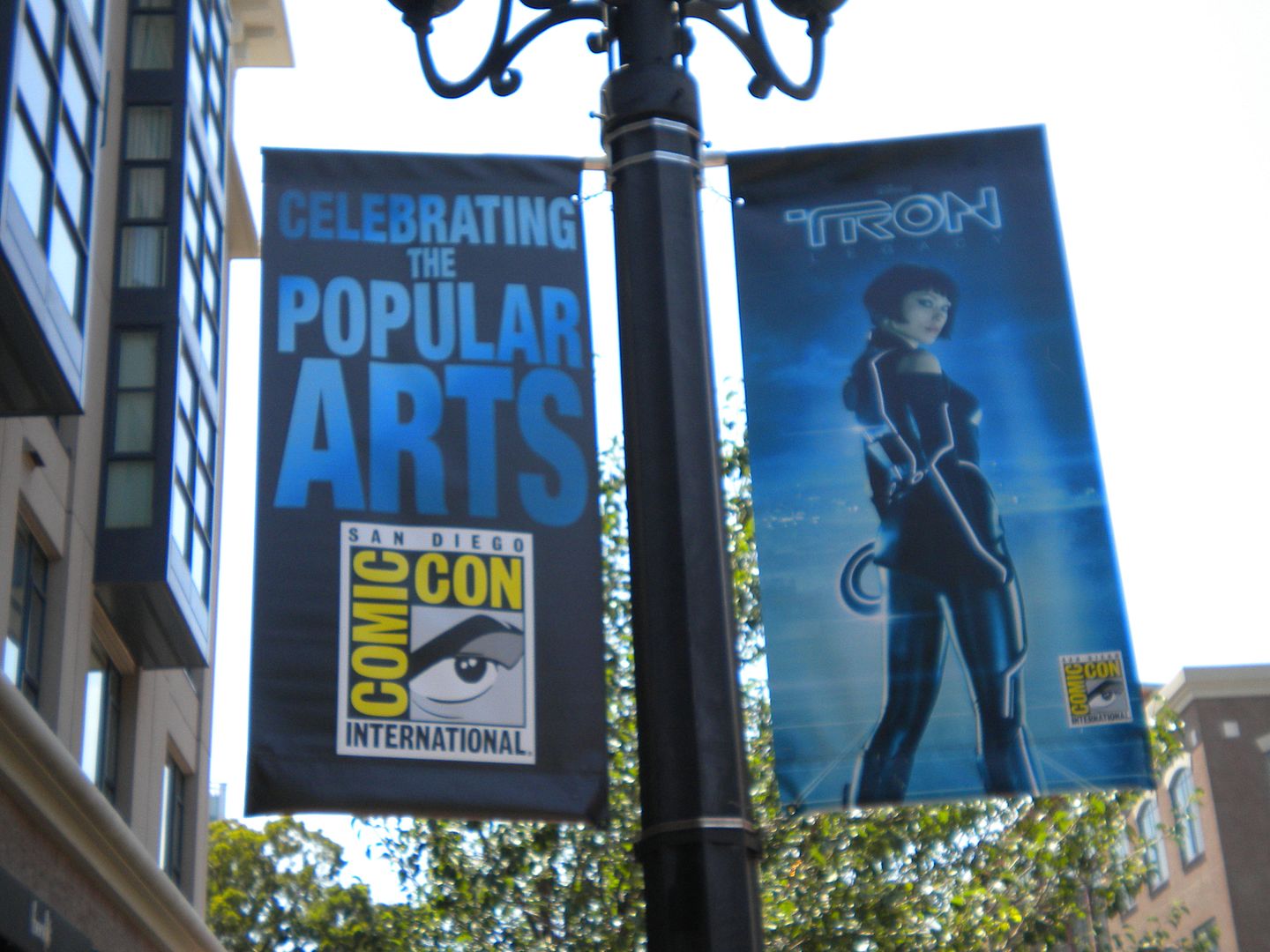
Day 3 was Star Wars Day at San Diego Comic-Con International and we have something shocking to report, ladies and gentlemen. We did not see a single light saber, not one! Since we almost incurred an unfortunate eye injury last year due to an overenthusiastic Jedi, this was most welcome relief. For ScriptPhD.com, today was all about science and technology. In a day that could not have been more tailor-made for our website, we enjoyed panels with the eminent sci-fi television writers of today discussing writing for genre TV (a must-read for any aspiring TV writers out there!), a visit from the greatest science fiction writer in the history of science fiction, Ray Bradbury, a preview of next season’s sci-fi show The Event, and a panel on how exactly shows like CSI “tech” out with gadgets galore. Oh, yes, did we mention we got to hang out privately with the MythBusters?? With the help of our intrepid reporter Bryy Miller, we bring you the most complete Comic-Con coverage on the web. Plus, our Costume of the Day, after the “continue reading” cut!
The Write Stuff: Creating Genre Television
LOST. CSI. V. Battlestar Galactica. It seems that sci-fi, tech, and geek-chic television is everywhere. Not only is it a staple of prime time (across basic and extended cable), it’s an increasingly popular genre for which good writers are constantly in demand. Since we are SCRIPTPhD.com, an opportunity to listen in as a panel of some of today’s hottest genre television writers gave away secrets of their craft and advice for aspiring writers was irresistible.
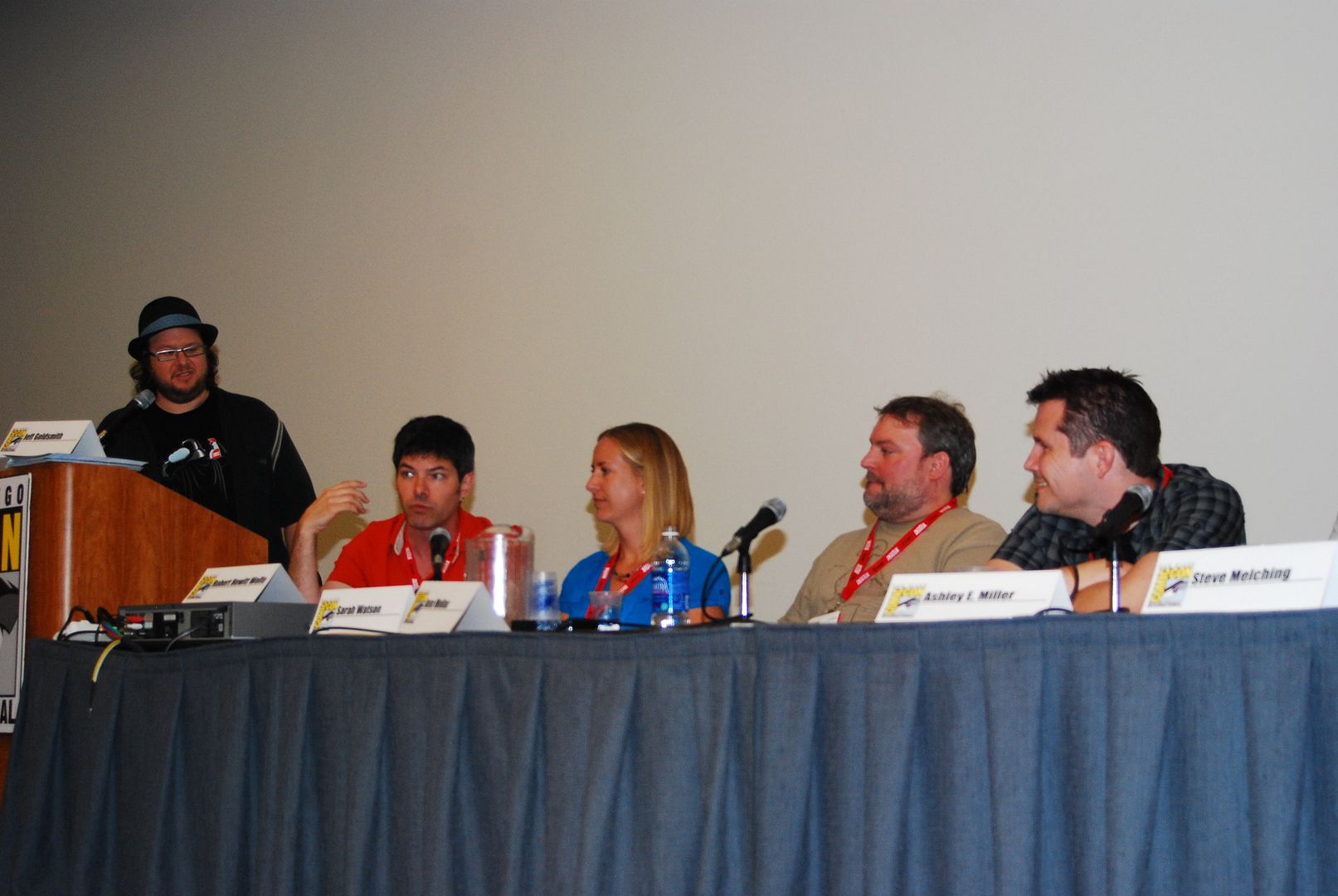
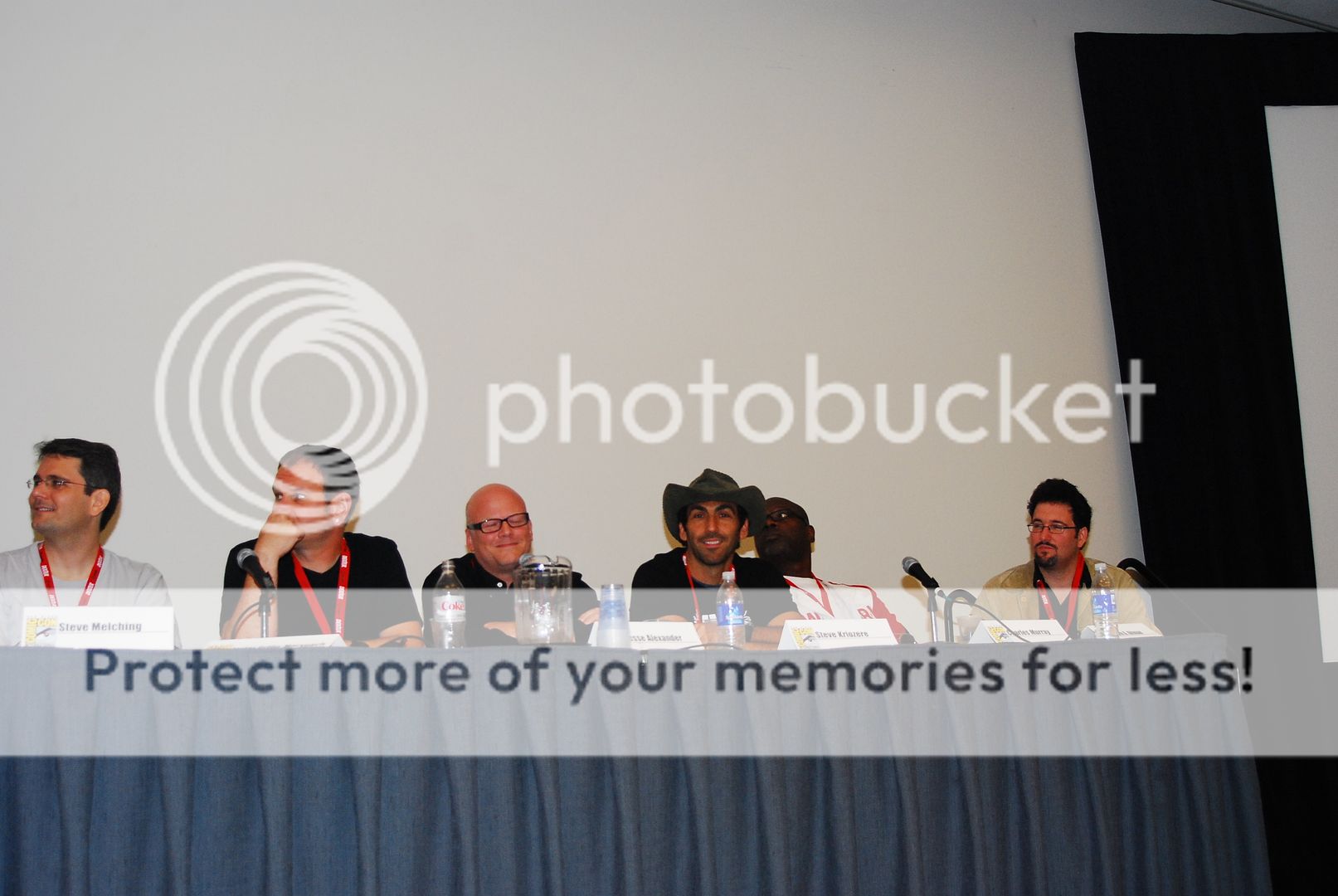
Since this panel consisted of so many writers, albeit a dream team thereof, there was only an allotted amount of time for three questions, each of which the panelists answered one by one down the line, and quite enthusiastically. The moderator, Jeff Goldsmith, who runs the industry rag Creative Screenwriting correctly pointed out that not only are they all working in TV, but if they weren’t on this panel, they’d be at Comic-Con anyway. He called them the “Algonquin geek table.” The first question was to ask each screenwriter what brilliant idea they had that would revolutionize a show they were working on at the time, but that couldn’t get past the network censors.
Mark Altman (Castle, Elvis Van Helsing) recalled creating a pilot called Elvis Van Helsing, but ABC went with The Middle Man instead. So he turned it into a graphic novel, and the rest was history. Charles Murray (V, Criminal Minds) actually recalled a terrific idea for an episode of Criminal Minds, where a serial killer would put a milk carton in someone’s fridge and the “Have You Seen This Person?” picture would be of the dead person. Clever, we thought! Steve Kriozere (NCIS, VIP) had the clever idea on VIP of casting Bruce Campbell to play Pamela Anderson’s uncle. The amazing and talented Jesse Alexander (Alias, LOST, Heroes) recalled a victory for geeks in the form of Heroes Season 1 in an episode entitled Days of Future Past where all the characters went into alternate future. He mentioned that it was so hard to approve and get on air, but the episode went on to win multiple awards. What didn’t make it? “Season 5.”
Steve Melching (Clone Wars, Transformers, The Batman) recalled writing for the animated series The Batman taking place in his first few years in Gotham City, and wanted (but failed) to approve a B story about a frat boy group dressing up in D-List costumes, committing fake crimes and then videotaping their subsequent ass kicking by Batman. We wonder why that didn’t get approved. Ashley E. Miller (Fringe, Terminator) wanted a Fringe follow up to the episode “Bishop Revival,” which had an immortal Nazi. He wanted a flashback episode to 1942, where we find out that Agent Phillip Broyles is 100 years old, and whacking Nazis. Jose Molina (Castle, Firefly) wanted a Firefly payoff episode with a 9-months-pregnant woman being evil, where the team kills her but they save the baby, and the episode would consist of three acts of “Three Men and a Baby.” Right. Sarah Watson (Middleman, Parenthood) recalled being hired to do a SyFy Channel movie of the week about an untapped volcano under Manhattan (seriously!), and she had grand plans for lava engulfing Statue of Liberty, taking over all of Manhattan island, but when the movie got produced the visual ended up being lava trickling out from under a garage. Robert Hewitt Wolfe (The Gates, Deep Space Nine) was writing for 4400 in its final season, and was obsessed with the idea of creating an aerosol promycin bomb over Seattle (hmmm, as a Seattleite, I booed this from the audience). The showrunners created a promycin bomb at the end. So the next time you think all TV writers are geniuses, just remember that for every great episode of your favorite show, there were many bad ideas tossed around in the writers’ room.
Next, Goldsmith asked the panel to recount (as diplomatically as possible) the stupidest network notes they’d ever encountered for a show script they worked on.
Mark Altman recalled working on a SyFy Channel movie where executives asked him to recap the whole plot at the beginning of the hour because of people tuning in from HBO. Charles Murray, while working on V, was told he couldn’t use the word lizard in an episode. How do you get past something like that, he was asked. “I left the show. That’s how you get past it.” Steve Kriozere revealed the #1 SyFy Channel rule of movies: don’t speak to the monster. Jesse Alexander, having worked on some of the greatest sci-fi hits ever, waxed more philosophical. Everyone has an opinion on these shows, but executives want the rules of the show’s world, they want everything spelled out clearly, a lot of exposition. They’re generally happier if the shows are procedurals, but sci-fi shows don’t have room for that—if all the secrets and exposition are revealed it drives people away from the content. Steve Melching pointed out that a lot of animated shows have hyper-sensors because they’re aimed at children. The dumbest note he ever received was that you can’t say “killer satellites.” Ashley E. Miller was reminded (we are shocked!) that you cannot have an 11 year old boy say douchenozzle on prime time TV. Jose Molina recalled an episode of Castle where a body is found in the teaser, the guys go through case, and find out that the victim was killed by a stiletto. Said the executives: “Does the killer have to kill with a shoe?” Sarah Watson revealed that the most annoying thing to writers on shows now is that they’re paid by sponsors, so writers have to put products into scenes strategically. Her worst example was an episode of a show with a surf competition…sponsored by Tampax. To make this work, they had to cover a poor actress’s entire surf bodysuit with Tampax logos. Robert Hewitt Wolfe was taken out to dinner by the main executives of a show he was working on and flat out asked to dumb down the series. Ahhh, the things you learn when the iron curtain goes down.
Finally, Goldsmith asked the panel to give advice to young TV writers (or aspiring writers) on how to best write for a budget, which is unfortunately what most young writers will face on television these days.
Without question, the panel answered unanimously that the secret in the writing is all. about. character. The best and cheapest special effects are two actors in a room with terrific conflict and terrific dialogue—that’s what’s compelling, that’s what’s intimate. Most physical action, they reminded us, is actually superfluous—only revert to it after all possible dialogue is tapped out. Ultimately, you must look at how what you cut (if you are forced to cut things) affects the character. If you put six people in a scene, make sure that all of them need to be in the scene, because it is extremely expensive to shoot. The writers lamented that networks sometimes have too much money, and a subsequent desire to compete with Transformers or Iron Man, which television can’t do. Writers must remember that character works for television, and you can have high-concept ideas for sci-fi. That’s why shows on cable, which are often budget-restricted, are so great. Sarah Watson reminded the audience that you can always make a show cheaper, and fantastic, with great writing and great dialogue. This is how Friday Night Lights, which shoots on a shoestring budget down in Texas, was able to survive for five seasons.
Mostly, in advice relevant to any writer reading this, they said not to repeat past mistakes.
The Event
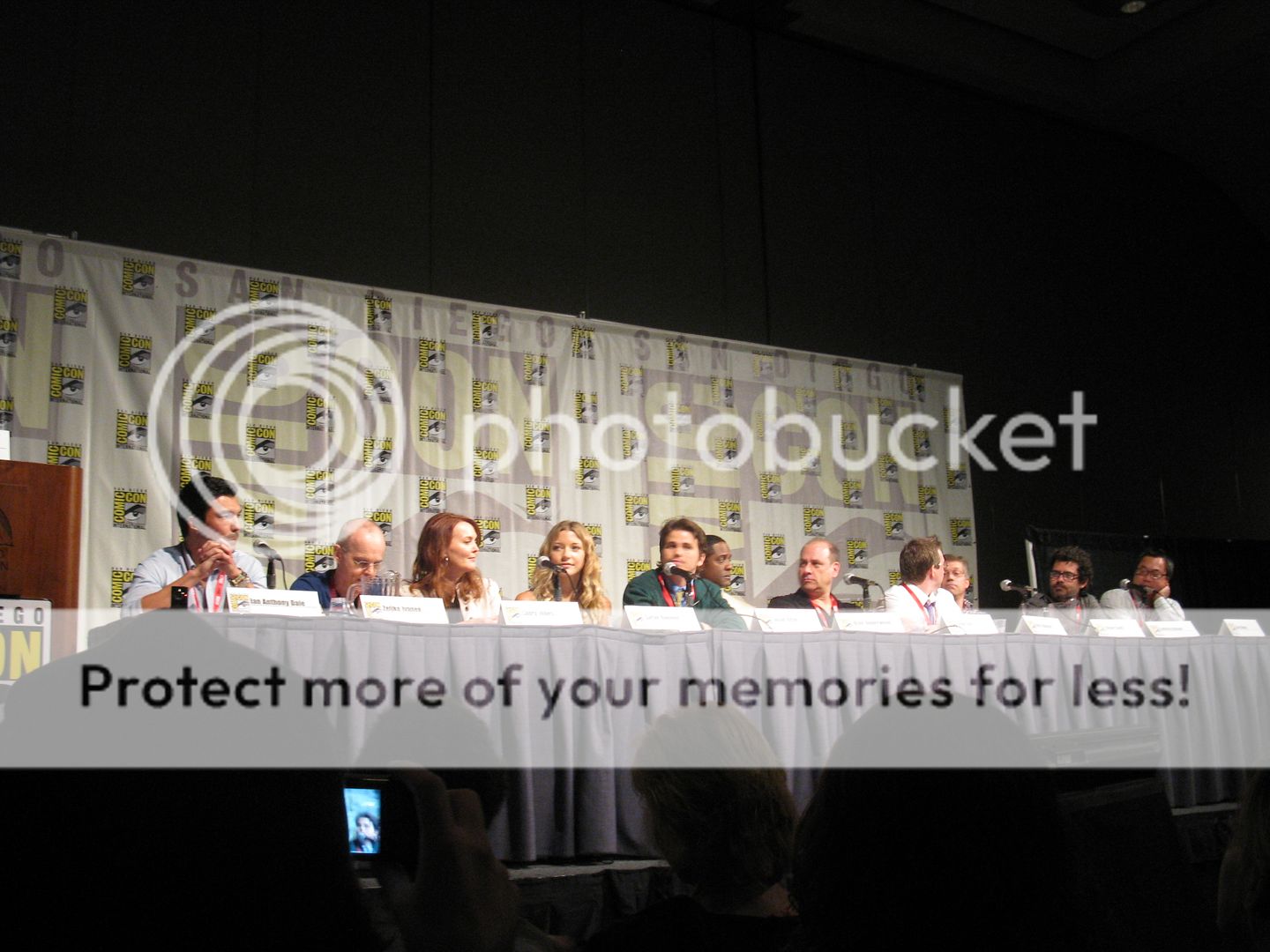
This television show, premiering in the fall of 2010, might be the new LOST, or it might be the new FlashForward. I’m not sure yet. The Event, a show that is so steeped in mystery that even its title is nothing more than Something Happens, was a show—and will be a show—with as many problems as it has concepts. Fortunately, all of its flaws are structural.
The pilot is laid out as three separate stories (well, actually, four, but one is extremely short in comparison) over the course of three separate acts. We actually start the show in the middle of the story when our hero, Sean Walker (Jason Ritter), hijacks a plane in order to save it, and then flash back to eight days earlier, and then forward to seven days earlier, and then once more to the present. It gets even more confusing when President Eli Martinez (the incredibly suave Blair Underwood) gets his go at the story, and then his segment goes back an entire year. The other two stories comprise of the father of Sean’s girlfriend, whose house and family are assaulted by unknown forces, and Simon Lee (Ian Anthony Dale), the supposed second-in-command of a secret government base/prison that lies at the center of The Event. It’s a shame that Lee’s section is so short, as Dale is a fantastic actor even within the confines of such little material. But perhaps the best acting comes from ER/West Wing (and Northwestern University!) alumna, Laura Innes, who absolutely nails her cryptic sayings as Sofia, the leader of the base/prison/thing-to-be-revealed-later.
The show will need to cut out some of the flashes in order to survive past its initial thirteen episodes, but it is definitely a unique format that works for this type of story. The writing was high-quality and so was the dialogue; there were no qualms there. It also revealed quite a bit about the world that had been set up if you looked closely enough. Co-Producer Evan Katz made the promise that answers would actually come a lot faster than with other mystery longforms. This is welcome, especially since I am of the belief that mystery shows can maintain the mystery if they answer questions in the right or clever way. Sometimes, it is even essential to answer them if you want the show to progress to its next level of weirdness. Blair Underwood was then asked what it is like to be the first Cuban president, to which he replied that there would be no Salsa dancing.
Katz then ended the panel the only way it could have possibly ended:
“The Salsa is not The Event.”
Spotlight On: Ray Bradbury
He is brilliant. He is one of the foremost technology predictors since Leonardo DaVinci. He is irreverent, utterly aware of his importance, and quite simply, the greatest science fiction writer in the history of the genre. He none other than Ray Bradbury. Ray has been coming to Comic-Con since the very first year of its inception. A devoted comics and graphic novel buff, he loves interacting yearly with fans, and gracing them with his musings, knowledge and appreciation. We were honored and somewhat overwhelmed to be there in person for Ray’s 41st Comic-Con panel, on the heels of his 90th birthday. Because Bradbury’s words speak for themselves, we bring you the panel through his eyes.
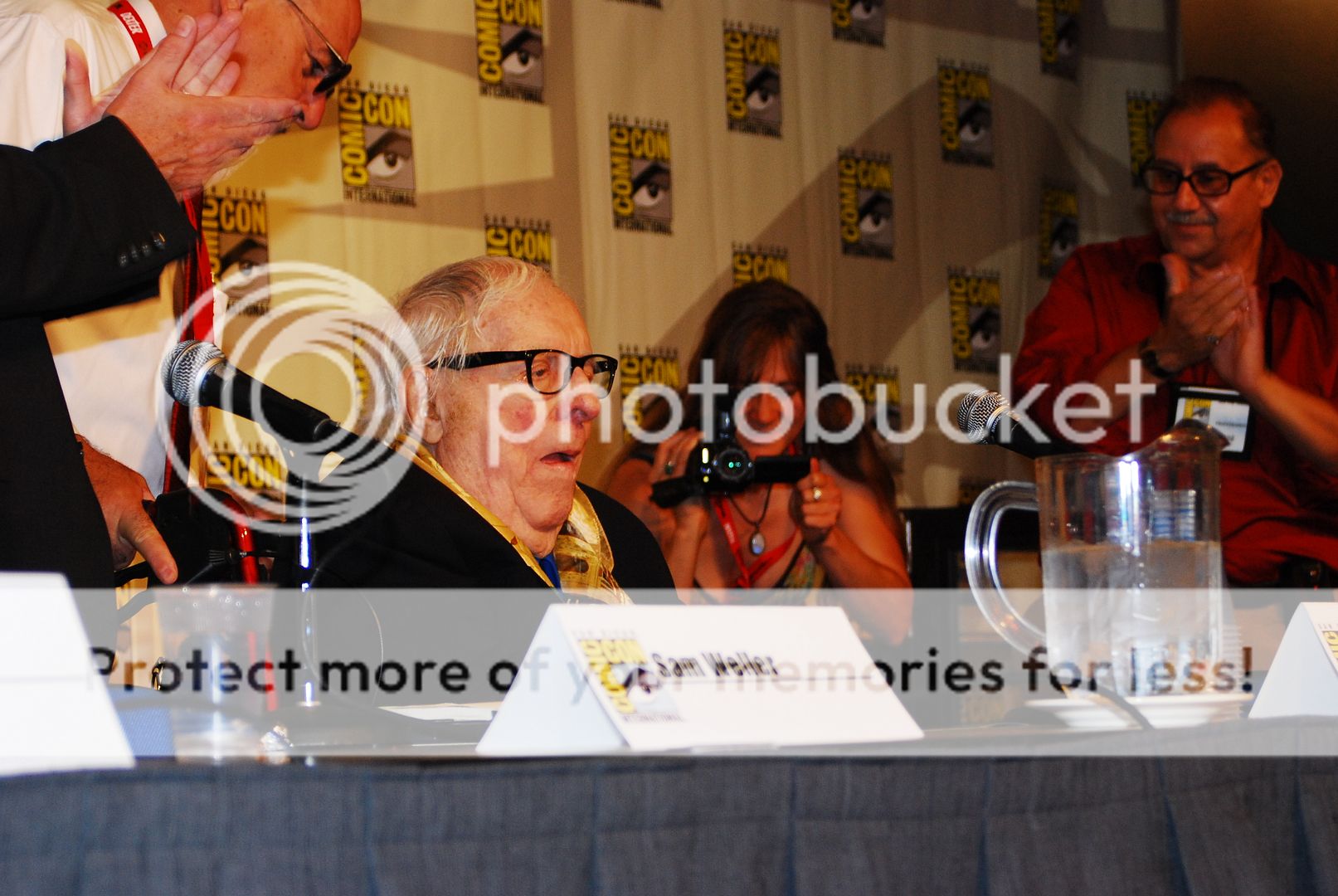
Bradbury, not shy about quips and bold statements, starts out his panel with a bang: “I want to make an announcement. Sam Weller and I are working on a new book together: Let’s Let The Cat out of the Bag.” In actuality, Weller and Bradbury released a brand new book of interviews (out June 29th) entitled Listen to the Echoes: The Ray Bradbury Interviews. Weller has spent over a decade with Bradbury, getting to know him, studying his works, and acted as his guide during the panel (Mr. Bradbury has become a bit hard of hearing). Bradbury is currently working on a new book of 20 short stories entitled “Juggernaut” to be published next Christmas.

On how it feels to be Ray Bradbury and if he ever marvels at himself, after a long, thoughtful pause, a hearty laugh and: “It feels mighty damn good.”
Fahrenheit 451 was among the most prescient sci-fi works of all time, predicting technology such as earbuds, flat screen televisions, school violence, and the rise of graphic novels. How did Bradbury predict all this stuff?
“The secret of life is being in love. By being in love, you predict yourself. Whatever you want is what you get. You don’t think about things; just do them. Don’t predict them—just make them.”
Of the technologies Bradbury predicted, he also warned about many, including rise of mass media. What tech would he like to see next?
Again, a thoughtful pause. “I’d like certain technologies to disappear. The internet is a great, big, stupid goddamn bore.” Keep in mind that when Bradbury was approached by an internet magnate to publish his works as e-books for the internet, he responded with: “Prick up your ears and go to hell!” The internet magnate? None other than the CEO of Yahoo.
Another strong, recurring theme of Bradbury’s panel was his love (adoration, really) of space exploration, most notably colonization of Mars and the Moon. Why? “Because we’re going to live forever. We should go back and build a base on the Moon, put a civilization on Mars. 500 years from now, we’ll go out into the Universe, and when we do that, we have a chance to live forever.”
Weller tried to get Bradbury to discuss the new book, once again evoking his crotchety sense of humour: “You can’t afford it. So get out of here and forget it.” In an extremely revealing, intimate moment, Weller pointed out that many Mars stories and works are inspired by and cut from Bradbury’s Martian Chronicles, none more similar than the Twilight Zone. Bradbury then revealed something that many of his fans probably don’t know. “Rod Sterling came to my house many years ago. He didn’t know anything about writing sci-fi. So I took him down to my basement and gave him copies of books written by Roald Dahl, John Collier, a number of other great sci-fi authors, and myself. Rod Sterling forgot that he read all these books, and when he wrote his programs, he copied some of his ideas from me, and we got into a big argument.” The two never reconciled.
As we’ve mentioned, Bradbury came to Comic-Con in its first year, where he said only 300 people came to first meeting, quite different from today, where 1,000 people were gathered in his room alone. Why does he come so often? “Because I’ve been collecting comic strips all my life. I have 30 years’ of Prince Valiant Sunday illustrations put away, all of Buck Rogers. My background in becoming a writer was falling in love with comic strips.” How did they influence his prose and narrative? “Comic strips are full of imagination and glorious adventures. My all-time favorite is Mutts. A year from now, there will be a graphic novel of “The Martian Chronicles” and “Something Wicked This Way Comes.”” Bradbury is, in fact, the world’s greatest (and possibly oldest) fanboy. He is famous for writing fan letters to writers and other figures that he admires. He sent books to John Huston, the famous screenwriter and filmmaker. He sent a hand-written letter to Edgar Rice Burroughs begging him to come to a meeting of Bradbury’s science fiction society club.
Another thing fans may not know is that Bradbury is considered the patron saint of the American library system. He has been very active in rescuing libraries that are under fire because of budgetary crises. He recounted the story of his love affair with the library. “When I left high school, I had no money to go to college. I decided to not worry about going to college. I thought: “I will educate myself.” So I walked down the street, I walked into a library for 3 days a week for 10 years. Most of you in the audience can’t afford to go to college. But if you want to educate yourself, you can afford to go to the library. When I was 28 years old, I graduated from the library.”
The concept of time travel is explored in the short story “A Sound of Thunder.” If Bradbury could time travel, he was asked to what moment it would be? “Every. Single. Moment. Every single moment of my life has been incredible. I’ve savored it. It’s beautiful, because I’ve remained a boy. The man you see here tonight is a 12 year old boy, and he’s having fun!” How does he stay connected to his inner child? “Don’t worry about the future, or the past, you just explode every day. If you’re dynamic, you don’t have to worry about what age you are.”
Indeed, childhood is a theme of many of his short stories. Why is this so important to Bradbury? “Because I grew up loving carnivals and circuses. That’s why I wrote those stories.”
When asked if he had any regrets in life, Bradbury evoked the biggest laugh of the day: “I regret that I didn’t have more time with Bo Derek.” What’s the Bo Derek story? She came up to him in Paris train station, and exclaimed “Mr. Bradbury, I love you!” To which he responded, “Who are you?” She replied, “My name is Bo Derek. Mr. Bradbury, will you travel on the train with me?” With a stoic face he recalled replying: “Yep, I will!” The rest was censored.
Other than Be Derek, what was his greatest love? Bradbury turned philosophical. “I am the world’s greatest lover. I love to write short stories. I write them. I love to write novels. I write them. I love to write poetry. I write it. I love to paint pictures. I paint them. I loved directing a film. So I directed it. Those are my greatest lovers. I have loved all these things I have told you about.”
What authors inspired Bradbury growing up? “Edgar Rice Burrows. And Edgar Allan Poe—scared the hell out of me.”
Another fact about Bradbury that many people may not know is his rather illuminating and successful career as a designer and architect. He was asked how he got involved with designing the San Diego city center Horton Plaza. ”I designed a lot of other places all over LA. 50 years ago, the people who were building the New World’s Fair asked me to redesign the United States Pavilion. I helped build Epcot down in Florida. Because of those works, the people of San Diego came and asked for input in building The Horton Plaza at the center of San Diego.”
Aldous Huxley famously said of Bradbury, “You know what you are sir? You are a poet.” When asked who the poets are that have influenced his writing, Bradbury immediately responded: “Shakespeare and Alexander Pope.”
What are the things that keep Bradbury motivated now? “I have more work to do.”
On how his writing has changed over time: “It’s gotten more brilliant.”
As such a fan of Mars, Bradbury was asked how he feels about the ongoing Martian probes, and the real science evidence they have brought back to Earth. “I’m glad we are doing that [research], but we should be doing more. We should be going there in person. Not with a lander, but with a real rocket ship and landing on Mars.” In a rather endearing moment, Weller revealed that Bradbury has never driven an automobile. But he was invited to the Jet Propulsion Laboratory in Pasadena, where scientists asked him if he’d like to drive the Mars Rover over Mars. So he hasn’t driven on the 405 freeway, but he has driven across Mars! The scientists even gave him a Martian drivers license.
Any futuristic technologies for cities that Bradbury would like to see? “Monorails all over LA and California. Get rid of the goddamn freeways!” As a Los Angeles resident, hear, hear, Mr. Bradbury!
What was the intended audience of Fahrenheit 451 and how does he feel about its rise to prominence as a true modern American classic? “I am not a science fiction writer. All my books are fantasy. But the one book that is pure science fiction is Fahrenheit 451. So I’m glad that I wrote it. I’m glad that you all feel that way about it too.”
Does Bradbury have a favorite work? “All of my books are my favorites. All of my books are my children. I love all my children.”
How does Bradbury feel about digital books? With a cranky grunt: “I’ve already told you that. I don’t like them. I think of iPads and Kindles as books with a computer screen. Real books smell, real books have memories.” We here at ScriptPhD.com would like to give that statement a heartfelt “AMEN!”
Finally, Bradbury, on turning 90 in a few weeks. How does it feel? “It’s been 90 goddamned incredible years!” To which the audience responded by singing him “Happy Birthday.” A surreal, incredible and special moment.
Teching Out on TV
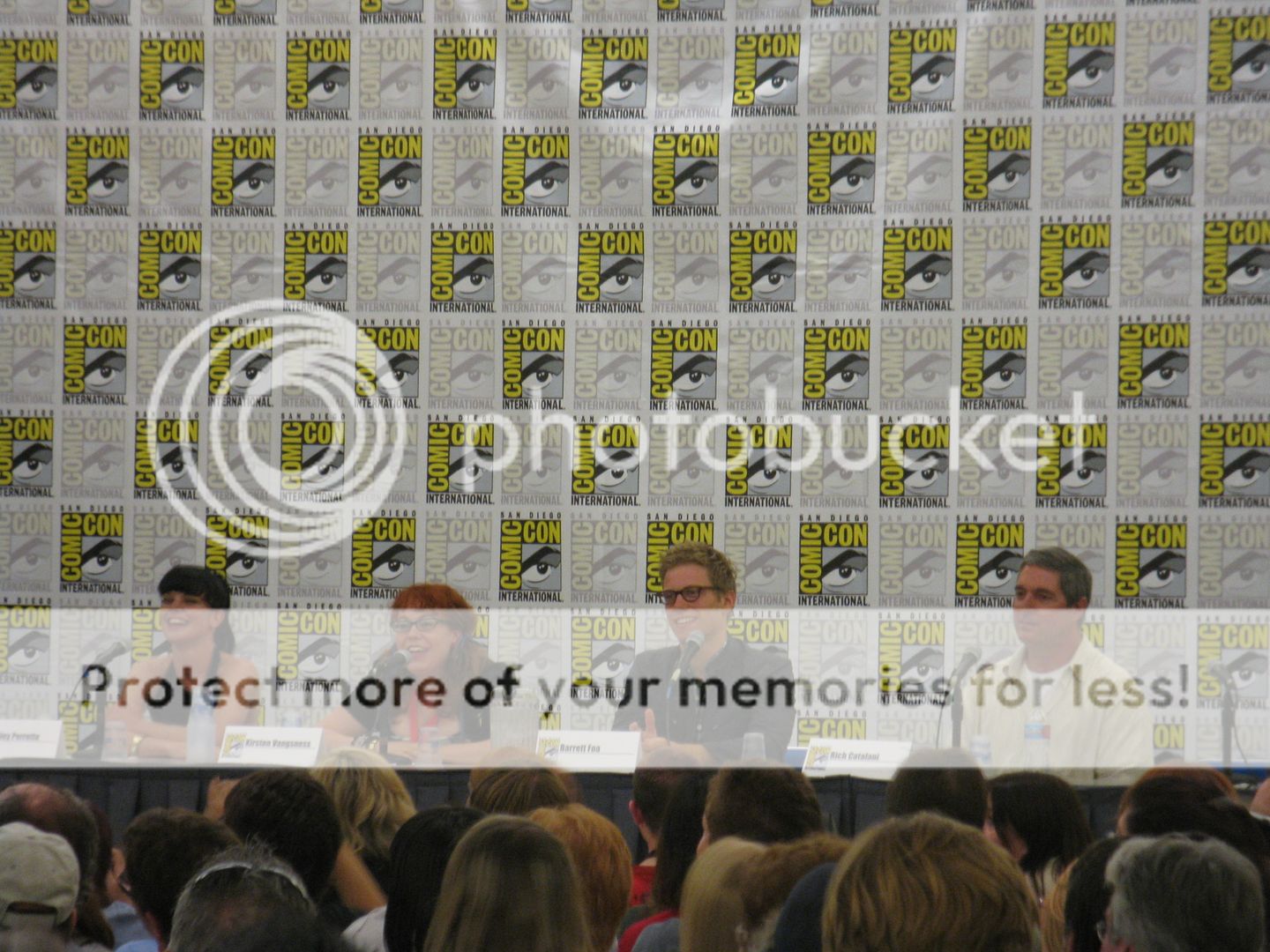
This panel started out with an inundating montage of clips from tech-chic procedurals CSI and NCIS that involved technology of all sorts. It was part awesome and part utterly corny, as words to the song that was spliced in occasionally would find themselves on to the screen. I was afraid that this foreshadowed the panel being just a huge PR stroke for both shows, but I was later proven wrong. Despite the moderator speaking in a loud, fast, incoherent style of mumbling, the rest of the speakers (Anthony Zuicker, creator of CSI; Pauley Perette, CSI; Barrett Foa, NCIS: Los Angeles; Kirsten Vangsness, Criminal Minds; and Rich Catalani, producer of CSI) were very articulate about all aspects of technology on their shows. They strove to make it less a panel about technology on CSI and NCIS and more about technology and how it relates to CSI and NCIS.
The presentation started out with questions about how everyone got involved in their work, and more specifically, how they got involved in technology, or if they even were. Perette studied forensics in college, talking about how, back in her early years, nobody knew a thing about it. She related a story that the first time that her computer was hacked into, she tried to tell the police, but ended up having to explain to them what an IP Address was. Then, after shows such as CSI and Law & Order made technology and forensics mainstream, everyone was a part of a club that they felt they cultivated. “We all became semi-experts,” she said. “It’s been an incredible decade of change. What we’re showing on our show is the grand upmovement”. Vangsness was a tad in the opposite direction: she took teaching jobs in order to support herself, and one of those jobs was teaching PowerPoint to third graders. She now has images of third graders hacking into government installations to post spam of kittens.
Foa stopped the discussion at one point to explain to the audience that his show, unlike the original CSI, does not stare at a green screen when looking at his computer tomfoolery. It is all real. Which complicated matters greatly when Perette’s character met Foa’s in a crossover between their two shows. She had to literally teach him on set how to react to a green screen as oppose to a real image. Foa also related how the super-tech that we often think of as fictional and made up is actually real. The CSI writers have access to China Lake, a military outpost where they test experimental technology. Scary, huh?
But sometimes technology cannot save you, and honest-to-God legwork must be put into use. For one CSI episode involving a stampede of ants, they actually had to hire an Ant Wrangler and clean up all the creepy crawlies using a vacuum. CGI was expected to just look too ridiculous. Then, in a devilish sort of irony, the projector broke, so the panel was cut short and went straight to questions. Perette was met with a young woman who was going to major in Cellular Biology in college because of Perette’s performance on CSI.
Thus, the cycle continues.
MythBusters: Panel + Press Room Coverage
How popular are Discovery Channel’s MythBusters? Very. Each year, the group of geeky demolition rock stars, who prove and disprove popular science myths through the scientific method, represent one of the fan favorite panels at Comic-Con. This year was no different. Press pass notwithstanding, we barely squeezed into a sardine-tight hall full of science fans awaiting their heroes’ arrival. Take a look at the picture below:

As if the presence of television’s most explosive group wasn’t enough, the audience was tantalized two-fold before the panel. First, a montage video introducing the Busters had us cracking up with its over-the-top… what else?… explosions!

Then, a special guest, Geoff The Robot from The Late Show with Craig Ferguson, stepped out to proclaim his nerdy love of all things MythBusters.
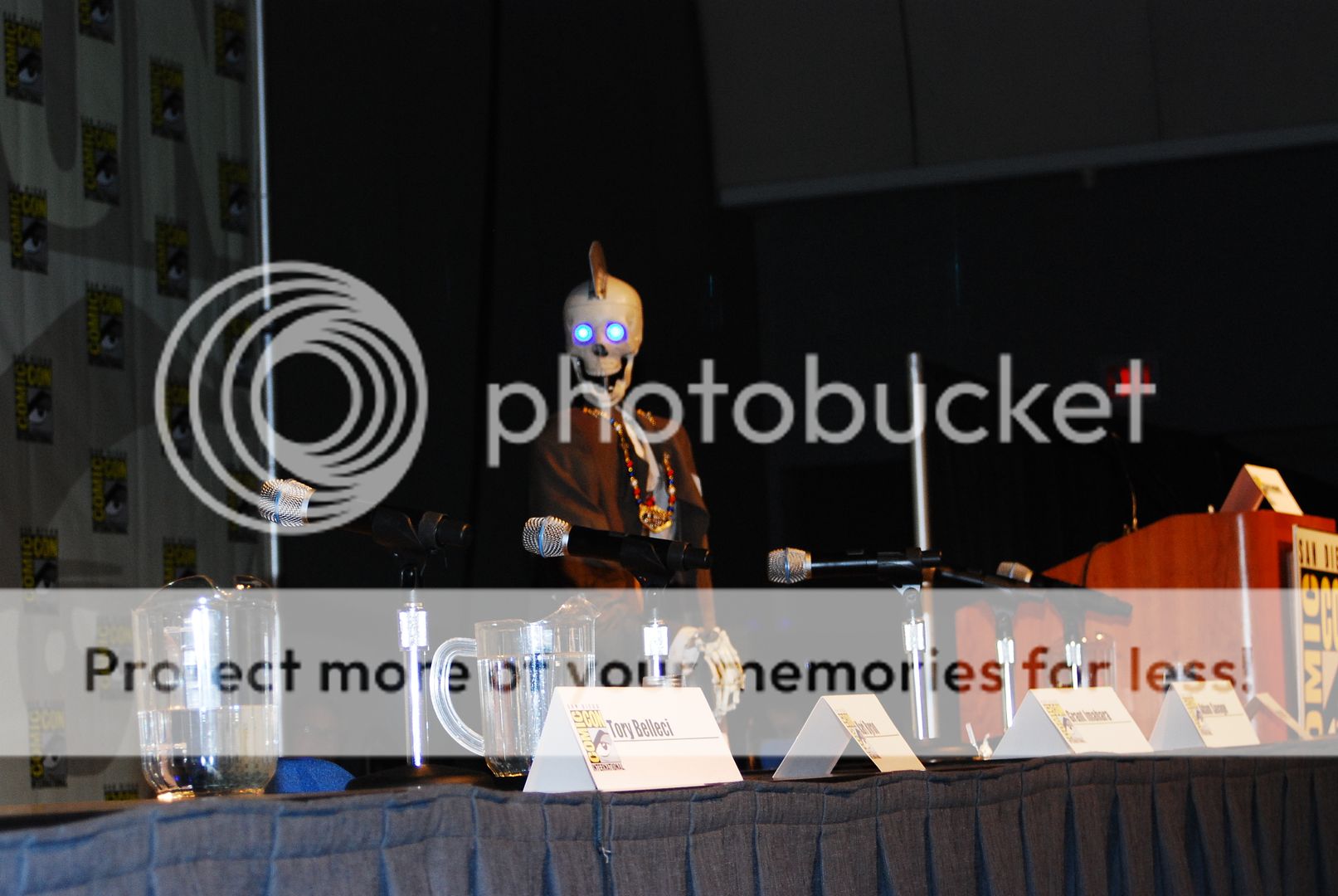
Finally, to ear-deafening applause, Chris Hardwick of one of our favorite blogs The Nerdist (follow him on Twitter) introduced the MythBusters, who announced that they’ve signed up for 7 more years of glorious science. This is a very special Comic-Con for them. It’s the first time all five have come as a group, and it is gorgeous geek diva Kari Byron’s first Con.
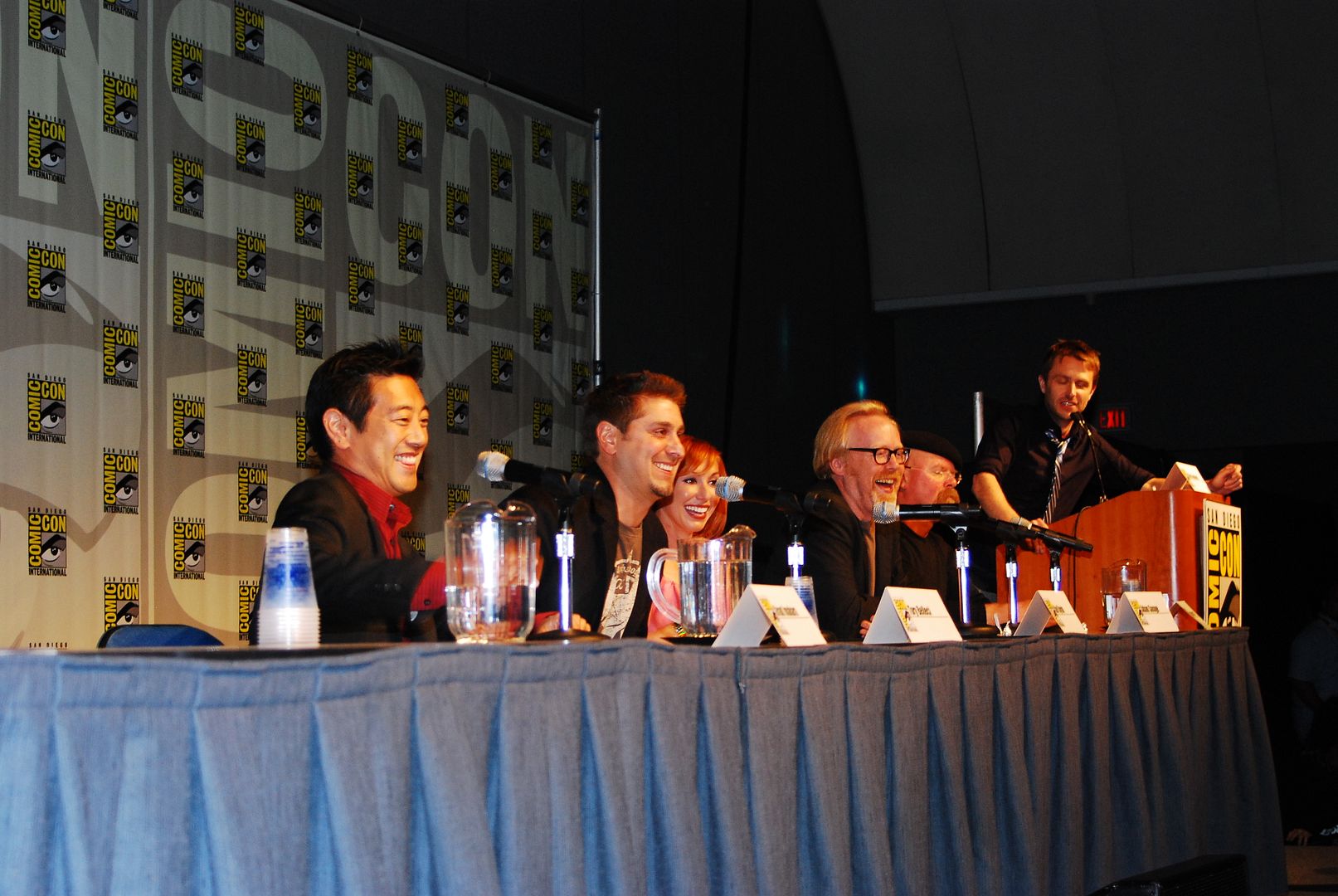
The first thing the MythBusters wanted their fans to know is just how very real they are. Although they feel like royalty at the Con, when they go back home to San Francisco, MythBusters is far from glamorous. Inside their workshop, which is a workshop and not a studio, they are doing all of the stunts and building themselves. They get dirty, they get bruised, and they do all of the experimenting. Says Adam Savage: “If you see it, we built it.” Although Savage has started getting more involved behind-the-scenes, he explained that the team is so knowledgeable about how to build things, that it’s faster and more efficient for them to do the building than to leave it to someone else. Tory Bellici mused that it would be nice to have stunt doubles sometimes, to which Kari Byron quipped: “They’re not stunts when you fall off.” Did we mention that we love Kari? Jamie Hyneman, who initially signed up for MythBusters because of the allure of getting to try new things, is still having a hard time acknowledging being on TV. When asked what famous people he’d met because of MythBusters, he couldn’t recall one. “President Obama?” nudged Byron. “Oh. Yeah,” replied Hyneman hysterically. Not so for Grant Imahara, possibly the most famous robotics guy in the world. “Craig Ferguson called me the Keith Richards of robotics,” said Grant. “I’m not sure how to take that.”
The audience was treated to a highlight reel of the upcoming season, which promises to have the best, and most extreme, experiments yet. The team revealed some of the secrets. Adam Savage revealed that a scene of a Porsche flipping backwards violently was done to bust an old 1980s myth that classic sports cars are more aerodynamic going backwards than forwards. In an utterly bad-ass bit of reconstruction, the body of a Porsche chassis was cut off, flipped backwards on the car, then raced at 100 miles per hour. Any more questions, kids? A scene showing Kari puking violently (she joked that it was in her contract to have to throw up every year) was explained as an episode testing whether people really do get cold feet when they have to do something scary. For the team, scary meant picking, then eating, two of the most disgusting selections from a table of delicacies consisting of spiders, cockroaches, chicken feet and more. And where does the team get their constant supply of ideas? “Surfing the internet really works!” joked Grant Imahara.
As to whether the team is cognizant of how much they advance science and critical thinking, and actively try to build experiments around didactic aims, the answer is… NO! Jamie remarked that as a whole, the MythBusters are a remarkably curious group. They are curious about stuff, they try to figure it out, and do so in a methodical and logical way. But they never set out to do science. Which, honestly, in the opinion of this website, is why their science is so great.
At this point, the team shared fun and hilarious inside stories from their Comic-Con experience and tidbits from back home in San Francisco. Adam recalls being shocked at two geeks that came up to him at an autograph table with their baby, wearing a onesie that said “Proof that nerds have sex.” Despite his uncomfortable laughter, the duo then asked him to sign their baby! Another fan went up to Jamie and remarked: “I’ve been watching your shows since I was a little girl and now I’m a PhD!” We’re pretty sure Jamie was kidding, but Adam still poked fun back at him. “You’re old!”
Just in time for next week’s Discovery Channel Shark Week, Adam recalled a fan coming up to him a few months back with what the fan was convinced was a brilliant suggestion: “Dude, you know what you should totally do? You should totally prove that, like, punching sharks will make them go away! Seriously, dude, it would be awesome! You’d just punch them.” A brief pause from Adam. “8 months later, there we were, knee deep in sharks, punching them in the face…”
Kari revealed that she filmed the show up to her 10th month of pregnancy. She pointed out that it’s a myth that pregnancy only lasts 9 months. (BUSTED!) She was worried that her baby would never come out. Replied Grant: “With all those explosions and gunshots outside, I wouldn’t come out either!”
Finally, to a fan that asked whether the team is ever scared of an experiment as too dangerous, Jamie reminded him that danger is a relative term. Nothing the MythBusters do is any less dangerous than driving down a freeway at 70 miles an hour. The trick is to good engineering and survive by doing a good job.
The new season of MythBusters premieres in the fall. Find coverage of their Comic-Con panel and clips from the new season on the MythBusters website.

We got to spend even more time hanging out with the MythBusters (and Geoff) backstage in the press area to get even more scoop about the show. We all wondered about the research process that the team undergoes. First and foremost, Adam proclaimed that they “don’t ever get things tested because they’re too dangerous.” There’s nothing the team is afraid of, and no length of time is too long to wait for a payoff. The research can take anywhere from 2 weeks to 2 years. The team searched 19 months for a lead layer thin enough to do an experiment properly. By contrast, the poppy seed drug testing experiment took two hours. They ate poppy seed muffins at 9 AM, and tested positive for heroin at 11 AM (well into the next day).
When asked about their terrific rapport, the team reiterated that they very much enjoy each other’s company and socialize quite well. All of the process, from picking to carrying out experiments, is totally collaborative. Secondly, the team shares a bond because they know each other quite well. “It’s not like we’re a science show boy band,” joked Adam. Most of them have known each other and worked together well before MythBusters began. Unlike other shows, MythBusters goes on for most of the year (46-47 weeks) because the building portions of the segments are so time-consuming. The most important thing to Jamie is a strong sense of respect that trickles down all the way to the show’s loyal crew of 23 people.
For the future of the show, Jamie revealed an interest in looking at the dichotomy of destructive things that do good work as well, steam being high on his list. The team never gets inspiration from movie trailers or clips if there’s no story there and they’re not worthy of a myth.
Adam revealed the interesting fact that somebody actually bought the Corvette which had been fouled by a decomposing pig to prove that a decomposing body can destroy the inside of the car. Adam now associates the smell of cleaner with that episode, which makes him sick to this day. Was that the team’s least favorite experiment, wondered ScriptPhD.com? Grant picked the ear wax candle experiment, jokingly calling it the “seasickness experiment.” Tory picked the chili pepper cure experiment. (“Burns on the way in, burns on the way out!”), while Kari picked the water torture episode. The most destructive experiment to this day, much to the chagrin of OSHA and safety regulation organizations of San Francisco, was the Civil War rocket, tested with a wax core. The team thought they had a proper bunker in the shop, but unfortunately ended up setting fire to their ceiling!
On any potential Discovery Channel crossover shows, Adam revealed that he’d like to go out into the wild with Bear Grylls (and so would I!) while Kari revealed that she would not like to do a dirty job.
And for the highlight of my personal day…

Last, but not least, is our official Day 3 Costume of the Day. We chose this warrior for a simple reason. He braved the chilly convention center without a shirt, yet with a completely covered head. Now if that isn’t upside-down thinking, we don’t know what is!
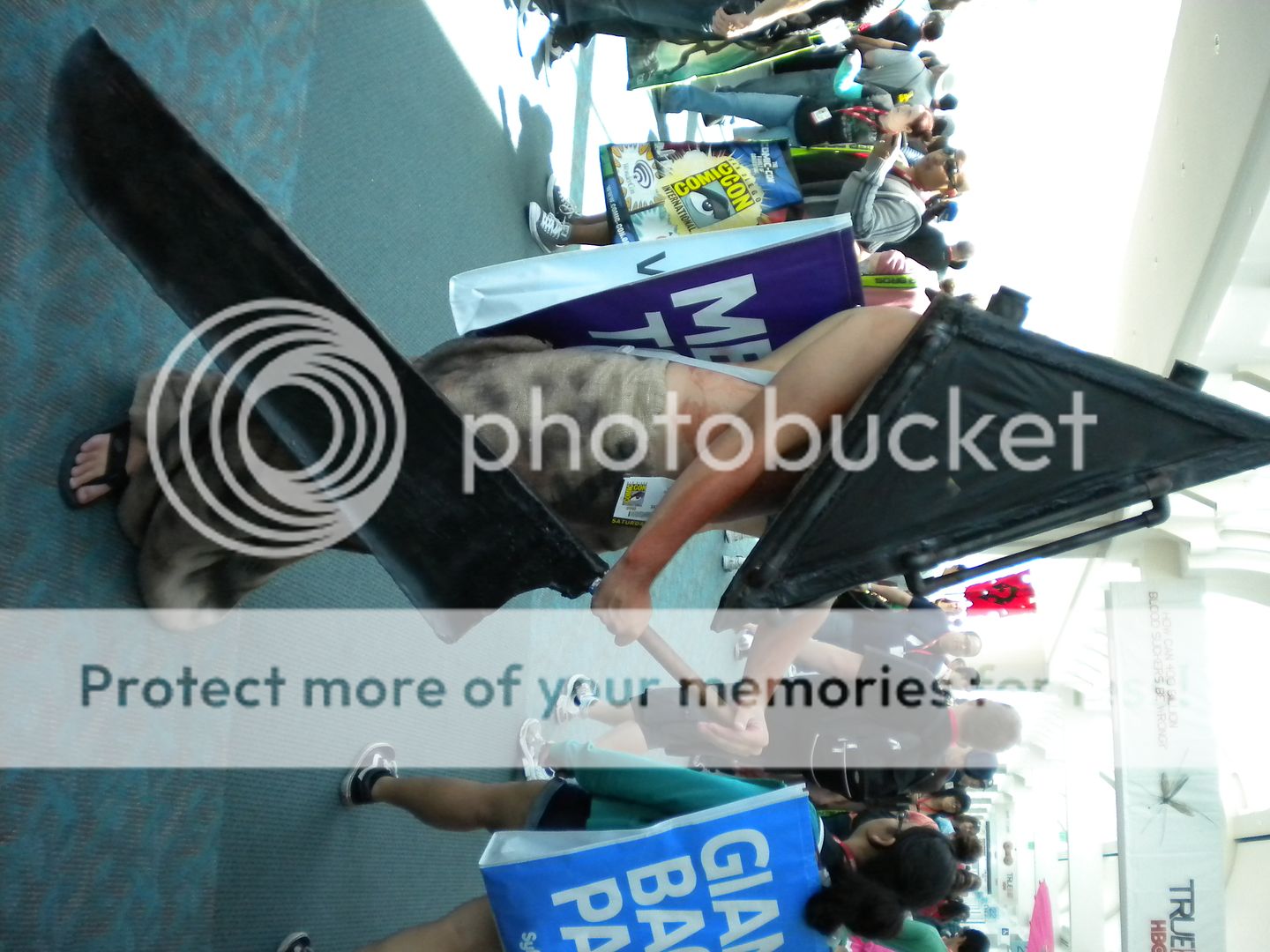
Incidentally, you can find much more photographic coverage of Comic-Con on our Facebook fan page. Become a fan, because this week, we will be announcing Comic-Con swag giveaways that only Facebook fans are eligible for.
~*ScriptPhD*~
*****************
ScriptPhD.com covers science and technology in entertainment, media and advertising. Hire our consulting company for creative content development.
Subscribe to free email notifications of new posts on our home page.
]]>
Day 2 of Comic-Con is over and now, the Convention is really underway! Today’s ScriptPhD.com coverage has a heavy focus on television, and sci-fi television to be specific. Really, is there any other kind? We spent time in the press room with the stars and producers of SyFy Channel hits Caprica and Stargate Universe, our favorite geeky physics show Big Bang Theory and the exciting (first-time ever!) Comic-Con Discovery Channel unveiling of their new scripted series Reign of the Dinosaurs. As always we try to pay hommage to the roots of Comic-Con with coverage of the design tricks behind comics and graphic novels. Additionally, we provide pictorial documentation of the costumes and happenings of the Con, and our Day 2 Costume of the Day. Complete coverage under the “continue reading” cut.
From the Press Room: Stargate Universe
We were delighted to start our day with the cast of one of our favorite sci-fi shows on the air, Stargate Universe, to get a little peek into the cast’s geeky sides and what they think of their characters and show.
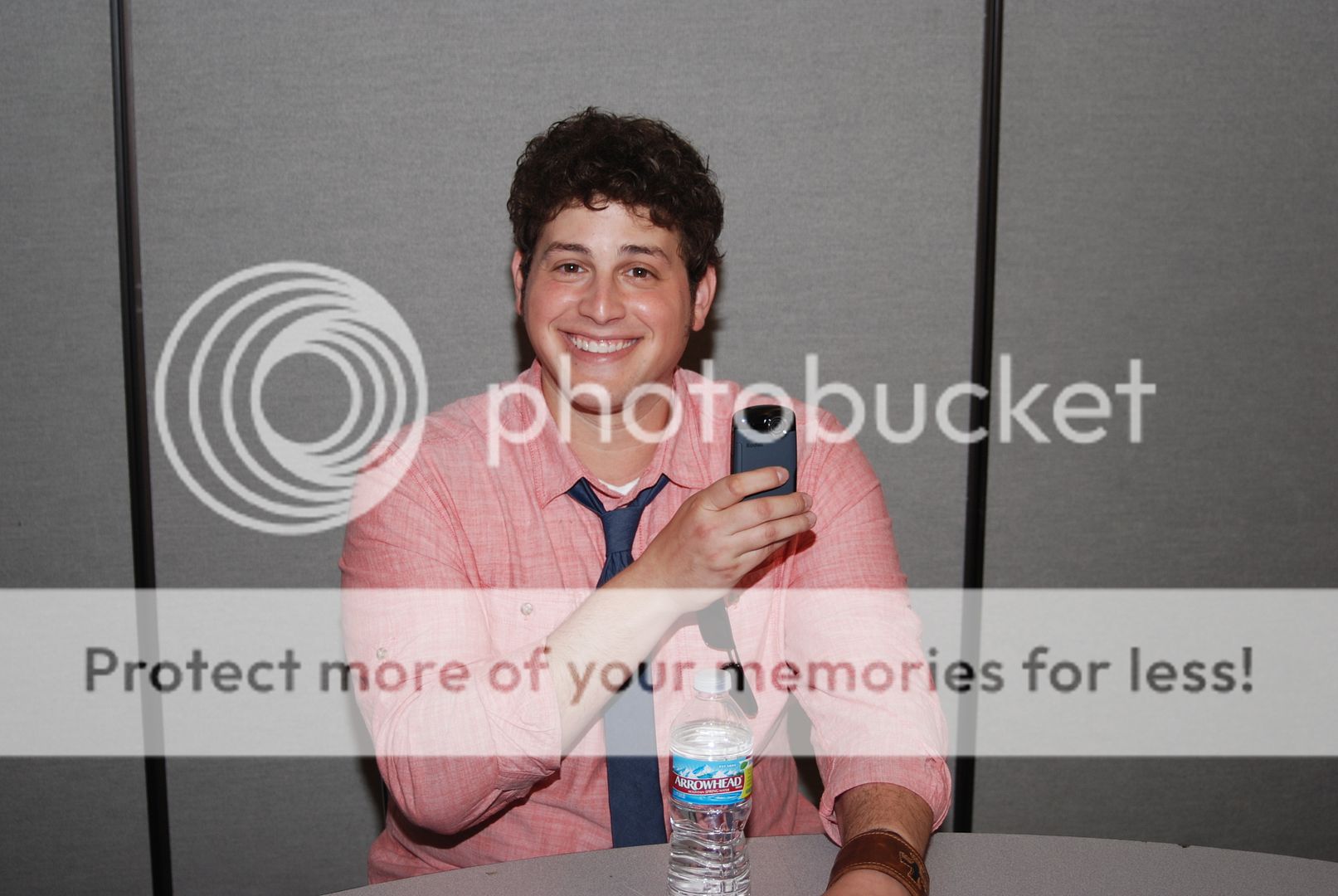
For star David Blue, playing the ship’s resident math geek Eli Wallace, this year is a completely different experience. Last year, there was so much uncertainty about the show’s acceptance and success, while this year, the cast walks into Comic-Con confident of where they are headed. He spoke of liking the idea of Eli as a hero, the show’s surrogate for the audience. Though he admits to being a geek, he was very hesitant to play the role when he heard about it, because of his previous computer nerd role on Moonlight for fear of typecasting. But Eli is not a stereotypical nerd, and experiences a lot more emotional and character growth over the course of Season 2. “I am proud to be a geek/nerd,” Blue says. “Everything from computer programming to comic books to video games.”
We were so thrilled to hear that David was a certified Grade A USDA organic geek, that we got him to proclaim so on camera for you guys:
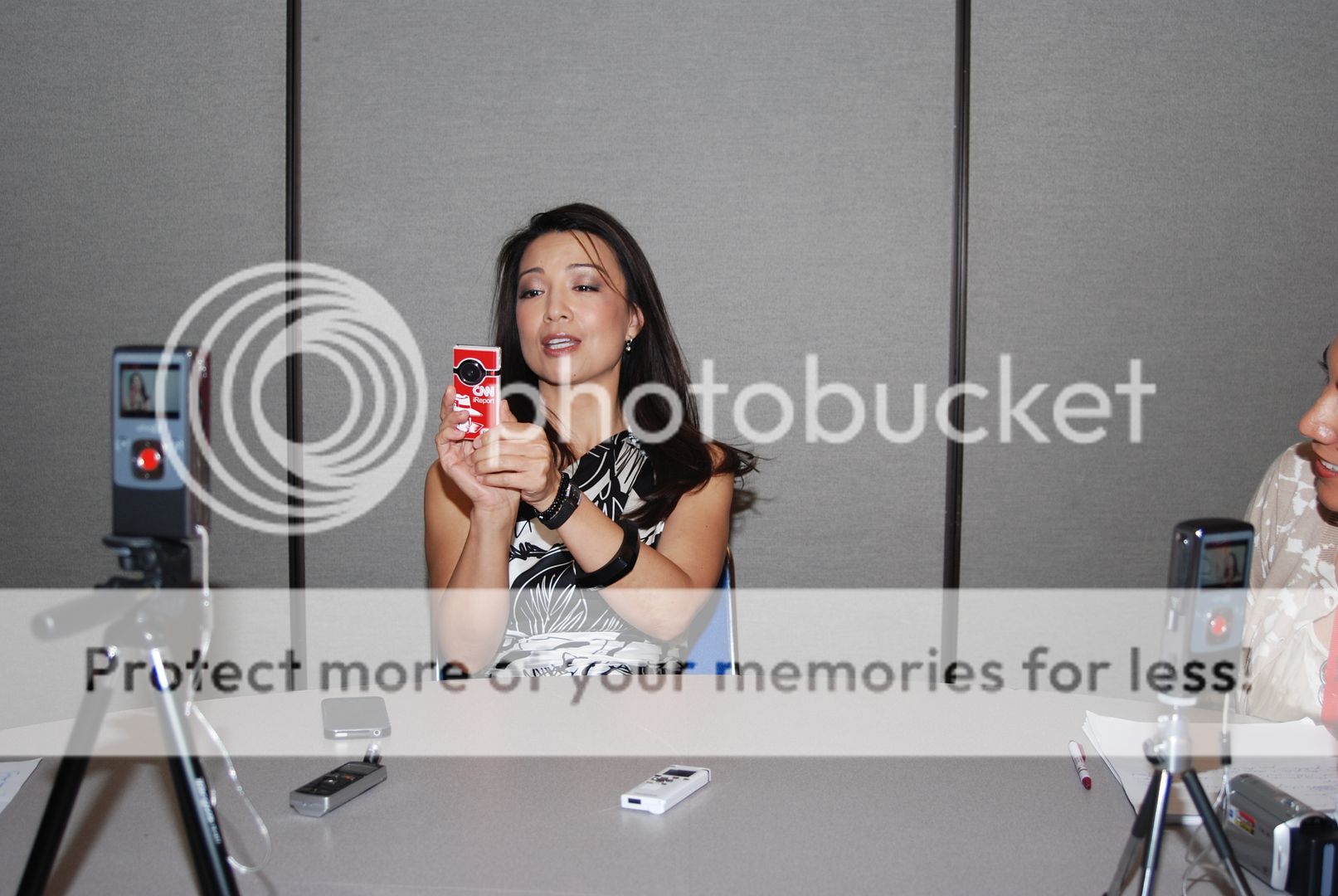
Ming-Na, whose character Camile Wray is far more controversial and decisive on the show, was asked right off the bat what she’d do differently in real life as opposed to her character. “Well, I wouldn’t be a lesbian,” the married actress quipped. Turning more serious, she said that she wouldn’t be as level-headed and calm as her character, who is often asked to make difficult, morally ambiguous decisions based on emotional issues. The fan’s response to Camile is largely a love-hate relationship. She’s gotten great response from the gay community, something that Na appreciates, but Camile’s escape from cliches or stereotypes is something that has resonated. The morally wrenching decisions are a staple of the show (and sci-fi television in general), and will only continue into Season 2. “You may not like her decisions,” says Na, “But I like her.”
From the Press Room: Caprica
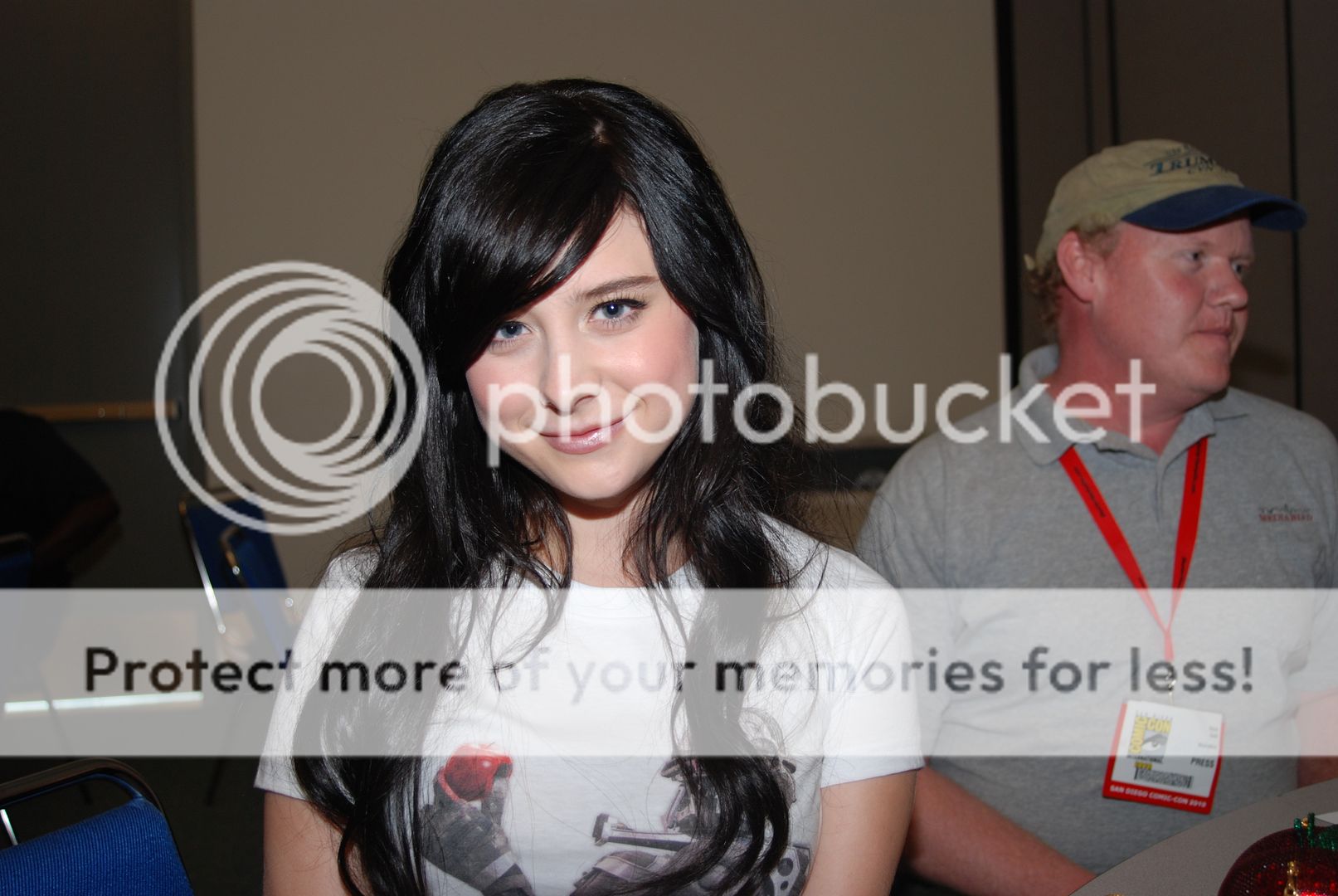
One of the most pivotal roles in the history of sci-fi television (the first Cylon) went to a girl that didn’t even really know the significance of the part. “I didn’t know what Battlestar was before I got the role,” admits Torresani, who was not a real sci-fi geek growing up. “I actually turned it down because I didn’t want to do [Caprica]. I wanted to do [Gossip Girl-type fluff]. It’s exciting now to [realize how important the role is], but it wasn’t nerve-wracking at the beginning. When I read the pilot, she was a spoiled brat, and then she gets in a robot. We didn’t know that I was going to be a Cylon. We just thought they’d use my voice and the robot’s body.” Filming the scenes as the Cylon, Torresani revealed, involves acting next to a giant green 7′ tall stick that everyone communicates with as the Cylon. She finds that the hardest part for her as an actress are scenes as the Cylon where she can’t communicate vocally, such as being lit on fire and not being able to utter a single word. “It’s really challenging. That’s something I never thought I’d have to do.”
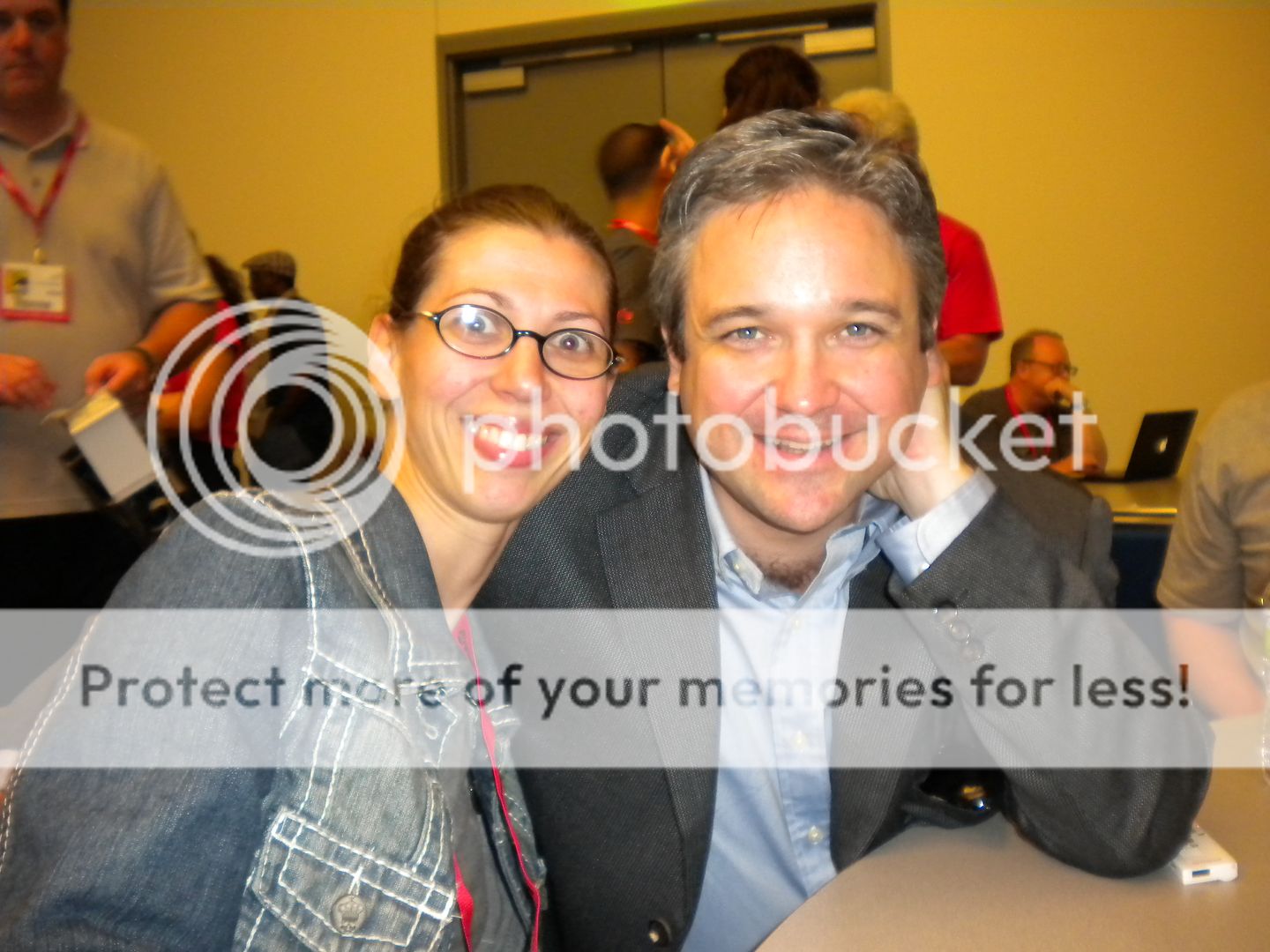
We started our time with executive producer David Eick with a humdinger—the question we know fans would want to ask. What has been the producers’ reaction to mixed reviews and fan division of the show, most notably from the Battlestar Galactica fanbase? “We knew to expect a much greater mix [of opinions] because we knew going in that we were not going to craft it or market it as a spin-off of Battlestar,” replied Eick. Rather than containing cheeky references to BSG or inside jokes only the audience knows, Caprica is very much its own beast. He hopes fervently that as the show finds itself and its own focus, that the audience, too, would find its own way in the show. He reminded us that the early days of Battlestar were equally contentious in terms of critical and fan opinions. “The very first Comic-Con we came to for Battlestar was like George W. Bush showing up at an ACLU rally.”
In many ways, he feels more challenged by Caprica, which lacks the ticking time-clock feel of BSG. It’s a more sophisticated style of storytelling, which is based in defining the characters and the world around then, Rome before the fall. The mythology of that world is deepened as the show progresses, and how it’s harnessed by Zoey to express herself. Eick spoke of how much more graceful and elegant Caprica is visually and content-wise, with Blade Runner being a huge influence on the producers and writers. By contrast, BSG had much more of a Black Hawk Down, action feel to it.
By the way, Ron and David have a longstanding tradition of taking a drink of tequila together before either a major show launch or major seminar/Convention. In fact, David brought the bottle and we all had a little fun. Kidding. But seriously, folks, next time you think the storylines on Caprica are getting a liiiiiiiittle wacky, just remember this picture:
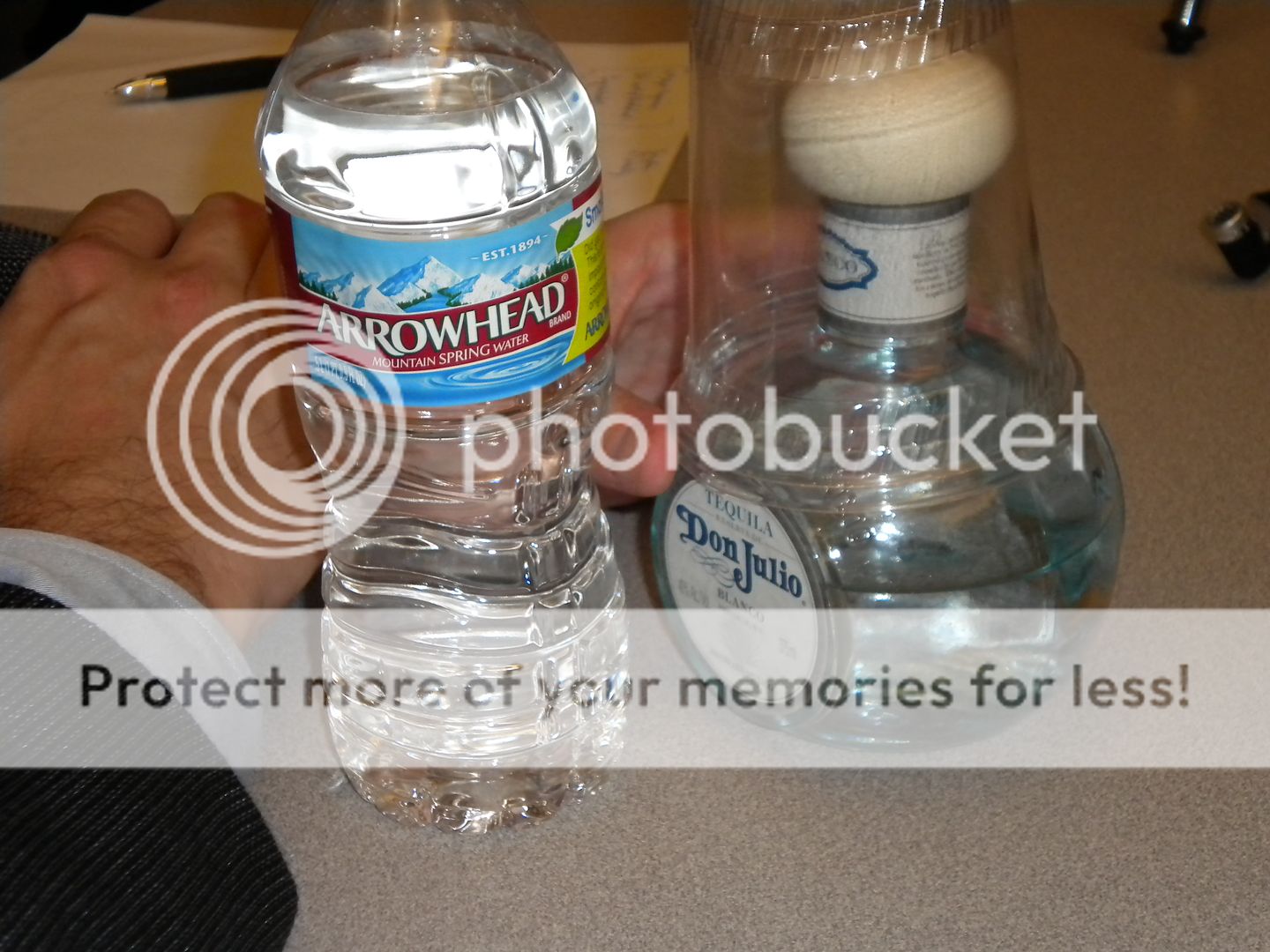
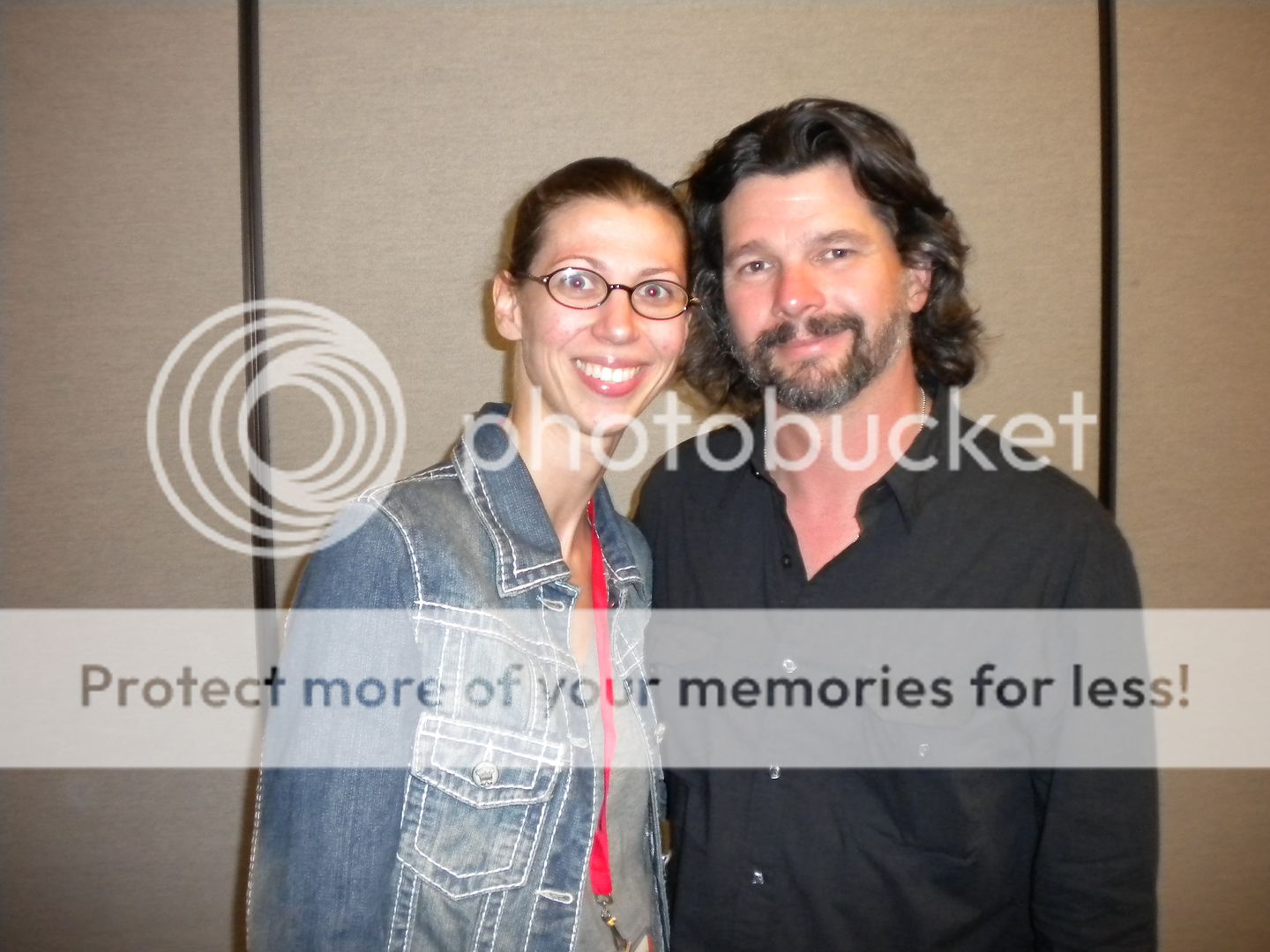
Ronald D. Moore, who made a rare media appearance at Comic-Con this year, largely echoed Eick’s comments. Caprica, he maintained is a serial, and (purposefully) as different from Battlestar Galactica as possible. In an even rarer move, Moore openly self-criticized himself for some of the early hiccups of the show. He admitted that it was hard to follow, that the story was indeed confusing, but that the show gained confidence as it went on. He predicted as strong of a build-up for Caprica as the eventual success of Battlestar Galactica. Another fun tidbit that Moore revealed was that the group marriage concept was tossed around for Battlestar Galactica, but just never found the story or the characters to make it happen.
We asked Ron about his thoughts on the current state of sci-fi and what he enjoys. “I’m probably not up to speed on a lot of other science fiction,” Moore said. “I almost avoid it now because I spend so much of my time in a science fiction world that I tend not to go there. It becomes almost like more work to watch other science fiction shows. In my brain, I’m inevitably thinking ‘How does that compare to us? And that’s their structure. How many characters do they have? I wonder what their CGI budget was.’ I haven’t watched a lot of other science fiction television for that reason.” Nevertheless, he maintains that it’s a thriving genre that will always be with us, despite the rise and fall of popularity. The one holy grail Moore hopes for is a broadcast network (read mainstream) sci-fi hit. He isn’t sure what the reason is that this popularity has remained so elusive, LOST notwithstanding. “Maybe it’s just us,” he mused. “Maybe it’s just us [the collective sci-fi geekdom], and there’s not this gigantic mass market for it in television in the way that there is a gigantic mass market for movies. Maybe that will never happen.”
We here at ScriptPhD.com hope otherwise.
From the Press Room: Big Bang Theory
If Ronald D. Moore is concerned about the viability of a basic network science fiction hit, at least he can take solace in Big Bang Theory, arguably the smartest, most successful, streamlined show about science and scientists in the history of television. We had such a fun time hanging out with the actors last year, that this year, with access to the full production team, we decided to get as much scoop from the show as possible.
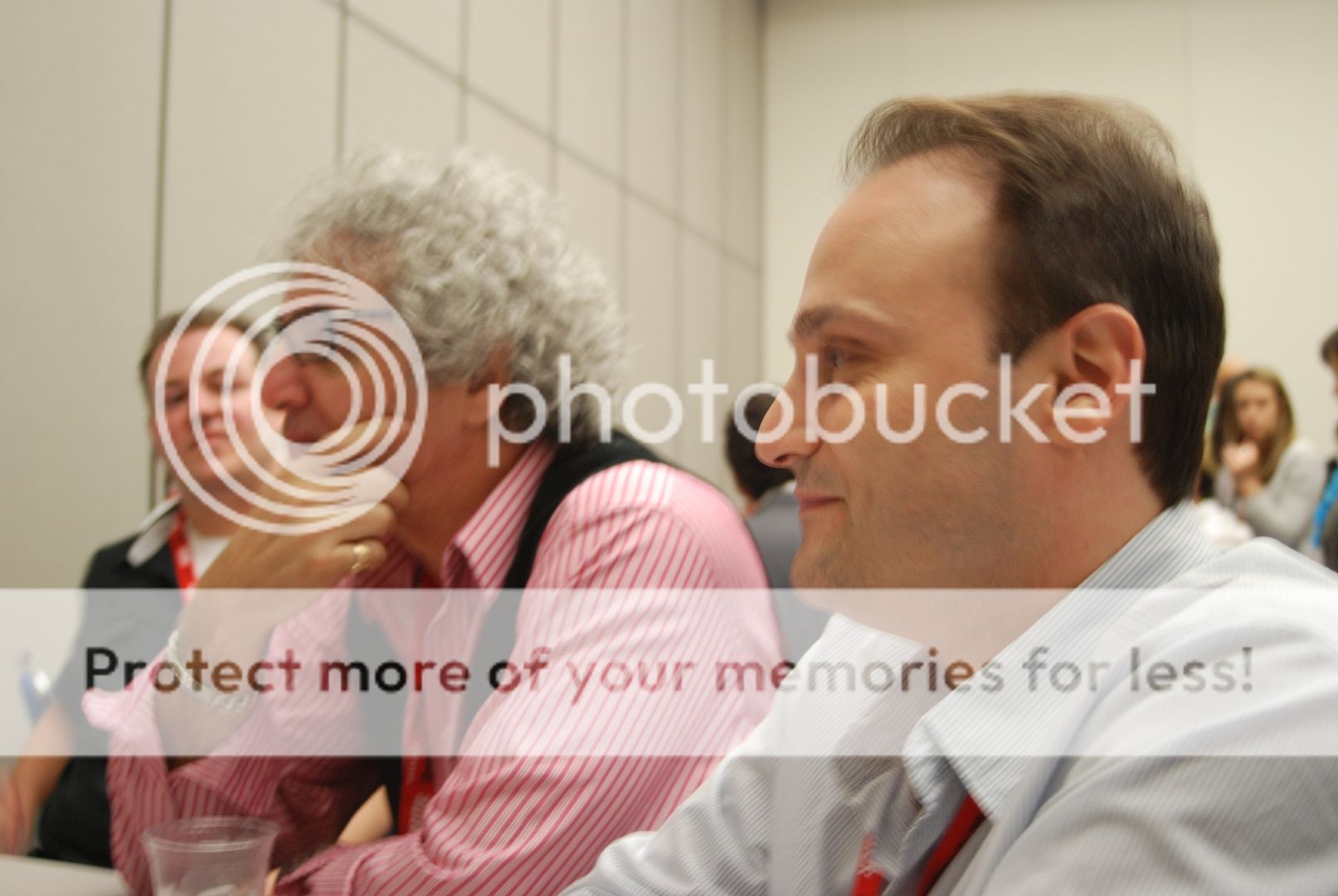

One thing fans would be surprised to learn, and the first question we asked right off the bat, is just how geeky the team behind Big Bang Theory is. Producer/writer Lee Aaronson, a self-certified comics and graphic novel geek, used to own his own comic book store. This is where a lot of the inspiration for Sheldon (and the rest of the team’s) love of geek culture comes from. They also have a close relationship to UCLA physics professor and the show’s science advisor David Salzberg. Often, they will write a line like “Hey guys, I was just working on [insert science here]” and let him fill in the blanks. We were wondering about that, too!
Geeky enough? Not even close. Showrunner and co-creator Bill Prady is a former computer programmer. He’s far more excited about Apple founder Steve Wozniak guest starring on the show than any fame or fortune that has incurred because of it. He and
co-creator Chuck Lorre maintained that the geek culture was their most important singular focus in writing the show. As one might glean from walking the halls of Comic-Con, they maintained that all geeks/nerds/scientists are not the same. There is a lot of heterogeneity amongst them, and differing, personal passions—be they Star Trek or the mathematical concepts behind string theory. And where do they get all their geeky throwaway lines? “Oh, those are all available on the internet!” And THAT is why we love Big Bang Theory.
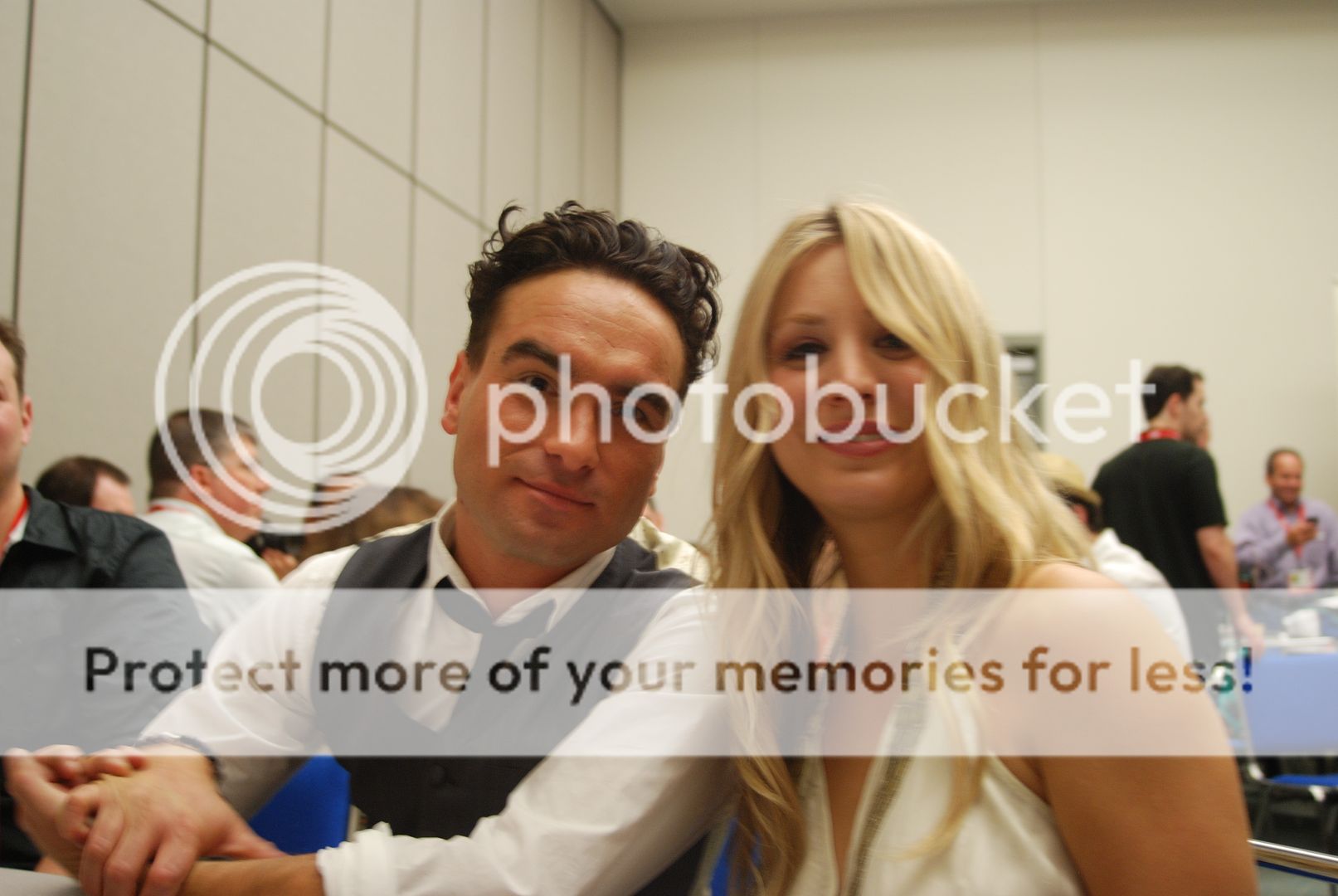
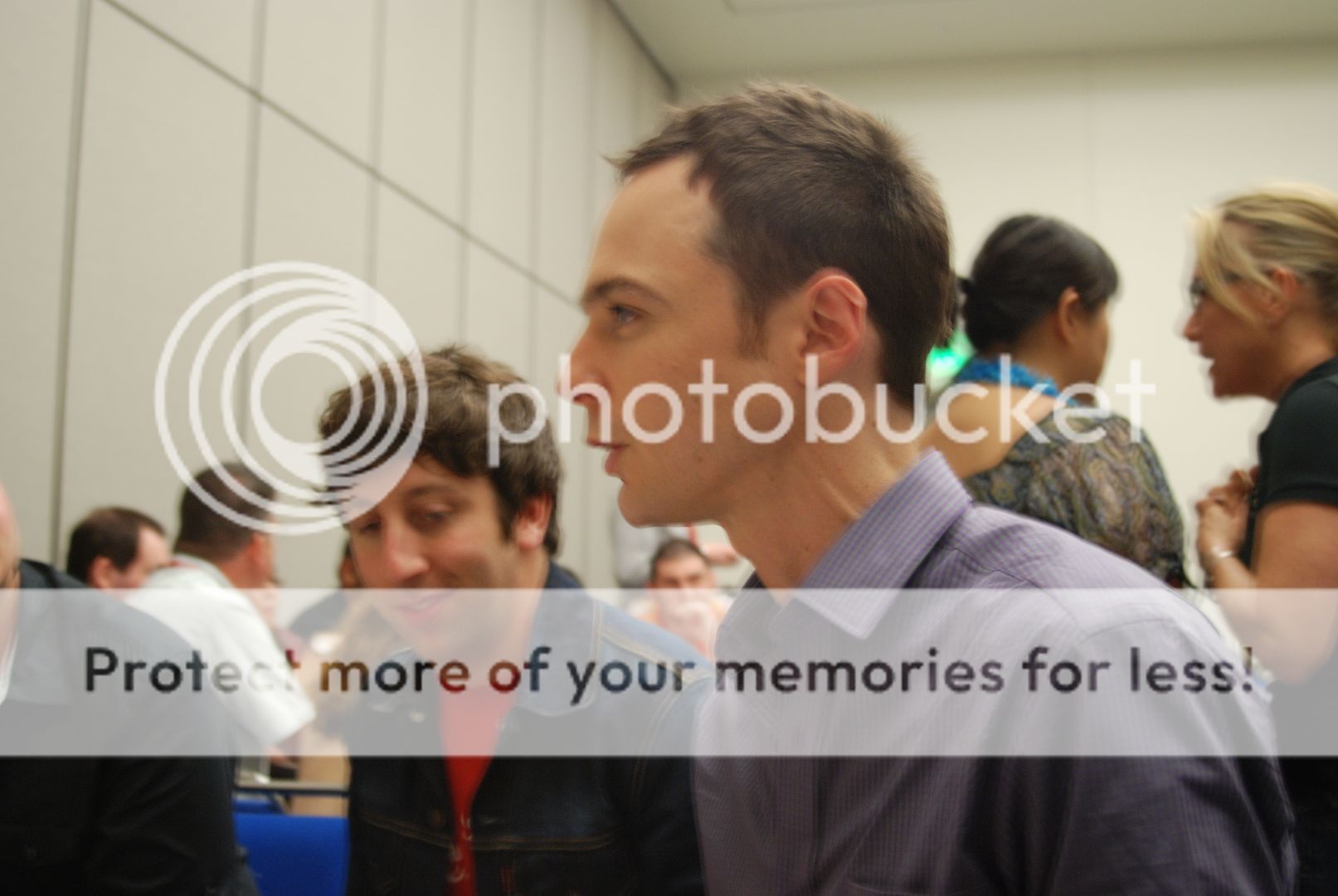
The actors themselves get right in the thick of the fun. Kaley Cuoco, playing perhaps the non-geekiest of the bunch in Penny, has nevertheless embraced geekdom. Her latest love? Her iPad! She and Johnny Galecki would both like to see a romance blossom between Penny and Sheldon (“Peldon,” joked Cuoco), but acknowledge that the road from platonic friendship to romantic involvement is filled with bumps and individual growth. Jim Parsons, who I shamelessly adore, started his time with us by telling me to shove it. He was, of course, talking about my tape recorder, but when I joked that I couldn’t believe Sheldon told me to shove it, his reply was: “And he’d tell you to shove it again and again!” Before telling Simon Helberg to bite him. Nice to know he stays in character so well!
We couldn’t leave a Big Bang Theory press room without getting our favorite superior elitist nerd to do something only for ScriptPhD.com fans. So here you have it, kids. From Jim Parsons, to you… a personal “Bazinga!”
Comics Design

One of THE most fascinating panels that we attended at Comic-Con so far was on the design secrets behind some of your favorite comics and book covers. A panel of some of the world’s leading designers revealed their methodologies (and sometimes failures) in the design process behind their hit pieces. An unparalleled purview into the mind of the designer, and the visual appeal that so often subliminally contributes to the success of a graphic novel, comic, or even regular book. We do, as it turns out, judge books by their covers.
We will be revealing each designer’s comments on their thought and art process, but are waiting for images from the panel to be emailed to us. So consider this a placeholder until we can finish this writeup and include it in Saturday or Sunday’s coverage. Stay tuned . . .
Graphic Novels: The Personal Touch
(From our correspondent Bryy Miller)
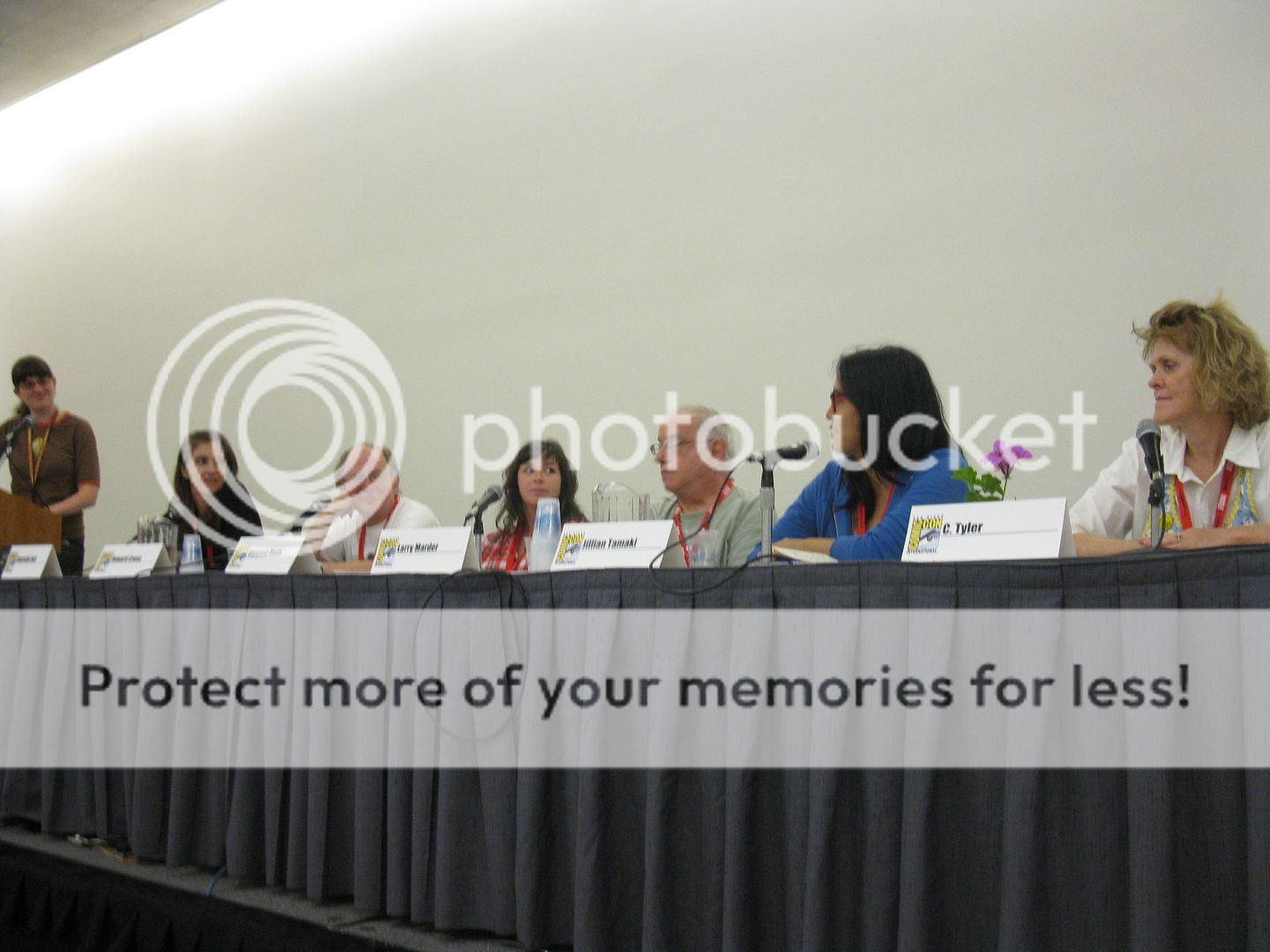
Some panels have mysterious names, some not so much. This one belongs in the latter category. There was no hidden meaning behind the phrase “personal touch.” This was all about the writers (Gabrielle Bell of Cecil & Jordan in New York, Howard Cruse of Stuck Rubber Baby, Vanessa Davis of Make Me A Woman, Larry Marder of Beanworld, Jilliam Tamaki of Skim, C. Tyler of You’ll Never Know, and moderator Shaenon Garrity of Skin Horse). More importantly and interestingly, it was about who they were. Some didn’t know who they were, others did, but they all knew one thing: that something inside of them needed to write.
Tamaki started off the discussion by stating perhaps the simplest answer of why she writes what she does, “I think that’s the only kind of book I wanna make.” Davis continued by adding that “anytime… it’s going to have a personal touch. Comics can soak up the people’s idiosyncrasies and sensibilities.” Marder, perhaps the odd man in the group, stated that even though his autobiography is a FANTASY, it still is an autobiography in the sense that it tells stories about his own feelings. Before anyone else could chime in, C. Tyler (arguably the oldest member of the panel) shot to life with an amazing amount of energy and playfulness. “I’ve taken autobiographies for granted.” she started “I know we’re at Comic-Con, but I hate superhero comics. When I read the first autobiographical comic, I was floored… it was disturbing and in a comic.” She went on to describe how she is fascinated with the idea of putting yourself out there, grabbing pieces of scraps from the table and showing us as if they were her life story – or even her creative process – in visual form. She would get extremely animated, and it really helped to humanize the element of the mysterious writer’s block and constant internal struggle to find how to portray your story. She ended her opening remarks with this, “the personal touch for me is I do it all by hand.”
Bell was the most reluctant to speak, but also, besides Tyler, the most visual. Not in the sense that she was very gesticulative or alive, but that she obviously was thinking very hard but having trouble in how to phrase her thoughts. “I try to cut my personal touch out,” she started, displaying the classic writer’s twitch of not looking directly at her audience “[I try to] make it universal. Professional.”
This instigated a very visceral response from Tyler, who on the spot tried to get into an earnest conversation with her fellow comic artist about what it means to be professional. Sadly, it didn’t last that long as Bell migrated back into thought. Cruse then brought up the point that, if your content is good, then mistakes in your craft are easily overlooked by a reader. The discussion (because calling it a panel at the end would just feel weird) had reached its time limit. Cruse gave some parting advice to young writers, “It will literally paralyze you to think of how many people have an idea similar to yours.” Marder stated that you have to fail in public. Garrity reminded everyone to heed that advice, as “Carol, Larry, and Howard have been in the comics since the seventies.”
Tyler let out a self-taunting gag.
Reign of the Dinosaurs

the Dinosaurs creative team (from left to right): Pete Von Sholly, Mishi McCaig,Tom DeRosier, David Krentz, Ricardo Delgado and Iain McCaig. (Executive producer Erik Nelson speaks on the jumbotron.)
In November of 2008, the hoi polloi at Discovery Channel approached producer Erik Nelson (Grizzly Man) with a simple request: “the ultimate kick-ass dinosaur show.” They poured enormous resources, creative and fiduciary, to create a television series that will truly break ground, both for Discovery Channel and its own medium. Scripted, yet unnarrated, scientifically stunning, yet bereft of the omniscient “talking head” paleontologist, Reign of the Dinosaurs is the ultimate exercise in “show don’t tell.” Premiering in the Spring of 2011, Reign will consist of 36 self-contained episodes erected from the art up. The stories will be chronological, detailing the rise, reign, and ultimate extinction (with a twist!) of the dinosaur species. But unlike the plethora of educational shows that cover the same topic, these will be rooted in storytelling, in treating the dinosaurs not as dinosaurs, but characters with whom we share an emotional connection. Trust me, having seen the first few world-premiere clips, you will care for these creatures, and the show will both exhilarate you and break your heart.
The true key to the success of Reign of the Dinosaurs was a dedication to amassing cream of the crop talent, formerly of Disney and Pixar, which allowed them to channel superlative animation and design talents towards an ambitious format. Along with Nelson, the team (and Comic-Con panel) consisted of renowned artists Ricardo Delgado (Dark Horse’s Age of Reptiles), Tom DeRosier (Lilo and Stitch, Mulan), self-proclaimed dinosaur nerd David Krentz (Disney’s Dinosaur, John Carter of Mars), Iain McCaig (Star Wars 1, 2, and 3), Mishi McCaig (Iron Man), Pete Von Sholly (The Mask, Darkman). Along with showing the audience their two (so-far) completed “cold open” teasers that will open episodes of the show, several of the animators simulated storyboard pitches (see picture below), just like the ones they would exchange in a writers’ room for several forthcoming episodes.
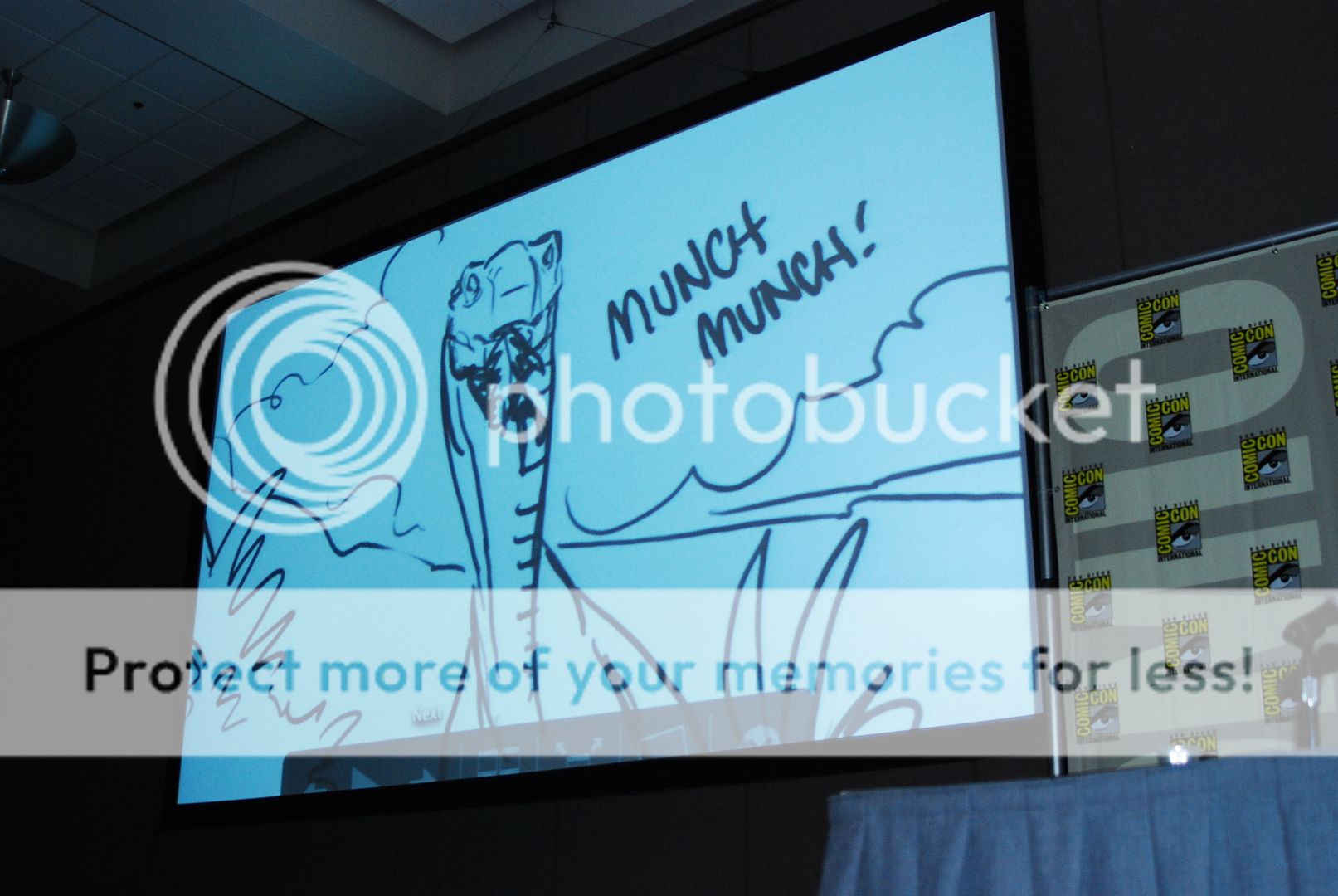
Several things impressed me upon the early viewing of Reign of the Dinosaurs, aside from the stunning art direction and well thought-out design. First of all, this show is really cheeky and funny. When the writers say that they’ll give the creatures personalities, they mean it, and it’s all done through expository action rather than showy narration. An early cold open has a dinosaur, trying to soothe her babies to sleep in the wee hours of the dawn, annoyed at the incessant chirping of a smaller dinosaur deep in the forest. Finally, she marches over and does what a dinosaur would do: bites the head off of her more annoying, diminutive co-habiting pest. Literally. Secondly, the stories pack an emotional wallop. A cinema-quality sequence shown at the end, taking place post-impact of the asteroid that ultimately killed off the dinosaurs, has the post-apocalyptic feel of Cormack McCarthy’s The Road (which the illustrator said influenced him) and visual appeal of Blade Runner. The ending, a hopeful coda on the extinction of the dinosaurs as an evolutionary stepping stone for our modern birds, had me sobbing. And then giving the panel a standing ovation.
Spring of 2011 is far away in television terms, but close enough for me to say this. Be excited, folks. Be very, very excited.
From the Press Room: Reign of the Dinosaurs

Not only did we get treated to a front-row preview of Reign of the Dinosaurs, ScriptPhD.com was extraordinarily fortunate to join the Discovery creative team for an intimate roundtable discussion panel after their panel. We were able to get enormous insight into the team’s collaborative process, storytelling aims, and dedication to balancing scientific accuracy with emotional connection, all while reinventing an entire medium. Ambitious? Just slightly.
One of the first things that impressed me upon talking to the Reign of the Dinosaurs team after their panel was their sheer dedication to, almost obsession with, “getting the science right.” Mishi McCaig and Iain McCaig spoke at length about the team’s dedication to nearing the line between science and entertainment. Hugely important to the project was the involvement of renowned University of Maryland paleontologist Thomas Holz, Jr., who cross-checks and gets pitched all the storyboard ideas. The behavior depicted in the show is speculative, but based on facts. This includes the animal’s muscle movements, how they would hunt prey, how they would interact—all aided by the paleontology knowledge of illustrator Dave Krentz. Ultimately, the team wants interest in the show to launch a more widespread educational initiative, which will include a Discovery multi-media website, and other supplementary materials to the show itself. Even when stories delve into the outrageous or fun, they’re rooted in research. A clip depicting high dinosaurs hallucinating was rooted in the marula tree, whose hallucinogenic fruit animals will eat and get high off of.
Producer Erik Nelson and illustrators Tom DeRosier and Ricardo Delgado spoke at length about the collaborative process of making the show, which they described like a TV writing room, only with animators. “Everyone’s sensibilities came together in a ‘hive mind’,” said Nelson. This visionary approach was important to the team, which is essentially trying to reinvent a TV genre. The last non-narrated, no-dialogue animated show was Walt Disney’s “Silly Symphonies” back in 1938. Needless to say, we’ve come a long way since then. The team was amazed at how constructing the dinosaurs’ stories moved them, comparing their effort to “March of the Penguins,” another simple vehicle showcasing animals that was rooted in an emotional audience response. This empathy for the dinosaurs peaks with the show’s conclusion, in which the dinosaurs die out (spoiler alert!), but which is still painted in an upbeat, survivalist way, as most geologists and paleontologists agree that modern birds are the direct evolutionary ancestors of dinosaurs.
“We’re not trying to hook you as a dinosaur person,” concluded Delgado. “We’re trying to hook you as a human being.”
Two last fun tidbits from today. Last year, on Day 3 of Comic-Con, we got geeky in the press room with our friend Barry of The Ugly Couch Show. When we saw each other again this year, we thought we’d start an annual tradition. So here it is, ladies and gentlemen. Two very tired, cranky, overworked press corps members getting silly in the press room:

And last, but definitely not least, is a very worthy Day 2 Costume of the Day. These ladies hit it out of the park. Bonus points if you can tell us which comics they’re representing:
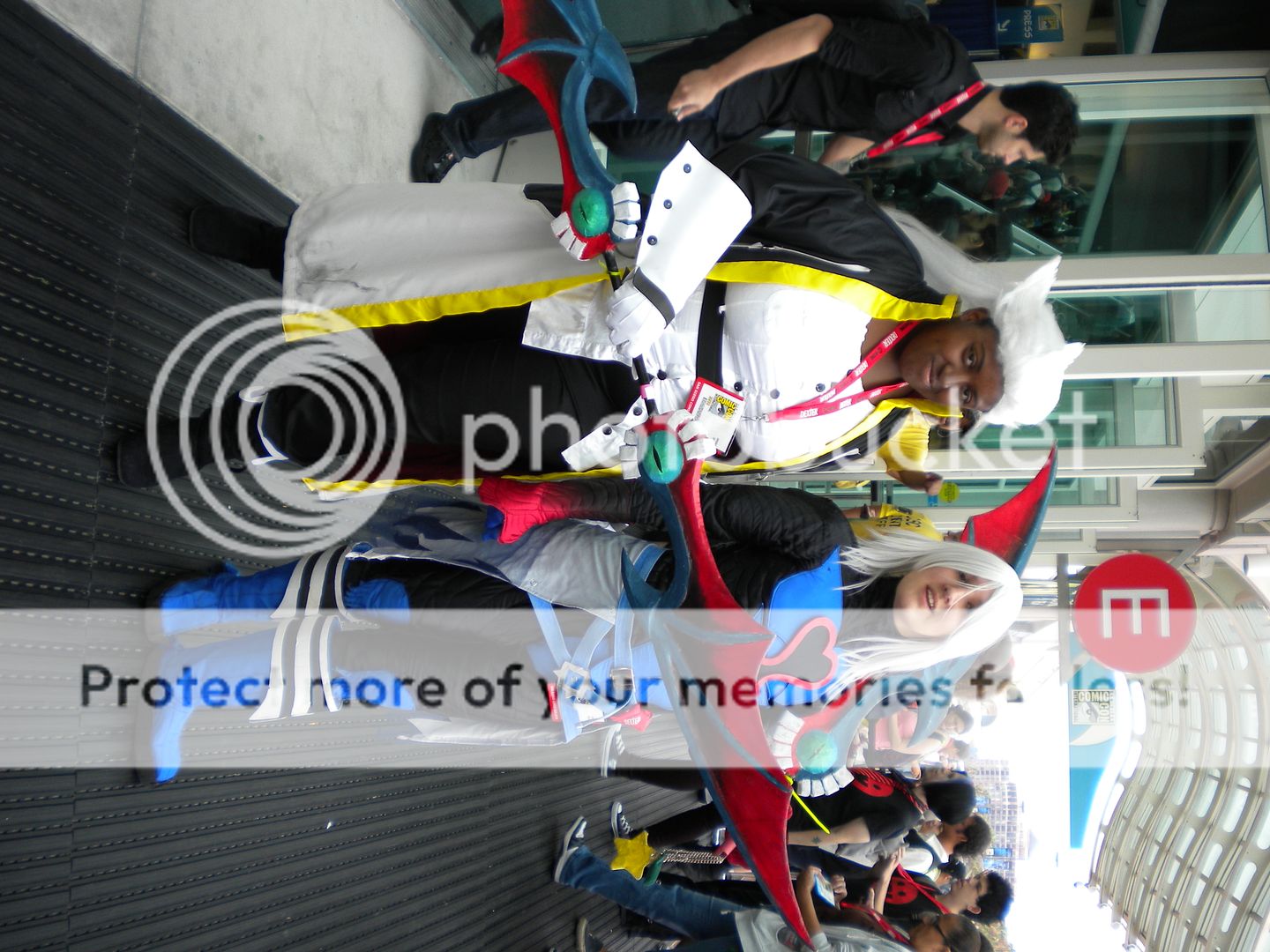
Come back tomorrow for more geeky sci-fi fun! And don’t forget to become a fan of our Facebook fan page for extra Comic-Con photos and a chance to win amazing surprise swag when we get back from San Diego.
~*ScriptPhD*~
*****************
ScriptPhD.com covers science and technology in entertainment, media and advertising. Hire our consulting company for creative content development.
Subscribe to free email notifications of new posts on our home page.
]]>
Greetings from sunny San Diego, everyone! ScriptPhD.com is in the absolute epicenter of sci-fi, comics and the illustrative arts: Comic-Con 2010. Armed with a press pass, our wonderful correspondent Brian Stempien of Lefty Films, and an industrial-sized vat of Purell, we are proud to bring you four-day coverage that spans the nexus of sci-fi, graphic arts, design, technology, film, television, and of course, the forum that started it all, comics. Day 1 coverage includes an array of panels covering the origins that drive an artist’s imagination, the future of cultural arts in a digital age, the future of space exploration with Iron Man’s Stark Industries as a model, good sci-fi, bad sci-fi, sci-fi that will change your life, and a conversation with two leading visionaries of the sci-fi genre, J.J. Abrams and Joss Whedon. ScriptPhD.com also got to chat with the stars and producers of our favorite forensics show, Dexter. Plus, we have a little secret teaser interview with a certain MythBusters star that we’ve been teasing for a good while now! As we always do at Comic-Con, we pick our Costume of the Day as part of our compete Day 1 coverage, under the “continue reading” cut.
The Spark of Imagination

What better way to begin a four-day celebration of visual imagination than a panel of distinguished artists and designers discussing the “spark” that originates imagination, how to harness concepts and ideas, and how they feel imagination informs the creative process. The panel consisted of Tony DiTerlizzi (illustrator of The Spiderwick Chronicles), Travis Knight (lead animator of Disney’s Coraline), Hellboy creator/writer Mike Mignola, Kung Fu Panda director John Stevenson, Doug TenNapel (illustrator/writer of Earthworm Jim), and moderator Geoff Boucher of the LA Times blog The Hero Complex.
Let’s be honest, creative types are weird, weird people, me being one of them. Unequivocal unanimity was reached that this very oddness, which might alienate a person from the mainstay of society, was the very fuel that drove creativity and imagination. Tony DiTerlizzi recalled being a daydreaming doodler from elementary school onward, never listening to anything his teachers or figures of authority said to him, almost inhabiting his own world. (Sound familiar, creative readers?) Travis Knight concurred, adding that spontaneity, a side benefit of idiosyncrasy, is absolutely essential to the core of imagination. Artists never really grow up; they start out as hermits hiding in basements, grow into high school kids that get shoved into lockers, and end up playing with dolls as adults. But in a way, he added, it’s wonderful and liberating to live on the fringes of society, to see things in a way that adults have forgotten how to. Hellboy creator Mike Mignola expressed amazement and awe at people wiling to be brave enough to create things for the sake of creation, even if it will never see the light of day. “Let’s face it,” Knight sighed. “There’s something wrong with us.”

Recognizing and managing productive imagination when it happens were also a popular consensus among the group. It’s really easy to come up with stuff, maintains Doug TenNapel; it’s not really a special gift or ability and we all have it to some degree. The hard part is the execution in all forms of art. There are millions of ideas that will cross through our minds that will never see the light of day not because they’re not good, but because they aren’t viable. To develop those skills of managing and presenting ideas and putting them to use so one can make a living off of them, an artist has to become an “imagination editor” that parses out the ones that matter. Thank goodness Mignola refined that skill, or Hellboy never would have seen the light of day. He’d been drawing for years at conventions and other comics gatherings, usually on-demand for fans. After endless renditions of popular figures such as Batman, the fans wanted something more original, and Mignola sketched an early, rough inception of what would become Hellboy. Later, when asked to contribute a monster to a convention comic book, he recycled the character, drawing “Hellboy” on his belt to fill a blank spot on the page. Only later, when Mignola wanted to do his own comics, would the stories and three-dimensional world grow around that original central character.
DiTerlizzi also utilizes a character as a focal point for his stories. In order to care about a world, he reminded the audience, you must first care about the character that will inhabit it. How to come up with these characters and worlds? Research, imagination, and life experience! In researching a new character for Coraline, a model, Travis Knight watched YouTube videos of runway models. His biggest regret as he walked the halls of Comic-Con was seeing so many sequels, rehashes and remakes of 1980s TV shows and recycled concepts, and such a paucity of new thinking and bold ideas. This, Knight maintained, is the driving force for the future group of designers and illustrators.
Ultimately, making movies, TV shows, and even designing is inherently a collaborative process, one that the artist must accept if they want to derive the pinnacle of their imagination. John Stevenson ended the panel by emphasizing the three key concepts of successfully harnessing imagination: collaboration and sharing (all too lacking in the modern, fearful world of design and illustration), inspiring the people you’re working with as a leader, and thanking people and showing appreciation for those that have contributed to the betterment of a project.
Be inspired. Create. Let your imaginations soar!
Iron Man and Rocket Men: Is Stark Industries an Appropriate Model for Private-Industry Space Exploration?

Iron Man was easily one of our favorite sci-fi movies from the past couple of years… and really, what was not to love? Geeky gadgets, innovative applications, and a true purview into the scientific discovery process (more on this later). More than a few mainstream publications have noted the strong ties the movie has to innovation (a couple of good ones can be found here and here). But a bigger tie-in can be argued between Tony Stark himself and the government contractors that constitute the vast majority of the space infrastructure, most notably NASA. So when we saw a Comic-Con panel devoted to exploring this very topic, we jumped at the chance to catch some of the action. Leading New Space entrepreneurs Mark Street (XCOR Aerospace) and John Hunter (Quicklaunch) joined Chris Radcliff (SD Space) and Dave Rankin (The Mars Society—San Diego chapter), with moderator Jeff Berkwits (former Amazing Stories editor) gathered to discuss what is right and wrong with NASA, and how the presence of small businesses can only help quicken the ‘space race.’
First and foremost, let’s define New Space. When we talk about Stark Industries, for example, we are talking about the most extreme example of the tech-based industry, representing the Lockheed Martins and Boeings (and to some degree NASAs) of the world—funded by the government, developing missiles, rockets, and even top-secret projects. New Space, and the small, innovative companies that are leading the forefront of its revolution, represent realistic opportunities for outer space exploration. They are Tony Stark working in his basement, on the cheap, on experiments that no one is seemingly interested in. In this case, it’s the idea of making space exploration available to ordinary people, not just military or astronauts.
The first half of the seminar consisted of a very heated argument about why more companies have not been able to take the lead in space exploration and where, exactly, NASA has stagnated so much. Mark Street pointed out the dichotomy between the entrenched business models of industry versus small companies, some of whom are already launching innovative space solutions and making a profit off of them. The established market, on the other hand, has a steady source of defined income, and no real incentive to decrease costs associated with space travel, which will take lots of investment and trial and error. Boeing isn’t building the next rocket, per se, but they are building airplanes thanks to already established rules and comfort zones. Smaller companies are ultimately able to address these problems thanks to risk-taking, failure, learning lessons, and innovating. John Hunter likened NASA to a modern March of Dimes, a philanthropic organization that was relevant back in the 60s, when it helped cure polio, but has since usurped 90% of donations for cost overhead and only 10% for actual causes that it supports. NASA’s budget of $18 billion consists of 70% “legacy” projects and 30% new innovation. What they need, he claimed, is new thinking, new risk taking. During the space war with Russia, “some of the dumbest guys I knew were looking for jobs at NASA,” Hunter maintains. “Because they knew they could study vortexes coming off of golf balls for the next twenty years.” Ouch.
To Dave Rankin, this was somewhat unfair. He invoked the sign at the X-Prize launch of Spaceship 1: “Spaceship 1: 1, NASA: 0”. To be sure, the X-Prize accomplishment was a worthy one, but NASA has been launching human beings to space stations for years, and they are still the only ones with a proven track record in the United States. Part of the problem is that because NASA is subject to political whim, it has no clear-cut focus with its identity (does it launch rockets, do basic research, innovate new technology, etc?). That lack of risk-taking at NASA is where you wind up with stagnation; it’s so big, with so many stake holders, that the sheer size lends itself to bureaucracy. The panel also brought up NASA’s two shining stars: the Jet Propulsion Laboratory in Pasadena, CA, and the Hubble Space Telescope. While JPL provides some of the world’s best robotics, such as the Mars Rover, the photography coming from outer space is simply amazing. “You can’t put a dollar value on some of what NASA does. It’s who we are as human beings, but you can’t make a profit off of it. As humans, we have to keep looking into what are the places of the universe and how did we come to be here,” said Chris Radcliffe. Quipped Rankin: “Let it not be said that government does not fund the arts.”
Take a look at a video of the first commercial launch into space:
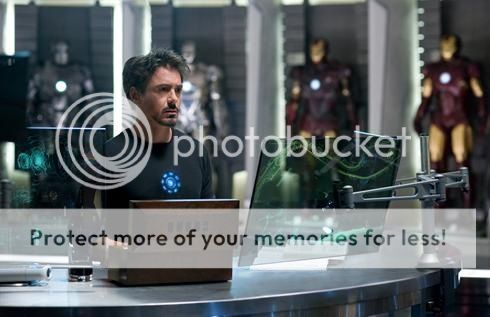
The inspiration for New Space exploration—for sticking Tony Stark into a basement—is that we need some more inspiration from space exploration than we are getting from traditional launches, and that will involve sending more people into space. Chris Radcliffe gave an example of a young engineer working at Hewlett-Packard in its early days who had the brilliant idea that computers could be more than technical devices; they could be personalized, streamlined, and made accessible to everyone. Hewlett-Packard didn’t agree, so he formed his own company and made that computer. The man? Steve Wozniak. The company? Apple. The computer? The Apple I. Like many of the companies comprising the New Space revolution, the design process in Iron Man is from top down, but the fun part is in the testing—you never quite get the process right the first time around.
Overall, the panel was very optimistic about the future of space travel and exploration, but emphasized the importance of spin-offs and small companies as a means to accomplish that. The biggest hurdles they will face is lowering prices of going to space, and overcoming the bad publicity of any first deaths that may come from the danger factor. Foreign competitors will have an even bigger role in driving our exploration. China will keep us on our toes, as they are very good at taking an idea, copying it and productionizing it. What will be the role of these companies in space exploration? Chris Radcliffe is pretty sure that space tourism will succeed, but that it will only comprise about 5% of the market. But it will be enough to drive producing vehicles and rockets and spacesuits and supplemental research off of things that will make money. The NASA CRuSR project, for example, takes existing suborbital platforms and doing science (in this case access to space for a reasonable cost) that they otherwise could not do on their own.
One of the more lighthearted moments, amidst a lot of PhD degree flaunting both from the panel and several people who asked questions, was a gentleman who prefaced his question by saying “I work in a coffee shop.” The reply from the panel: “You’re my hero!” While he respected space exploration as an ideal, he wondered whether the enormous cost of availing space to the average man might be better spent on pragmatic problems that can be solved right here and right now. Unanimously, the panel agreed that expanding human presence in space can only improve standards of living for everyone. If we wait until all our earthly problems are solved, they maintained, we’ll never do anything else.
Dave Rankin gave perhaps the best reason why New Space could be the future of exploration. “Space exploration is a forum for humanity: when we find a new space, we try to fill it.” We think Tony Stark would agree.
State of the Geek Report

From the more substantial programming of earlier in the day, we decided to devote the rest of Day 1 of Comic-Con to exploring our inner geek, with two panels looking at the best (and worst) of sci-fi in current entertainment. We started off with the “State of the Geek Report” panel, an exploration of the state of science fiction, fantasy, and horror in television and film today, and what the success of Avatar means for the future of movies. Steve Melching (The Clone Wars), Ashley E. Miller (Thor, X-Men: First Class), Steve Kriozere (Elvis Van Helsing), and Bill Hung and Todd Doogan of Digital Bits joined Geek Monthly editor and moderator Jeff Bond in discussing all things geeky in modern sci-fi.
Overall, the panel agreed that 2010 (largely carrying over from 2009) was one of the strongest years on record for sci-fi content. In some ways, we are at a peak of great sci-fi presence in pop culture and visual mediums, echoing 1982, considered by some to be the greatest year for sci-fi movies ever (Android, Blade Runner, ET, Forbidden World, The Wrath of Khan, Tron, etc). However, Bill Hunt maintained that Hollywood continues to try too hard to make every sci-fi film an “event,” and is getting excited for releases, but for all the wrong reasons. Not every film can be a blockbuster. In the past year, of the sci-fi films that got high marks from Jeff Bond, many were produced on extremely low budgets, including Moon, District 9, and the indie sci-fi film Yesterday Was a Lie. He also gave high marks to Star Trek and Avatar, which is where the panel took a big of a detour.
While Bond felt that the traditional, universal storytelling and high craft of Avatar made it a great success, Ashley Miller felt otherwise. Every dollar spent on the film was for aesthetics, and indeed, frame by frame, it is a beautiful film, including changing our expectations of what a 3D film should look like. However, as a complete work of art, it was shockingly lacking. To that, the panel brought up the point that what Cameron did with Avatar was harness 3D technology effectively, but the idea that every film now needs to be in 3D is ridiculous. Of recent releases, the brilliant Inception manages to be a challenging, engaging movie without the use of 3D technology.
Visionaries such as Christopher Nolan and James Cameron are given a lot of autonomy in their filmmaking—they are auteurists whose vision leads to the ultimate conclusion. Does sci-fi filmmaking lack for more Nolans and Camerons of the world? Autonomy, the panel decided, is earned. And not every director walking around is a Chris Nolan or James Cameron. Cameron made the original Terminator, which many feel is one of the greatest sci-fi movies of all time, on a shoestring budget. And Nolan used every penny of Inception’s mega-budget wisely. District 9 (which ScriptPhD.com loved) was shot in South Africa, with a native cast, on a very small budget. Moon, which we also liked, did all their special effects on model scale, with digital enhancements.
Ultimately, sci-fi is hurting most from studios turning everything into a “brand”: they are minimizing risk with constant remakes, but will ultimately have to swallow their tails and go towards original content at the risk of running out of material to remake. Sci-fi on television, which does not wallow in such an ignominious fate, is suffering from an embarrassment of riches. Highlights included Caprica, which invented an original, immersive futuristic world, and Stargate, which indulges in the essence of science fiction; to get the scope of wonder about other planets and life forms in the universe. (We will be joining cast and crew from both of these shows on Day 2 of Comic-Con!)
Abusing the Sci of Sci-Fi

From a discussion of the best of sci-fi, we went to what always ends up being one of our favorite Comic-Con panels, Discovery Magazine and Science and Entertainment Exchange’s “Science of Science Fiction.” Hosted by the hilarious, delightful and brilliant physicist Phil Plait (of the Bad Astronomoy blog), the panel was an equal mix of writers and scientists: Eureka creator/head writer Jaime Paglia, Battlestar Galactica and Eureka science advisor/physicist Kevin Grazier, Fringe writer Zack Stentz, and physicist/author Sean M. Carroll.
In perhaps one of the smartest ways we’ve seen yet at Comic-Con, the panel collectively provided examples of “good” and “bad” science on television and in film through clips. We’ll provide you with some of the highlights. Plait started the procession by admitting that he himself became interested in astronomy by watching Star Trek and Space:1999, and maintains that there is a lot of inspiring science in television and film, despite the bad. That said, his “worst” clip was from Armageddon, a scene Plait maintains is possibly the worst science film clip ever—Bruce Willis is supposedly on an asteroid and yet it’s raining! “Jerry Bruckheimer, you’re not in the audience are you?” He asked. “Armageddon. Worrrrrrrrrrst movie ever made!”
Paglia, bravely, picked scenes from Eureka as both his “good” and “bad” clips. The bad was a terrible attempt at an episode where nanoids have started to replicate biological organisms, while the good was an episode where Eureka made its own version of the Hadron supercollider. Quipped Stentz: “I have lived in Eureka in Northern California. Let me telll you…not filled with geniuses!”
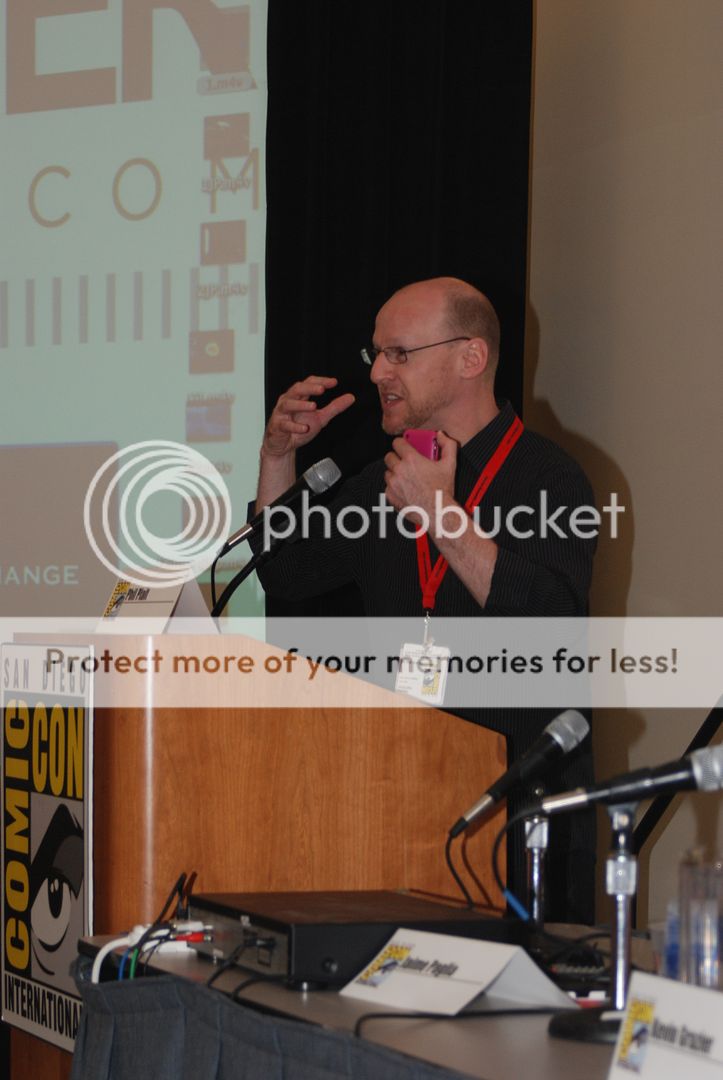
Grazier, agreeing with Plait that Armageddon is the worst science film ever made, maintains that it has lessons of both good and bad science. In a scene showing the hypothetical impact of the impending asteroid (complete with overdramatic voiceover: “It has happened before, it will happen again!”), the shock wave of the impact is shown traveling around the Earth, which would not happen, while secondary impacts, which would happen, are omitted. The film was overly dramatic where it didn’t need to be, and yet missed out on an opportunity to show really scary science that was accurate. “It’s the only film that ever lost me in the first 30 seconds,” said Grazier. That said, the scenes showing post-asteroid tsunamis and other ramifications are so perfect, they could be a computer simulation for an asteroid impact on Earth.
Stentz, in a bit of writer’s defense, pointed out a bad scene from Fringe where the science was purposely abused in the service of an otherwise good episode. He wanted to illustrate that sometimes, you have to break the rules in order to tell the story you want to tell. Here, the writers wrote a story line where Walter’s hippocampus was “stolen” to remove his memory. To retrieve it, the team suggests implanting the memories (via the brain pieces) in the brain of someone who could interpret them. “I’m not a neurologist, but I know enough about memory to know that it doesn’t work that way. We knew that when we wrote it. We wanted the drama of a theft from someone’s brain, and how do you use them. That’s why you heard the line, ‘In theory, you shouldn’t be able to do that.’”
Carroll, ever the ambitious physicist, provided a theory, as opposed to just clips, against the philosophical backdrop of issues raised by the demands of narrative versus scientific accuracy. Take a look at the following Big Bang Theory clip of Sheldon explaining Superman and gravity:
This is the right way to think about science versus storytelling. A lot of writers are afraid of scientists because, frankly, we’re ANNOYING. We act as copy editors: “You can’t do this. You can’t do that.” But scientists are also good at telling you the consequences of existing laws, even if it ruins the romance of Superman. Science can make a story better by following this formula for conflict. On the opposite side of the spectrum, you have the mysterious “Red Matter” from this past year’s Star Trek remake. No one knew what the stuff was, how it worked, just that it was a ball, it was bad, and you had to use a hypodermic needle to handle it. It’s far more interesting if you know the rules, can explain the science, and integrate that smartly into the storyline.
A lot of times, people think science fiction means anything can happen at any time, and that’s actually science magic. The rules don’t have to be scientific rules, but good drama comes out of limitations (scientific or otherwise), characters not being able to do something and coming up with another solution for it. As a working writer in TV/film, you want people wanting clarity on one side, but on the other had, you don’t want people to feel stupid and you can’t bore them. You can introduce science and technology in a way that heightens the excitement rather than taking them back to science class. ER used a writing trick to make this happen: one line of exposition, another line of exposition (medical jargon), then an emotional line telling you what happens. Ellen Page of the recent move Inception served this purpose as the audience member—what questions would they ask of the characters in the movie. To this degree, Carroll awarded Iron Man the award for best “science” movie of recent times, not for any specific science content, but because building the suit shows the true scientific method, and that’s how it’s really done in the lab!
Our intrepid correspondent Bryy Miller also went to two very exciting panels that covered a bit more mainstream pop culture. Here is what he had to report:
Tripwire Magazine
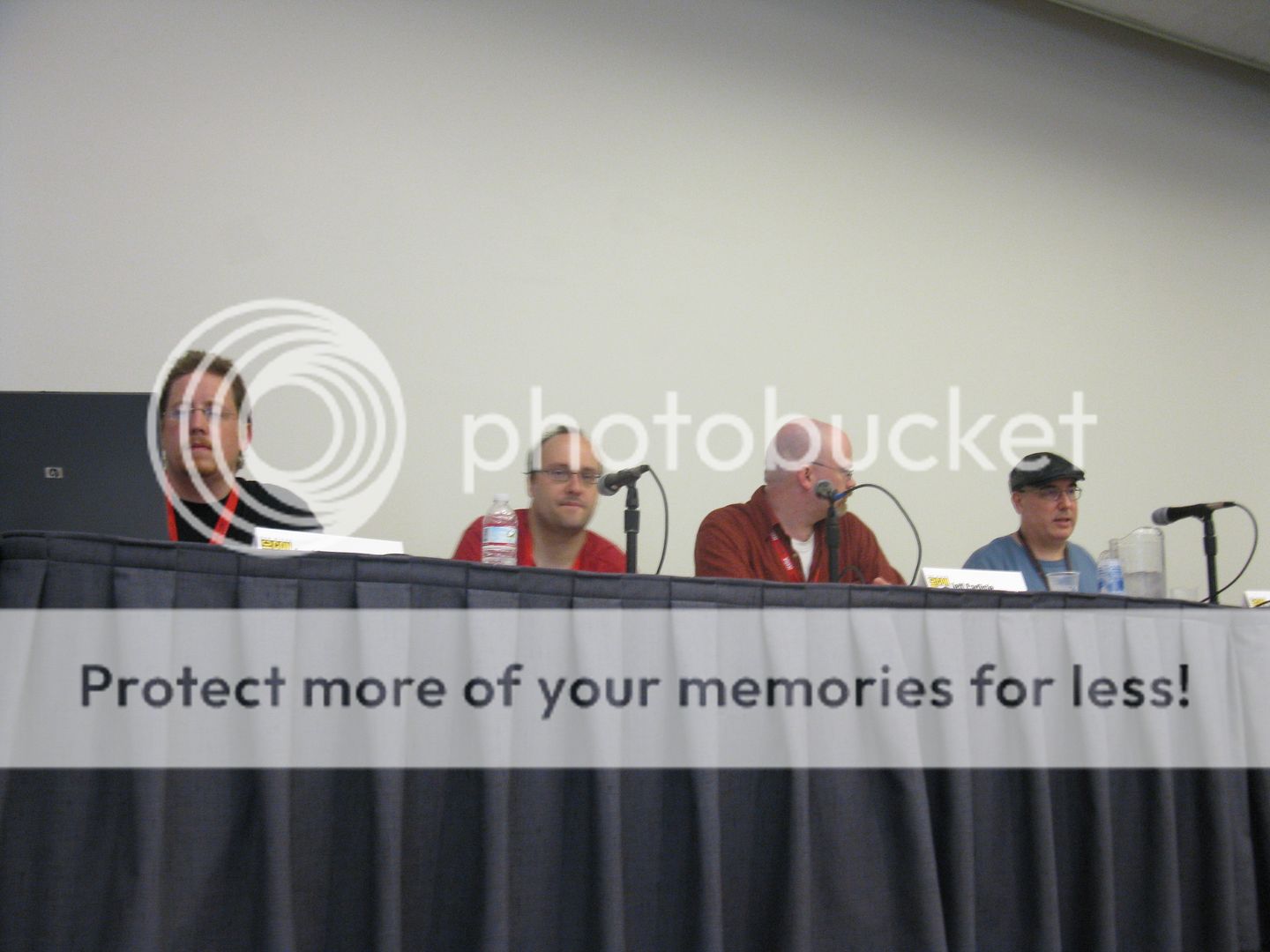
I had a theater class in high school, and we used to say that it was the most “un-schooly” class ever. It existed within the confines of the high school, but did not feel as constricting or regulated. Sitting in with the guys from Tripwire Magazine, a joint UK-American geek culture print, evoked the same feeling. It understood that the Con existed, but the speakers (Editor-in-Chief Joel Meadows, U.S. Editor Andy Grossberg, and Staff Writer Jeff Carlisle, and guest speaker Rich Johnston [editor of Bleeding Cool News]) were so aloof and full of intelligent confidence that everything seemed to fade away. They made the audience feel like they were a part of Tripwire – Joel even mocked the obscurity of their little magazine being at Comic-Con by proclaiming “welcome to the Tron panel, everyone!”
Their little magazine, starting as nothing more than fan scribblings in 1992, slowly gained notoriety over the years until they halted for a bit in 2003 due to their current publisher financially screwing them over. They got back on the horse in 2007, and since then, have gone on to catch things in geek culture such as the coveted first set visit for the superhero film, Kick-Ass. This proved to come back to teach them a further lesson in industry magazine politics, as the article was released a full year before it was assumed that it would. Tripwire covers everything in geek culture except music and gaming, and now they have set their eyes on new media such as webcomics and webserials.
“Anyone can get in, but how do you get people’s attention?” Grossberg mused, before giving Felicia Day’s The Guild as an example. A highly successful webseries about gaming, The Guild has a frothing following that has attained such levels due to catering to an audience that already surfs the web daily, and that would most likely consist of gamers. But Grossberg has another theory, and it is much more pernicious in nature as well as much harder to digest. “You know what they expect [newspaper] editors to do?” Grossberg asks Meadows, talking about the changing roles of businessmen in the digital age. The Editor-in-Chief simply replies: “Everything”. Turning to us, Andy Grossgberg comes to the summary of the thought that he started with The Guild, and that is that old media is dying because nobody has an attention span. He then goes on to lay out all of the various people involved in the making of a print comic versus the one or ones involved in making a webcomic. Carlisle then speaks up with his input on if you want to make money as a comic creator in the age of new media, “do a webcomic … everything will be the same thing [as far as everything being digital].”
This all went over fairly well until they asked to see a show of hands concerning who knew what they were talking about. Apparently, I was the only hand that shot up. It seems that the digital divide is still there, which scared me, considering we just spent an hour talking about how fast the winds of change are blowing. The panel ended with a heated discussion over which comic adaptation is the most “meta” because after all, this is Comic-Con.
EW Visionaries: J.J. Abrams and Joss Whedon
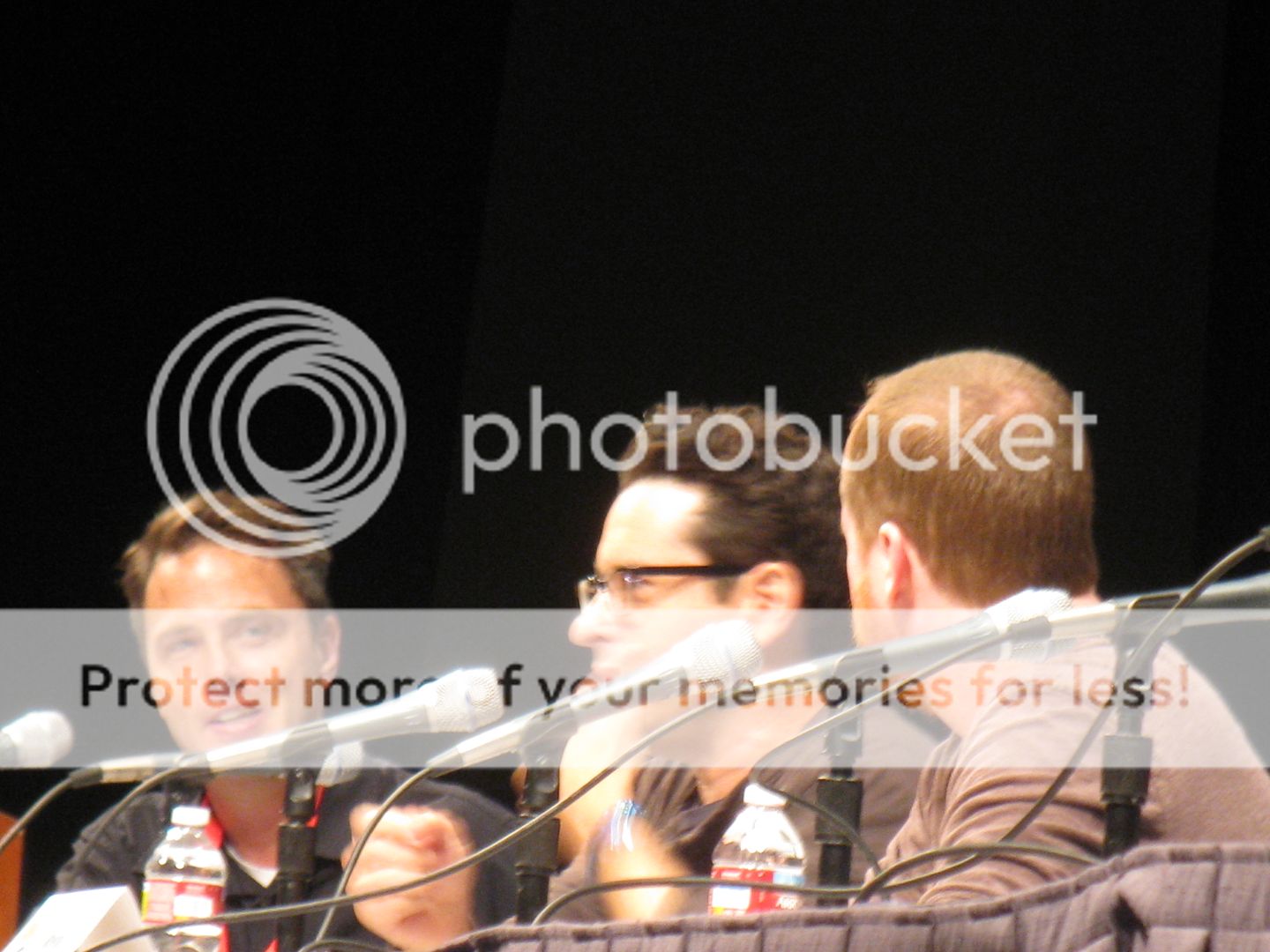
Both J.J. Abrams (Alias, co-creator of Lost, What About Brian?, Cloverfield) and Joss Whedon (Buffy the Vampire Slayer, Firefly) are rock stars in the world of television genre writing. So it would go without saying that their combined might upon one singular panel would cause another big bang, or the birth of a unicorn, or at least get a boatload of fans churned up to Twilight-levels of excitement. That was the feeling in the enormous venue Hall H: that the world would halt for a brief hour while these two decided how to continue shaping it. Well, unfortunately, no unicorns were birthed. Fortunately, it was still a good time. Instead of the melding of ideas and thoughts, it was more of a dinner between two famous film people that enjoyed answering questions specifically asked of or about them. They would occasionally reference that the other dinner guest was eating at the sane table, but other than that, it could have been a Joss Whedon panel followed by a J.J. Abrams panel.
The moderator opened it up with a hum-dinger, asking Whedon if he was indeed officially announcing that he would be directing Marvel’s superhero team flick, The Avengers. At first, Whedon said that there was no official word yet, but then he followed that by saying the official word. This, needless to say, got a gigantic response from the unfathomably-huge, wide, and deep crowd. Abrams had nothing new, but gave a movie story none-the-less: when he was a small child, one of the crew members from The Exorcist mailed him an actual tongue from the movie. It was in no way related to what Whedon had just announced, nor was it a movie announcement, but it somehow felt like it was contributing to the larger narration of the panel. Abrams was then asked about his infamous draft of Superman Returns, in which Krypton does not explode and Lex Luthor is an alien. “It was not well received” Abrams sheepishly said, referencing the fan-storm that had swept the internet mere hours after it was put online. Abrams followed that up with talking about how he managed to team up with Steven Spielberg for Super 8, his mysterious monster move that, even though a teaser has been released, is not yet filming. “I was told that Steven Spielberg made movies when he was my age,” Abrams began “so they asked me and my friend to clean up some of his old movies…. They have in-house studios for that sort of thing, and they paid us $300, and I knew why they did not do that”. He added that the film would not be in 3D.
Whedon stated that he was fine with 3D, as long as it was done well. He was also fine with 3D as long as it was not in his upcoming horror movie, Cabin in the Woods – which it is. “I love it, it puts you in the space… [but] the movie has to work in 2D” he said. Abrams revealed that he was still on the fence regarding the issue, “everything gets dim… it seems less.”
Before a rather banal question and answer session filled with every Whedon and Abrams fanboy imaginable, Whedon took the time to talk about Dr. Horrible 2, the much talked about sequel to Dr. Horrible’s Sing Along Blog. When discussing the project, which would continue the story set forth in his webseries created during the Writer’s Strike (and has since become the second Whedon-written musical to become a staple of Comic-Con). “I missed my window,” Whedon said, on the topic of digital media “I was waiting for people to show up to the party.”
Even though the Q&A session was quite lame, and I do not like Abrams, something spectacular happened at the very end of the panel. A young lady asked if criticism is ever okay for writers, since her brother recently asked for some and then shut himself off from her when he received it. This clearly made Abrams livid, as he asked for the man’s phone number. His intentions were clear. That’s when I finally found something I liked about Abrams. I connected with him as a writer and as a human being. In the big picture, that’s what these panels are for. Not to showcase new projects or to grandstand, but to connect.
From the Press Room: DEXTER
ScriptPhD.com was extremely fortunate to join producers and stars of SHOWTIME hit Dexter on their way to their Comic-Con panel. Here’s some dirt that we picked up! (We promise to catch up with Michael C. Hall, who was literally rushed out before our very eyes, back in Los Angeles in a separate post devoted entirely to Dexter.)
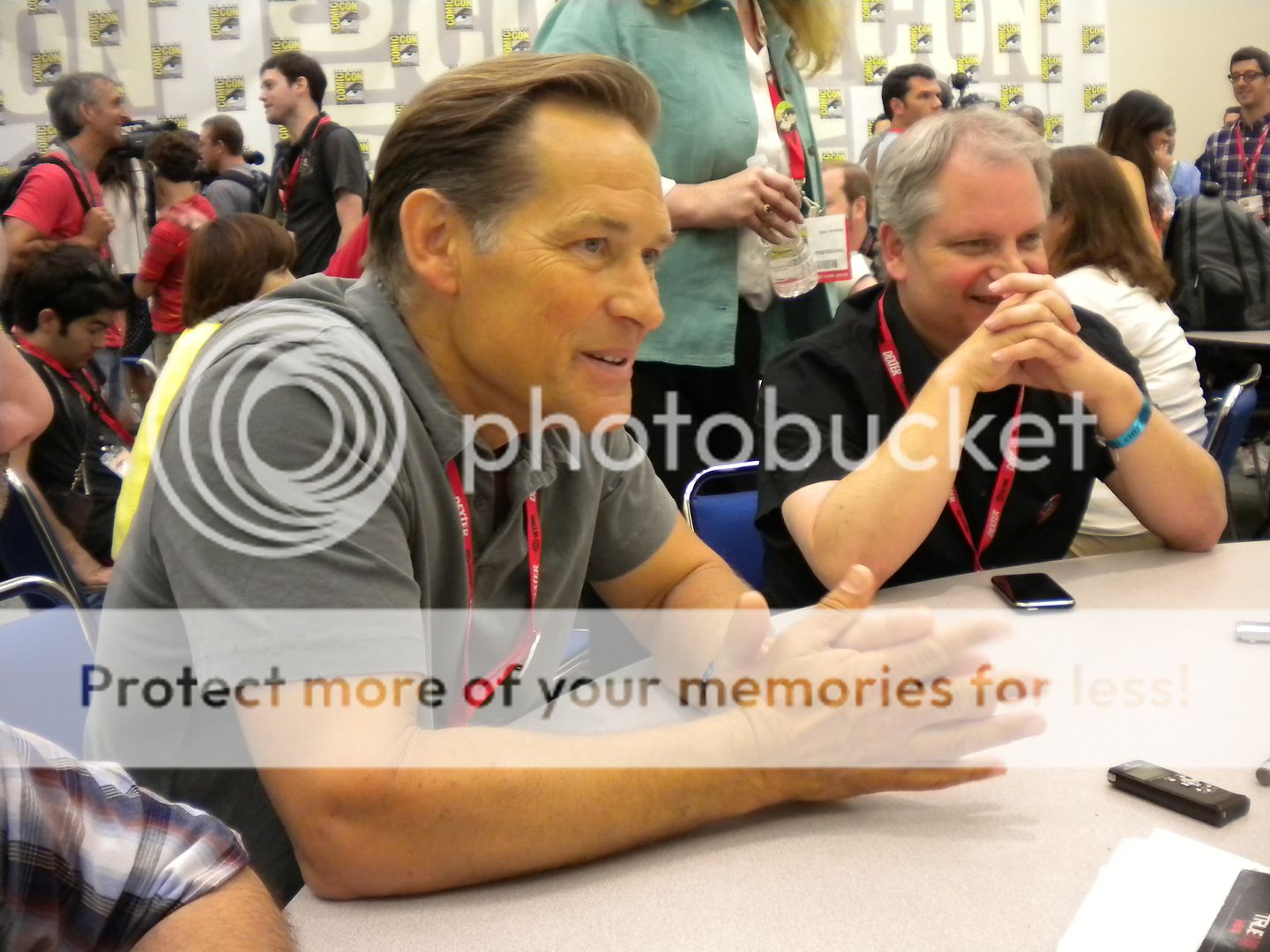
The production staff at Dexter is getting a shake-up. This year, they’ve added several new producers, including Tony Goldwin (pictured), who visited Comic-Con along with the old guard to give us some insight into things we can expect from the show this season. Part of the strategy of the “new energy” is a shake-up of the show itself. The producers wanted to avoid the “one season, one adversary” formula and recalibrate the show’s content while delivering the same pleasing product to the audience. So expect a lot of differences this year with what Dexter deals with and whom he battles with (if at all).
Unlike a lot of other shows adopting the popular meme of “skipping time” for resolution, Dexter will pick up right where we left off to get all the blowback over Rita’s death. And what a lot of blowback there is! The newest change, producers tell us, is that Dexter is feeling a new emotion for the first time… guilt. It’s something he’s never felt before and quite new for him. Much of this is because he was so hopeful as the season ended that things might actually be heading towards a positive change, that he might get rid of the dark passenger, he was looking forward to a honeymoon with Rita, only to come home and find her dead and his son in a pool of blood. Dealing with that will be very difficult for him, but the producers couldn’t tease us with more. On top of all of this, people are starting to figure his tendencies out, which adds yet another layer of complexity.
ScriptPhD.com asked about the forensics of the show and how they’re keeping it fresh. Said Producer Sara Colleton: “Well, we have an expert who works with us, and they’re the tech person. You just keep up to date with what is used by police. What we don’t do is CSI-style, flashy, make-believe forensics. I don’t know how to go in your nose and down your throat and find a bullet and say “Here it is!” We really try to play by the rules in terms of how long a DNA test takes, what the limitations of top forensics are. We want those things to be real, because the conceit of the show is so unreal, that we want everything else to feel real.”
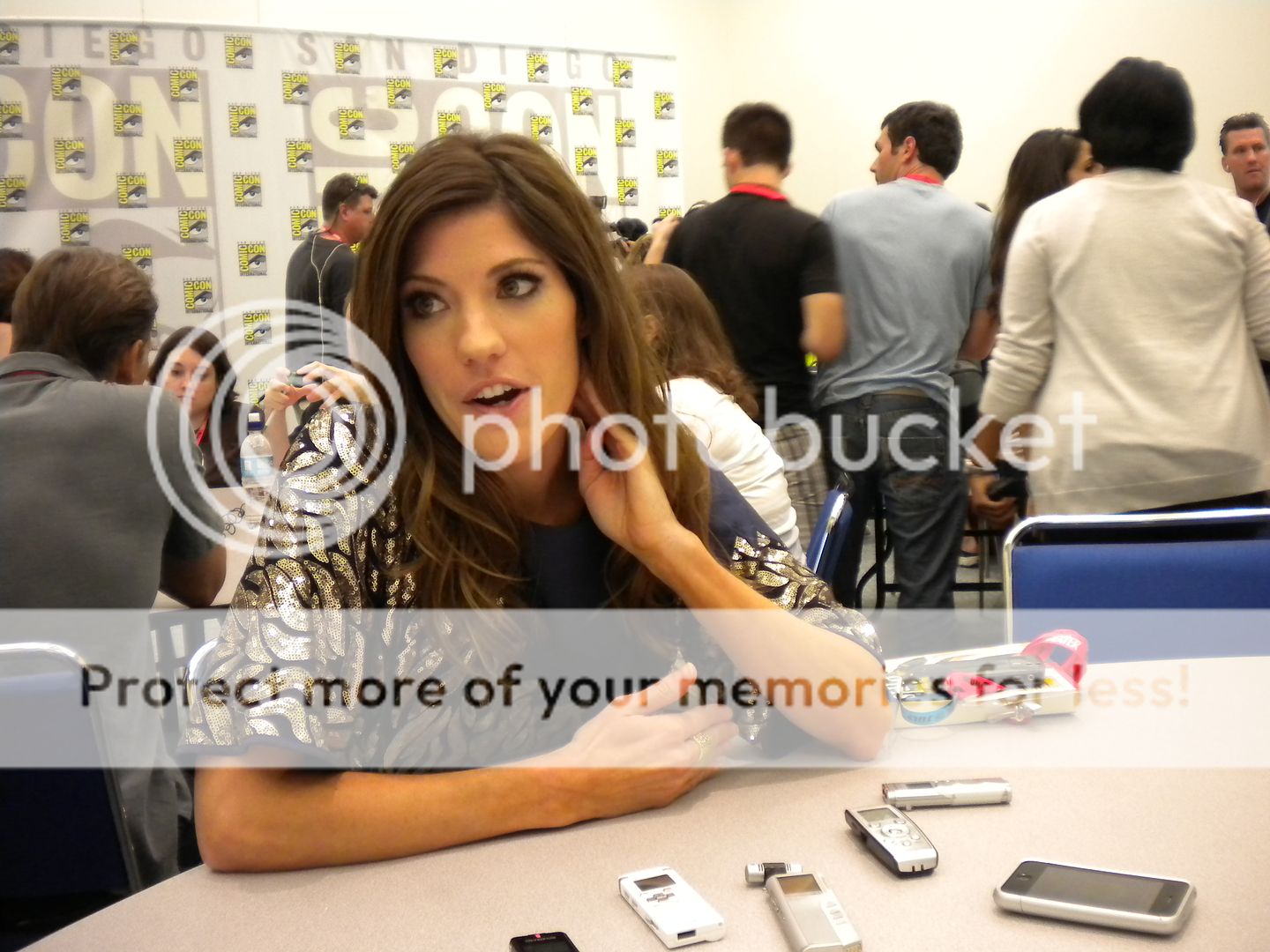
Jennifer Carpenter (Deb Morgan) was very excited about Season 5’s changes, though she admitted that for the first time, she really didn’t know what was going to happen. In the beginning of the season, Deb hopes that she and Dexter have a certain kinship, because they’ve both experienced loss, but that isn’t quite what happens. She correctly noted something I’ve noticed a lot about Deb, which is that she does a lot of talking at Dexter, and not with Dexter, which leads to his typical one-word answers. Jennifer noted that a lot of times, women in particular are guilty of “filling in the blanks” with the stories we want to hear (guilty as charged!), which affects Deb’s relationship with Dexter. She felt a little pressure of Comic-Con, with such a concentration of die-hard fans that you have to please, but pointed out that this is also the great thing about Dexter; they hate you one week and love you the next. Jennifer also hinted at growing suspicion on Deb’s part about Dexter, who experiences his grief a lot differently than her, but that the sister part of her refuses to piece it together. We asked Jennifer about the growing stripping away of Deb’s vulnerability, and how much more of that we’ll see in the upcoming season, and frankly, what she thought of it as character growth. Here’s what she had to say:
“I have to say that last year, Keith Carradine (Lundy), his line “You’re confused, and now you’re not. We’ll figure it out together.” was the first time on the show that I’ve heard someone say (to Deb) I’m going to help you. And then immediately he’s dead. That one line helped me play [the character] for seven episodes. I think about it now and I could cry my eyes out. This year, I feel like it’s about standing up straight, choosing your words, how you enter a room, she’s not editing herself, but she’s calculating. She’s working like a cop. And a little less of a potty mouth.” But not too much, she promised us!
Finally, we are thrilled to publish an interview that we have teased you about long enough. As we await the yearly MythBusters panel, always a hit here in San Diego, we had the opportunity to get some pre-Comic-Con scoop from one of our favorite MythBusters about her new hosting adventure on the Science Channel. Check it out:
Interview with MythBusters’s Kari Byron
ScriptPhD.com: Head Rush will primarily be aimed at kid-enthusiastic presentations of science. How did your interest in hosting and putting this show come together?
Kari Byron: This has been a passion project that Debbie Myers [general manager of The Science Channel], The Science Channel and I have been talking about for a while. There is a disconnect at about the age of 12 where girls stop being interested in science. And we just wanted to figure out a way to get them, and obviously all kids around that age, interested in science in a way that they could be passionate about it as well. We figured if we could create a show that was cool, not talking down to them, we could keep that interest alive.
SPhD: You have a very non-traditional science background as a sculptor and painter. How important is it to you to convey that a layperson can have a healthy curiosity and passion about science?
KB: Well I obviously came to science a little later in life, and I think that’s why I have the same excitement that you’d have when you were a kid for it. I think having no science background makes it more accessible in the way that you don’t have to be a scientist to enjoy the science.
SPhD: This programs is affiliated with President Obama’s STEM initiative. You and I chatted a bit about girl power at the Discovery Channel 25th Anniversary party. What kind of responses do you get from girls that are fans of your work on MythBusters?
KB: It’s really cool! I talk to a lot of moms and teachers as well, and I get excited [that they use], I hate to use the word role model because I feel like I don’t deserve it, but it’s nice that they have a really positive response. They like seeing someone that’s more like them.
SPhD: What small sneak peek can you give us to tease fans during Comic-Con to get them super excited about watching the show?
KB: I’m actually so interested in the material that we’re doing, that I’m just amazed at the stories. We do a bunch of experiments that give a hands-on approach to science. [Head Rush] is so different from MythBusters that I can’t even compare it. We will be using clips from all the Discovery brand shows, and a lot of MythBusters, of course, but the Head Rush segment of it is its own beast. I don’t know who or what I can reveal!
There you have it folks! Kari is so excited about her new show, she is hard pressed to reveal any secrets to spoil it. We thank her and Discovery Channel for granting ScriptPhD.com a sneak preview. Head Rush will air on The Science Channel beginning August 23, Monday-Friday 4-5 ET/PT, and Saturdays, 7-9 AM ET/PT.
Comic-Con 2010 Costume of the Day: ….and the unanimous winner is…. Calendar Man! We gave points for creativity.

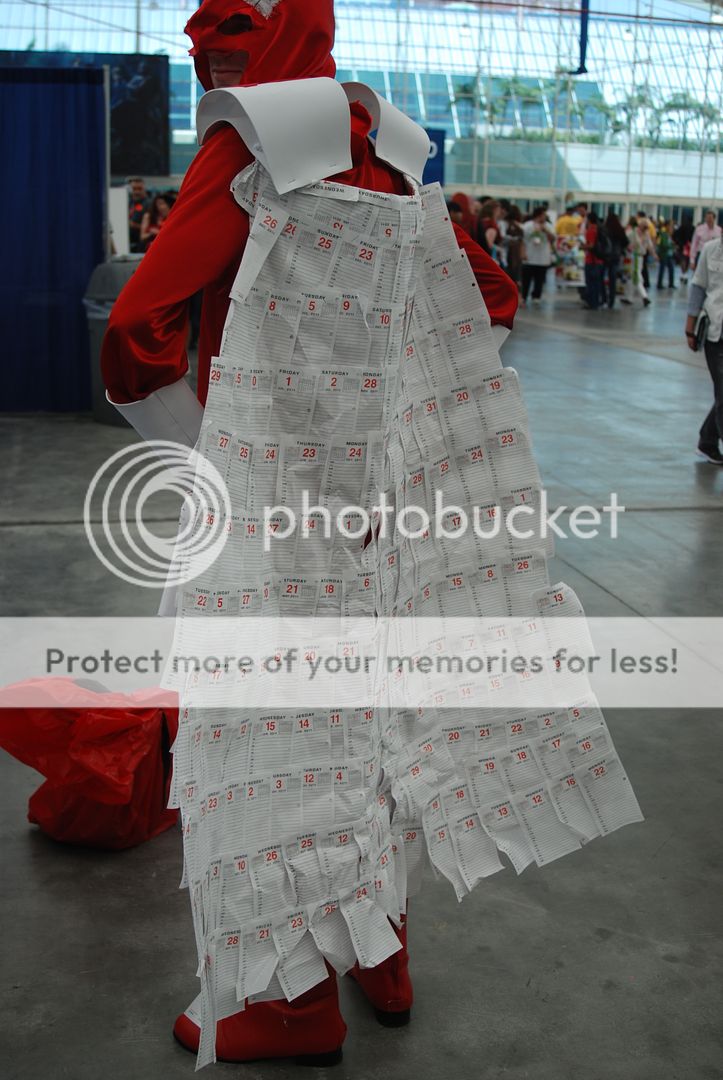
For a complete album of pictures from Comic-Con (and many of the costumes that didn’t quite make the running for Costume of the Day, take a look at our our Facebook fan page (and become a fan!).
~*ScriptPhD*~
*****************
ScriptPhD.com covers science and technology in entertainment, media and advertising. Hire our consulting company for creative content development.
Subscribe to free email notifications of new posts on our home page.
]]>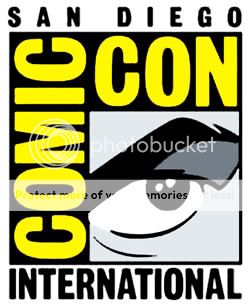
Well, faithful readers, our press room interviews have been transcribed, our complete pictures have been edited and labeled and sleep has still not been had. Someday. To make it easier to enjoy all the Comic-Con goodness from start to finish, we have condensed our four days of coverage in one place. Enjoy and thanks so much for following the journey with us!
Day 1: Includes pictures and scoop from the Warner Motion Comics, Battlestar Galactica Retrospective and Mad Science: The Fiction of Science Fiction panels, and press room transcripts of Psych and Burn Notice.
Day 2: Includes pictures and transcripts from the Farscape 10th Anniversary Reunion and FlashForward panels along with full transcripts from press room interviews with Bones and Big Bang Theory
Day 3: Includes exclusive pictures and videos of the enormous Lost panel/arena rock event and the Futurama! and True Blood panels, as well as press room interview transcripts with talent from Fringe and MythBusters
Day 4: Includes exclusive pictures and transcripts of two final Sunday panels: Supernatural and the long-awaited Comic-Con appearance of David Tennant with the Dr. Who panel.
All four days of coverage include the ScriptPhD.com Costume of the Day, chosen from an array of pictures that you can browse through on our Facebook fan page and extra side interviews and scoop from all the wonderful actors and writers we ran into.
But wait! There’s more! I’ve saved two special surprises for our last post. The first is our ScriptPhD.com one-on-one sit-down with 24 writer/executive producer David Fury. We go in-depth behind the show’s themes of terrorism, torture, national security and how they extend to the real-world law enforcement reaction to the show. We also have a free fan giveaway of three copies of the Comic-Con 2009 40th Anniversary souvenir books handed out only onsite.
To read our interview and enter to grab your copy of the book, please click “continue reading”.

ScriptPhD.com: Your show paints this terrorism world as very tense and pressing and in imminent danger. So it’s kind of a no-holds-barred search for information that saves lives. That’s your plot, that’s your premise. You’ll do whatever it takes.
David Fury: That is the premise, yeah.
SPhD: What response have you gotten from members of law enforcement, particularly from Homeland Security, in terms of how you portray this [arena], and if there has been any criticism, how is that then fed into the writing? I know you entertain and that’s your bottom line, but I’m just curious.
DF: No, it’s an excellent question, and we’ve certainly dealt with it a lot, particularly in the last couple of years. We’ve spoken to a lot of people at the Pentagon in law enforcement, now it’s federal law enforcement, and military. We’ve spoken to the men who literally interrogated the men who gave up Saddam Hussein. In fact, they couldn’t use their own names because these are top secret guys. How they feel about the show? They’re concerned, because the show does present this absolute, where we have a pressing problem, a bomb is gonna go off, an attack that’s going to happen, an assassination. And we have to get information quickly. In reality, if this wasn’t a real-time show, if this was a show that existed minute-by-minute, we would love to tell the stories of how they manipulate information out of their prisoners. But we are constrained by the premise of the show, which is a 24-hour period, real time, every episode one hour where very bad things are going to happen and what they’ve told us is, “Well that never happens. There’s never a ticking bomb. We’ve never been in a situation where there’s a ticking bomb and we have to have this information right now.” And to that I’d say, that’s the difference between reality and this show.
We try to be as true and as respectful to the people who do this kind of thing and we try, particularly last year, to address the nature of torture and the costs of that torture to all the people: the person being tortured and the one inflicting it. We try to deal with that, but it’s difficult for us to tell any stories where they use the methods that are actually being used right now to get information. These are brilliant people doing a very difficult job and a lot of it has to do with ingratiating them and the people they’re trying to interrogate and flattering them and promising them, and that’s just not dramatic. And if we were a show that was able to skip three days within an episode and say “Three Days Later…” and this is what’s happened, we’d tell that story, but we can’t, so we resort to Jack [Bauer] doing what he does, and other people, inflicting torture. But we’ve always been very conscionable in terms of the costs and I can tell you that the majority of the people are, I can’t speak for everyone, but we’re not pro-torture. We’re not, in life–
SPhD: No, no, I totally understand. The reason I asked you this question is because your show came along at a very important time in our nation’s history.
DF: Absolutely right.
SPhD: It was almost like timing meets opportunity. And you are an entertainment outlet, but it’s funny how you are capturing the zeitgeist. And I’ve heard a lot of people say, “Well if Jack Bauer can do this…” so do you ever worry that that bleeds over into a certain mentality–
DF: Well, it certainly does. And it does worry us, and it does apparently really happen. We’ve been told that some people in the military, I believe in particular, some of the younger recruits took to watching our show to get ideas [on] how to get information. And that was a scary thought to us. It’s like, “For God’s sakes, we’re not a training video! Don’t let Dirty Harry teach police officers how to catch criminals.” But you’re absolutely right. The show was born in a very tense time for this country. It was born in the shadow of 9/11, and it’s now eight years later and we have to maintain, for the purposes of drama, that kind of heightened threat. The one that we’re kind of feeling a little bit more relaxed about and we’re not really thinking about. But dramatically in the world of 24, it’s something that like for Jack Bauer, as we pointed out, he’s starting the season in a happy place, but as we all are, as we’re much more optimistic and positive, but something can happen to just turn it back all around and we’re back where we started eight years ago.
SPhD: Well I want to thank you on a personal note, because I was in New York City when 9/11 happened, unwittingly so actually, and being there [during a terrorist attack] really re-prioritizes your moral and political ambiguity of where you stand and your mindset when something like that happens to you. So your show really brings back a lot of the feelings [and struggle] I had when that happened. I’m really happy to hear that you’re cognizant of the greater outlet of what you are doing and I thank you for that.
DF: We are. Well, thank you for that. We’re very concerned, we certainly don’t want people to look to us as we’re painting the world as we see it. We’re painting a world where a character like Jack Bauer can exist and can function. And if it resonates with people’s fears, great. It doesn’t have to. I think it works on its own level as a character study of a man who is forced to do terrible things to protect the country.
SPhD: Thank you, sir.
DF: You’re very welcome!

And now, for my favorite part of this process… being able to interact with our wonderful ScriptPhD.com fans and make you happy! I’m so grateful for the support our site has gotten and for all of you who have emailed to let us know where our transcripts have needed updates or adjustments, that we have decided to give away some Comic-Con memorabilia. Rather than giving away banal chachkes that appear every year, we wanted to give away something unique and special. This year, to celebrate the 40th Anniversary of Comic-Con’s existence as a festival, organizers put together a gorgeous commemorative book chronicling highlights, pictures, posters and factoids from each of the 40 conventions to date. For sci-fi, Comic-Con and comics buffs, this collector’s edition is a must have. We rounded up three extra copies (shhhh don’t tell anyone!) and will mail them to three lucky fans for free anywhere on Earth! Sorry, at this time, extra-terrestrial residents are not eligible. To make the process fair and transparent, the first three comment posts with a valid email address will win the prize–and don’t worry, if I can’t approve them right away, they are timestamped. We will contact the winners for mailing info. Good luck!
Please credit all photography to ScriptPhD.com if you take any for your own use.
~*ScriptPhD*~
]]>
Well, the 2009 Comic-Con marathon has come to an end. Sundays at Comic-Con tend to feel like a blissful hangover after a three-day non-stop party. You’re not entirely sure of what just transpired, but you loved it, and have it in you for just a little bit more. And our four-day coverage ends with transcripts and pictures from two fantastic and much-anticipated panels: Dr. Who, the longest running sci-fi show in the history of television, and Supernatural. We also have our final ScriptPhD.com Costume of the Day. Come back to ScriptPhD.com on Wednesday, when we post all the inside scoop and behind-the-scenes action at our press rooms. We will conglomerate our four days of coverage, pictures, interviews and impressions into one post to make it easy for you to get all your Comic-Con goodness in one place. Click “continue reading” for our final installment.
Dr. Who
Moderator: Robert Lloyd (Los Angeles Times)
Panelists: David Tennant (The Doctor), Russel T. Davies (writer/executive producer), Euros Lyn (director) and Julie Gardner (executive producer)
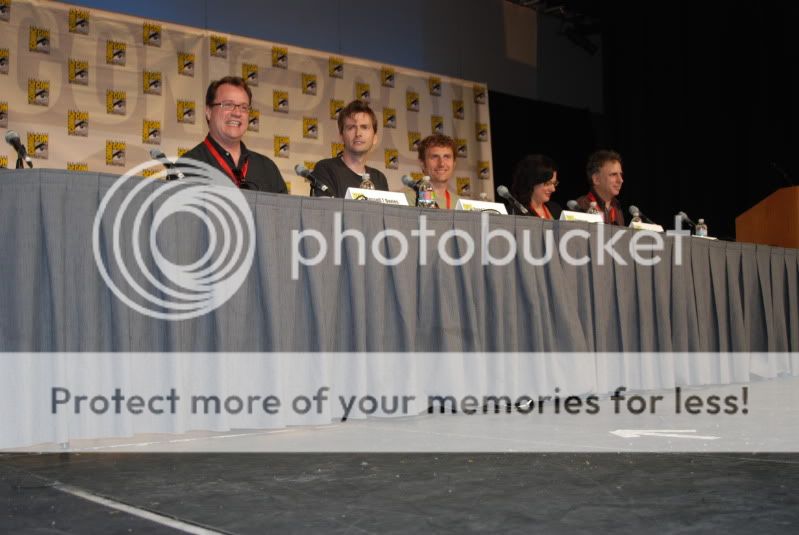
The Dr. Who panel didn’t feel so much like a convention gathering as a rock show. A deliciously raucous, dedicated group of fans were ready to get the party started even before the cast and production talent stepped on the stage. A brief introductory clip of Dr. Who evinced pandemonium from the crowd. The ScriptPhD overheard backstage that the Comic-Con organizers have been trying to get David Tennant and the Dr. Who masterminds to do a panel for a long time, to no avail. So you can imagine the decibel level of Ballroom 6 at this moment:
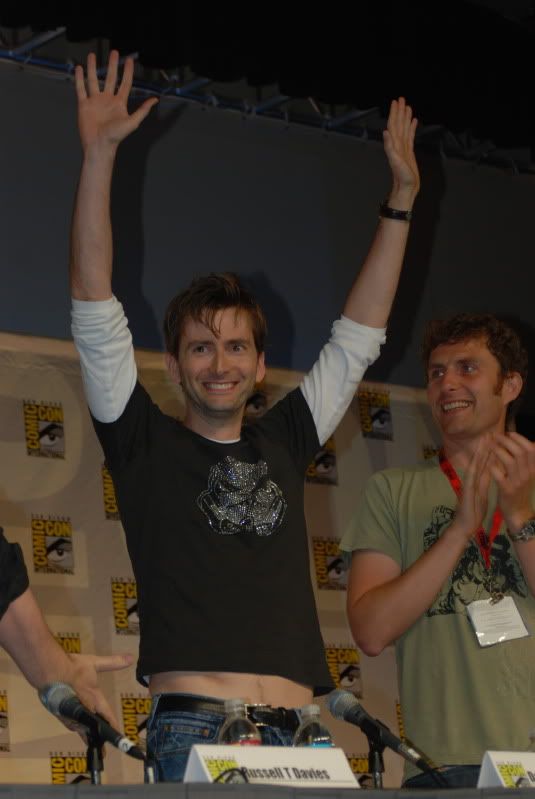
Robert Lloyd: Good morning class. Welcome to Dr. Who 101. My name is Robert Lloyd, I’m a TV writer for the LA times, a little town about 3 hours from here. In 2005, BBC Wales brought back to life a little sci-fi show called Dr. Who that had been missing from the screen for 15 years. It’s still
the same show, but it’s also a different show. It’s bigger and better. It’s rooted in mythos and values of original, but way beyond what a Saturday night kids’ show should be. It’s a show about love and loneliness and beauty and terror in a universe that can mess with your mind. I really love the show’s ambition, its bravery, its willingess to push the edge of outlandishness and absurdity. Mostly because behind all of the craziness and swashbuckling and technobabble is real a poetry and vision about the world and people in it. It’s also
a show that can make me cry. This is a summing up in a way. This team has finished its work, but there’s four more hours of the Tenth Doctor yet to come and you’ll be seeing some of that this morning. We’ll start with clip from “Planet of the Dead”, which will premiere tonight on BBC America.
[Welcome and introduction of Dr. Who cast and producers to wild applause and cheers]
Robert Lloyd: There has been lots of speculation that all these people are gathered here to hear about a movie. Can we just address this and get it over with so we don’t hear about it the rest of the morning?
Julie Gardner: Thank you all for coming. I’ll start with the bad news. We aren’t making announcements about a Dr. Who movie. I don’t know where the rumor started. But since we’ve talked about it, we were thinking maybe it would be a good idea to do at some point. Is this something that you want? [wild cheers] So no announcement about a movie, but we have a teaser trailer of David’s last tenure as the tenth doctor.
[clip]
Julie Gardner: What do you think of all this David?
David Tennant: We should see [the clip] again! This is awesome but quick. It’s so much to take in, right? Roll the tape!
[repeat of tape]
Robert Lloyd: Obviously this is an apathetic crowd. Give us a sense of the immensity of the cultural impact of Dr. Who in the UK and what it meant to you, haivng grown up in the Dr. Who world. Because here in America, it’s something for cable, but in the UK it’s a Saturday television event.
David Tennant: And it was when we were kids as well. I grew up obsessed with it really, so it’s strange to be sitting here at 38 and in it. But it’s definitely part of my recent memory in Britain.
Russel T. Davies: Loved it all my life and I’ve thought about it all my life. And now someone has taken it and made it into a TV show. Because really in Britain, that’s what it is: it’s this phenomenon that wherevery you go, there’s t-shirts and backpacks and people are talking about it. My dad is old and blind and he sits there all day listening to the radio reports, and he counts at least three Dr. Who references in any show. It’s mad, I can’t get my head around it.
David Tennant: It’s overwhelming to walk into a supermarket and your face is on a cake and t-shirts and children’s pants, which isn’t something they prepare you for in drama school. It’s overwhelming, and difficult to get an objective, that’s why it’s great to come here to gauge the fans’ response. We love making it.
Russel T. Davies: And that’s what we want here as well, everything in the US: the t-shirts, the lunchboxes, the cakes. Go out and spread the word. Tell peple about the show.
Robert Lloyd: Euros, were you a fan of the show as well?
Euros Lyn: A huge fan. And watching the show as well in Whales, which is this little quiet corner of UK, I little imagined that this could happen.
Julie Gardner: I didn’t watch as child, but when I took over, Russel Davies gave me a homework list, to watch his favorite titles. And I think my favorite had to be City of Death, a Tom Baker story. I loved it. I thought “Wow there’s so much we can do with this, so much emotion, it’s mad, we can really do so much with it.”
Robert Lloyd: Do you see the current show as fulfillment of the original concept, or a left turn?
David Tennant: No it’s the same show, the story continues. I’m the same man as William Hartnell, I’m just wearing a different wig.
Robert Lloyd: David, do you try to incorporate the other doctors in your peeformance?
David Tennant: Not really, but they’re all immersed in the show, there’s bits of all of them in there somewhere, yet you make the role new and of yourself, because that’s how works. It’s not like James Bond or Sherlock Holmes or other characters reborn in the same mold. We want to break the mold a bit, make him a new man, which is why I went with a different wig than William.
Robert Lloyd: There’s an amazing amount of material and tones and ideas, somtimes from episode to episode, it seems the visual plan changes. Euros, you directed two consecutive episodes at the beginning, and they go from 5 billion years in the future to Victorian England. Can you address that time jump?
Euros Lyn: From a tonal point of view, we set out to give different stories different looks for different worlds, and it all stems from the script, our guiding light. Taking stories in different directions into the future and the past demands a difference. Yet the adventures, the humor and the excitement go into all. There’s a universality and a huge difference at the same time.
Robert Lloyd: Julie, talk about making a show that looks that good on such a tiny budget.
Julie Gardner: We go over budget.
David Tennant: But not irresponsibly.
Julie Gardner: Russell has great writers, and comes out in the beginning to plan everything. Part of that is practical and creative. We make hard choices about special effects, stunts, and we balance it. Out of 13 eps, you may notice a smaller episode, which helps pay for the Christmas special. So we do little tricky things, we double bank two units running at the same time. We call in favors and a lot of love.
Robert Lloyd: My impression from the show and all the ancillary things I’ve read about Dr. Who is that there’s incredible dedication and love involved. Lots of camaraderie. Was it an unusually privileged situation in which to operate?
Julie Gardner: I’m thrilled.
David Tennant: It’s true. It’s a very committed set. There’s lots of passion about the show. Because people grew up with it and loving it, and are now making it. We manage to expand our budget through good will and are happy to be there. We benefit greatly from the show’s legacy.
Robert Lloyd: Was there a moment when you realized you were onto something bigger than you expected in terms of scope and ambition?
Russel T. Davies: I suppose when the history of the show is written, one day people will realize Julie Gardner’s role. We had ambition, we had goodwill, but she raised an amazing amount of money, which in the labyrinthine, Dickensian world of the BBC is tough. Julie also had to raise it from scratch each year, with different sources. That’s when Julie got on board and thorough motoring and pushing the ambition, size, and scale. That’s when I began to think huge. And I thought it wold only go one year and here we are.
Julie Gardner: It was easy to motor. Russell always thought big from the first moment. Yes, we had huge stories, a big production team, big trailers, blockbuster trailers. The most important thing was thinking 7 o’clock bbc prime time. We had to think mainstream.
Russel T. Davies: Everyone worked hard and never dreamt of this kind of success—it’s amazing and mystifying. And THANK YOU.
Robert Lloyd: We have a special presentation before fan questions. Craig Glenday of the Guinness Book of World Records has something for you.
Craig Glenday: I’m back again! Dr. Who has been in the Guinness Book of World Records for a long time, it’s the longest-running sci-fi show on TV, we all know that. But I have the Dr. Who entry in next year’s book. And today we want to make a special announcement. That one record is not enough. You guys are too good for one record. Based on sales, distribution, downloads, illegal downloads, and longevity, Dr. Who is the most successful sci-fi show on television for sure.
Russel T. Davies: The most successful sci-fi show on television? I can hear Comic-Con war breaking out there. Close the doors, don’t let Star Trek in. Eat that Supernatural, actually eat me, Supernatural. And I’d like to accept this in the name of Verity Lambert, who set up Dr. Who in 1963. She’s no longer with us but she’s smiling somewhere because this is hers. Thank you.
Robert Lloyd: Fan question time.
Fan: David, there’s a rumor that you wear the long brown coat because you’re fan of Firefly. True?
David Tennant: Ohh, I’ve never heard that one before. There’s a new rumor about me every day at Comic-Con. I’m playing The Hobbit, apparently. I love Firefly and Serenity, they’re excellent. Both great shows. But they’re not the inspiration for the coat. When Russell and Julie first asked me to play the part, I said “Can I have a long coat?” It’s as basic as that.
Fan: You look good in it!
Russel T. Davies: He looks good out of it. [laughter]
Fan: David, if you could be any other doctor, who would you pick?
David Tennant: Wow, I need to be careful here. Splendid chaps all of them. I guess that’s the traditional answer.
Fan: What was best part of working on Dr. Who
David Tennant: My favorite is everything. It feels wrong to choose. Each episode is such an individual thing, with a different cast, setup and script. It feels like choosing between your children, just wrong. It’s been four years of extraordinary moments. I take away so many brilliant memories, this [Comic-Con] being one of them. And that’s before I’d even seen the final episodes.
Fan: You never get your first doctor. Who was your first doctor? How did you deal with the trauma of replacing him?
Russel T. Davies: I still remember William changing into Patrick. I was just at the right age for Tom Baker, we love him. But as for trauma, it can be quite fearsome and horrific. Murray Gold our composer—Euros, the director of the finale—
Euros Lyn: We’ve been spotting the finale [for various cast and crew], and we reached the last twenty min or so of the last episode, and Murray hangs his head, starts shaking, just sobbing uncontrollably. And you all will too when you see episode. Get your tissues ready.
Julie Gardner: There was a lot of crying when we shot the last episodes. The crew was really moved by it. So many gododbyes. Every day. The goodbyes went on for weeks.
David Tennant: I remember being a kid when Tom Baker left, I’d idolized him. I couldn’t concieve the idea of a new doctor. But then Peter came along and within three weeks I thought he was the best. So it’s part of what makes this show go on forever. Hopefully you’ll watch the final episodes, and then a few weeks later you’ll think Matt Smith is the greatest thing ever. Because he is. Change is a part of the show and I’m proud to have been a part of history, but also proud to hand the role over and that it carries on.
Fan: I heard that John Barrowman has stolen things off of the set. What have you stolen off the set, if anything?
Julie Gardner: He just stole thngs to be strip searched on the way out.
Russel T. Davies: One of the Doctor’s jackets. Someone took them.
David Tennant: There is a sequence in final episode where one of the Doctor’s jackets gets compromised and we were going through the shots before and after, the last day, last thing we did, tears, hugs all that. And the jacket had disappeared. eBay is being scoured. But it wasn’t me.
Fan: David, you’re my Doctor. I’m so sad to see you go, any possibility that you might come back for specials or a movie?
David Tennant: Well, the dust has to settle. And the fiftieth anniversary [of the original Dr. Who] is in 2013. I don’t know. That is not an announcement. Don’t twitter that. It’s not a thing. Just an idea.
Fan: Do you all have a favorite assistant [Doctor’s companion] character that you prefer?
David Tennant: It’s hard to choose. What do you guys think? [Everyone in the crowd shouts something different.] Well, that just sounds like mwahhhhhh. The one thing I leave show with sadness about, is that I didn’t get to snog Bernard Cribbins. I got to snog all the other ones. Or am I? You haven’t seen the last episode.
Fan: David, would you be returning as the other doctor, the one who’s coming with Rose?
David Tennant: There are no plans, but anything can happen.
Fan: What was like working with Nicholas Courtney in Unit Stories?
David Tennant: He’s a legend. I did a couple of audio stories with Nick Courtney long before any of my television work. He’s the nicest man you could hope to meet. I just sat there thinking Brigadeer! Huge fan of his, wonderful, brilliant man.
Fan: You don’t want to pick favorites in Dr. Who, but as a fan what was something that was exciting for you in this show or other shows?
David Tennant: I’ll tell you what it was. When I started, we had the first read-through, and we read the first three episodes all at once. Everyone who had ever worked for the BBC was there with their note pads staring at me. I spent the first hour thinking I’d be sacked at any moment. The replacements were just lining up. It was a terrifying but wonderful prospect, and then we read the episodes out of order. Suddenly, halfway through the read-through, a voice from my childhood was calling me Doctor. When the 8 year old boy met the 35 year old boy, and it wasn’t the playground but doing it for real, that was quite special.
Julie Gardner: And that reminds me, we should do a little plug. David’s Doctor is coming up in the Sarah Jane Adventures.
David Tennant: Yes, and the episode is called the Wedding of Sarah Jane Smith.
Fan: How much fun was it doing the laugh on Top Gear? Will you still hold the title of the fastest doctor on four wheels?
David Tennant: It was fun, but it is forever blighted by fact that I’m .02 of seconds behind on the leader board before Billie Piper. And the only reason I’m behind Billie is that she was wearing a see through top. So Jeremy Clarkson bumped her on the leader board. If Billie didn’t have such good breasts, I’d be higher on the leader board.
Fan: As an alumnus of the Royal Shakespeare Company, has your training affected your way of reimaginig the doctor?
Julie Gardner: David you did meet Shakespeare in an episode of Dr. Who. That must have informed your interpretation of Hamlet.
David Tennant: I don’t know. It’s hard to tell what kind of actor you are. You can’t judge, can’t be objective. There is certainly a great tradition of shakesperean actors being the Doctor. Chris played Hamlet, Tom played Macbeth. I have no conclusion to make.
Fan: David, what sort of roles are upcoming for you?
David Tennant: I don’t think I’m in Harry Potter. Apparently I’m playing The Hobbit. No phone calls about that yet, but I don’t know, no idea. There is a film at the moment—I’m playing the villain in Centrinians 2, I’m doing Hamlet, but beyond that, who knows?
Fan: Prior to the new series, it was hard to find American fans. Are you surprised at the popularity explosion [in the States] of the new series?
Julie Gardner: I’m struggling to work out how big it is. Are we huge? Russell and David?
David Tennant: We went on Good Morning San Diego this morning and were met by a man in a t-shirt with a tardis on its front. So it’s hard to quantify. People who know it REALLY know it.
Russel T. Davies: It’s hard to quantify because you are told it’s not known, but then it’s the catch of the week in Entertainment Weekly. But word is spreading, and it’s up to fans like you to keep the faith and spread the word. Give yourselves a round of applause.
David Tennant: It feels like it should have been from the start. And they’re behind it, and will show episodes much more closely, and now uncut, on BBC America. So we’re coming but keep proselytizing.
Fan: Russell, you’re leaving Dr. Who, but do you have future plans for Torchwood?
Russel T. Davies: I hope so. We were astonished by the success of that series. We tripled ratings. I hope so, I can’t promise, it’s the middle of a recession, but we want it too. Fingers crossed, but maybe the characters you want back won’t be back.
Fan: Why did you cast Captain Jack as American?
Russel T. Davies: We had actually singled John out for that part. We knew he could do a Scottish accent. We wanted him because we loved him. He did it for us in all accents, and in the end, I just thought it made it bigger to have American accent just because you have American soldiers in Britain. It felt right. I didn’t know he’d go on to do Torchwood. That’s very rare in the UK to have an American lead in a British show. But he proved everyone wrong because that’s how brilliant he is.
Fan: Is the difference between each Doctor based on each actor’s perspective or is it in the writing?
Russel T. Davies: I don’t tend to write the Doctors differently. There are differences. But it’s the Doctor in my head who drives the script. It’s a joy to cast the show with all these talents, you have the freedom to write anything. Cast well and your imagination goes to the horizon. We are absolutely limitless to go anywhere because the cast is so brilliant.
David Tennant: Euros, you’ve worked with two of us. Who was better?
Euros Lyn: You David.
Fan: The archaeologist from Silence in the Library, will she be back, and will we see the interaction between her and The Doctor?
David Tennant: Well, it’s not on our watch anymore, really.
Julie Gardner: We are now just happy viewers. We don’t know anything.
Russel T. Davies: Do a search online for River Song. Alex Kingston and River Song. You’ll be very happy.
Fan: Can you comment on the rumored return of Gallifray and or the Timelords? Would you consider coming to Galley One?
Russel T. Davies: As for those rumors, I don’t know what you mean. Let’s just say that in that clip, the voice was Timothy Dalton playing the narrator. One day we keep getting invited to conventions, but there’s no time. That was Alexandra Mowen as Lucy Sexton. She’s coming back.
Fan: David, do you have any words of wisdom for Matt Smith for the impact that playing The Doctor on personal life?
David Tennant: We’ve chatted a couple of times, he’s enthused and clearly going to be brilliant. He’s such a talent, there is nobody in the UK who’s worked with him who doesn’t rave about him. Nothing but praise to lavish. He doesn’t need any advice. Dr. Who is a big thing in Britain, there’s very few television shows, and you get attention, some of which is nice and some that’s intrusive. But he’ll cope. He’s bright, normal, and down to earth.
Russel T. Davies: [regarding videotaping the panel] This tape we’re making on stage will be on Dr. Who: Confidential, so you will all be on Dr. Who: Confidential.
Fan: In the episode where playing teacher for school, if you were a real teacher what would you teach and why?
David Tennant: You save the hard ones for last! I have absolutely no idea. The only subject I liked was English. I’d probably be an English teacher and my set text would be anything by Russel T. Davies.
Robert Lloyd: Thanks everyone for getting up so early to stand in line for this, and a big thanks to everyone who came for the panel.
Supernatural
Moderator: Maureen Ryan (Chicago Tribune)
Panelists: Misha Collins (Castiel), Jim Beaver (Bobby Singer), Eric Kripke (creator), Ben Edlund (executive producer) and Sera Gamble (executive producer)
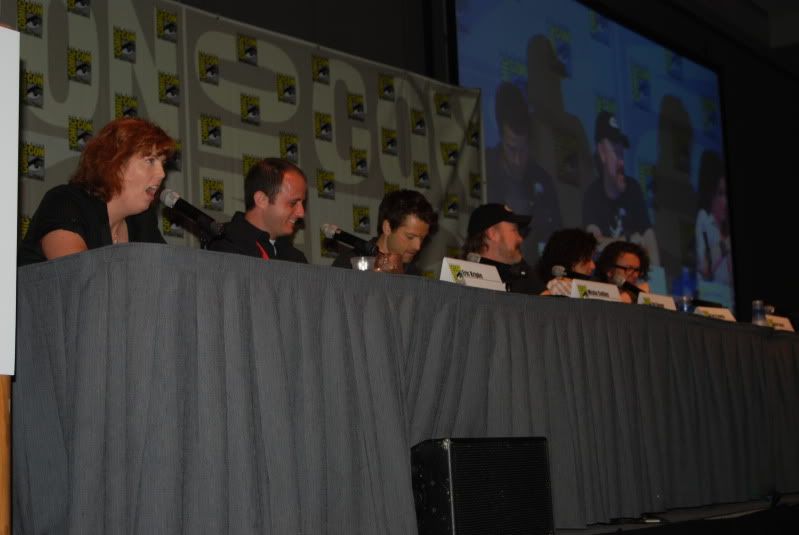
I was really excited about covering the Supernatural panel not just because of the fan base of this show, but also because the moderator was the delightful Maureen Ryan, television critic for the Chicago Tribune. The ScriptPhD has admired Maureen’s work for a long time, and it was a pleasure to meet and chat with you, Mo! Keep up the great work.
Eric Kripke: Castiel is coming back, I’m happy to say. We spent five minutes talking about wardrobe, do we do a catsuit for him. He’s back in his catsuit.
Maureen Ryan: So that begs the question: front seat or back seat?
Misha Collins: He as a special respirator to sit in the trunk. He’s going to breathe through a straw with a periscope.
Maureen Ryan: How do you solve problem like Lucifer? This guy is out to do some damage, but he’s all about herbal teas and feelings and sharing? He’s a softer, kinder Lucifer.
Eric Kripke: Yes, but we wanted to present a Lucifer that hasn’t been seen on TV and movies often. We’re shamelessly stealing from the beginning of Paradise Lost. He’s a sympathetic devil with a point of view. He was betrayed by those closest to him, and has a definite chip on shoulder. It’s a little personal. He’s the most honest of all the characters. Of course, there is that thing about ending the world, but otherwise, we’re trying to do a complicated Lucifer, where the angels can be dicks and Lucifer can be sympathetic.
Misha Collins: Except me.
Maureen Ryan: What does bobby think of all this? Is he going to pull out a can of whoop ass on boys?
Jim Beaver: Bobby has a very interesting scenario. I wish I could tell you about it, but I can’t because the real Lucifer [Kripke] is sitting by me.
Maureen Ryan: I am hearing that maybe Castiel and Bobby have an upcoming scene or two. They’re becoming buddies.
Misha Collins: It’s more of a romantic type thing.
Jim Beaver: On or off camera? It’s an unrequited thing for Castiel. Very unrequited.
Maureen Ryan: You’re going to separate the love affair of Dean/Castiel. There’s an apocalypse going on, things are crazy. Kind of a team building enterprise. Are we going to see any old friends or enemies coming out of the woodwork?
Sera Gamble: Definitely old friends. Because of the apocalypse, old hunters are coming out of trenches, like Rufus, who kind of thought he was over the hunting thing, and Ellen, who wasn’t even a hunter, but decided that she has to get into it to back up her daughter Jo. You will see all of them in episode 2.
Maureen Ryan: And Meg. You said we might see her in more than one episode.
Eric Kripke: Yes, you’ll see her in the season opener, and she’s played by Rachel Minor. We struggled with how to put her in Nikki Cox’s cat suit, because she’s buried and rotten, her hair is a different length, but Rachel does a terrific job at it. I’m borderline OCD and I want to fill every pothole. The Croatoan virus is paying out in episode four.
Ben Edlund: In episode four we go into the future. It’s five years into the apocalypse, and we wanted to blow the doors off the world. One thing is Sarah Palin is president. It’s the apocalypse, what do you want?
Eric Kripke: In all seriousness, it’s our 28 Days Later episode. You can see the end of the world with Ben’s sensibility. It’s really really cool.
Maureen Ryan: I think we have some old business to address. What did Ruby know, and was she tricking Sam?
Eric Kripke: From her first introduction in “Magnificent Seven” and then the first time you saw her talk, she was always a bad guy. We, the producers, always knew that her motivation was to double cross the boys, she was always working for the demons. It made us frustrated to read online chatter and debate about that, but in our back pocket we knew she was evil and yet couldn’t tell anyone about it. We kept trying to make her likeable, but there was that problem that she’s a demon. And you can never entirely trust a demon.
Maureen Ryan: Who changed the voicemail message in the finale?
Eric Kripke: I’m not going to tell you, because I think it’s interesting and open for debate. Some things are fun to talk about and discuss. I have my belief of it but I don’t think I’ll ever say. We always talk about it on set.
Maureen Ryan: What’s the relationship between the boys like at this point? Under the circumstances, it can be a downer for that.
Sera Gamble: Actually, the apocalypse is shockingly amusing. Last season we had some funny episodes, but at times the show was almost suicidally dark. This season we’re in the worst situation you can be in, and yet it’s kind of funny at points. It’s pretty bonkers, we’re enjoying it.
Eric Kripke: As far as the boys’ relationship, the network executives called us and said “Oh you’re doing the apocalypse. Aren’t you afraid it will be ohhhhh… I don’t know… depressing?” But I said yes, the situation is what it is, but hilariously enough this is the most optimistic season we’ve ever done. We pent all last season tearing the guys apart and this is the season they come back together. Family is going to save the world and when you’re in this big story, for once you can aim at the good guys winning, it’s very Polyanna in its tone.
Maureen Ryan: Let’s talk about Castiel’s arc. What’s his status? Is he the same guy? Same abilities?
Misha Collins: Yeah, I think it’s been some of my best work so far. Yes, I think he’s different. When you’re blown molar by molar into someone’s hair, it changes you. He lost a bit of his angel mojo, he lost some friends, and has a very ambitious mission he’s on, it’ll be very satisfying for you.
Eric Kripke: But yeah, it’s kind of an epic arc. He’s cut off from heaven and in full-on rebellion mode. But he goes through his own mythology arc and emotionally at that. Castiel must become human in a way, he’s not an etherial angel anymore. One teaser title from an upcoming episode: Dean Takes Cast to a Whorehouse.
Maureen Ryan: I heard some talk that you only wanted to do five seasons, but I’d be happy with six or more. Care to comment?
Eric Kripke: Here’s the honest answer to that. Because I have very low self esteem, I never dreamed Supernatural would even go five years, and now that it keeps picking up steam I’m shocked. If there’s more stories to tell, then it’s a real possibility. But right now, we are thinking of ourselves as base camp on Everest. We are just finishing writing episode 3 and breaking episode 6, and we have 16 more after that, so we’re kind of neck deep in Season 5. We’ll see.
Maureen Ryan: So this apocalypse Lucifer thing, you won’t stretch that beyond the season?
Eric Kripke: No, we have a five year story, and we’re in the fifth year of that. We owe it to you the fans to not water it down, dilute it, or stretch it beyond that. We just want to tell the story. We don’t need to go down endless mystery on top of mystery. But another chapter can certainly begin. We’ll see with everything.
Fan: Jim and Misha, what’s it like knowing you’re just as important as Jensen and Jared’s characters?
Misha Collins: Well, it would be great.
Jim Beaver: Who are Jensen and Jared?
Misha Collins: Yeahhhh, it’s nice to have a supporting cast like Jared and Jensen. They really are just a great supporting base line for fleshing out stories that everyone cares about. [laughter]
Fan: Will Castiel get to help out on any monster of the week hunts and what’s the dynamic like after what happened?
Misha Collins: Yes and dynamic is awkward, to say the least.
Fan: Had you always intended to take the show in this direction or have things developed over time?
Eric Kripke: We tend to start these things with cocktail napkin sketch of a five year plan. And in our case, the plan was always driven by demon side of it. So yes, progression of the demon ladder of the dark side and the apocalypse was pre-planned. But to say there will never be angels would have been a mistake for us. That’s one of the coolest part of the show. We didn’t have the rebellion. And thank god, it totally rejuvenated season 4. So the angels did evolve with the process.
Fan: One of my favorite things about the show is the music, but it’s really dropped off. Is it coming back?
Eric Kripke: I know, it hurts us too. It all comes down to the budget. You have to pay for rights, which can be expensive. Production value takes precedent. So we used to have a particular music budget for the show, and we had to cut the music budget in half. It used to be one song every episode, then it started getting to be one song every other episode, one every third, you get the idea. Sometimes we’re so over budget and irresponsible, that’s the casualty. It’s literally where one song makes the difference between getting to shoot the episode.
Fan: Erik, you teased about looking at the future. Will the idea of destiny be addressed? Can you change your destiny?
Ben Edlund: That’s the question of the episode. Destiny is one of the key themes of the show. We’re planning on some mind-bending loops. Can you avoid destiny, what you already know is going to happen, by the choices you make?
Maureen Ryan: How much will we see Mark Pellegrino?
Eric Kripke: He is currently shooting episodes 1 and 3, and then won’t see him for a while. I know he’s on Lost and bad-ass as Jacob. He was actually in the running for Castiel—it was between Misha and Mark, and they were both so great, but Misha squeaked by. But we always loved Mark and remembered him, so went right to him when the part of Lucifer came about.
Fan: When you go through the writing process, how do you go from ideas to episodes?
Sera Gamble: Coffee mostly. It’s like American Idol—the strongest ideas win. If they survive, they end up on the TV screen, but they must survive with the long hours we work.
Fan: At the beginning of season, we were first introduced to mythology. Have you received any backlash about themes of angels and demonds, and how does that criticism fuel the stories?
Eric Kripke: surprisingly little. Every so often you see an individual saying they don’t love it, but by and large…
Sera Gamble: We don’t have agenda to criticize or push any one religion. These ideas have been done before and have entranced people for one millennium, and it’s general.
Eric Kripke: Sometimes we laugh about sacrilege that we might be doing, but we’re not the first to ask about God’s will, about a benevolent God letting bad things happen. That’s not new, provocative material. We just happen to be asking it on our horror show on CW. One of our writers is good friends with a priest who loves the show, and loves what we’re doing. He’s interested that a show is even attempting it.
Fan: Is there a chance we’ll see the cult God return?
Ben Edlund: I think so, yes. The rumor and myth and legend of the cult doesn’t go away, you’ll see it come around.
Fan: Misha, based on personal beliefs, how did you prepare for playing a morally gray angel?
Misha Collins: I set my personal beliefs aside. Castiel hasn’t been walking among humans for 2000 years, so he has a curiosity about humanity. It’s been an interesting question. What does it mean to be human? Not many roles allow you to explore that in depth.
Fan: The meta-episode, what made you decide to do that?
Eric Kripke: No, we just love navel-gazing. It was writers’ assistant Nancy Weiner’s idea, totally. She wanted to do a stranger than fiction episode, in which their characters find out they’re in a book. At first we were like, “No, that’s crazy! We’re not going to do that.” But the idea kept floating around, we couldn’t shake it. Then it just snapped into focus, because it tied into the mythology. I have such a complicated relationship with the online fandom, I’m very attracted to poking loving fun of them.
Fan: Are we going to find out what happened to John?
Eric Kripke: Jeffrey Dean Morgan is a huge star now, in case you haven’t noticed. We’d love to explore that and have him, but it’s about scheduling.
Maureen Ryan: But the boys’ mom? Will we see what happens to her?
Eric Kripke: Samantha is awesome! She was sort of in episode 21. But I can definitely say Jessica is coming back.
Fan: Are you ever going to distribute official soundtrack for show?
Eric Kripke: This really is not the first time we have heard this question. We took the idea to record companies, but they were not interested. So we pitched it out, and our music supervisor is great, but she was met with a big fat middle finger. We’re rying to put together a “virtual album” playlist on iTunes so you can at least download it. We keep saying we’re going to do it, but then we get back home to Los Angeles and forget. But this time around we’re going to do it.
Unfortunately, due to our hectic schedule of interviews and panels, the only thing we didn’t have a chance to do at Comic-Con this year was roam the convention floor—we’re relievedbummed, but it’s something to save for next year. Nevertheless, this year’s Comic-Con was bigger than ever and did not disappoint. Thank you for following along with us, and we promise more surprises in the week to come: full transcripts of all ScriptPhD.com press room interviews (Psych, Burn Notice, Bones, Big Bang Theory, Fringe and MythBusters), a special extra one-on-one interview, and fan giveaways of 40th Anniversary Comic-Con memorabilia. Don’t forget to follow ScriptPhD.com along on our Twitter feed and our Facebook page for announcements, updates and future article alerts. A huge thanks also goes out to the hard work and assistance of all the wonderful media coordinators, publicists, and technical crews that facilitated press schedules, helped us with an overwhelming schedule of interviews, and generally made an otherwise gargantuan event manageable and enjoyable.
And now, for the Day 4, and final, Comic-Con Costume of the Day… Jane Austen Book Club: Freddy Krueger Edition:

As Comic-Con 2009 comes to a close, this poor fan embodies the physical state of the ScriptPhD:
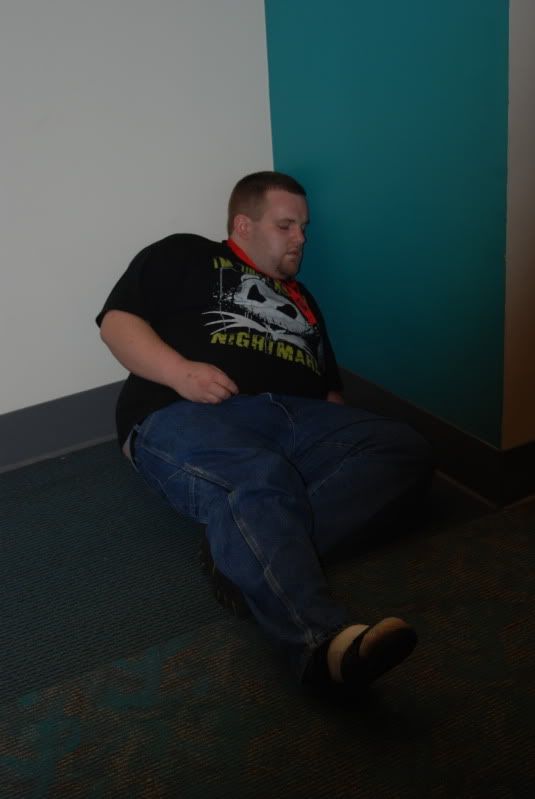
Luckily, we have a whole year to recover before we do it again. We hope those of you who have found us through our Con coverage stick around for more coverage of the best of science and technology in entertainment, pop culture and media. Thanks for following along.
A very exhausted and spent ~*ScriptPhD*~
]]>
Are you guys still staying strong and ready for more Comic-Con highlights? Good, I thought so. Saturday is always an action-packed highlight day for the Con, with the best of science and entertainment panels saved for last. And this year did not disappoint. We got an up close and personal view of the very last Lost panel ever as we watched right from the stage and bring you great pictures and highlights from the panel. Thanks to two great friends from the production crew, we were able to enjoy the controversial Futurama! panel from backstage, where we caught up with the writers and producers. Along with a full transcript of the highly anticipated True Blood panel, we had two more great press rooms with Fringe and MythBusters. To be a part of the Comic-Con action, please click “continue reading.”
Lost
Panelists: Damon Lindeloff and Carlton Cuse (executive producers and head writers of Lost) and special guests to be named later.


We can say with a high degree of scientific certainty that this year’s Lost panel, the last ever at Comic-Con, was the most anticipated event, as evidenced by queues that wrapped around the convention center, around the marina, and back. Some fans had started lining up in front of the Hall as early as 7 o’clock… the night before. Luckily for you, our faithful readers, ScriptPhD.com had a front and center seat right up on the stage with the press to take in every moment right up close as it happened. And since a picture is worth a thousand words, we decided to let you experience the full Lost panel in the pictures we snapped and with YouTube videos kindly recorded by Tostie Productions.
Part 1
Part 2
Part 3
A fun Season 6 promo!
And an even more fun parody video
As a supplement to the full videos, scroll down for some fun pictures capturing the best moments of the panel. Please credit all photography to ScriptPhD.com if you take these for your own use.
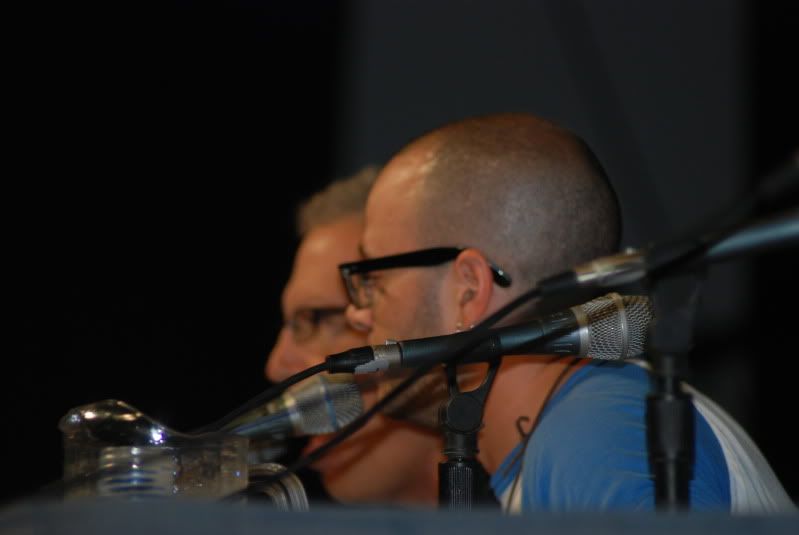

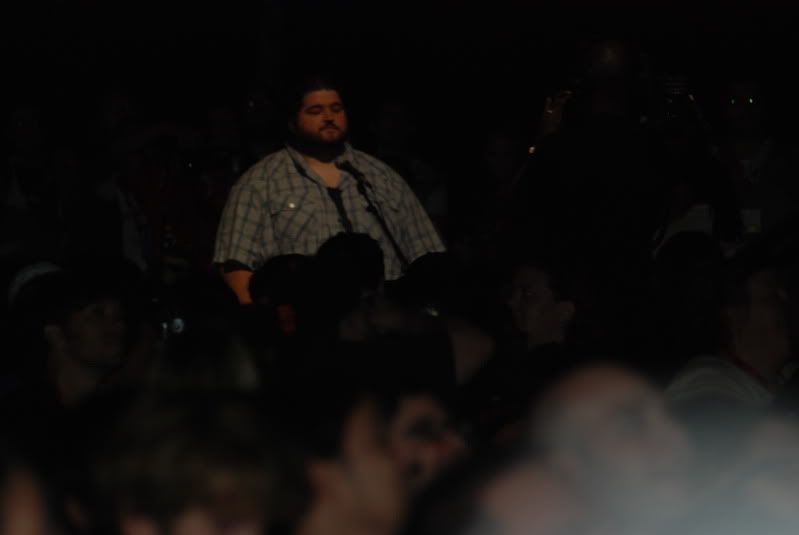
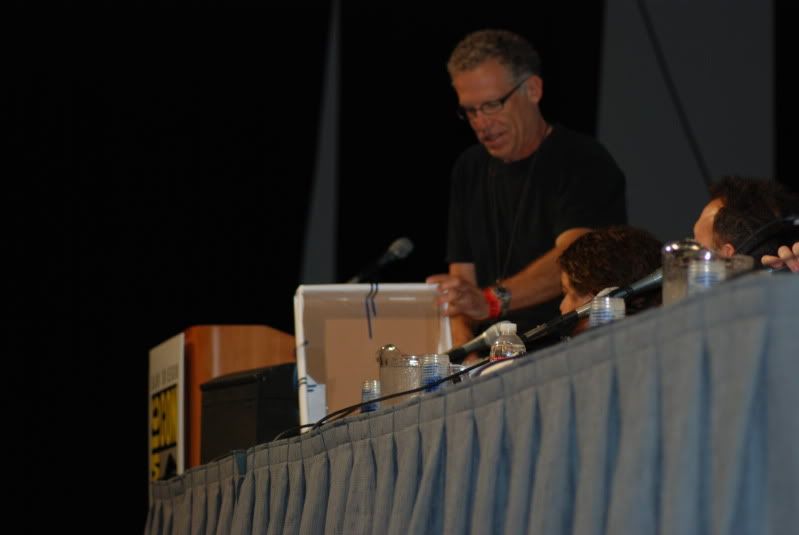
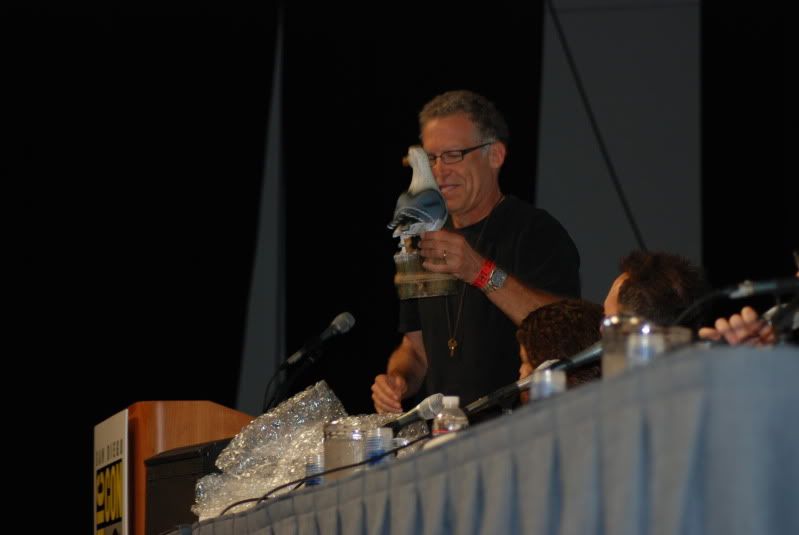
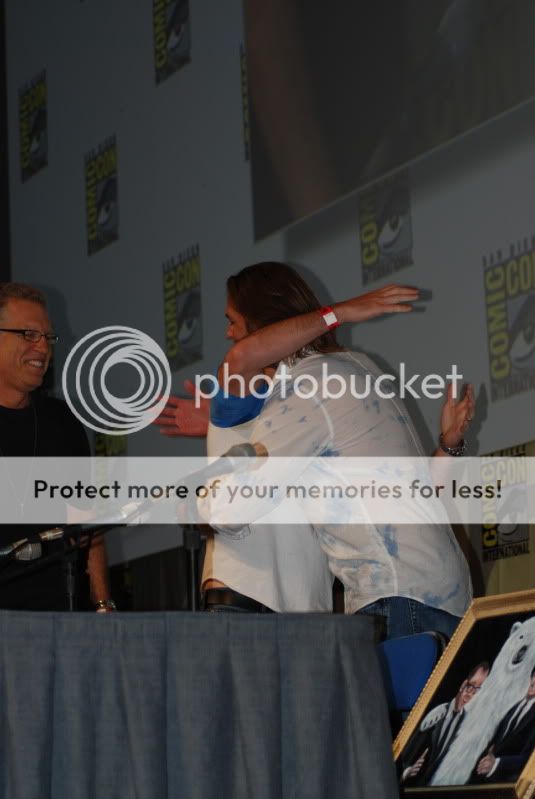


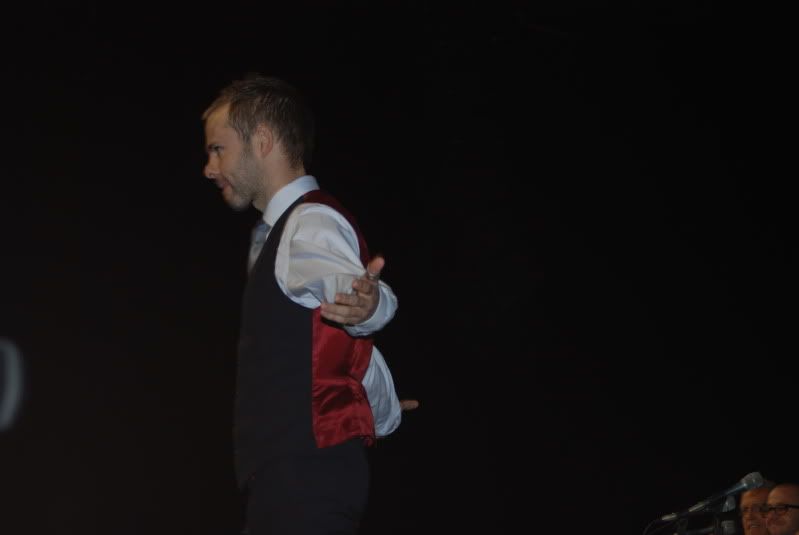
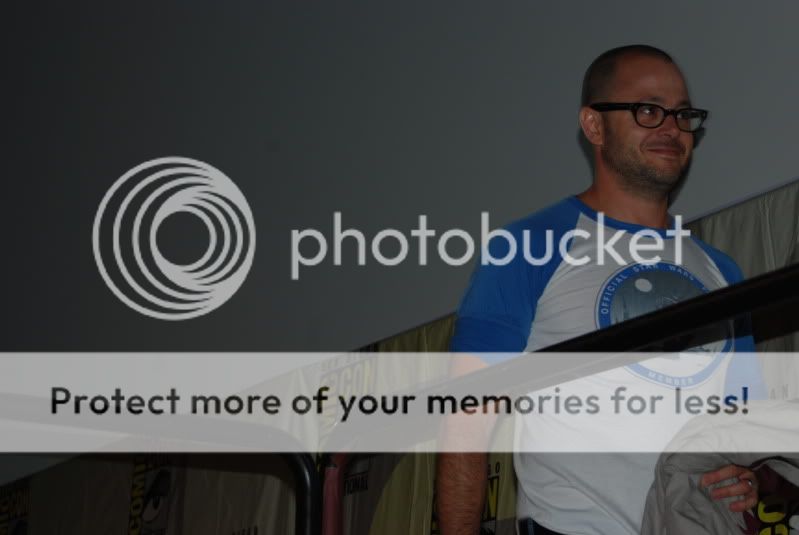
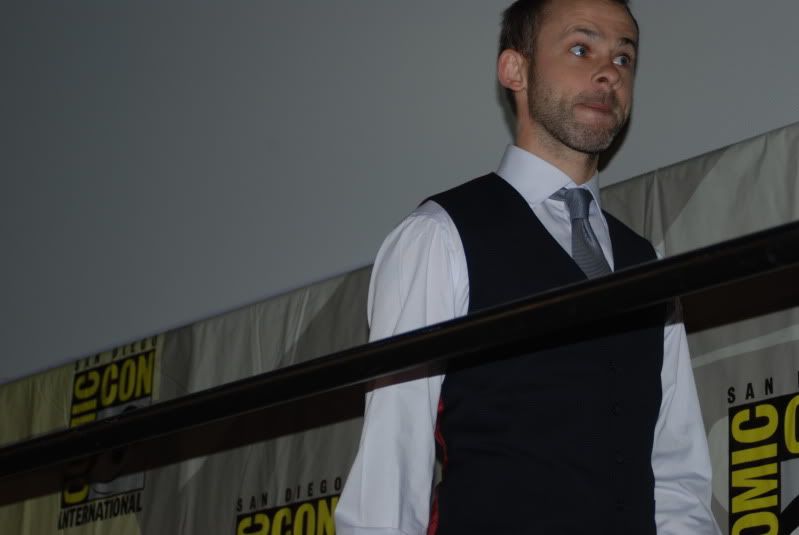
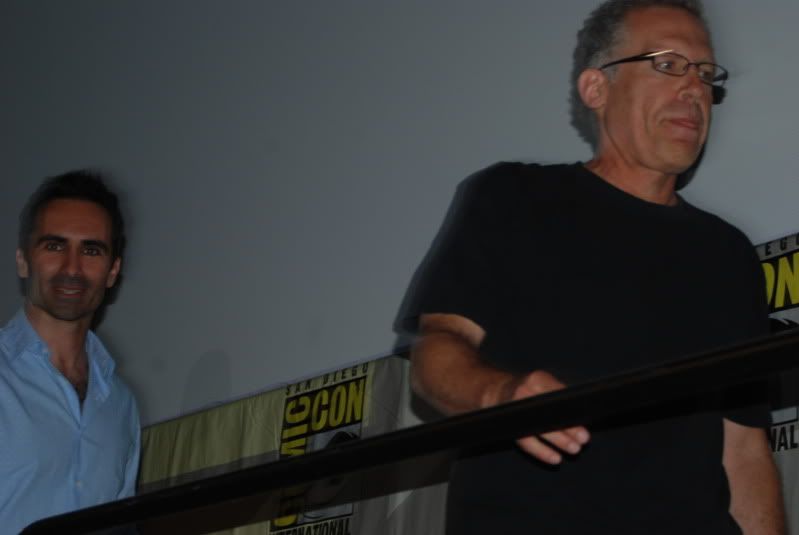
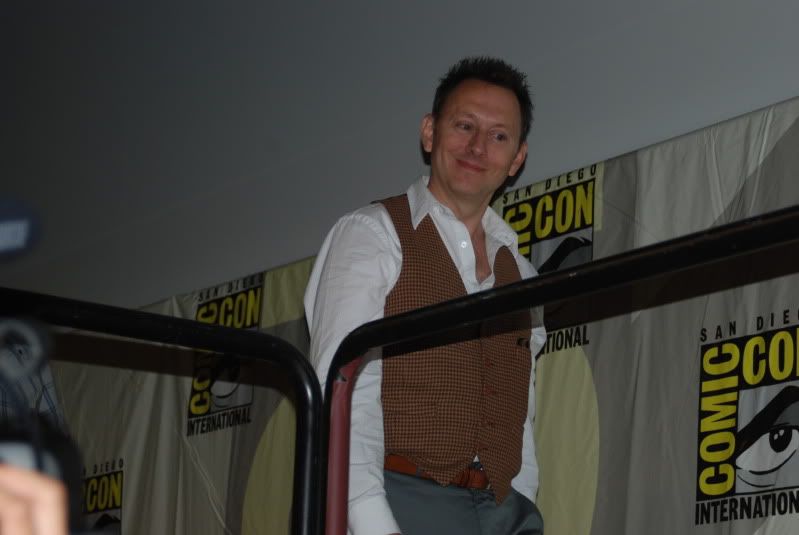
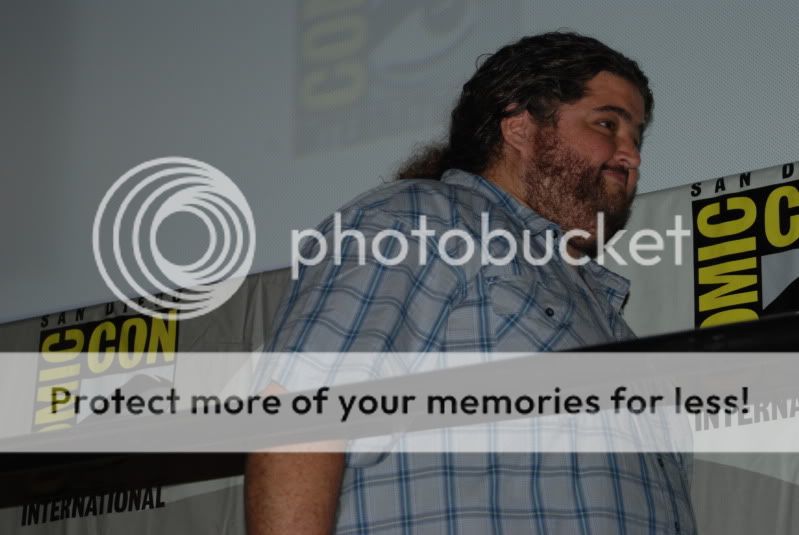
Futurama!
Moderator: Bill Morrison (Bongo Comics)
Panelists: Claudia Katz (producer/writer, Futurama), Patrick Verrone (Producer/writer, Futurama), Eric Kaplan (writer/producer, Futurama), Michael Rowe (producer, Futurama), David X. Cohen (Futurama, The Simpsons), Matt Groening (The Simpsons)
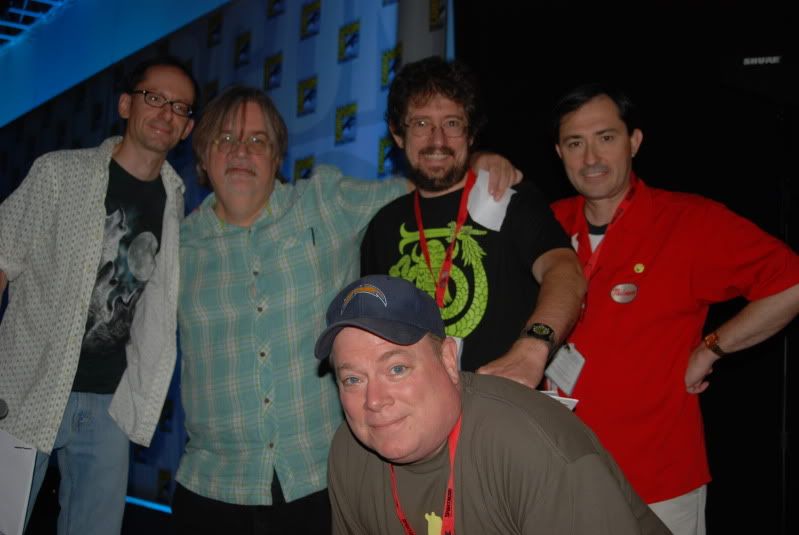
As many of you know, there has been a fair amount of controversy surrounding the return of FOX’s immensely popular animated show Futurama! due to contract negotiation issues with the actors doing the voices. The Futurama! panel was to have consisted of the voice talent, however because of the uncertainty of when and if the show would be renewed, animation and production talent appeared instead. Matt Groening began the morning by reading a humorous, sarcastic statement absolving Fox of blame for the situation. Due to time restrictions, the panelists saved time only for fan questions.
Producers showed a funny clip of Futurama! behind the scenes. (The clip is available as an extra on the DVD of Futurama!
Matt Groening: First of all we want to make it clear that we love our Futurama actors! We just hope that FOX and the actors can come to agreement ASAP. Let us continue.
David X. Cohen: We are mainly a panel of writers, and we decided to take advantage of that. S we are going to show you some samples of actual behind the scenes dialogue from writers’ room: things people have said over the years in the writers’ room that have been memorable, and we wrote index cards later. We saved them, Xeroxed them, and read them back, these are magic moments. And genuinely behind the scenes.
Example:
“We need to think about logistics?”
“What kind of logistics?”
“That’s what we need to talk about-there might not be any logistics”
“This is a light, romantic scene, so we don’t want him farting, puking and shitting diarrhea.”
“Were you nominnated for something?”
“No I’m a judge.”
“What did you judge?”
“Nothing, I forgot.” —re the Webby awards
“My monster manual is starting to smell.”
“Search for lame [on the script] going upwards.”
“Watch, it’ll highlight the whole script.”
“Inscincere compliments are still good.”
“Futurama brings the flava.”
At this point, the writers opened up the floor to fan questions, and each fan that asked a question got a prize out of the box to mimic what the Lost writers did during their panel at last year’s Comic-Con.
David X. Cohen: This is mostly Lost merchandise as prizes.
Fan: How do you guys keep continuity throughout the series? There’s a lot of references in later seasons from earlier seasons.
David X. Cohen: Fan sites, actually. We frequently consult with them, I’m proud and embarrased to say.
Fan: Beginning of the new season, are they going to end up in a random place or back home at Planet Express?
Matt Groening: David and I debated over that one. I thought it didn’t matter and that we should just start over. And David thought, no we have to address that world. So, he wore me down and that’s what we’ll do.
David X. Cohen: Exploring the story of that world wont be the thrust of the plot, we’ll get them back home, but yes we will address that world in the beginning for continuity.
Fan question: Do you guys expect to do Futurama! in theaters?
Erik Kaplan: Like puppet theaters?
Matt Groening: We’d love to do a Futurama theatrical, but we had premiere screenings at various movie theaters, we actually had one here at Comic-Con last year. It’s really fun to see it on the big screen. Hats off to the animators at Rough Draft for creating something that’s way beyond the boundaries of television, so we have watched the show on big screens. And we do plan on some work as a theatrical feature.
Fan: Will Leela and Bender ever get together?
David X. Cohen: We were right on the brink at the last season, and we will address that a little bit, but they’ll have their ups and downs in the new adventures. But of course it’s their ultimate destiny.
Fan: Is it harder to come up with jokes later in the series than in the beginning?
Michael Rowe: Can be hard at start, actually but later you learn from those mistakes. You get into the flow of the feel.
David X. Cohen: We’re at a certain point now with the show where that curve is leveling up, but someone will say, “Wait we did that in Season 3” so then we remember a hilarious joke we did and do a twist on that.
Michael Rowe: We’ll have to go back to the DVDs and change it!
Patrick Verrone: It’s actually much harder to come up with stories than jokes.
Fan: What was the inspiration for Nibbler?
Matt Groening: That was my idea of designing something cute, my Ewok.
Matt then gave this fan the uber-prize for best costume they’d seen all day.
Fan: Will there be any major characters that we’ve come to know and love next season?
Michael Rowe: I guess it depends on the actors [and the contract resolution].
David X. Cohen: We’re not going for anything big.
Matt Groening: But we’re planning to reveal the secret origin of Scruffy. He is not what he seems.
Patrick Veronne: I was home working on a script for a concept called “Twitter in the Year 3000”, which I’m working on right now. I’m hoping to involve you the fans from here at home, but that may get written out. We’ll probably call it something else because of the Twitter copyrights.
Michael Rowe: We’re going to have a shocking, unlikely relationship. Bender and Amy. It’s hot and heavy. Bender is due for a lot of it. And it even turns into marriage.
David X. Cohen: There’s a controversy about the robosexual marriage aspect of it.
Michael Rowe: Yes, it’s human/robot marriage, I heard there was Proposition Infinity to address the controversy of it. [laughter from audience—he’s ripping on Proposition 8 in California to repeal gay marriage.]
David X. Cohen: There is going to be a literal rebirthing of the show. We have another big one in the works: Ken Heeler, Zapp Brennigan, and Leela stranded together on an island.
Matt Groening: We have another one where Fry arrives early for once in his life to meet up with Leela. And Fry and the Professor get into time machine to skip over the 10 minutes so they don’t have to wait, only they go forward 10 years on accident. They keep going forward in time, hoping that eventually they’ll get into a time machine that goes bakcwards. I can’t say anymore… well all right I’ll tell you. The universe collapses. That’s all I can say.
Patrick Verrone: [Off-topic—all the panelists got a Hershey’s kiss during Comic-Con.] I disovered you can turn a Hershey’s kiss into a gelatinous blob.
Erik Kaplan: Someone here has a figurine of Judge Sotomayor.
Fan: Are you guys planning on doing any more mythology episodes?
David X. Cohen: 100% chance. Definitely, it’s in the works!
Fan: Simpsons episodes tend to parallel other works. Does Futurama parallel sci-fi?
Matt Groening: Yeah, we tried to do a bit of that. To create a broad enough sci-fi universe to have fun with all sorts of sci-fi. But we didn’t want to do parodies, although we did do our Star Trek episode with the original cast. But mostly, we keep it to a lot of references to literary science fiction.
Fan: Is there a Zoidberg story in the works?
DXC: That is an episode we want to do this year. Why did the Professor hire Dr. Zoidberg? We want to do the origin of them meeting many years ago. Yes, although it’s the Professor who will mainly star in the episode, we still want to do that backstory as a part of it.
Matt Groening: Some guy came up to me and showed me his Zoidberg tattoo on his arm. And I was so amazed by it, I told him “I can’t believe you got that.” And the guy said, “Yeah, everybody gets Bender!”
Fan: Are we speaking to the original writers here today? Is there a difference between the Fox and Comedy Central versions?
David X. Cohen: Well, the format has changed. It’s more of a feature piece with more music, battle scenes, andepic scenes. It’s really hard to watch 90 minutes straight of jokes. You have to pace it out differently.
Michael Rowe: It’s four half hour shows in one movie, and we had to make them work.
Matt Groening: In the middle fo the third one there was a writers’ strike, so that also may be accounting for some of the inconsistency that you notice.
David X. Cohen: There were three huge events at 22, 44, and 66 minutes in the new format. There were challenges to it, but it worked to our advantage. Ultimately, it’s up to you the viewer to decide where we succeeded, where we didn’t.
Fan: What was the creative evoluton of Zapp Brennagan sleeping with Amy Wong?
David X. Cohen: Given an infinite amount of time, all possible pairings would occur eventually. This idea seemed like it would create good tension between our characters. It did. This is why Amy and Bender have their deal down the line. It creates more cross-breeding.
Fan: You’ve created celeb guest heads. Any exciting ones planned for the future?
DXC: We can’t talk about it until the actor resolution. Until the person agrees to record it, we can’t announce anything. Generic answer yes, but we do have every exciting big names planned. Ufortunately we can’t elaborate.
Bill Morrison: Any parting words?
David X. Cohen: Keep your fingers crossed. This is business, and we’re just hoping for the best. Many cast members are still around, things are good between us. Just hope for the best and it may come true.
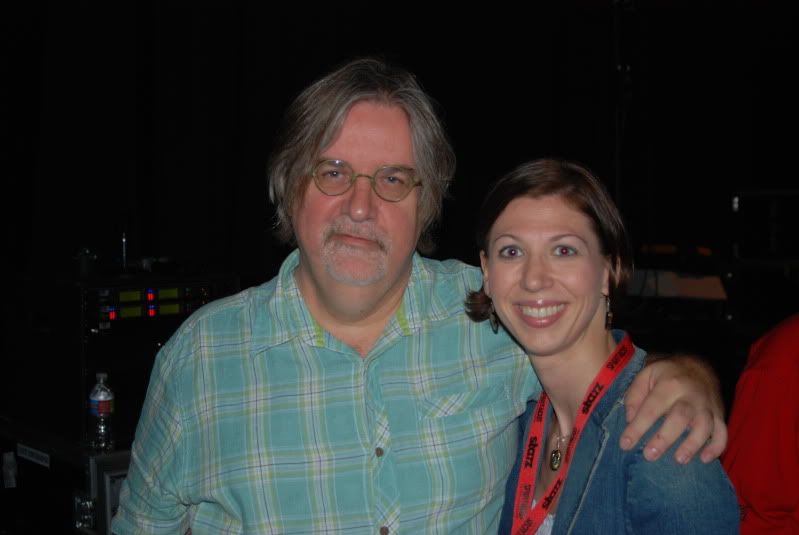
By this point of Comic-Con, the journalists and media covering the event are running mostly on coffee, adrenaline and the never-ending desire to get sleep… someday. After three straight days of virtually no sleep, wall to wall coverage, running the marathon to get from one end of the Convention Center to the other, all while dodging nerds and egregious violations of personal space, you might be wondering what the atmosphere is like by now in the press rooms? Pretty darned silly! Check it out:
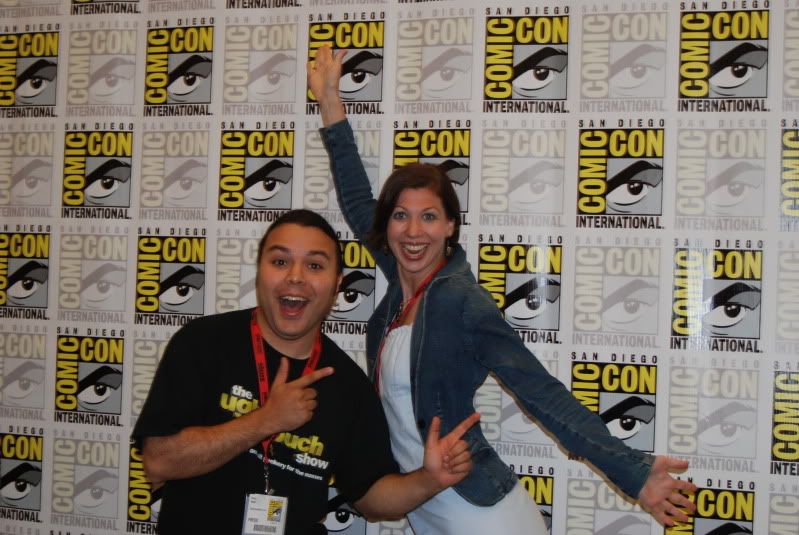
From the Press Room: Fringe
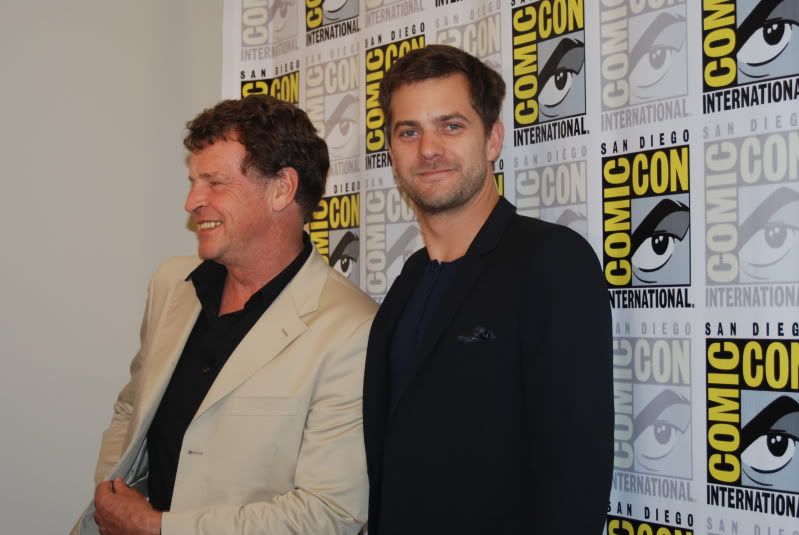
Roberto Orci, Alex Kurtzman, Jeff Pinker (series showrunners)
[ScriptPhD note: please forgive us for not delineating between the three showrunners for this particular part of the interview—they had to move very quickly from table to table, and it was tough for us to tell the voices apart in transcription. Thanks for understanding!]
Press question: How is the rewriting going? There was a whole conversation about it at the Paley Television Festival.
Showrunners: It’s going really well. We now know what the show is to a much greater degree. In a first season show, you’re really trying to find it, you’re trying to find the voice, trying to find what works and what doesn’t work, and like most shows that I’ve been associated with, the characters and the actors playing them start to become more one. And it’s a much easier time for writers who are joining the second season. The learning curve is much steeper. And they learn much faster. And they’re working out great. We’re just having fun with it.
Press question: Is there a plan for this season? Have you guys all sat down and…
Showrunners: We have a plot arc, a plan for this season, we have characters arcs planned for the season, and beyond.
I think in general, we’re much better prepared this season than we were last season. I think it’s hard for any show on earth, you’re in the first season, you’re finding your feet. So I think it’s a major improvement for us: what works on the show, what is the balance between the A story and the B story, which characters do better in what storylines? And it’s really a trial by fire. And hopefully if things are going well, by the end of the first season, everything slots into place. And that really happened. I think we all tangibly felt by the end of the first season that the show had really found its stride.
Press question: So when you’re plottig time for the show, what are the terms that you’re using for the different worlds?
Showrunners: We say our reality and the other reality.
ScriptPhD: Do you guys mind if I ask you a sciencey question?
Showrunners: As long as you don’t embarrass us! [laugher]
ScriptPhD: Promise. I represent ScriptPhD.com, we’re one of the few sites that covers science in entertainment. Really enjoyed the panel with your writers and your science advisor Ricardo Gil de Costa. He talked a little bit about his role, and I wanted to get the reverse, straight from the horses mouths.
Showrunners: Which one of us is the horse in that equation?
ScriptPhD: It’s just a saying!
Showrunners: It’s a collective horse.
ScriptPhD: It’s a collective horse, a proverbial horse. Tell me a little bit about how you use Ricardo’s expertise, and how that works in the mix of the science that you approach and obviously you are entertaining first and foremost?
Showrunners: We are entertaining first and foremost. We made a rule very early on that our show would not have aliens. Because The X-Files had done that so well. And we made another rule that all the science would be plausible, based on the science that’s currently accepted or at least proto-science. So the stories come from two different directions. One, we’ll come up with an idea that we really love and we’ll say, well, make the science work. Or, we’ll start with the science and ask where the story is in this.
ScriptPhD: And what role will Ricardo play in this process? How will you use his expertise?
Showrunners: Basically, it’s educating us about the language of the science, that we can rip creatively on it. You want to use the terms that are—we cheated, we tried to make it evocative and creative. So we’ll start with an actual article, actual reasearch, actual cases, and let that inspire us. As opposed to making stuff up. Everything that you’ve seen on the show has had some article that was the basis of it. You can see on any mainstream website or news outlet, the science and technology section has some very strange stories. It used to be that you really had to search these things out. And now you really can look at mainstream science and be inspired to imagine this really great stuff.
Press question: One of the things that makes it really successful is the science. Some people have asked about the romance, which for me personally is a bit too soon. In the second season, where are we on the Peter/Olivia romance?
Showrunners: I think we’re in a place where—I assume you’re talking about Josh and Anna—they’re more familiar. It’s more brotherly and sisterly right now and more of a caretaking role. As we go into the second season, our stories are starting to be driven by the characters as opposed to outside in. And if you saw our season finale, Olivia ended up in the other universe, and she’s going to come back, and there’s going to be consequences of what’s been done to her and what’s been happening to her. And she, in many ways, is going to become affected by the cases and this world. And he’s going to have to take more of a caretaker role towards her. It’s also very important for all of us that in doing a romance, you have to buy it. The characters have to organically get to a place where you would believe it. As opposed to forcing them together just to do it. Olivia’s character has so many walls. She was in love with someone who burned her badly, so she’s going to be very unwilling to trust again. And Peter has his own issues too. So I think if we do it, we really want it to happen organically, so that the fans buy it.
J.H. Wyman (writer/co-executive producer)
J.H. Wyman: Well, I’m the showrunner, with Jeff Pinkner, just so you know.
ScriptPhD: With Peter, how much are you going to go into the two realities. This reality versus the other reality? And where are you going to go with that?
JW: I can say that Peter is actually going to learn a lot of things about his existence, who he is, what’s going on, we’re going to delve into many things that will bang Peter out as a character. And make him the hero I think he wants to become. That’s all I can say about it.
ScriptPhD: But you are eventually taking us on a path where we’re going to learn about all of this?
JW: Look, you watch the program so you know that there’s enough answers in there to—I mean, it’s amazing the theories that people will come up with. It’s really quite wonderful. But yes, we’re definitely going to be able to delve into that and talk more about what we’re investigating in Fringe.
Press question: So we know there was this other reality Peter. Well, we think so. Is there another reality massive dymanic that enriches the world? Are we going to learn more about that?
JW: I would say that’s an interesting theory. I don’t mean to sound cagey about it. I think there are certain things the fans are trying to work out and figure out and the direction that we’re going down right now absolutely follows that line of thinking. But I don’t want to be cagey about what you’re going to see, but I promise it will really play your mind, because it does mine. It’s fun, you know? Really fun!
Press question: Any clues?
JW: Let’s talk about how the show is different, and there’s so many clues in that. Let’s talk about why it’s Fringe 2.0 instead of the original, and why it’s getting better I think.
Press question: So we know there’s not going to be aliens, what other things can we expect that we haven’t seen yet, as far as the fantasy and science fiction minus the aliens?
JW: It’s funny you should say that, because we literally made a whole—you know at the beginning, there’s the words, and we’ve done most of those words. Now, we’ve come up with a whole bunch of words—there’s many things beyond alien that you’re going to see that will frighten you and hopefully make you think science is dangerously out of control. But what’s really important, and the key to the characters and what’s happening this year, and why the show is different this year as opposed to last year, is that we’re actually—I would consider the first season a prologue, that’s my take on it. Here’s the show, here’s what you’re going to be doing with it, here’s the things that are happening, science is out of control, much more advanced than you would even imagine, here are the characters and the players. Now the second season is: let’s get involved into these people’s lives. And I think that that is the key to all the questions that you were asking. You’re going to fall in love with it. Like this year, Walter’s emancipation. He’s going to come out and come into his own and Peter’s going to have to let him, it’s really delicious stuff you know? Olivia’s going to start to develop in her own way, Peter in his own way, things that you never imagined you’d get to spend time with them, like last year in their houses and this year you will.
ScriptPhD: Like the relationship between Walter and Peter will develop.
JW: Oh, that’s one of my favorite things, yeah!
ScriptPhD: I really love that part of the show!
JW: I’m so glad you say that because it’s a big part. Yeah.
Press question: You just started shooting in Vancouver, just like another show, Supernatural. Can you talk about what that’s been like?
JW: We were in New York, and just cost-efficiency wise, we brought it to Vancouver. They allowed us to do much more. Because our money goes further, because of the Canadian dollar, and the production value goes up. The things that we’re planning to do this year really do take a certain amount of finance and fiscal responsibility to be able to do, so we figure we can definitely get much more money to do them. And we’re ecstatic. It was a smooth move, all our keys are still with us, and we found great people there, the nicest people ever. You can’t imagine. You go there and they’re just the sweetest people.
Press question: How much does the fans’ reaction to the show influence you in writing it?
JW: A lot. For me. I did read what they said about Season 1, going into Season 2. Because you have your own perceptions as a writer. You look at it and you’re going, “This is the story that I’m compelled by. I love the science and I love all that stuff, but what do I like?” And then when you start to write from that spot, you start to realize, oh when I’m really telling the truth, everybody responds. And people seem to pick up on the smallest little things. So I say, “Oh, everybody loves Walter in this! Oh, they love that moment.” And you realize that that’s something that you wanted to investigate so let’s do that. And I’m always looking at what they have to say, because that’s why we’re doing this, is so people can discover the program. And I still think not enough people have. And it’s really something, what the show is. The more that I can hear from the viewer, the more that I can do my job. Because, it’s not to write for them, but they’re a parter of sorts. I don’t want to write a show that fifteen people watch.
ScriptPhD: That’s really refreshing, because there are other showrunners [no names shall be mentioned ?] that are like, it’s my vision, it’s my show…
JW: No, no, no. I’m much more secure than that! I certainly have a vision…
ScriptPhD: I’m just amazed, because I’m a fan and a journalist and it’s really refreshing to me that when I watch the show, I know there’s a symbiotic existence between you and your fans, and a synergy there to make the show possible, and I think that’s just terrific.
JW: I did a very small program in the UK called “Key and Eddy”, a show in London. And I did it in 2001, and I still get people calling and asking what I was thinking for the rest of the show, because it only ran 13 episodes. And it left kind of a big question mark. It was very much ahead of its time. They still email and call and say this or that, there’s a whole movement, and they’re there. And it’s so hard these days to find time for appointment television, and the point is that when you’re asking someone in this busy time to commit to your show, the five minutes that they have in their day, I want them to feel like they are appreciated.
Anna Torv (Olivia Dunham)
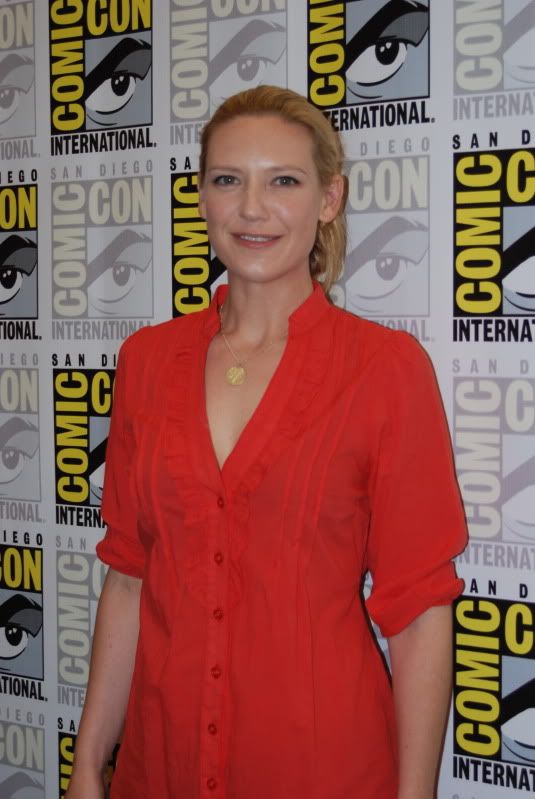
Press question: Do we get to see more of your superpowers next season?
Anna Torv: I know for sure that we will.
Press question: Are they going to have a darkness to them?
AT: Oh I hope so! I want Olivia to get darker, I think. I kind of like the dark Olivia the most. I like the episodes where something personal has happened to her, like when she was taken and had her spinal tap and she came out and she was ready to kill someone. Or when she was killing people in her sleep. I like her darker.
Press question: How long have you been living in the United States, and have you been hanging out with any of the other Australian actors here?
AT: I didn’t live in the States at all until I did the show, so I’d been over and visited a little bit, and had met with agents to see if I could get representation, but I never lived here until I moved to New York for the show. I moved over a year ago. I don’t know any of the other actors, I missed out on all of that, because we were based in New York. I heard that they have all these barbecues and things like that.
Press question: So is Australia still home for you?
AT: Yeah. I go back every break I get. I love Australia!
Press question: Do you get used to the hectic, frantic work schedule a show like this requires?
AT: Yes, I think you just do get used to it. And it’s—I love it when I get to do physical stuff, which I don’t get to do a lot of, actually. I think it looks like I get to do more than I actually do. But really, I don’t get to do that much! No, I’d like to do more of that, sure!
Press question: How are the scenes shot with Leonard Nimoy at the end of last season going to play into this season?
AT: No, I do know, but I can’t tell you. But you do get to find out. So you do eventually see the rest of that scene, but in a really cool way, actually.
Press question: Do you have anything that’s happened to you like that in your past like Olivia, from your childhood?
AT: You know, someone just asked me that! No, there’s nothing that I can think of! I’m sure if I really thought about it, but no.
Press question: Can you talk a bit about your hobbies and lifestyles and what you like to do?
AT: When I’m not working! [laughs] Well, I’m from Australia, so I surf, and I grew up near the beach and we always had horses. I love riding horses! I keep trying to get them to do something where Olivia gets to go jumping or something. I don’t know, I hang out. I’m a homebody.
ScriptPhD: Are you excited about where Olivia’s relationship with Peter is going, and can you talk about working with Joshua and your guys’s dynamic?
AT: Well I know! Everyone keeps saying what’s going to happen with Peter and Olivia? And I’m like, “Did you watch the first season? He started picking up my sister!” I’m not sure where I want them to go. I just read an episode that we haven’t started shooting yet, we’re about to start shooting next week, and Olivia starts to see Peter a little bit differently. And I think it’s kind of fun! I can’t say anything more. That’s it!
Press question: Can you talk about being glamorous on the show and yet, still playing a strong woman character?
AT: I don’t know, I think they don’t write her glamorous, but we’ve always been—like when we started with the pilot, we were always adamant that it’s TV, so nothing’s really realistic, but you can do your best. Like she doesn’t wear a lot of lipstick and I don’t know. You do what you can.
Press question: What have you loved about her vulnerability aside from a lot of the action that you’ve gotten to see?
AT: I love the episode where she dreams, which was where she starts having these dreams where she’s killing these people and then she finds out. I love that because I thought it was a really beautifully written episode, and I thought it was one of my favorite bits of Fringe, and I personally loved the shadowy, secretive, dark, what’s going on stuff. It also was where she found out about the early experiments and Walter did that to her. I loved that because through a lot of the first season, I felt like there wasn’t a real personal connection with Olivia and Walter and now, all of a sudden, there’s something there beyond just what we were experimenting on.
Press question: And will that come into play this season?
AT: We haven’t gone back to it as intensely as we did at the end of the last season, but it’s definitely still there and I think it will pop up again.
Press question: Is there an awkwardness to your and Peter’s relationship now when you’re working on cases because you know that?
AT: Sometimes, yeah. Sometimes.
Jasika Nicole (Astrid Farnsworth)
Press question: I heard rumors that we are going to see more of Astrid in the season to come?
Jasika Nicole: If you heard it, and I heard it, it must be true! Astrid, you’ll get to see a softer side of Astrid. She was often the person put up against Walter because they were so different—the young, the old, the new technology versus the old, book-savviness and everything. So we would have these funny quips, but she’s more than just that. I think that her purpose, at least in this season, is more than just providing some comic relief and one-line quips. And so she has this really fantastic scene that we filmed the other day with Walter where you get to see their personal relationship. You get to see why they click and work so well together. It’s not because she rolls her eyes at him all the time. Which she does, that’s certainly a part of her, but she’s also much deeper than that. I’m hoping that you get to see more than that—her connecting emotionally with the other characters on the team.
Press question: let me just say this. It is so great to have a person of color have such a smart and intelligent role. You don’t see that on television—
JN: And how!
ScriptPhD: And that it’s not a big deal! It’s just a part of who she is, but it doesn’t have anything to do with her abilities.
JN: Yeah, totally! It’s like, “You got into college?!”
Press question: What are we going to find out about Astrid’s history and how she got to the place she is?
JN: You know, these are all questions that I don’t have answers to, and I’m hoping that they do get answered at some point. I want to know why she decided to become an FBI agent and where did she come from and I want to know those things. I wish I could say for sure that yes, it’s going to happen, but I will say that we have brought another person into the Fringe world. Her name is Megan Markel, and she plays an FBI agent, and she is also bi-racial. Let’s talk about that. It’s awesome! And I was so excited, because it wasn’t like, “Oh we can only have one. Oh we can’t have more than this one actress.” Like you said, it was no big deal. Here’s this gorgeous woman on the show, and she’s really, really smart too, and she’s an FBI agent, it’s just awesome.
Press question: I think it’s great to have people like you on the show, because science and technology are becoming so wide-spread and it’s a wide demographic, it’s great to show that anyone can really be a part of this world. What integrated storylines can you talk about given what you’ve already shot?
JN: Thank you so much. With this new character, and I can’t speak about her too much, obviously, but we’re actually going to start talking about the aspect of religion, and how you balance that out with science, which has kind of been a battle of ideologies for a really long time. So we start to address that in this season. We’ve only completed three episodes, so we don’t know how far it’s going to go, but I really like it, because it’s really exciting! What do you do with your faith that you have grown up with and is a huge part of you, and then how do you combat that against these things that are happening and all this death and destruction? You hear that someone is in charge of it and it’s not the God that you’re familiar with, so I think that’s a really cool thing that we’re starting to incorporate into this season. I have no idea where it’s going to go.
ScriptPhD: Reading the scripts and seeing the science material, do you ever just geek out? Normally as an actor, normally you don’t get to do stuff that’s this heavy and technical. Do you ever just get to thinking about some of the issues that the show raises and it bleeds into your own consciousness?
JN: Absolutely! Oh yeah! I do a lot of Googling, because there’s a lot of words that I am completely unfamiliar with. Like, “I don’t know WHAT that is!” But I think I’m most intrigued by the idea of there being this other universe because what they’re saying with that is that as a person, you make decisions in your life, you have all these choices, and you make a decision. But you can also make the decision that you didn’t make, and so there is a world in which you exist where you made that decision. And a world where you exist and you made this decision. So it might not even be one parallel universe, it could just be tons and tons of them for every single choice that you made that is not this one, but it was that one. Which is kind of like looking through a mirror—it just goes on forever and ever! And you think about what kind of person you would be. And I guess that at some opportunity, they’re going to get to meet themselves and see what kind of person they would be if they did this and that. I made that up, I don’t know if that’s true.
Press question: Can you talk about your work schedule, given that your character doesn’t appear all the time?
JN: I think most people are pretty jealous of me. I have kind of the perfect schedule—I come in and I work for maybe two days a week, and then I just… have the rest of my time to myself. And that’s been super-important since we moved to Vancouver. We’re in this new city, and we want to explore, and see what Vancouver has to offer. I got a bike, I can ride around. It’s been a nice transition for me, because if I had been like Olivia’s character, and thrust into this situation that was completely foreign to me, and then having to work 15, 16 hours every single day for 10 months, that has really got to make you a bit loopy. And I didn’t have to deal with that. I just had to deal with my own loopiness that I had from the beginning.
Press question: When did it finally dawn on you that you had a successful show and that this was real?
JN: You know what I think it was? I think it was when the observers started showing up in real life and not on the show, and I was like, “OK, they’re trying to make this like a brand, kind of.” He’s at this game, at NASCAR, and it didn’t have anything to do with the show, they would just be filming him and putting him out there to promote this whole idea. And I thought that was kind of huge and really neat! Maybe next, we’ll have Afro wigs [to promote the show].
ScriptPhD: This is kind of your first big break-out role. Is it weird for you when people recognize you?
JN: It’s weird. But you know, no one creepy or scary or anything has come up to me. It’s only been the nicest, sweetest, most complimentary people. So it’s weird to be recognized, but then you have this really awesome conversation and they tell you their theories about the show, and you tell them yours, and then you part ways. It’s great. It hasn’t interfered in a negative way at all, which is great.
Joshua Jackson (Peter Bishop)
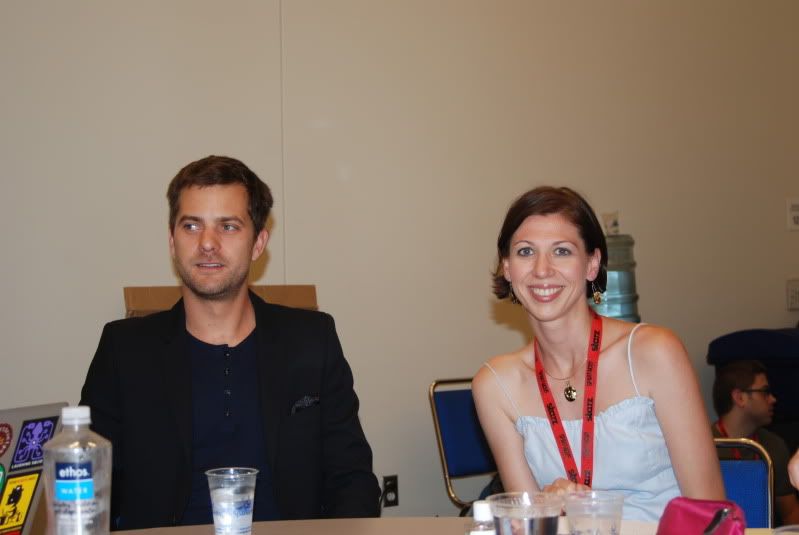
Press question: How has the move to Vancouver to shoot the show affected you?
Joshua Jackson: Well, Vancouver is my hometown, so in its way, it’s moving home for me. Personally, it’s actually not difficult at all. Inevitably, it changes the urban-ness of the show. It doesn’t change the urban nature of the show, but the West Coast of Canada is very different than Brooklyn, which is where we shot most of Season 1. So that changes a bit. There’s a certain bittersweetness—and this is all behind the camera stuff—eventually the television becomes the people who make it. Moreso even than the actors or the writers. It becomes a machine, and the cogs of the machine are all of us sort of doing our bit and putting in. And to move the show, we had to lose 100 people, 140 people actually, who were employed on our show. So there’s a certain degree of bittersweetness, because without their hard work, we don’t get to Season 2. And in a just world, you don’t repay that hard work with a pink slip. So I feel a bit guilty that I’m going home and that’s fine for me, because for other people that is not fine for them.
Press question: Is it still home for you, in a sense, or have things changed since you’ve been away?
JJ: Have you ever been to Vancouver? Nobody leaves Vancouver. It’s paradise. It wasn’t until I moved to North Carolina, and was in a discussion with somebody who will remain nameless because I don’t want to bag on her hometown, but it wasn’t until I moved to NC and started working with somebody and they said, “God I’m so happy to be away from home!” that I realized some people don’t like where they grew up. Vancouver is paradise! It’s a perfect, perfect place, especially if you’re an outdoorsy person. It’s heaven, so…
Press question: But it’s been getting bad press about the drug wars at the moment, no?
JJ: [laughs] Yeah, I know. Have you been in downtown LA? East Hastings is a legitimately bad neighborhood. It’s on par with any of the worst neighborhoods that I’ve been in anywhere on the planet. But if you’re not a moron, you’re probably not going to get involved in a drug shootout. Or if you’re not an addict. So there are many ways to not get involved in a drug war between the Triads and the Hell’s Angels.
Press question: To get away from the real world and to get back into our favorite virtual world [laughter], we started to see Peter bringing in a bit of his underground connections, his underground connections for the end of last season, so are we going to see more of that next season, or is it more of you using your heightened superpower?
JJ: Sha-na-na-na-na-na! I think we spent the better part of the first season why it was specifically that Olivia Dunham needed to be the leader of the Fringe world. What we didn’t do—we talked about it, we hinted at it—but we never really saw what Peter was outside of this world, because we never visit him outside of this world. He’s always assisting and investigating hits. Then, you get to the end of the first season, and Peter becomes invested in this world. And now he starts to use his powers for good rather than evil. And, he starts to invest this very shady knowledge that he has and his personal immorality. He doesn’t have a moral attachment to things being good or bad. He is presented with a problem, he comes up with a solution, it doesn’t really matter if he breaks some eggs along the way. And I think he’s sort of figuring out his humanity as the second season is going on.
Press question: Can you talk about Peter’s relationship with Walter and how will that be developed?
JJ: Well, for myself, and I say this as an actor and not a person on the show, for Josh the actor, the most important relationship on the show to nurture and maintain is the Walter-Peter relationship. John Bishop and I spent a lot of time talking about where we are in the season, and pushing and pulling, and John is an endlessly inventive guy. And we work well together. So there’s always this state of play on set. That being said, that huge reveal about Peter not being one of us at the end of the first season is inevitably going to lead to a breakup. So until the breakup, I think you want to see these guys become closer and closer and more and more into a healthy father/son relationship and then poof.
ScriptPhD: Josh, can you talk about when you first got the material. This is very different from work you’ve done in the past, especially with the science. Talk about how you reacted viscerally to the show when you first got the script, and what about this really drew an appeal for you as an actor?
JJ: Well, the initial script, which I guess isn’t too surprising given who the writers were, read much more like a film than a television show. It was a two-hour pilot, so it was long, but incredibly in-depth, and with all of these multi-layered story points where things were not as they seemed and I just thought it was really well-done and well tought-out. And having worked in television before you also have to see how this idea behind the pilot could spin out 40, 60, 80 to 100 other ideas that could be interesting. And I think this group of guys has a pretty good track record with being able to do that. And I’m a sci-fi head, so…
ScriptPhD: You are? How cool!
JJ: Yeah!
That’s right folks, you heard it here. Joshua Jackson is a sci-fi geek. See? Science is awesome!
True Blood
Moderator: Kate Hahn (TV Guide)
Panelists: Anna Paquin (Sookie Stackhouse), Stephen Moyer (Bill Compton), Alan Ball (creator/executive producer), Nelsan Ellis (Lafayette Reynolds), Rutina Wesley (Tara Thornton), Sam Tremmell (Sam Merlotte), Michelle Forbes (Maryann Forrester), Alexander Skarsgard (Eric Northman) and Deborah Ann Wolf (Jessica Hamby) and Charlaine Harris (author)
Kate Hahn: I want to introduce myself. I’m a writer for TV Guide, and I’ve worked with Alan and the cast quite a bit, I worked with them for the TV Guide cover story and am thrilled to be here. We are going to kick off tonight with very special announcement from Alan Ball.
Alan holds up True Blood: The Drink to wild applause from the audience.
Alan Ball: True Blood: The Drink is a reality now. Those of you here at the panel last year know that it’s a very specific makeup. We couldn’t make up synthetic blood, so instead we used a nice mixture of Chateau La Feet Rotschild with blood of hemophiliac royalty, Viagra, Vicodin and vodka. …and ecstasy. Unfortunately it’s illegal. All kidding aside, though, there is a True Blood drink available September 10th. And it’s basically blood orange soda from all-natural ingredients. Just in time for Season 2 of True Blood.
Kate Hahn: Anna, Sookie has gotten in a lot of jeopardy and will be in more trouble as Season 2 progresses. How has she changed this season?
Anna Paquin: After last season, she is stronger, tougher, she’s been through a lot, she’s grown up quickly, and she tends to get herself involved in situations she can’t control, in which case it is good to have a vampire boyfriend. As far as portraying her, I’m just trying to imagine going through that in two weeks, and find myself in these situations. But that’s my job.
Kate Hahn: Stephen, Sookie’s being admired by multiple vampires. Hypothetically speaking, if something were to happen between Eric and Sookie, how would Bill respond?
Stephen Moyer: It’s hard to get away from that rangy Swede at the end of the table, but I’m not sure Bill would roll over and just let it happen. He’ll fight his hardest and not be quite as polite as he’s been up to this point.
Kate Hahn: We’ve seen really big changes with Tara. What is your take on how she’s changed as more of her softer side has come out?
Rutina Wesley: I like playing the softer side of her to show her vulnerability. I call her a hard flower, because of the fact that she’s so tough on the outside but has this really soft inside, and I think it’s nice for everyone to see that part of her. She wasn’t taken care of before growing up, and this season she’s being taken care of by Mary Ann which is a nice change for her.
Kate Hahn: Alan, there is lots of action in second half of season based on the preview we just saw. How do you balance all the action and the emotions of this show?
Alan Ball: I make a joke about a sign we should have in our writers room that says “It’s about the emotions stupid”. Without that, all the action and other craziness wouldn’t have a heart and soul. So, we just work really hard to always remember who these characters are, what their passions are, what they need and are fighting for so that the other stuff has an emotional foundation. It’s one of the reason I responded so well to the books, do the same thing on the show.
Kate Hahn: Mary Anne is the source of a lot action on the show. Michelle, the fans here know you from other shows in the sci-fi genre, wher eyou have portrayed powerful women. Why does this genre in particular lend itself to these women and these characters?
Michelle Forbes: I think ultimately sci-fi as a genre offers lots of freedom to see a future [where gender is irrelevant], and I spoke about this with Mary McDonnell a lot on BSG, she’s a goddess by the way, sci-fi takes cliches out of our minds and we’re able to have a lot of freedom of thought. It’s a forgiving genre, and especially on our show, grounded in emotions. True Blood is creating an entirely new love for these genres.
Kate Hahn: Nelsan, everyone loves Lafayette. [wild cheers] But Lafayette is having some post tramatic distress disorder these days, he’s having quite a time with what has happened. How has his worldview changed since the basement incident?
Nelsan Ellis: His hustle is supreme, but in this case, he’s figured out it won’t work for him to get him out of the situation, so he’s definitely rethinking his hustle and might stop doing it. But we’ll see.
Kate Hahn: Charlaine, you and I have talked before, and something that came up was your reaction to seeing your novels visually on the show. You said “When I first saw True Blood, I had to cover eyes about some scenes.” Can you elaborate on that?
Charlaine Harris: HBO sent me a copy before premeiere, and watching some of the scenes, I went “Ahhh!” And then I called my husband and said, “Honey we’re gonna have to move.”
Kate Hahn: Sam, we’ve talked about how your character has been unlucky in love, and he has a lot in common with Daphne, but things may not be going well between the two of them. Is he gonna finally find a nice girl?
Sam Tremmell: Well, he gets a bit lucky with Daphne. He’s a magnet for abuse this year, he’s just trying to get by. His journey this year and in years to come, is really sparked by his meeting with Daphne and what she teaches him. He has to decide whether he regrets it.
Kate Hahn: Deborah, this is your first big gig in the industry. You’re not that far out of USC. And you’ve mentioned that this cast has been helpful in the transition. What scene have they helped you with in mentoring, if you can remember one in particular?
Deborah Ann Wolf: I tend to be a nervous person in general, and am actually nervous right now, so just know that I’m picturing you all in your underwear. But I remember shooting Episode 4 and I was really sick with a 104 temperature and no voice. I felt like a total failure in terms of disappointing Alan with my performance, and was doing a scene with Steve and Anna and Jim. They said “Don’t worry, you can be quiet during our sides”, and I somehow managed to squeeze it out. Their moral support helped me through. [Collective audience awwwwww]
Kate Hahn: Alex, Eric is smitten with Sookie, but no matter what happens he’s drawn to her. Why?
Alexander Skarsgard: Well look at her! I’m sorry Stephen. Eric’s been around for a long time, 1000 years. He’s gotten to the point where he’s kind of over humanity by now. He’s seen it all. He thinks humans are pathetic and naïve and yet, despite that, there’s something different about her but he can’t put his finger on what excites him. He’s curious, and of course, he wants to explain that and see what happens.
Fan: Charlaine, will season 2 affect the plots of the Sookie novels?
Charlaine Harris: I just signed a contract for three more Sookie books, so that will give us up to 2014. I don’t think I’m affected by the show because those are past books that they’re plotting from. And I’m way beyond that now, things have really changed in the plot. Eric’s got a different maker from the maker on the show. But I hope you see that as a different opportunity for two entertainment experiences.
Fan: Alexander, your character’s gone from dark to vulnerable. How has that come about and will it continue?
Alexander Skarsgard: Well, at the beginning he’s just in one little sequence on the show, his is not really a huge part, he’s just the evil vampire leader and then takes it back into the dark. I always had to defend him, that he really does have a good side to him. But season 2 has actually been great because I’ve gotten to show that. He is a bad ass, but I’m just happy to get to do different layers and go deeper and show there’s more to the character than that. He doesn’t care for a lot of people and a lot of vampires either. The ones he cares about he’s very loyal to.
Fan: For Season 3, what are you excited to do?
Alan Ball: I’m just looking forward to the fact that there is a Season 3. Partially because I just love working on the show so much. I’m excited to start exploring some of my favorite parts of the book. We have wherewolves for the first time. I’m definitely interested in Russel Edgington and the Mississippi vampires. Debbie Pelt, I think she’s kind of awesome. I can’t put Bubba into the show without it being cheesy, though, because you could never have the real Elvis.
Fan: Alan and Alex. Pink spandex. Yes or no?
Alex Skarsgaard pulls up his pants to reveal that he’s wearing a pair. Wild cheers from audience.
Alan Ball: I’d planned not to, but maybe you’ve changed my mind.
Fan: Based on the preview we just saw, was it me or was that blond hair behind Sookie?
Alan Ball: I have no idea what you’re talking about.
Fan: Alex, what’s it like to go from the entertainment industry in Sweden to America?
Alexander Skarsgard: If this was in Sweden this would be in a barn with 35 people and about 25 of them would be named Skarsgaard.
Fan: Alan, how you make musical choices for credits?
Alan Ball: “Bad Things” by Jason Everett that was a placeholder for the temporary title credits we’d made for HBO, and I didn’t know that song very well, I just randomly picked whatever country western tune I could find through iTunes. And later on, when we were constructing the credits, we wanted to use a different song, but when we went back, nothing ever worked as well as his song. For the end credits, we work with a music supervisor named Gary Calamar who also worked on Six Feet Under, and he brings us interesting choices. Sometimes a writer will put a choice in the script, other times we can’t use it because of money, other times Gary brings other options. Ultimately we try to pick what is appropriate with lyrics and what works musically for the emotion that it sells.
Fan: Sam and Regina, what about a rekindling of flames for your characters?
Sam Tremmell: I’d be excited about that.
Fan: Stephen, you will always be my Prince Valiant. Do you have any other projects going on right now?
Stephen Moyer: Thanks for Prince valiant reference. What she’s referring to is that I had to have a ridiculous mullet in 1997, and ride around on crocodiles. I’ve got a movie called Tribes of October, and I’m waiting to finalize that, and I’m doing a British film called Flutter about gambling.
Fan: What aspect of your character do you like and dislike the most?
Anna Paquin: What do I like about Sookie? I like that she says what she’s thinking, I admire that. She jumps in and gets involved even though it gets her into trouble. She means well. What do I not like? Well, if she’d been written as an unnatural blonde, I would have nice dark roots and my hair wouldn’t be shorter due to all the split ends, because I’m a very fake blonde. But other than that, Sookie and I get along great.
Fan: Will the love triangle between Eric, Sookie and Bill play out on screen as in the books?
Alan Ball: Yes.
Fan: Has any aspect of the portrayal of your character been influenced by the books?
Anna Paquin: I read them rabidly leadig up to my audition, as I wanted to know as much as I could to prepare myself for playing the character. I felt that the Sookie on the page in the script was like the Sookie in the books. It’s hard to unmarry the two. But ultimately the portrayal comes down to my interpretation and the directors and their input.
Alexander Skarsgard: I read the first five books to learn about the characters, but at some point you need to take control of the characters and leave the books behind you. We have a path and we stick to it but it’s certainly nice to get background information.
Stephen Moyer: One thing about our writers that is incredible, every time they see you play something that works, they think, “Well, if that worked so well, what if we put them in a completely different place and see what happens?” If we’ve seen them react to this, how do we see them reat to that? And it becomes more complex to play the role.
Fan: Will Jessica be more of a handful for Bill?
Deborah Ann Wolf: As much as they’ll let me.
Fan: Alan and Alex. Talk a little bit about the dynamic between Eric and Lafayett and Eric and Goddard.
Alan Ball: Obviously they’re gay lovers and spend the summer together in Fire Island. Eric and Lafayette. Their relationship is one of fear by Lafayette towards Eric for good reason, whereas Eric is intrigued by Lafayette may have plans for him in the future. Eric looks at Godrick as Godrick talks about them: father, brother, son. He is the most important person in Erik’s life, he’s known him ever since he was born as a vampire, so there’s tremendous love there. And it’s not necessarily romantic. The relationship between a vampire and his maker is deep, you can’t really understand it.
Alexander Skarsgard: That has been fun to shoot, because up until that point, Eric has been an entrepreneur, but this was on a personal level for him, going to Dallas for love and has nothing else to gain.
Fan: Question for the vampires on the panel. Anyone ever have a fang malfunction during shooting?
Deborah Ann Wolf: Well I’ll tell you, the hard ones stay in well, but the rubber ones fall out easily, so it’s kind of tough to be cool when you’re immortal.
Stephen Moyer: I spent the first two months with indentations in my mouth because the hard ones are really sharp.
Rutina Wesley: Yes, they are. [audience laughter]
Fan: Are you going to keep Jessica as a rebellious teenager or let her grow up a bit?
Alan Ball: One great thing about an extended series, you don’t have to define a character in the same place, they can grow up. I hope the series has a long life. I hope to keep everyone in their basic character as they grow. But you can expect evolution in the characters.
Fan: Deborah, is Jessica going to have a love interest?
Deborah Ann Wolf: I hope so.
Fan: Alan, will you ever have a one half vampire/human combinaton? Like a hybrid baby? [Loud boos from audience.]
Alan Ball: What? A one half vampire baby? No! In our show, they’re either full on vampires or they’re not vampires.
Fan: Charlaine, where do you get your inspiration for your books?
Charlaine Harris: I was gonna say the tabloids. Inspiration is a word I don’t trust. Writing is work and what I do is work. Some days I pull my own hair for ideas, and you wouldn’t want to be around me then. It’s just that the work takes places in my head. My contract has a deadline and if I waited for inspiration, my editor would be pretty mad at me. So I just flex my fingers and I say, “Who’s coming to Sookie’s house today?”
Fan: Charlene and Alan, what kind of demographics make the show a success?
Charlaine Harris: We aimed for an adult audience and I think we’ve hit that target.
Alan Ball: One of the great things about the beginning of the show before it had aired, HBO had tested the pilot, and it tested really high with adults of all sorts. The women love the romance and the men love the sex and violence. And since the show has aired, we have learned that it really does have wide appeal. There is a really large audience for this show. It goes across a huge spectrum.
Fan: How do you feel True Blood has impacted your career?
Alan Ball: It ruined it. I’m dead in Hollywood. It’s been really positive. But I tend not to focus on that aspect of it. This is the most fun I’ve had in a job. It’s a lot of good people, very talented, everyone is onboard to making the show as good as it can be and watching it. I’m the luckiest guy on earth.
Fan: Charlene, how involved are you in the series?
Charlaine Harris: Alan and I have a working relationship. I don’t tell him how to make the show, he doesn’t tell me how to write the books.
Fan: Michelle, what attracted you to the role?
Michelle Forbes: Any time you’re offered an entrance where you’re standing naked in the middle of the road naked with a pig, you don’t say no.
Fan: Any hilarious experience during filming?
Nelsan Ellis: Oh, so many. One episode in the future features a dancing naked dude who is 300 pounds. That was pretty hilarious. There’s one take where he fell. That was hilarous.
Fan: Charlaine, with regards to vampire blood, what’s the difference between doing V and drinking the blood.
Charlaine Harris: The age of the blood. V is from a younger vampire. Getting it from the vampire is always a much better experience.
Fan: Alex and Steven, are ou ever going to counter Godrick in a season?
Both: Yes.
It was great fun to watch the True Blook panel backstage and chat a bit with the stars of the show (Michelle Forbes, in particular, was a delight, and the ScriptPhD is a huge fan of her work on In Treatment), but the unquestioned, indesputable highlight of Comic-Con for me? Meeting and chatting with my screenwriting hero, Academy and Emmy Award winner Alan Ball. From American Beauty to the masterpiece that is Six Feet Under, Alan has redefined the cinematic experience on the big and small screen, and challenged his audience to engage in a deeper level of thinking and processing his material. Thanks, Alan, for being so very gracious and stopping by my way.
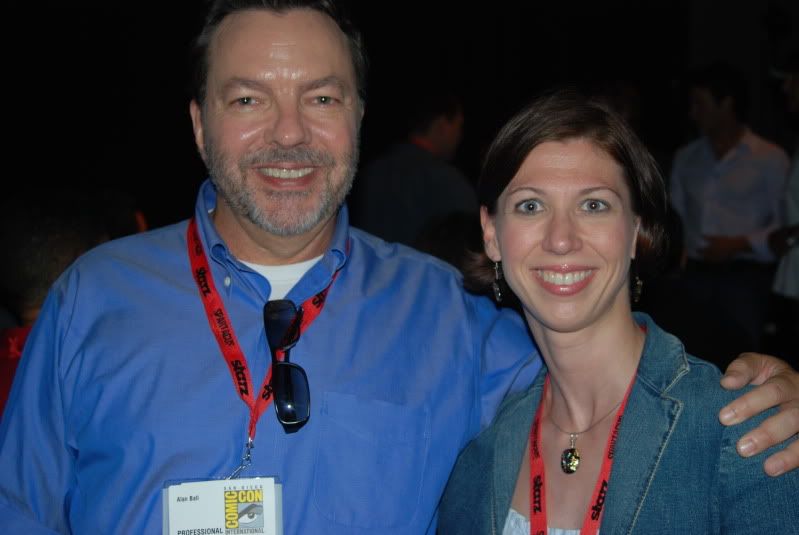
We ended an exceptionally busy and rewarding Comic-Con Saturday in an intimate press round table with the stars and producers of Discovery Channel’s hit science series MythBusters. For those of you who have not yet had an oportunity to check out this show, and are fans of great television science that entertains, it’s not too late to jump on board. In each episode, Jamie and Adam, aided by costars Grant Imahara and Tory Belleci, use basic elements of the scientific method to test the validity of various rumors, myths, movie scenes, internet videos and news stories in popular culture. It’s entertaining, explosive (sometimes literally!) and you get to learn cool science. What’s not to love? In fact, stars Jamie Hyneman and Adam Savage announced today at Comic-Con that they will be appearing on the September issue of Popular Mechanics. Fans can visit this site to enter to win one of 10 signed copies by the MythBusters themselves. Our discussion with the cast helped answer lots of behind-the-scenes about how the MythBusters episodes are filmed, where they get their source material and just how do they do that?!
From the Press Room: MythBusters
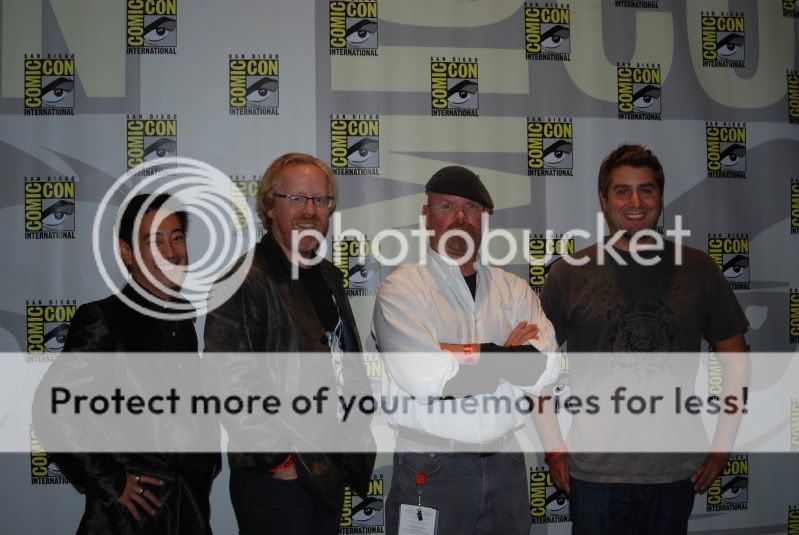
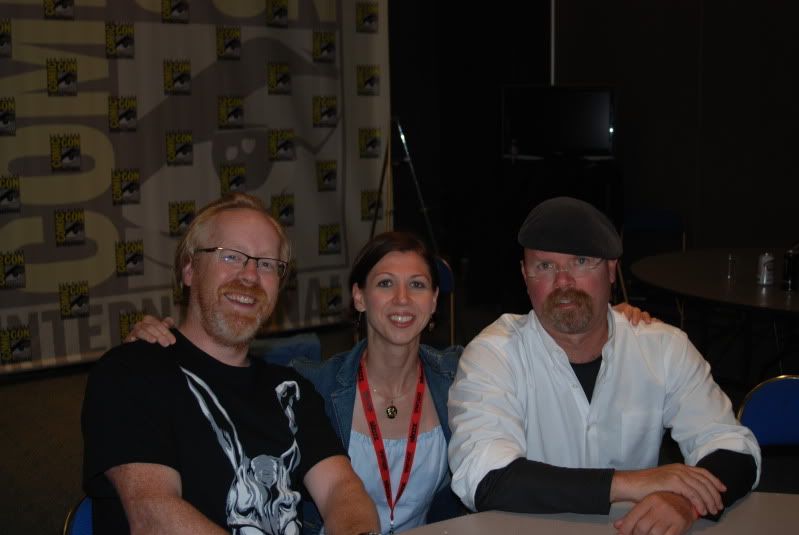
Press question: How did this all get started and how did you guys all find each other and say, “Hey! Let’s make a TV show out of having fun and blowing up stuff!”?
Adam Savage: Well, it’s not our idea. Actually, the original MythBusters creator found Jamie and I in the Spring of 2002. He was looking for special effects technicians to host a show based on busting or proving urban legends.
Jamie Hyneman: And his idea was to not just have us talk about these things but to replicate them and the fact that we build all sorts of unusual things was appropriate for that.
AS: And so Jamie gave me a call, asked me if I’d be interested in hosting it with him because he didn’t think he could quite hold the show on his own—
JH: I figured I’d find someone that was a little mit more of a ham than I am. And maybe we could bat it back and forth a little bit and it seems to work.
AS: So we shot the first pilots in the summer of 2002, and shot the first season in 8 months in 2003, 13 episodes, and then Discovery wanted 30 in the next year, and we had killed ourselves doing 13 episodes in 8 months, 6 days a week, 10 hours a day. So they said, “Maybe we need some more people to help bust myths. Let’s kill some other people!” So we brought in Tory and Carrie and Scotty Chapman, who was in that second season. And then Scotty left after the second season, basically because she wanted to do her own thing. She didn’t like the amount of time that doing television took. Since Jamie and I had worked with both Grant and Tory, Grant was somebody that we’d been thinking about for a long time that we wanted on the crew, and I’d called Tory when I’d called him and I said, “Dude, it’s Adam call me back! I’m gonna change your life.”
Tory Belleci: Well I’ve known these guys for over about 15 years. Jamie actually gave me my first job out of college doing model making. And then Adam I’d met up at ILM [Industrial Light and Magic]. He used to walk around like he had a TV show before he had one. He’d be walking around cracking jokes. I did this thing once where I took an X-acto knife blade, I snapped off the end and I glued it to my hand and put a little fake blood. He and I were working together on a model, and I kind of reached over and went, “Hey Adam, can you hand me that?” And freaked out. He was like, “Ahhhh!” And then he goes away and all of a sudden I hear everybody in the other room laughing their butts off and I walk in and he has taken a whole bunch and snapped them off and glued them to his head. And he’s like, “Heyyyyyy!”
AS: Can’t let a good idea go to waste!
Grant Imahara: I remember Tory and Adam and I were working on Matrix: Reloaded and Adam came in one day and said, “Hey! Me and Jamie got this gig! I’m gonna be flying in this lawn chair with all these balloons.” And I was like, “Heheh, you’re crazy!” So he left. And then Tory and I were working on Van Hesing about a year later and he was like, “Hey! I’m gonna join Adam and Jamie, it’s gonna be great!” And I was like, “Hehehe, you’re crazy!” And about a year after that I joined them. I’m crazy too.
Press question: Favorite myths? Maybe that you’ve done on the show and or favorite that you have yet to do—ideas that are growing.
JH: Well, favorite myth, hands down, for both Adam and I (I think) is “Lead Balloon.” Interestingly, it doesn’t involve any explosions or weapons or anything like that. But it’s—when you think about what we were able to pull off, the lead that we were using was .0001 in thickness, it was about like working with wet toilet paper, and yet we were able to build a balloon that was 14 feet across, weighed 28 pounds and it flew. And so what you have to do to pull that off is walk it through entirely in your head. And that’s how we design things. I think our greatest joy, even above all of this, is the design. It’s just a thrill, because a lot of the stuff like that hadn’t really been done before. And it’s like an adventure. It’s like climbing Mount Everest or whatever. For us, maybe it’s an adventure in our head, but it’s still an adventure that we don’t know how it’s going to turn out and it’s just thrilling.
AS: You lie there awake at night thinking through to tomorrow’s build, and thinking through, like, all the possible outcomes, including the one which took us a while to learn, which is what if nothing happens? Which is often one of the most dangerous situations that you can have. Push the plunger, dynamite’s live, nothing happens. It’s one of the most upsetting—
Press question: Yeah, that was a question I had, particularly when I watch one of the more perilous episodes, which is are there ever episodes that don’t make it to air?
AS: It’s rare. There is one story that we started working on that we stopped working on. And we won’t go near it again. What we were working with was just too dangerous and too unpredictable. And the second part is actually more important. The unpredictability is what made that story undoable. But I think that’s pretty much the only time that’s happened from us. Have you guys [Tory and Grant] had—you guys had a real problem with train suction, I remember.
GI: “Train Suction” took a long time. It took over a year to do and the reason is simply that we had to find a company that would work with us on allowing us to be that close to a moving train. A train moving at very high speeds.
AS: And then it was also a year spent not saying, “Could you get sucked off if you get too close to the train?” [laughter] Finding the right way to say that was difficult.
Press question: Can you talk about the bullet experiment? You talked about it on the panel.
AS: So, bullet drop versus fire, it’s a physics thought experiment that if you drop a bullet and fire it at the same instant in time, both bullets will hit the ground at the same time. Not including things like curvature of the earth in the equation. It’s something that we’ve always had on our list. When we get into these physics thought experiments, it’s one of my favorite things. Fertile territory. Things like airplane in a conveyor belt and swimming in syrup. We spent an entire day using a camera that filmed at 5,000 frames per second just making sure the bullet release was happening at the same time as the bullet leaving the gun. And that was the resolution that we needed to be able to watch these things happen simultaneously. An entire day doing that. And then an entire day finding the consistency of where our bullets would land so that we could know what our target zone was and what we could look for. Getting into that kind of percision over those long distances with things like guns is thrilling, but it also took a tremendous amount of mental effort to work through the thing repeatedly, work through the protocols so no one is where they shouldn’t be. Firing guns is never entertaining to me. It’s always, sure when you’re standing on the firing line and firing an MP-5 it can be a really fun experience, but you’re working with a crew, you’ve got to get the footage in, you’ve got to be safe, everyone has to be behind the line. And we all take that stuff super, super seriously.
JH: That particular story was also a good example of, you don’t really need to know how to do that. It’s kind of like, what practical use is that? Probably none. It’s the process, though, of what we had to go through that we had to figure out that intrigues us. It’s an exercise. It’s another tool in your arsenal to apply to anything. It answers questions someplace else that you may not be aware of.
AS: And just like “Swimming in Syrup” and “Airplane on a Conveyor Belt”, we know for a fact that no one’s done it. We’ve done a lot of experiments that we know other people have done. We’ve built a lot of research and our researchers are phenomenal. But then there are the ones like this, that we know when we do the final experiment full-scale, no one’s ever tried it before. We’re way out on this edge. Maybe not an edge of utility, But it is very thrilling for us to be doing that. Knowing that when someone sees this episode, when a physics teacher sees this episode, he doesn’t just have to say it’s so.
JH: There’s also another prime example of that, and that was “Polishing a Turd.” [laughter] I mean, you absolutely don’t need to know how to do that.
AS: But we’ve all done it professionally. We found polished earrings made of poo, didn’t we?
JH: But it’s about the process, and you find things along the way. We get a kick out of doing things that are so unlikely, like that. One of the things that we’re gonna be taking up here before long is a poo special. I think they were wanting to call it an excrement extravaganza. And this was another example that maybe you don’t need to know how to this, but when you start to look into it, for example, I had been fascinated with hybrid rockets that use pretty much any hydrocarbon along with nitrous oxide or some other oxidizer to make rocket fuel. So I wondered what are all the hydrocarbons that we can possibly use. Obviously you want it to be a dense one, and I went through the list, and I realized that poo is a hydrocarbon and made up of stuff that might be usable as fuel. And, it sounds ridiculous, but when you start to look into it, which I did, I found out that NASA had done quite a lot of testing on this because you’re going to Mars and you’ve got some people on board and where there’s people there’s poo. What else are you gonna do with it? You might get away with recycling your urine, but the poo is a little bit different.
AS: I think you can only eat it twice before it loses its nutrition. [groans]
ScriptPhD: Getting away from poo for a moment, I have a little two-part question about your source material. Can you talk about the process that you undergo when you choose the next myth or the next source material. And then, what is the difference between the material that just interests you because it’s cool and the material that you think is interesting and is feasible to build an episode around?
AS: Well those two things are inextricably linked. Because the show is built on all of our interest levels. I think what’s successful about the show is that we’re actually having a good time. And what we’re having a good time doing is not just blowing stuff up or getting to wear neat costumes, it’s primarily getting to satisfy our curiosity. So really the primary driver, and where a story is going to go, is what are we interested in doing? So our producer, who is the guy who goes up to Discovery and says we’re going to do a poo special and it’s going to go roughly like this, and we’ll look at that story and we might say, “Yeah I know when we first started this was the thing, but I’ve done some more research and actually this is a more interesting direction. Let’s go in this direction.” Because we know that when we’re interested in a direction, that footage is going to be more compelling.
SPhD: And what are the places that you go to to derive this stuff? Is it where your curiosity normally takes you—articles, journals, the internet?
AS: Well, I’ll give you an example. On Twitter, shortly after I started posting regularly, someone Tweeted a myth that said, “Dirty versus clean car as a myth.” Dirty car gets better gas mileage, because the dirt has a golf ball-like effect on the surface of the car and allows it to slip through the air. Dimples, in other words. And I knew, because I’ve sat next to Jamie on countless plane trips where he’s bent my ear going “I don’t know what the golf ball effect is, and why don’t planes have little golf ball dimples, and so on”, and I’m thinking, knowing that [Jamie’s] interested in that, the moment I heard this myth, it cascades into a story that I know is going to interest me. I know it’s going to be fascinating because we log these little things, these little trips, and we talk about them all the time. We’ve sat on planes where the guy behind us has said, “You guys really talk like this in the world!” [laughter]
Press question: what are Tory’s and Grant’s and Carrie’s roles in the planning of the episodes? Where do they come in?
TB: We have our own team. So [Jamie and Adam] have their own stories and then we get a whole list and we do look through them and ask, “What do you guys want? What do you want?” And if we’re really excited about a story, we’ll say “Oh what if we did this! What if we added this?” and we start building and then they’re like, “Yeah, you guys are psyched about it, run with it!” And then if it’s entertaining, we have to ask if there’s going to be enough to make it scientific and entertaining at the same time. And we do these story meetings where we just sit around and brainstorm about how we’re going to test this, or what if we added this or so on, and it just grows and builds.
Press question: So you guys [Jamie and Adam] are the cover guys, but there’s a real honest division of labor between you?
AS: Those are totally separate stories, yeah.
TB: But every once in a while, we’ll get a story where there’s a cross-over.
AS: Also, there’s stories where these guys will do preliminary work on and we’ll pick up years later and ask how they did, or we’ll be doing something that they did and we’ll ask them how they did that.
JH: A good example, if I can interject, was one that I believe has aired, which was “See-Saw Saga.” Both teams worked on this, and when I first saw this story, I went through it and said, first off, while it’s gruesome (because it involved a skydiver whose parachute didn’t open) it also was funny because he lands on a see-saw and a little girl gets launched up to ten stories in the air and walks away from it safely. Here, when you start to look at that, I start to see a lot of interesting stuff because the impact that this guy is creating is a lot of science, terminal velocity and it’s likely going to break the see-saw and all that stuff. There’s a lot of physics to consider here. The rig that we eventually try to do, shows that even if it didn’t happen, or couldn’t happen, we would try to make it happen. And the engineering involved with that was quite involved. We used CAD, we used a lot of high-end materials, we were able to invent something that hadn’t been made before. It was really quite cutting edge in its own way. And so there’s all the elements that you could possibly want in an episode in that one thing: humor, science, a lot of challenges, a lot of complexity and depth in the process.
AS: But also I have to say, and I think one of the things you were getting at, is it’s not like we get lists of things from a producer to go and do. The producer, Dan Tapster, will outline a whole season, because Discovery has to buy off a whole bunch of stories. But those outlines are the faintest of sketches. The actual construction process, the actual design process of an experiment, is driven by the team that is doing that experiment. So it’s so much more than being on-camera talent, and I think that’s one of the reasons that the show is still getting the same ratings it was getting six years ago. We’re still engaged and I think I can speak for all of us—after 168 hours of programming, we’re still having more fun now than we ever have. We feel consistenly more of a sense of ownership of the material as we go, as we get better at doing this, as we get better at spotting stories and chasing down these paths. The experimental designs just get more and more fun.
TB: We actually got a criticism from our producer, and he was like, “You know when an explosion happens (and we were looking at some past episodes), try not to triple orgasm, try not to do that. If it’s something that interests you, great, but not this over-excitement.” And we looked at each other thinking, “We actually were that excited!” You can’t hide your emotions.
GI: We’re involved with the design process of how to bust a myth, of the mechanical rigs. I think that if we weren’t, you wouldn’t be able to see that on camera, because we’re not actors. So, it’s hard to give the impression that you’re involved if you’re not involved. And so you’d like to be involved, I like to do my own research, I find the best way to sound like you know what you’re talking about is to actually know what you’re talking about.
AS: Well, I think it’s the thing I see when other networks attempt to replicate MythBusters style of show. What I consistently see is hosts that aren’t engaged with the material. And in fact, when I watched shows that I like, it’s hosts that are engaged with the material. It has nothing to do with the material itself.
SPhD: Can you offer any examples, obviously without calling someone out?
AS: I don’t wanna name names, because I don’t want to trash other shows.
JH: An example that goes indirectly at this is one of the things I never see on any of the other shows, as far as I’m aware, are tangents that sometimes go off in a different direction and when that happens with us, it’s because we have come up with some sort of a seed of an idea, and we start to go into it and then we find interesting things along the way. A lot of times, we’ll do a right turn off in some obscure direction, because we are fascinated. It’s like, “Wow, who knew that this would happen?” and I’m curious about it. And fortunately, production has learned to appreciate that this makes for something that actually has more depth to it. It’s not just picking a subject and linearly following it and busting the myth and that’s what it’s all about.
AS: I’ll give you a good example. One of the best informed to me, of the MythBusters offshoots, is ESPN’s Sports Science. That’s a terrific show. I love watching it. But I think that what they spend a half hour on would take us six minutes of screen time to explain and demonstrate. There aren’t really hosts of that show. They have an outline and they methodically go down it. And they shoot down their targets as they’re going. And I think Jamie is absolutely right. It’s those tangents where you get those—because to us, the soul of the show is just these two guys on a Sunday in their garage. What would they do?
SPhD: Well as a build-off of this answer, and your previous comment, Tory, about the mix of the science and the entertainment, who do you view as your audience? Because there are a lot of spin-offs and there’s a lot of material available now. Do you sort of feel like there’s a certain demographic that is there, and then you tailor the show to them, or do you have an idea, you go with it, and it’s a wide spectrum of people who will come?
JH: Yes, we’re actually just having fun and screwing around. It seems to work. And yes we will be premeditative about it in the sense of my previous example with the see-saw thing. We can see certain elements in it that make for a clear trail of a good story. It’s got all the makings and we’ll make sure that we have that balance in it and make it into a composition that way, but as far as tailoring to an audience? It’s pretty much we’re just believers in the honesty of the approach. We’re just having a good time, we’re exploring, it’s an adventure for us to do what we do, and while we’re aware that the cameras are there, at least in my case, it’s just a pain in the ass. I would say get out of my way.
AS: One of the surprising and impressive things about the show is the feedback we get from kids saying it’s interesting, parents saying it’s interesting, our kids like the science, science teachers saying that their Thursday morning class discussions are the liveliest of the week because of what happens on our show the night before. The National and California Science Teachers’ Association have made us honorary lifetime members. But what we love saying is that if we’d set out to make a show that was “educational”, we would have failed miserably. It’s not by design. We understand that that is the case now, and yes, we can look down the throat of a narrative and say, yes, let’s bring in this element, and let’s bring in this here, and then in the middle of that demonstration, something really remarkable might happen. We’ll go down a different path. Most shows, like Bill Nye’s and those types of shows, are demonstration shows. They describe a concept and then they demonstrate it. We are steadfastly not a demonstration show. We’re an experimentation show. Because we don’t know what’s going to happen when we’re setting up to do something. Sometimes we do, but honestly, the largest proportion of the time we’re surprised.
JH: A lot of times, we think we do and it turns out that we don’t. And that, for us, is the best thing because it means that we learned something in the process. In my sense, the biggest excitement and bonus of doing this show is what I personally learned.
AS: I’m not going to give you the result of “Dirty Versus Clean”, but the result was so shocking to us that we literally just sat there and giggled on camera. We were totally wrong and so were all the experts. It’s great!
Press question: Have you gotten any interesting feedback from academic scientists?
JH: All the time. We get insulted about things that we’ve done, we get questions. A lot of time the inquires are just, “What kind of material do you use or where did you access it?” But we’ve had pretty much any scientific institution that you can name has contacted us in one way or another with some kind of inquiry.
AS: It’s not like we actually engage in discussions where they’re like, “We think you got this experiment wrong.” Actually, I think there’s a real clear understanding in the scientific community that these aren’t publishable results we’re coming up with. But what they see that we’re doing that’s a benefit, is that we’re doing things like, we’re showing you that we were wrong about our intuition. We’re showing you that the experts helping us to make wild-ass guesses were wrong. We’re showing that science is this very messy process. We’ll spend an entire episode realizing we’ve been asking the wrong question. And that’s really important, that people see that science isn’t guys in white lab coats going, “It’s just as I expected!”, it’s people going, “What do we do now?! Where do we go from here? We got this result and I have no idea where to put it.” To show science as such a creative process.
Press question: One question that isn’t in your bios. Which of you has the most degrees piled up?
GI: Electroengineering. A degree. Bachelor’s of science.
Press question: And second question. Have you done a do-over episode yet?
AS: Oh, we’ve done dozens of do-over episodes! There are a lot of stories we’ve gone back on with new data, new material, new information. Because fans will absolutely spell it all out for us when they think we’ve got something off. And if it’s enough material for us to come up with a different conclusion, and I love that! I’m always saying, “Wouldn’t you love to watch the History Channel, and have them air a disclaimer saying “You know all those Nostradamus documentaries we’ve been wasting your life with? Turns out it’s all crap! Sorry!””
Press question: Adam, you mentioned in the panel, somebody asked about Bigfoot, and doing an episode about that, and you said, “We’re not into proving negatives.” Can you talk about that?
AS: Well, if you are going to tackle ghosts, you’re going to have two outcomes: you’re either going to find a ghost or you’re not. If you don’t find a ghost, that doesn’t mean they don’t exist. All you’ve done is proved that you couldn’t find a ghost. There’s not much that’s scientific in that. You’ve just demonstrated the negative, you haven’t demonstrated the positive.
JH: That’s the super part in supernatural. There may be something there that doesn’t fit within science or things that you can test, things that you can wrap your brain around other than being able to say, “Well, we weren’t able to find anything.” While we are at times coming up with results that are not definitive, well that’s most of the time, we’ve got a sample size of one or sometimes three, if we’re lucky. It doesn’t mean that we’re going to go off on wild goose chases after things and make statements about stuff that is out there.
SPhD: Right down the line, favorite episode to date?
TB: My favorite episode would probably be “Red Flag to a Bull.”
AS: For me, it’s “Lead Balloon.”
JH: Same.
GI: Probably the Wanted myth, where we tested the curving of a bullet. The experimental design was really fantastic.
I know you’ve been waiting for it, folks! The Day 3 Comic-Con Costume of the Day. Today was a very tough call. Compounding the fact that Saturday tends to be the busiest day at the Con, it is also the night of the annual Costume Masquerade Ball, so it definitely brings out the creativity. Our pick is a graphic designer whose costume took over two hours to put on, with some very neat results:
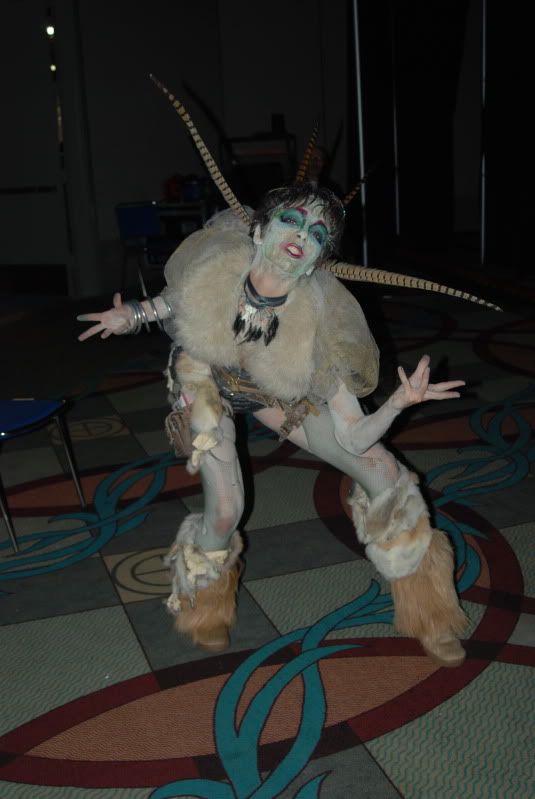
Please come back tomorrow as we close out a relatively relaxed last day with two amazing final panels (the inimitable Dr. Who and Supernatural) and our first visit to Hell on Earththe always packed convention floor. Good night!
~*ScriptPhD*~
]]>
Greetings! Day 2 of Comic-Con was a very scaryspecial occasion: Official Star Wars Day. Yes, the personal hygiene was questionable and the light sabers were many, but the ScriptPhD soldiered on to bring you our coverage of as much science entertainment content as you can pack in one website. Today we start by putting the science in science fiction with the special 10th Anniversary Farscape reunion panel, including information about their new DVD box set release and upcoming projects. ABC’s electrifying new science-fiction serial thriller FlashForward provided a world premiere sneak peek of the first 15 minutes of the pilot and a special guest surprised the audience. Our press room coverage from Day 2 includes some phabulous physics with CBS’s Emmy-nominated Big Bang Theory, including a one-on-one interview with Emmy nominee Jim Parsons, who talked to ScriptPhD.com about his journey into science and preparation to play a science geek, and Bones, including interviews with star Emily Deschanel and showrunner Hart Hanson. We also have our daily Comic-Con Costume of the Day and the Light Saber Count Tally. Stay along for the ride with ScriptPhD.com. Click “continue reading” for more!
Farscape: 10th Anniversary Panel
Moderator: Keith R.A. DeCandidio (author of official Farscape Comic)
Panelists: Brian Henson (executive producer/director), Rockne O’Bannon (creator/writer), Ben Browder (John Crichton), and Claudia Black (Aeryn Sun)

Farscape: 10th Anniversary Panel
Moderator: Keith R.A. DeCandidio (author of official Farscape Comic)
Panelists: Brian Henson (executive producer/director), Rockne O’Bannon (creator/writer), Ben Browder (John Crichton), and Claudia Black (Aeryn Sun)
Brian Henson: Thanks for coming everyone. We are primarily here to announce our special 10th Anniversary DVDs being released thanks to the efforts of our new distribution partners. November 17th is the official release date, with lots of new material previously not available. We heard from fans that what is most missed is Farscape: Undressed, and we actually only aired it once. So it’s really nice to make it special and it will be a part of this box set.
Keith R.A. DeCandidio: In fact, you have 29 commentaries on specific episodes. So there’s lots of commentaries and documentaries, 90 minutes of deleted scenes. What about the webisodes though?
Brian Henson: The webisodes are really good creative work. Rockne has been working with Ricky Manning, and they’re going to be great but it’s a tough time to finace things. We’re working on raising money, but we are poised to go on with them as a project and Rockne has been working on the comic books in the meantime.
Rockne O’Bannon: I’ve been honing a suitable story that can be done on the web in 4-5 minute segments, and it’s been tough, because the original was ambitious even for television. We wrestle constantly with a story that we’re excited about.
Brian Henson: What we’re trying to do is approach webisode opportunities from a unique perspective, not necessarily a linear one, not interconnected, but where you get a piece of an important puzzle as you watch each one. That is the initial launch of the next big part of Farscape, and it’s very ambitious. It is the continuing story of Crichton and Aeryn and their son. And if you keep up with the comics, there are characters being introduced in those that will continue into the next chapter as well.
Rockne O’Bannon: First we started the webisodes [as follow-up material] and then the comics came along, and it’s the perfect interstitial material. Comics are definitely an important part of the equation.
Keith R.A. DeCandidio: We’ll start with some web questions first that were sent in. David Leslie asks Ben and Claudia, what was your first reaction to acting with creatures from the Henson creature shop?
Claudia Black: Well, to be honest, we didn’t know what we were getting into. The Henson involvement was exciting. I’ve always been a big fan of muppets, great production value, and I find them interesting.
Ben Browder: I didn’t know what they were going to do. My first audition was at Henson’s old offices, surrounded by Kermit. I just wanted to be with the frog. I didn’t realize it was going to be Rigel.
Brian Henson: Rock and I had been working on this together for four years before production actually started. And there was lots of work involved. The show is very innovative, a sci-fi tone with a new energy, lots naughtier, and pushes the limits beyond what people had previously done on television. When Ben and Claudia joined, we only had drawings of different episode ideas. In a lot of ways, it was psychotically ambitious to have new ideas for each episode [in terms of expense and sustainability]. Rigel and Pilot were the first two puppets built in London, the rest were built in Australia. I was personally always impressed with the Farscape cast. Because they must take it very seriously in order for the idea to work. The characters must be sincere and believe in the world, but with Farscape, because we have a lighter tone, very comedic, particularly with the creatures, you need to treat them with respect. And Ben and Claudia in particular, were taking them seriously and yet having fun with it at the same time!
Rockne O’Bannon: I remember in the early days, it took a few episodes to get comfortable, and once you could touch Rigel, it helped you make the whole thing that much more real.
Ben Browder: And the puppeteers themselves were okay with it. You didn’t WANT to touch Rigel, but you did want to hit him. I remember the first episode I hit him, Season 1, episode 6. And I asked the puppeteer for permission, which he gave, but we didn’t tell the director of the episode, so we filmed the scene and I nail Rigel in the back of the head, he goes down and before they called cut, we hear this “Oh my Goooooooood! Not the puppet!!!!!!” We realized that the puppet cost $1 million to make. I thought I was going to lose my job. You realize the appeal of the puppets pretty quickly when my children walked into the room with me, and engaged in a 30 minute conversation with the puppets. They never realized that Johnny was even there.
Claudia Black: And every year I made the bet that because [the Farscape plan] was so ambitious, we weren’t getting picked up, and every year I was wrong. They were able to create these really emotional scenes with rubber, to get these emotional reactions out of puppets.
Brian Henson: With rubber, leather and latex! No wonder we’re at Comic-Con!
Fan question: What’s your favorite line from anything in the show?
Rockne O’Bannon: Picking a single line is tough. But I am really proud of [the swear word] Frell. I was waiting in the airport at Salt Lake City on my way to Thanksgiving, and writing the scene for episode 9, and needed a curse word. So for me it was the invention of the word Frell.
Claudia Black: Same here! I thought it was a sticker. Every other episode we were like, “Can we use Frell? Can we invent more unique swear words?!”
Ben Browder: My favorite line. “CAN I GET A HELL YEAH?!”
Audience: Hell yeah!
Claudia Black: “Can you help me find a place to seize your soul?” They wanted me to test that character, and I did the line spontaneously when we taped, and watching the reaction on Ben’s face, it was the first time you’ve ever corpsed on set. It was so fantastic!
Brian Henson: For me, it’s like an ocean. How do you pick your favorite drop of water? There was so much Farscape! My favorite part was the romance between Crichton and Aeryn. That relationship and the performances that these guys did was what moved me the deepest. Which is weird because I’m the creature guy. And when Aeryn smacks Rigel’s head was such a surprising moment and always makes me laugh!
Claudia Black: I remember doing a lot of the B stories with Rigel early on and I remember telling Ben, “Hey! You’ve got to get your hands on Rigel, it makes a big difference.” I didn’t realize he was going to be real, and here he comes with an entourage of six people at any given time. So dealing with him and his entourage and pretending that they weren’t there was a challenge.
Brian Henson: What you don’t see is that when there’s a Rigel scene, underneath him is a group of three people, and a rolling chair. So to get to Rigel, you have to make a plan, otherwise you’ll step on people’s faces and fingers. But it is funny. If you were to just zoom out 10 millimiters [they would be there onscreen].
Keith R.A. DeCandidio: Online question from Jonathan Schwest from LA: What was your most formative experience on Farscape, that made you feel like THIS is the reason I took this job?
Claudia Black: Watching that video [retrospective at the beginning of the panel] was it. I cried. I can’t believe what we managed to achieve. I think you had to film it overseas, where the tax incentives were, which means working with Australian crews, which are cheaper. [laughter] But originally, the plan was to block shoot multiple episodes at a time.
Brian Henson: Yes, the original plan was to have an ensemble cast and make simultaneous episodes, but we realized the driving relationship was Chricton and Aeryn.
Claudia Black: I turned around and said to Ben one day, “This is a love story.”
Rockne O’Bannon: For me the feeling really hit home when we were doing the Peacekeeper Wars, the fnal mini-series, when we were doing the birth sequence in the water. I thought, wow, it’s a gunfight, all our characters are gonna die, Aeryn’s having a baby, and Chricton is going to be delivering it, and they’re gonna get married and it’s gonna be…. funny! That’s when I realized, “Wow look at what we’ve done. After four years, it was just the Farscape way. We’ve gotten to a place and a show where we’re really stretching the limits of what we can do.”
Claudia Black: I was grateful for that water birth scene a few years later, when I birthed my first baby, because I did have it in water, and it wasn’t nearly as painful as for Aeryn. I remember thinking, “Huh. I’m tougher than Aeryn.” [laughter]
Ben Browder: My formative moment? My paycheck! First paycheck, I looked at it, and thought, “Ohhhhh the rent! Baby’s gonna eat today!” Why did I take that job, I don’t know. No, all kidding aside, it was near the end of Season 1, it occurred in stages. The first time I worked with Rowan Woods, episode 9 season 1, was a turning point for the series and what we were capable of. And then the two-parter where we introduced Scorpius. All those developments through Season 1, we were able to fail gloriously and succeed in surprising ways. It didn’t happen in a flash, but if you look back at more than one clip, you get very overwhelmed. It’s ten years! It’s still beautiful and well-crafted today!
Rockne O’Bannon: What’s amazing is that the clip reel was of material we’d made only in the first season, and just looking at the scale of what we accomplished just in one season, tribute to all the artists, Aussies who embraced it and threw themselves at it. My formative moment was starting development with Brian in 1993, and looking at shopping it to a network and looking for a network deal. And we both looked at each other like, “How do we do this?” We had four scripts, but the pilot itself was overwhelming.
Brian Henson: Sci-Fi (now SyFy) was terrific. It was their first show that they picked up as an original series, and that was a big risk for them. I know people are upset with them for eventually canceling us, but it was a big deal to even run us for 4 seasons.
Fan question: Would you ever consider a sequel or a spin-off?
Brian Henson: We’ve thought about it, but we’re most excited about continuing the story as is. The Farscape universe is a very rich one, very well developed. We’re excited about launching the next chapter. We’ve discussed a lot of different options, but now we’re most excited about the next chapter. “Puppet Up” is this puppet show that’s rated X, that we do in secret at the Avalon Theatre in Hollywood, to train the puppeteers. We were thinking about a “Puppet Up” mix with Farscape!
Very special fan presentation: Hi, I’m Craig Glendave from the Guiness Book of World Records. This is a book full of psychotically ambitious people. I have one preview copy of our upcoming book for you and your certificate. This is for “Most Visual Effects in a TV Series”. You have seven days to do one episodes, with 40-50 visual effects per show. In one season, you gusy do a motion picture’s worth of effects. Welcome to the Guiness Book!

Keith R.A. DeCandidio: Another web question. If you had a chance to go back in time, what would you change and why?
Claudia Black: Personally, I’d redo the first six episodes, because it was like a teething or a birthing process for me, because everyone was helping me shape the character, and for me, the seminal moment was when I took ownership of the show and I felt like I owned Aeryn. Up until then, I didn’t have a comfort level with Aeryn. I hit my stride by episode seven.
Rockne Obannon: For me, it was in the pilot, seeing the first few shots, and in comes the footage of Ben and he’s wearing like a jet fighter helmet. And we are like, “OK that’s not an astronaut helmet” so we would like to put on something different on him, but it reminded us to write great dialogue for him because he might be hidden by the helmet.
Ben Browder: I wouldn’t change a thing. I’m not smart enough to know what thread to pull, because of what could unravel. Because all the things we did badly, we got better the second time. Like the terrible beards! That was my own beard, by the way, for you online haters saying that it was the worst fake beard you’d ever seen.
Keith R.A. DeCandidio: Any final comments?
Brian Henson: Thank you for coming. You, the fans, are the reason we continued, and kept us alive. We’re still dedicated to Farscape and keeping it going. You guys have been so supportive for really unusual shows, and that keeps television going!
Ben Browder: So we’re all going for drinks afterwards…. Brian is buying, tell your friends!
[ScriptPhD note: I have never watched Farscape. Yes, I am hanging my head in shame, and yes I realize it’s a staple of science fiction television. But though I covered this panel because their material is so appropriate to our site, I must say, the clips and the energy exuded by the panel, clearly conveying their chemistry and camaraderie, made me an instant fan. I plan on going through the box set immediately. Maybe this will help me get over losing Battlestar Galactica]
From one great moment of science fiction past, we moved to the science fiction future, with ABC’s exciting new fall series Flash Forward. Comic-Con featured the first public footage of the first two acts of the pilot and the introduction of a very special cast member.
Flash Forward
Panelists: Brannon Braga (24), Marc Guggenheim (Eli Stone), David Goyer (Batman Begins), Joseph Fiennes (Shakespeare in Love), John Cho (Star Trek), Courtney B. Vance (Law & Order) and Christine Woods (In Plain Sight).

The panel began with an introduction and world premiere of first two acts by executive producers and writers. As a note, ScriptPhD.com is going to be covering and reviewing the entire pilot as part of our fall television preview. Think of this as a tease! But in the meantime, we have a transcript of the panel discussion featuring cast and writers.
Marc Guggenheim: Well, the concept for our show is based on a book entitled Flashforward by Robert J. Sawyer, and I remember my wife came to me and said this would make a great movie, but we subsequently moved into a house, and buried in the boxes a long time after, I found a copy of the paperback and started exploring it again. Then I talked to my friend Brannon. The big thing in the book is that the conscious shift is 21 years in the future, but we chose six months as more interesting. By the end of Season 1 we will have caught up with all the flash forwards. And I know what you’re going to ask. Do we have a plan for after Season 1? We do.
Moderator: And the story is building up to a big date, April 29th.
Marc Guggenheim: Yes, and this event is so big that this will be split up into two days.
Brannon Braga: What you didn’t see yet, is that every man, woman and child has a vision of the futuer six months from now. That’s 6.8 billion potential stories that you can tell! Great syndication package! Because of that, we saw great potential for stories but also something that’s universal.
Courtney B. Vance: I’d like to go all over the world. [laughter]
Marc Guggenheim: That will look like a green screen to you, Courtney. In all reality, we will be going all over the world during the show. Every person is a potential character, and every type of story will be told in the series: funny, sad, romantic, tragic.
David S. Goyer: Every episode will have at least one flash forward that is procedural mingled with our ongoing characters’ flash forwards.
Moderator: There are lots of mysteries embedded going forward. Moving forward, what are the episodes driven by? What’s the right balance of drama and human?
Brannon Braga: Well, Joseph Fiennes’s character has seen some things in his future that drives the investigation [as to why the blackout happened]. That is the overarching story of the series. But we’re also interested in the human drama element. What imprisons people by their visions going forward?
David S. Goyer: If you want the muscular procedural, there is that aspect through Joseph’s character from all these clues he’s dug up six months from now. Every image has already been figured out and they appear briefly on that board that you see flashes of with pieces of the puzzle, if you want to pause your TiVos. Part of it is that we started writing the first half of this, and then second half after WGA strike had eded fourteen months later. So that pause in between gave us time for lots of planning. But there is also tons of human drama involved in the show. If you knew everythng about your life would be different six months from now, would you do everything differently?
Marc Guggenheim: It’s another opportunity to elicit character, which is our mantra in the writers’ room. Even the guns and pyrotechnics are ultimately tied into character drama. Our show’s tone is as wide as its scope.
Moderator: You talked about LOST and it being a big inspiration for you. How did that play a role?
David S. Goyer: Nothing will be the new LOST, but our show ended up at ABC. We wrote a spec script and there were multiple bidders and I was friends with Damon [Lindeloff, writer on Lost], and the bottom line is that LOST was a genre-breaking show: daring, challenging. We figured that if ABC was that courageous with them, they’ll be courageous with us. And we pitched them a fairly excessive plan. We know the shot Season 1 ends on, we know how the season and series ends and they said, “Holy shit!” Literally, that’s what they said. The basic plan is that in order to tell the story we need as little as three seasons, and it could go out to…
Courtney B. Vance: Raw hide… 21 seasons!
David S. Goyer: We had a big plan and we didn’t know if it would work out.
Moderator: This is your first time on TV Joseph. Why did you want to do this?
Joseph Fiennes: I actually came to LA for a meetig on another project, and on the way to the airport I got a phone call and a script [for Flash Forward]. I knew of David’s work, but read the script and thought I had to do it. It was a combination of brilliance and smooth talking that landed me here. It’s been an extraordinary change of events going to TV, but I must say through the scripts and the process behind the series, I think that it’s so much more exciting in many areas than film. Film can be generic and structured, three act arc. You sort of predict what you’re going to get. Here there’s a different shape that is possibly like Raw Hide, going on forever.
David S. Goyer: There’s a cute story from the pilot of Joseph taking out this gun. And we showed him how to shoot a gun, since when we see him in the movies, he is usually on a horse in pantaloons. In the middle of it he did this ridiculous James Bond action role, and he threw that in because he was so excited.
Moderator: John, how’s your summer been?
[audience cheers]
John Cho: Summer’s been good. Had a film called Star Trek, and it feels so good. We went all over the world, it was a real privilege to travel with all those people. I didn’t get to meet everyone while we were filming, so it was a good chance for everyone to get to know each other
Moderator: How challenging is it to bring this to life? When all you have is a flash of the characters’ future and the writers give you little to work with.
Courtney B. Vance: I find it liberating to be in a series that is flashing 21 years in the future, I get residual checks for 21 years. I get the chance to work with these guys as youths and we will grow old together. I look forward to seeing my children go to college. In all seriousness, it’s a great group of people. I have been trying to hook up with another series for a while since Law and Order, so I was exhausted from that trek. My manager told me to go in on Saturday to see the writers of this new show. So I went in and met with them, and it was a life-changing meeting. I’m pleased and proud to be a part of this 21 year saga.
Christine Woods: This is my first series so that’s exciting. But it’s fun to go to work and have it be reactionary. You don’t know what’s going to happen, and sometimes they give you clues, but I think it’s cool to not know what’s next with less to think about.
David S. Goyer: I have a funny story about Christine. She has these three tattoos on her arm, and she auditioned and we loved her but couldn’t ever remember her name. So when we went to cast, I was like, “I want three circles. Where is three circles?” She became Three Circles for a month.
Christine Woods: I actully got more work after the tattoos because people remembered me.
Moderator: Lightning round. David, next Batman fim.
David S. Goyer: We’re still trying to think of the lamest Batman character. We’re BatMusing.
Marc Guggenheim: Green Lantern is happening, we’re filming in Australia. So look for it in January.
Brannon Braga: Loved the new Star Trek movie. And yes, I think we’ll absolutely see another reincarnation of Star Trek on TV again.
Marc Guggenheim: What you guys don’t know is that after Kal Penn joined the White House, John had a choice between doing this show and joining a non-profit for Sarah Palin.
John Cho: Yes, we would have been providing guns for every underprivileged child. [laughter]
Fan question: Some characters don’t have a flash forward.
David S. Goyer: We will be bringing that into the storyline.
Fan question: David, you work a lot in features, are you going to stay invovled with this show?
David S. Goyer: I co-wrote episodes 2 and 3. You know, in the past, I’ve flirted a lot noncommitally with TV, but I love this project so much that I signed a contract for the first season no matter what.
Fan: Has Robert J. Sawyer been involved?
David S. Goyer: He saw the pilot, he loved it, and he’s our science advisor on the show.
Brannon Braga: we planned the show with him before we even started writing, because certain things are different from the novel. But if you see his blog, he’s totally cool with it. We’re starting a new fan resource for the show: www.redpandaresources.com
Fan question: What caused the global blackout?
Marc Guggenheim: Rush Limbaugh farted. It’s a big ass, think about it. We know, we know, we knew before we started the show, but we’re not gonna say.
David S. Goyer: A master plan is important if you’re going to do a heavily serialized show that catches up to a certain date. The audience smells a rat if they think you’re making it up as you go along. We were able to get ABC to hire our writing staff well before we shot [to begin planning everything out], but if you are going to be true to the fans, you have to know where you’re going. Thus, we are able to lay in a lot of easter eggs, and aha moments that connect to seasons later on, well beyond even Season 1.
Fan: You imply that even though people know what their future is, they can’t change it because you’ve planned it out.
David S. Goyer: Part of the fun of the show is subverting expectations. A lot of people think we’re treading water until April 29th, but there’s a lot of game changers that happen early on. So… just watch the show.
After showing some rather funny clips of Sonya Walder (Penny Widmore of LOST) in her Comic-Con costume had she been here, the producers introduced the worst-kept secret in Hollywood… Flash Forward cast member Dominic Monaghan, whose mysterious appearance seemed to be as brief and mysterious as his character. [He did get a standing ovation from the audience, though.]

Dominic Monaghan: My character’s name is Simon and that’s all I know. I don’t know
if I’ll be on LOST again. I’m not really sure if anyone ever dies on that show.
David S. Goyer: We’d planned Dom’s involvement even before we started the pilot and he’s a game changer character that fucks things up a lot.
Fan qestion: Christine, what does your tattoo mean?
Christine Woods: It’s nothing too secret. Just a combination of femininity, presence, it’s my own little power symbol.
ScriptPhD note: ScriptPhD.com spent time in the press room with the cast and production talent of Big Bang Theory and Bones and we were thrilled to be able to ask the actors and writers about the science in both shows.
From the Press Room: The Big Bang Theory





Kaley Cuoco (Penny)
Press question: Did you have to talk to anyone about researching to play the role of Penny for background iformation?
Kaley Cuoco: Originally I was a little nervous that it was going to be blonde next door to two goofballs, which we’ve seen before. But if you’ve seen the show, it’s so not like that at all. Penny, like myself, likes these guys very much and actually wants to be friends with them more than they want to be friends with her. I think they were the mean ones at first. They wanted nothing to do with her. She just annoyed them. So I just love these guys in life and it shows on the show. We love each other.
Futon Critic: Do you feel like you’ve picked up any geekier habits from watching the show and learning about things you’ve never thought about before?
KC: No I refuse to pick up on any of those things. I still want to live my life, OK? I don’t live in the Big Bang Theory, I don’t know anything about physics, and I’m never going to learn anything about physics.
ScriptPhD: I overheard you talking about nerds during your video interview. Do they come up to you on the street and appreciate you and vice versa. What’s your interaction like with them?
KC: I don’t know if they’ve always been geeks and I don’t look at it like that, people seem every age, every looking person, every style of person seems to come out to me. They love the show. They’re just genuine about the show. I really feel like people love the show, love it, love it, or have never seen it. So the fans that come up know everything about it, they want to know more about Penny, they kind of think Penny is real. They’re like, “So what would Penny do tomorrow?” and I’m like, “I don’t know, I don’t have a script in front of me!” They kind of really believe and I don’t really want to take that away from them, but at the same time it’s sweet.
ScriptPhD: How did you get the role? Just curious.
KC: Because I’m awesome! Actually, I auditioned two years ago, didn’t get it. Auditioned again, went to network, didn’t get it. Chuck [the showrunner] told me I was not the girl for the show. And then a year later he rewrote the whole thing and called me and said, “I’m sorry will you come back?” And I was like, “No, I’m busy now.” He sent me the script, and he did rewrite the whole thing and I came in two days later and got the job. It was all an incredible timing thing for me. It wasn’t meant to be a couple of years ago, I don’t think it would have worked the way it works now.
Press question: Do you prefer the comedy to drama?
KC: Yes! I can’t be serious for two seconds. And I love the audience interaction, I love to laugh, I love to make people laugh, I love to be contorted and do silly things. My favorite episode for me personally was when I got to look like a disaster! It’s just been great. They’ve written some great stuff for me, I’m really happy.
Press question: When do you guys start shooting again?
KC: Two weeks from now. Not yet.
ScriptPhD: Are you excited for the Emmys?
KC: I am! I’m so excited for Jim, I’m thrilled for him.
ScriptPhD: Because it’s a lot of validation for the show in a way. Tell me about that. You’re veering into the mainstream, people are watching, you’re getting nominated for Emmys. What’s that been like for you guys?
KC: You know, it’s been a total steady climb. I mean we started out where reviews were bad, people thought the show was recycled, they’d seen it before, they’d done this, done that. They’ve really turned. They love it! And it’s so nice because we’ve worked really hard and our writing has gotten better and better and better. I think our second season was better than our first and that’s rare, so I’m hoping for a really great third season.
How do you feel that this casts light on nerds and your character likes. What type of world is this creating?
KC: It’s called television. Truthfully, I think it has opened the door for everybody. These are people that we don’t know. I mean, these brilliant, brilliant people are very few in the world, and I think it’s amazing that we’re casting a light on them. They’re not nerds. You’re only calling them nerds because they’re smarter than you and you’re jealous.
SPhD: Absolutely! The Fringe writers were just talking about that at their panel yesterday. That their responsibility is just to portray them living their everyday lives. And you do more for science by saying, “Hey these are regular dudes. They go home, they have love interests…”
KC: Yeah, they have a life and they’re briliant and way smarter than any of us.
SPhD: They’re not untouchable.
KC: That’s exactly right. Because I think they are almost more untouchable than the hot girl next door that they think they’re never going to speak to. They’re brilliant and have a lot to give to the world. Little socially awkward, but we can fix that!
Press question: Is there any level of improv to the show?
KC: You know, I have to be honest, the only reason that it seems like there is is because the writing is so good. When a show can seem like it’s just happening, it’s the writing. Everything is happening in the writers’ room. Oh the Emmy nominee over there! Emmy nominee at Table 2.
ScriptPhD: Let’s get some Cristal Champagne please!
KC: Ugh! Pop the champagne. His head is just huge!
SPhD: And if he wins, girlfriend, you’d better just watch out.
KC: I don’t even want to be on the show. [laughter] It really happened overnight. He doesn’t even call me by name anymore.
SPhD: How’s your camaraderie on the set?
KC: Horrible, I hate all of them. [laughter] Now that Jim has this Emmy nomination. He asked for a room outside of the stage so he doesn’t have to talk to these kiddie actors.
SPhD: With green M&M’s
KC: Yes! He doesn’t want to interact with us minions. [laughter] But truthfully, what is sad, is if you look at my iPhone, my Top 5 are the entire cast and that kind of says it all. I don’t talk to anyone else, I don’t know anybody else, I don’t have a life. I just speak to Jim and Simon and Johnny. It’s insane. Oh and Kunal. Sometimes.
SPhD: Or as my one friend in DC calls him, The Hot Indian Guy.
KC: Please don’t tell him that. Because I can’t handle two of them! I won’t deal with the big heads. I mean this Emmy nomination has taken over everything.
SPhD: It was really sweet of CBS to stick with you guys.
KC: Oh my god! You know we did eight episodes Season 1 before the writers’ strike. Eight. And I don’t know how we got back. It was incredible. It says a lot about people watching it, and CBS of course. We’re very lucky.
SPhD: Have you learned some science on the show? Any science?
KC: No. No. People hope I’m going to say yes, but I never do. I’m not going to lie, because then you’re going to say “What did you learn?” and I have nothing to say to you. I’m an actor! What do I care? I don’t need to study the physics. It’s all fake.
Press question: Do you play any games on set?
KC: We do play would you rather? Oh you wouldn’t love it on our set! We ask some narly questions. Would you rather, 20 questions, Jim is always Spock. And now he’s going to be “Who am I: Emmy nominee.” Stop me anytime.
Jim Parsons (Sheldon Cooper)
Press question: Can you talk about the Emmy nomination and what that means for you?
Jim Parsons: It’s not personally important. I will not deny that it is extremely flattering and extremely sweet. That’s the one ting I keep thinking about. It’s like people had to mark my name on the ballot. And that’s where it becomes unfathomable. It’s like somebody sat there at home and said, “I’ll mark Jim Parsons” and that’s like I can’t imagine that happening in a weird way. I don’t mean that self-deprecatingly either, it’s just one of those things that is hard to imagine. It’s only important though in what it aids to keeping the show on the air. Last year, after the first season, we had to pick episodes to submit. It was different this year, but anyway. We were submitting episodes and I asked Chuck Lorre if he had any suggestions and he did and he talked to me, but he said, “Remember throughout this process, there are a lot of people with statues at home who don’t have jobs.” And it’s such a valid point. So that’s what I mean. It’s only important if it brings more viewers to the show. That being said, would I throw an Emmy back in somebody’s face? No, I will run home with it, I will put it on the mantel, whatever it takes. I’ll stab your eyes out with her sharp little wings. Whatever you want.
Press Question: Jim, our website covers science in entertainment so I wanted to ask you a bit about the character you portray. Take me back to when you first got the role and you were like, “OK I’m gonna play this totally geeky physics guy.” First of all, how did you prepare, and secondly, what has been the evolution of this character in terms of what you bring from your craft to really give him a voice and the journey you’ve traveled?
JP: I hear you. When I heard we were picked up, I started watching anything I could. I always had a subscription to the New York Times, I admit I haven’t always paid attention to the Science Times on Tuesdays. I immediately started doing that. I bought a book—it’s called “Physics 101”. This is something the Smithsonian Puts out. I thought, “Well, that sounds smart to get. Why not?” I began watching NOVA. “Tune in to the NOVA! Why not?!” It does not take long, and I’ve said this before but I mean it sincerely, it does not take much research into science of any sort to realize what a specialized brain it takes to really wrap around that. And it did lead me to some dead ends as well. I didn’t get very far into the “Physics 101” book. We talked about Newton, and even there, just—gone! But what it did do for me, and Chuck and Bill talked about this from Day 1, they may be nerds, they may be geeks, but that’s not what we’re talking about necessarily. The biggest thing we’re talking about is that they’re geniuses. So that’s preparatory work. As we’ve gone along, it’s really hard to determine where changes have come into play and who brought what. What came first—the chicken or the egg? I don’t know half the time, you know? I don’t ever literally suggest something: “It might be good if Sheldon did….” But I haven’t done that. And I don’t know what they’ve taken from me, just observing me. Sheldon’s from Texas. I’m sure that came from the fact that I can have a bit of a Southern drawl at times. Especially in rehearsal. But their writing is so fleshed out and there’s so much in there that the only thing that I brought is to tell that story. So whatever I have to do to tell that story—use those words to tell that story, that’s all I feel like I do every week. And with their scripts, it’s been enough to keep that going.
From the Press Room: Bones

Press question: Can you talk about your reaction to the fans’ reaction to the finale?
Hart Hanson: Well the first response, I guess, came on the internet. I always get in trouble when I talk about this stuff. Because the second response were the ratings. They were very good and went up on the half hour. So that’s the real response. And then I do check in to see what fans think. I would say the first blizzard of response was negative, and then there was a lashback of positive response and then I left and let them argue throughout.
Emily Deschanel: Honestly, I just hear about these things so I don’t—I hear from Hart about the reaction. And I think it was somewhat anticipated on a certain level. I mean, I don’t know the exact percentages of how many people hated it, how many people loved it, but we knew that some people would be upset. It was a very different episode. And we were also talking about them getting together and it wasn’t in the real world. But at the same time, our hands are tied. If we get them together in the real world, it’s a tricky thing. They’re not really ready. But we want to give the audience something. You want to see the characters together as a couple and this gives the people an idea of how it would be, even though it’s not really them and it’s in a different world, but it’s from one of their brains or both of their brains, so it’s something. It’s giving a taste.
Hart Hanson: Yeah, here’s a taste of what it would look like for these two to be together. It looked kind of nice! I was thinking, this is a good spin-off. This nice world, it would be nice.
ED: My Grandma was upset. She was like, “I didn’t know they were changing the show and now you own a performance place.” She was confused by the end scene, it was another world, and that we don’t own a performance place.
HH: We are always delighted that there’s a response. Any response is better than no response.
ED: And the strength of the response rather than the direction of it, positive or negative, which is important. They’re obviously passionate about it either way, and that’s what really matters.
HH: It’s great that you guys built an audience that cares so deeply about what happens.
Press question: How much was it a placebo effect that you guys were trying to put in? You’re like OK, you’ve wanted this, you’ve been talking about this for so long, here you can have it, now we can move on.
HH: A bit. I think the first idea was to really make something for our stone fans, who love the show and have been with it a lot. I’ve been told by research that we have an extremely faithful audience. They follow us all over the place. And a good internet presence. All those things that indicate that there’s a strong, opinionated audience. And so my initial idea was to say thank you to them. Here’s something for you: it was full of inside jokes, full of inside references, full of echoes, and insights I hope. And we’re going to carry some of the things that we learned in that alternate world into the real world. It was kind of a bridge thing. So I would say, part of it was a, “Let’s see what it would be like to have Brennan and Booth be in love, be a really strong couple.” One of the debates was whether we had their marriage in trouble in the alternate reality, and we thought that was a bad idea. Let’s see what they look like as a solid, married couple, what everyone wants them to be. And this is what it would look like. So just a glimpse of that.
ED: And you get to see all the other characters that we love or that I love, I don’t know how you guys feel. But some of the squints, the grad students and different characters that come in and out of the show. You seen them in a different light and come in in a different way. And that’s kind of fun for the audience. So there’s so many things going on in the episode besides just us getting together. But that seems to be the thing that people are really opinionated about.
Press question: are you surprised that that would be the thing that bothers people?
ED: I shouldn’t be surprised at all. But you know, people say they want us to get together, but then at the panel today, it almost seemed like more people wanted us not to get together. Maybe people enjoy being angry that we’re not together. I feel like they want them to get together, but they don’t want us to give it to them.
HH: Emily said a brilliant thing. Will Keck, who was our moderator at the panel, asked the audience to clap if they wanted them to get together, and clap if they didn’t. It sounded like the latter group was a little bit louder. It was pretty close. And Emily said, “I think some people voted twice.” And I thought that that made total sense. We’re all like that.
ED: You can be conflicted about it and I think everyone is. This was a way of doing something without it being final. And that’s the kind of dance that we have to do every year.
Press question: So have you made up your mind about where it’s going to go or are you still confused about it?
HH: I do know, I’m not going to tell you. I do know if and when it happens, where it might happen in the season. But, I’ve said this many times, I’m not weaseling. A series is a very organic thing, and I’ve found with Bones, you kind of let the series point in the right direction. We have a very good company of actors, writers, producers, directors and it has its own force to it. And for me to just say, OK, here’s what we’re going to do, is not a good idea. But I know. Can I say it’s penciled in?
ED: He’s very good at adapting. I’m not so good at adapting, but he can do it. There will be different elements that we have to change for an episode, maybe an actor isn’t available or a location, or something has to change. He just writes it and changes it, and just goes with the flow. I’m just so impressed with it. He’s able to just go with it—there’s no grumbling, he just does it.
Press question: Is there anything that surprises you guys when you’re writing or creating the show?
ED: That’s a good question. I’ve been surprised several times. I always get excited by reading the episodes. I like to read the next episode as soon as I can. I get so excited to see what’s going to happen, because I feel I’m on a show where I’m always surprised by what’s going to happen and how my character behaves or reacts. And yet, it always makes sense for the character. I remember being surprised in the circus episode last year by how Brennan gets all carried away by the performance and gets excited to do the performance. I just loved that element, but I’d never predict that for her, to love performing for everyone and the attention from the crowd. Brennan is not someone who gets carried away often, and so to experience that, that was a wonderful surprise for me, and I loved playing that.
HH: Well, that’s a good example of, I was in the editing room, and it was supposed to be Brennan and Booth are joining the circus to come in and wave to the crowd and Emily made me laugh so hard I farted. [laughter] Somehow you had decided that when she was doing her grand gestures to the audience and telling Booth that he should work harder to make the audience like him, she was a little bit clumsy. A little stumble in there, and the actors surprise me constantly. Constantly.
ScriptPhD: This is for both of you, actually. Can you talk about Kathy Reichs’s role in shaping the writing and the science content with her background? And Emily, how much she’s helped you shape the character of Temperance?
HH: Kathy reads every script. She is a very busy novelist and an actual forensic anthropologist. So we don’t always get notes from her, but well over half the scripts, I’ll get notes from her or talk to her on the phone. It’s important to her, and I think it’s crucial to our series, that the science be—I don’t want to say a percentage—but way more accurate than not accurate. Kathy was very concerned, not to besmirch any other forensics show, but that we be more accurate than the other forensic show.
ED: Not to be named.
Press: Just give us their initials. [laughter]
HH: Kesee. Kesee. And, we might have cheated more if we didn’t have Kathy looking over our shoulders. So she keeps us honest in that way. And she is a character, kind of a force. I enjoy talking to her. I don’t know how much you [Emily] have spoken to her since the last couple of seasons.
ED: Well, most of the time I’ve spent with her was in the beginning, because she was there for the pilot, and I got to pick her brain and talk to her about herself and her life and forensic anthropology and different things. And that’s where I got most of it. I think it’s confusing for most people because my character was named after the character in the books, but really we have the rights to her and her life. So my character is supposed to be her, but very loosely based, because my character also writes novels, and is a forensic anthropologist. But from the beginning, we’ve said, this character is loosely based on Kathy, but it’s not exactly Kathy. It’s something we’ve all created. Kathy and Hart and me and all of us working together. But we have a forensic consultant on the show, always there, and being scientifically accurate is very important to us. Sometimes, we make things look fancier than they are, sometimes we compress time, we try to keep everything else as accurate as possible. But that’s basically how much she’s involved right now. It’s hard, because sometimes she’s in Montreal, working as a forensic anthropologist, sometimes North Carolina, and she writes a book a year.
HH: We’re trying to get her to write a script and she always comes up with ideas like, “I think we should go to the pyramids.” It’s like, Kathy. Or she’d be like, “I want to write the cross over with House.” That’s her latest one. It’s like, “Oh Kathy, that’s not going to happen this year.” Because she writes novels she can do whatever she wants, and she doesn’t understand why we can’t go to the moon.
Press: Emily, where do you want the show to go [on location]?
ED: Ahhh, there’s so many places, we’ve talked about a lot of different places.
HH: We came very close this year. The finalists were Monte Carlo, Spain, Madrid and Buenos Aires. We came very close to going to those places.
ED: I’m not complaining about any of those places.
HH: Now, the economy has changed. There’s no money.
ED: We’ve never been to DC! That’s what is amazing to me. They’ve sent other people to do the externals, and second unit photography for the backgrounds and stuff. And there’s even been a double of me walking in DC. I remember a family friend who lives there called me and said, “You’ve come to DC and you didn’t come visit!” And I’m like “I haven’t been to DC since I was a really small child.” And I’ve actually been meaning to go and check out the Smithsonian, but my time off has just been crazy! Anyway, we made it to London, and that’s exciting for me.
Our Day 2 Comic-Con Costume of the Day was a no-brainer, hands down. The instant winner:

However, if you disagree, you can find all of the costumes we chose from, and complete Day 2 picture roundup, on Facebook page. And last, but not least, we were counting light sabers all day from dedicated Star Wars fans, and our final tally came out to: 75. A paltry sum against such dedicated masses with whom the Force was, this I know. But apparently this year, Comic-Con contained all of their Star Wars activities and celebrations to one room. Sadly, I wasn’t in the place to be…
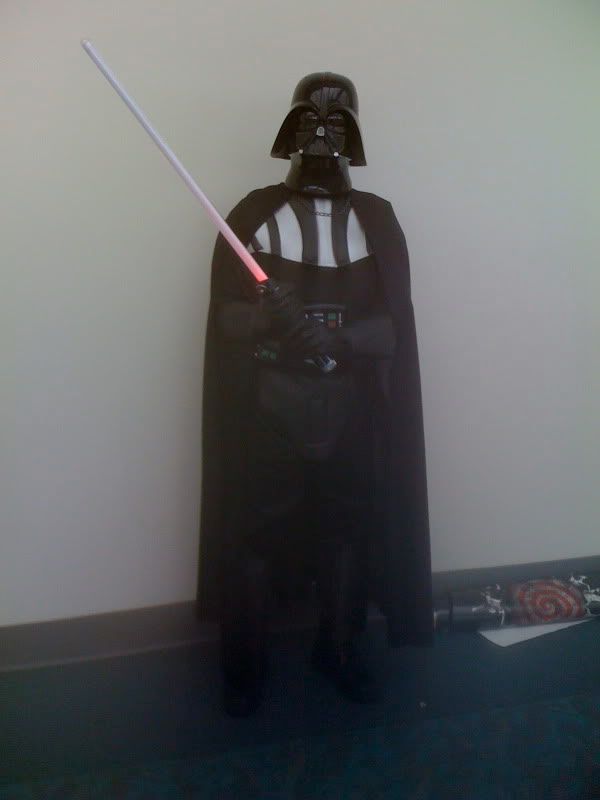
See you later tonight for Day 3 coverage of Comic-Con!
]]>
Greetings from sunny San Diego, California! The geekiest of the geeky have gathered at this oceanside oasis for a non-stop four day celebration of comics, television, film and gaming. As Comic-Con gets underway, we here at ScriptPhD.com hope that our comprehensive coverage gives you a slice of the action (especially pertaining to our forte, science and technology in entertainment) and that through our words and pictures, you feel as though you achieved Nerdvana right here with us. Today’s coverage kicks off with Warner’s highly anticipated motion comics panel, where they debuted world premieres of several motion comics and rounded up top talent in graphic novels to atlk about the direction of modern comics. From there, we will segue to some Battlestar Galactica nostalgia, courtesy of Richard Hatch’s popular yearly panel. This year was devoted solely to fan questions! Our press room coverage of popular shows Psych and Burn Notice will quell your burning curiosities about what’s in store for those shows, and we end the day with Discovery Magazine’s panel Mad Science: The Science of Science Fiction (co-sponsored with the Science and Entertainment Exchange), including writers from Fringe, Eureka and much, much more. We also have our first ScriptPhD.com Comic-Con Costume of the Day, a complete pictorial roundup on our Facebook page and insider interviews gallore from your favorite writers and actors! To read Day 1 coverage, please click “continue reading”.
Motion Comics: Graphic Novel Storytelling in the Digital Age
Moderator: Gregory Noveck (DC Comics)
Panelists: Paul Levits (DC Comics), Dave Gibbons (Watchmen, Batman: Black and White), Paul Dini (Batman: Black and White, Mad Love), Lydia Antonini (Warner Premiere), Dylan Coburn (Karactaz, Superman: Red Son), Stephen Fedasz (Perpetual Notions), and Jake Hughes (director, Watchmen Motion Comic)

ScriptPhD.com starts the day by not forgetting the comic in Comic-Con. This is, after all, the event’s 40th Anniversary, which includes a plethora of tributes to and celebrations of the Golden Age of Comics. Our first panel includes several modern-day kings of the graphic novel, who gathered to talk about the art of graphic novel storytelling in the digital age and how the tradition is adapting with the changing times. Motion comics, incidentally, are short-form videos that amalgamate subtle movements, voice-overs, sweeping music scores and stunning comic book artwork to bring an engaging visual experience to life.
Gregory Noveck: How does the new media translate to modern comic fans and new ways of accessing characters?
Paul Levitz: Well I consider it a step on a long journey. I recently went on a trip to MIT, to talk about transmedia, and the conference was full of scientific-type people and cultural analysts. And what they kept wanting to know was how does the media converge, please tell us? Ultimately it all rests in the art of storytelling with all-new strange tools opening up, and it’s a completely experimental process. The challenge is that those [comic artists] brought up traditionally in the craft are wedded to it. They love telling stories on paper, but find it tough to adapt to doing it in a new way with a new medium. Newer guys aren’t bound by what happened before. But we don’t get to the next step without experimenting. So a big thanks to the fans for being here and helping us shape the process to move it forward even a year from now. Motion comics and these new tools don’t replace comics but it’s a new thing!
Gregory Noveck: What entails the technical production process?
Lydia Antonini: You’re asking if DC was using the best writers/artists to make these books? Well we searched the world for the best young animation studios to enhance the original material, we wanted to approach it as new medium, artistically and technically. Most of it was fun conversations between Warner and DC about what art can pop off the screens, what stories are the most exciting and worth telling.
Clip of Watchmen: The Complete Motion Comic (12 original episodes available on iTunes)
Gregory Noveck: How did the Watchmen motion comic come about and what were the challenges?
Jake Hughes: Making Dave happy, that was the challenge! I had been doing cut scenes for video games, experimenting with cheaper ways to do cut scenes, and in the process did a comic version of video game. I thought let’s see if we can do this with existing comic, so experimentally, I did the first page of Watchmen (my favorite comic). I had to ask, how do you make that art look nice? I had to convert the sidewalk cracks in the opening panels, animated it, added music, and people loved the end result. So I contacted Lloyd Levin, producer of the live action movie, and they set up a screening of the DVD, they loved it!
Dave Gibbons: I was sent to London to see mysterious footage of the first episode, and I didn’t really know what to think about it. I was certainly flattered to see my pictures move. But does this really need to be done at all? So I showed it to my friends in animation, and they were forensic about analyzing it, but they loved it! As a storyteller, you want people to react that way (“tell me more!”). So the bottom line is that this motion comic is not aimed at dyed-in-the wool old comic book people, but the new generation, and in a new format. They were all totally committed, were going to give it their best shot, and I’m really, really happy with what they’ve come out with. This is for people who wanted Watchmen to be adapted exactly as the graphic novel came out, with 5:40 of total footage.
Jake Hughes: Sometimes, of course, we’d get it wrong and Dave would set us right.
Dave Gibbons: I’d like to point out that the motion comic also works really well on an iPhone because its screen has got the same size as the original panels so that works really well.
Fan question: What was the budget on the first project and do you expect it to be reduced?
Paul Levits: Depends on how many of you fans show up!
Lydia Antonini: Well it’s an evolving art form, so it’s a moving target for budgets, meaning I can’t give you a specific number. 5’40” of high-end work in 13 months is a huge amount of work in a short amount of time. At some point we will make a comic and a motion comic at the same time.
Paul Levits: That will be the turning point moment for all of this, evolutionarily. We don’t know yet what all the tools are to do it right and efficiently, but you’re on a journey to shape the art form.
Clip of Batman: Black and White, Collections 1 and 2
Paul Dini: When I first heard about motion comics, some of the old Marvel Comics instantly flashed in front of my head (as candidates), but when you do it like this, there’s so many stylistic changes you can do, and interpretations of Batman that you can do, you can really give it a different voice. It’s really cool.
Jake Hughes: I have a question for you. Was making the Batman motion comic a different process from Watchmen?
Lydia Antonini: Batman was done by a small studio named Sequence Studios in Vancouver, with Microsoft Shake program, and it was fun to experiment with the black and white panels of Batman. They don’t make this program anymore, but they did some beautiful art with black and white, to really bring the art out, make it pop out on the screen. All 20 episodes are beautiful, but they all have a different look.
Fan: When it came to voice casting for these motion comics, what decisions did you make about one narrator versus different characters?
Jake Hughes: That really changes from project to project….
Lydia Antonini: For Watchmen, Zac Snyder was heavily involved in the project. The formalness that is found in Watchmen helped us get the voice there to convey that, and thinking about how to have the panels look formal on the page, and conversely we cast based on that desire.
Dave Gibbons: What’s next, Watchmen: the theme park? The Rorschach rumle and ride! [laugter] The narrator Tom Stechschulte) brought tremendous talent into it and he was also very into it.
Paul Levits: How differently would you have written the dialogue if you’d known you were writing for the spoken voice?
Paul Dini: Sometimes I was thinking about writing animation, with minimal voice-overs and things like that. With Case Study, I wanted to write like you were reading an interview. If I’d known I was writing for motion comics, I certainly would have experimented more. With animation, it’s minimal, not a lot of talk. That’s the challenge in adapting a graphic novel for animation. At first, I was a little lost, how to introduce certain elements. I think they did a really nice job with it. It brings its own nice tone to it. I have a question. Is there discussion about original motion comics for promoting Warner Brothers releases? Jonah Hex?
Jake Hughes: That’s an awesome idea!
Fan: Were these created specifically for the iPhone?
Jake Hughes: Well, not in our case. Watchmen was shot for 1920 HD, everything was done for high-definition, and that took a lot of time to render for HD, but we downscaled, and it looked great for the small screen, but looks great for the big screen as well. It’s easier to get it small once you’ve shot for the big screen.
Fan: What kind of process is there for weeding out certain characters/stories in interpreting the comics for motion comics?
Dylan Coburn: It’s about being true to the book, first and foremost. As directors that’s what we’re ultimately trying to do. Then you get the voice down. And you do that with voice casting, the voice drives the whole thing, it’s all about the narrative.
Paul Levits: I’d like to also point out that the fans ultimately weed out what works and what doesn’t. The fandom knows what the cream of the crop is in the comics stories, or can at least unanimously pick the top 7 or 8 out of 10. That’s how you winnow down the stories that you want to tell, it’s what the fans want to see. You go to the great creative moments and you try to build from there. But over the years, we got a very good idea of what you guys think and we take it from there.
Fan: Did you think about not having voices at all? Voice talent makes it more animation as opposed to a comic book with animation.
Dave Gibbons: It’s either a reading or a viewing experience. This is a viewing experience. It’s also like reading a comic book the same way you read it in your own home. I was disturbed at how long it takes to read a page of a comic book—less than 10 seconds, which is sobering to me, who spends over 10 days making it. The addition of voice to the media puts it in the control of the artist. This also might evolve into being a spectrum of media.
Paul Levits: Once you have the written word, scaleability becomes a whole different problem, so that is definitely a big challenge to us. Along the way, there’s lots of interesting questions.
Stephen Fedasz: It’s also allowing us to experiment with different styles, allows us to get these stories and styles out to the masses who don’t typically read comics, so they can try something new.
World premiere clip of Batgirl: Year One
Stephen Fedasz: So in this motion cominc, I was trying to tell the same story, edit where you need to, try not to break the lines. It was challenging and exciting.
Fan: Can you discuss the decision to put up the dialogue balloons and have narrations for Watchmen?
Jake Hughes: On the demo, there was no voice over. But recording the voice changed the timing of things (some shots were longer, some shorter). The balloon informs the viewer of who’s doing the talking, because we’re not doing any mouth movements. It also conveyed that you’re looking at a comic book! Sometimes, you don’t need balloons if you have multiple voices, but because Watchmen can be confusing and you only have one voice, that of Rorscach, it helps to
Lydia Antonini: The other Motion Comics are all multiple-voicecast, so it is easier to figure out what’s going on. But with Watchmen, we had to promote this for our international divisions as well, so we had both versions, because if you’ve never read Watchmen, it’s VERY difficult to know what’s going on, because it is a very complicated story.
Fan: Where do you draw the line between motion comics and full animation?
Stephen Fedasz: It comes down to the placements. Sometimes you can give a scream instead of using a facial expression. It definitely depends on the medium.
Lydia Antonini: The Peanut comics are fully animated! If we’re using that strip and animating, then it’s a motion comic. We look at that as the foundation, and the house just needs to honor the suggested movement and the art. It’s very much based on the source material. So that’s why Peanuts is full action, full lypsinch. For many of them, they’re so well posed, that it already sets up the animation, and it’s just a matter of building on top of that.
World premiere clip of Superman: Red Sun
Dylan Coburn: I was so excited to direct and produce this. The challenge lies in the pace and the dialogue. It’s tough when you have a single panel where nothing is happening, but lots of dialogue. When you work in animation, you don’t often get to do stuff that’s hardcore, but this was great. And definitely hardcore.
Jake Hughes: Also edited very cinematically.
Dylan Coburn: I also used split-screen a lot in this motion comic, because it tells the story very well and tells the story in a way that makes more sense. A lot of comic book artists think cinematically, actually, like directors.
Jake Hughes: And as a reminder, DC Comics All Access opens today at DC Comics.com
Fan: When do you create the original artwork to have more layers and in digital to begin with to save time when adapting to motion comics? Does that happen yet?
Lydia Antonini: Everyone has come to us and begged to layer the artwork to save time on Photoshop for later adaptation, but that moment when the two are being planned for together, that’s for the future. That’s definitely the moment that we’re leading up to.
Paul Levits: And you’re thinking a different way as an artist, a different way of telling the story
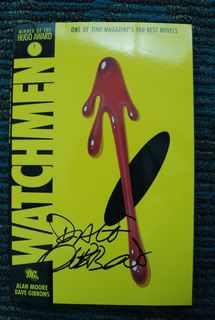
ScriptPhD.com was extremely fortunate to catch up with Mr. Gibbons to chat in brief about the Watchmen: the IMAX Experience movie and his thoughts on comics today.
ScriptPhD.com: Were you pleased with the Watchmen adaptation for the screen?
Dave Gibbons: Yes, in fact I know all those guys (director Zac Snyder, screenwriters Alex Tse and David Hayter) very well and I was out promoting the movie when it first came out.
SPhD: How do you feel about the state of graphic novels today compared to when Watchmen first came out over 20 years ago?
Dave Gibbons: Oh it’s fantastic! Watchmen was one of the first graphic novels that ever came out, so it was very much uncharted territory, whereas today you have a whole wealth of graphic novels employing advanced techniques and a whole breadth of material. I’m also very happy about the presence of graphic novels in mainstream bookstores today, which was just not the case when Watchmen first came out.
Thanks much to Dave for chatting with us (and for signing my copy of Watchmen)! Watchmen: The Director’s Cut came out on DVD July 21st.
Richard Hatch: Battlestar Retrospective
Moderator: Richard Hatch (Battlestar Galactica)
Panelists: Bear McCreary (BSG composer), Michael Taylor (Battlestar Galactica, Star Trek writer/producer), Kevin Grazier (Battlestar Galactica, Eureka, Virtuality science consultant), and special guests Lucianna Caro (Captain Louanne ‘Kat’ Katraine) and Tom DeSanto (producer, X-Men and Transformers)

Next, we moved on to a yearly fan favorite: Richard Hatch’s impromptu panel of Battlestar Galactica guests, ranging from actors, writers, and producers on the show. This year’s panel was treated as a retrospective on the collective four seasons of the show, from the musical (with composer Bear McCreary) to the scientific (with science advisor Kevin Grazier) to the written (with writers from the show). This year was also special because the panel graciously opened the floor to solely answering fans’ burning questions.
Fan: Was the story planned from beginning?
Michael Tayler: Yes, absolutely. It wasn’t seat of the pants writing, but rather organic, and we knew where we were going 10 episodes out. Ronald D. Moore had it planned out 4-5 seasons down the road. But we also didn’t kill ourselves to figure out every detail, because then the characters couldn’t surprise you. New Caprica, for example, was such a surprise, a home away from home that didn’t turn out to be what it was.
Tom DeSanto: 9/11 occuring also caused a delay in shooting, and also changed the nature of the plot as it was originally imagined. A lot of ideas were fluid from the old show and the new show. And of course, the big reveal at the end was that the Cylons were being controlled by the human beings.
Fan: This question is for Bear. Are you planning to release more outtakes or extra music?
Bear McCreary: Well, I’ve released an album for every season. Season 4 was released at Comic-Con today, but the best place to grab is at the House of Blues concerts this week. Fans astonish me with how much music they want, and they still demand more. A soundrack for Razor is in the plans, but if people still want more, then we could certainly put together a box set of cues that weren’t good enough to go on the original CDs. You never know. And there will definitely be lots more concerts to come. It’s bombastic and incredible. I’m actually hoping to put out a live DVD in the coming week of these concerts. My ultimate dream is to play “The Shape of Things to Come” at the opera house in Vancouver where we filmed.
Fan: Richard, you’ve been a big part of the whole BSG world. Did you have a say in how your character ended in the show?
Richard Hatch: I’m still hanging out on the tail fin, figuring out if I’m a cylon, I don’t know about you. No. Michael and Ron, they make the decisions, they decide the creative direction. I would have loved to have had creative input, but that just wasn’t how it worked.
Michael Tayler: We couldn’t wait to kill you dude! We were competing!
Lucianna Caro: And I cried and begged [for my character not to get killed off].
Fan: Hi from Vancouver! Thank you for having strong female characters. Are you guys planning to keep that up on future projects?
Michael Tayler: Well, Caprica should be a hint. One thing we’re trying to make clear is that while there’s elements of racism on Caprica, for some reason there’s a lot of gender equality. I don’t think of it as good female characters, just good characters.
Fan: I’ve heard the series borrowed a lot from Mormon theologies? Is this true?
RH: Yes, there was a lot from the Mormon philosophy. Glen Larson (creator and producer of the original series) is Mormon and he weaved that into certain elements of the show.
Tom DeSanto: The name Kobol is from the Mormon religion. But he also borrowed a lot from other theologies and philosophies, for example with people coming down from space and helping us to discover ourselves.
Fan: Are you going to elaborate on Daniel (the boxed cylon)?
Michael Tayler: I can dispell some rumors right now. He is NOT Starbuck’s father. We never anticipated that much interest in that character.
Fan: Who came up with frak?
Richard Hatch: By the way, that did come from the original show, but they changed the spelling for the new one.
Fan: I loved the integration of All Along the Watchtower into the series. That was brilliant! Where was that specific song picked, and are there implications of how that song connects to now?
Bear McCreary: It came straight from Ron.
Michael Tayler: The implication is that it came from Dylan, Ron’s god. The Word of Bob.
Kevin Grazier: Ron had wanted to use it earlier than it did, but it came back later.
Bear McCreary: We always interpreted that the song was out there in the cosmos. Never implied that Dylan wrote it, more handed down from the cosmos. It was implied that Anders used to play this down on the original earth on his guitar. So it was timeless, it didn’t have an era or a time. That’s how we interpreted it. The use of that song still ranks among the most daring and unusual decisions in the show. Ron put it on Kevin’s and my plate to figure out how to get the jump coordinates for the final jump from the song. But the song isn’t catchy. So there were these 12 notes of original music that were integrated into Watchtower. And that was introduced in Season 3, and we suggested that idea in the final episode, that Kara was exposed to it earlier.
Fan: Did you like how Zarek was portrayed in the new BSG?
Richard Hatch: I love this character, but the realities of a show like BSG, is that there are many talented characters and actors, and only 44 minutes of a show, so a lot of scenes got cut out, and a lot of dialogue got cut out. But we had 70something episodes to develop a lot of different characters. I would have loved to see more backstory for Tom, other than the 4 part mini-series where I discovered that hey, I was a good guy!
Kevin Grazier: Other than that whole killing the quarum moment.
Fan: Was race ever a consideration for casting/writing? Or was it the best actor?
Michael Tayler: I don’t think it was a concern, but we’re trying to paint a post-racial world with a lot of variety, just like our own world. Ultimately, we’re always looking for different types, we’re just looking for great acting as a bottom line.
Bear McCreary: I talked a lot with Rekha Sharma, and she loved that she got to play a role where being Indian didn’t matter. For her, that was a big deal and she appreciated it!
Kevin Grazier: I made the argument that given that we have 12 planets with 12 different environments, we could have even MORE diversity than what you saw.
Fan: Richard I loved your books, and the sequels to Battlestar. Are we ever going to see you and Dirk Benedict give a better send off to your BSG 1980 characters?
Tom DeSanto: Well, the show (DeSanto’s original Battlestar remake) we were doing was a bridge between the old world and the new. And the FOX execs (where it was orignially going to air) felt the 9/11 tone of the genocide touched too hard on a nerve, given what had happened. There was never that great war to define who we were, and then we were struck smack dab into that new war that we weren’t prepared for.
Bear McCreary: Where did the Pegasus set come from?
Tom DeSanto: My construction crew from X-Men had started building the BSG sets, so they took a chainsaw to all the vipers because they couldn’t keep all the sets around. But we had these master boat-builders and they took the pieces of foam and bent them around to make the Pegasus set.
Fan: what do you guys think Starbuck is?
Collective group: An angel. That’s just an opinion. There’s no master plan or bible that says that’s what is definitely written.
Fan: How do you guys think they adapted to being cavemen? What if they’d flashed forward only one year?
Michael Tayler: That is an interesting question. I have a feeling they brought certain skills to the table. Maybe there’s mysterious ruins waiting to be discovered and it wasn’t a TV show but a history!
Kevin Grazier: Humanity, 70,000 years after Mitochondrial Eve, was reduced to about 15,000 people, so the fact is, most of them probably died. But there was a great scene in the rolling hills where they blew up all the raptors and they disappeared. For the belly flop, or Adama maneuver, I was remiss to remind them that Galactica would break up, but owing to the coolness factor, go for it!
Fan: How gratifying was it to get to talk to the United Nations?
Michael Tayler: I wasn’t there, I just watched it on C-SPAN. But they replaced the actual countries with the 12 colonies. For me, it was a little scary, because we have real problems! And all the UN people wore their old Cylon costumes. It was scary and gratifying at the same time. And we’ve been invited to work with the UN in solving real world problems!
Fan: How did your music evolve from Season 1 (raw earthy quality) to the full orchestral sound in Season 4?
Bear McCreary: Well, the key is that the writing also changed. It became much more emotional, mystical, as Season 1 reached its end. The end of Season 1 is where we really begin to understand the show. Normally, music is there to remind you what you’re watching and it stays the same. But the producers challenged me to make it different, but to make sense, to always “sound” like Battlestar. From Italian Opera, to drummers, to bagpipes, to Anglo-Saxon signing, strings, and stuff that doesn’t naturally go together musically. Every episode was a chance to experiment and change, and eventually the orchestra became part of the sound. The end was as bombastic as anything you’d hear in a movie score. At the beginning that wouldn’t have worked, but it did at the end. It was a natural process.
Richard Hatch: As a conclusion to this panel, I want everyone to talk about what they’re doing and future projects.
Tom DeSanto: There’s many incarnations to Galactica. If you have stories to tell, and want to celebrate this universe, put them online! Universal is looking at doing a feature of Galactica, but the economics of doing a big film means that you need a wider audience beyond just the TV show, and hopefully someone will pay hommage to both versions of the show, and in the process pay hommage to Star Trek, and I’m going to try to do that, on the big screen.
Kevin Grazier: It was very fulfilling to work on BSG. At the screening of “Daybreak” (the finale), Ron said, “If this was your first job in the industry, sorry, because it doesn’t get any better than this.” I have a book coming out, “The Science of Battlestar Galactica” and it comes out in December, just in time for the holidays. To be honest with you, since I stopped working on the show, I’ve been suffering from withdrawals!
Bear McCreary: I was suffering from the same withdrawals, and that’s why the concerts and fan interactions tend to be really great. In many ways, the show isn’t over for me. I’m also working on Caprica with Michael, so that’s great!
Richard Hatch: BSG has been life-changing for me, always more than entertainment, but about something, about asking who we are, where we come from, where we’re going. I love things that challenge you to think, open your hearts and minds, and show you there’s a light at the end of the tunnel. We find a way to pull together and survive. I want to be a part of projects that do that in the future. Projects that leave me with hope! No matter how dark BSG got, it left you with hope. To that end, I’ve put together a production company. Our first movie is entitled Don’t Let the Sun Get You Crying. I’m also producing a reality show depicting the Hollywood underbelly you’ve never seen, with the journey you go on as an actor to get to the E! True Hollywood Story. Lastly, I just left a relationship of 2 years, I’ve struggled in finding a relationship, and in making it work. So SoulGeek.com partnered with me, for those of you looking for your Sig-O. It’s hard to find a sci-fi partner out there!
Michael Tayler: Well, I’m working on the BSG prequel Caprica and the pilot of that aired and is available on DVD. We should be set to air sometime in 2010.
ScriptPhD.com caught up with Kevin Grazier who we interviewed and the rest of the panel for some pictures exclusive for ScriptPhD.com, including a group shot right up on the stage! (Incidentally, yes those are BSG dog tags I’m wearing. My call sign? Hot Dog!) Check it out:


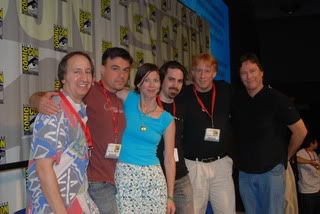
ScriptPhD note: ScriptPhD.com spent an hour in the press room with the cast and production talent of Psych and Burn Notice gathering exclusive behind the scenes scoop and spoilers.
Straight From the Press Room: Psych
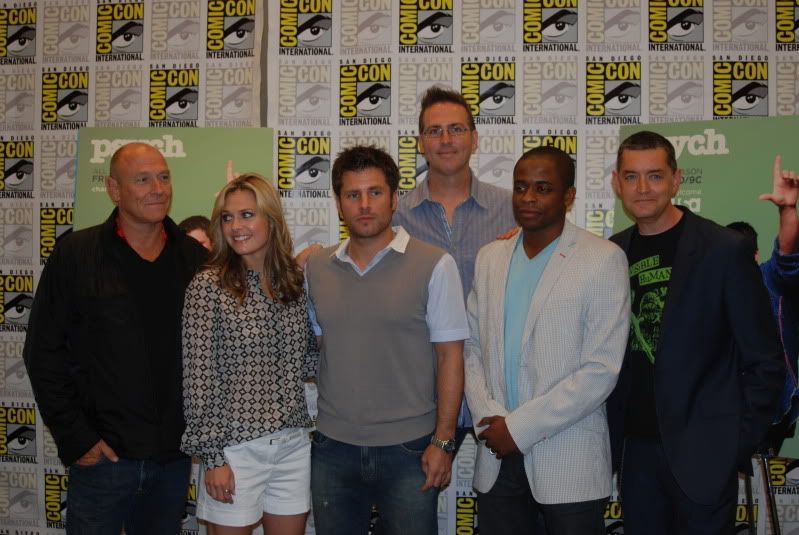
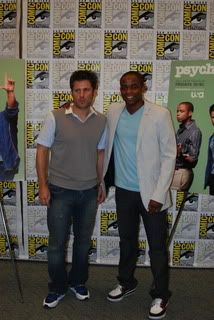
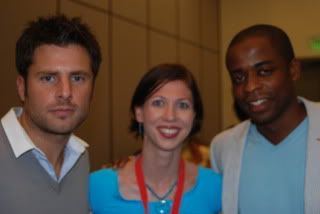
Corbin Bernsen (Henry Spencer)
Corbin Bernsen: [checking out The ScriptPhD’s iPhone] Ohh I just got one of those. Look at you!
ScriptPhD: Sweet, right?
ScriptPhD: All right well start with me? You obviously play James Roday’s character’s dad on the show. I’m a big fan of the show, by the way, love it. And it’s been really interesting to watch their relationship develop over the seasons. Because in Season 1, there was this very tense thing between them. They’ve grown closer. Can you talk a bit about the evolution of that relationship?
CB: You have to start out and show the tense relationship. The relationship is founded in this. I have a certain way of doing things, I wanted my son to be like me. And he has ended up being exactly like me, which is solving crime, but doing it his own way. And Henry Spencer is like, my feet are grounded in this cement, and I’m not budging. And what the evolution is, is not so much Sean having to realize that, gee, my dad isn’t such a bad guy, although there’s a bit of that, but rather Henry needing to loosen up. Henry’s got to recognize, as I’m doing with my own kids, I have a 20-year-old son, that you need to say, “All right, you don’t want to do it my way, as long as you get to the end of the game, and have values, we all have our different path.” We all have our different path. And that is what Henry is sort of doing, and it’s interesting, because he is sort of mirroring my life a lot.
Press question: Is Natalie coming back and what’s happening with that?
CB: I wish it was more of it, but I’ve always got to keep in mind that it’s not the Henry Spencer Show. It’s not about my stuff. It’s how it relates to Sean. I mean Cybil [Shepherd] and I had a great time, you know? But you have to find out where it fits into the show and how it relates to Sean. So, I couldn’t answer the question. I actually want my real wife to come back, who was in an episode that we went on a date with.
Press question: So is he going to be getting some then?
CB: Yeah, man! He’s 54, he’ll take all the girls he can get. Onscreen, whatever it is. It’s the only legal cheating you get.
Press question: James has written and directed a few episodes. Any similar aspirations to do that?
CB: No, I direct. I just finished a movie called Rust. I’ve done four movies, I write in the season, and I direct in the offseason. You know, yeah it would be fun, but I have a weird thing about TV, and directing TV and a showy you’re on. I’m not dying to do it. I don’t know where the win is. What if your show sucks and then you’re all, “Hiiiiii!” You know? I’d rather direct my little movies where I’m well-removed and I always said, when I direct, I want to do things on my terms. All the acting is kind of everybody else. Agents, networks, producers all of that. I make my movies and it’s, “Well, what do we think, Corbin?” And I wanted to reserve my directing for that.
Press question: You always have to play a younger version of yourself. How do you get into that mindset and pull that off week after week?
CB: I just try to make the younger me a little bit more amused with Sean. It’s probably very imperceptible, but I try to raise my voice a little bit. Because you put the wig on, and it’s hair but I still see lines. I try to make him talk a bit differently.
James Roday and Dule Hill (Sean Spencer and Burton “Gus” Guster)
Press question: Can you talk about your writing and directing and what motivated you to do it?
James Roday: Truthfully, it’s something that I’ve always been interested in doing, I just didn’t think the opportunities would fall into my lap the way that they have. Thanks to our super-generous and wonderful show creator and producers. It’s basically the warmest, safest environment to cut your teeth and flex new muscles and I feel like with each one I’m getting more confident, and what can you say? You work on a show where you get to write and direct and act. It’s a gift.
Press question: Do you hang out in the writers’ room
JR: I do. I got to spend more time than I’ve ever spent in the writers’ room. We finish shooting, and there’s still like a month left before they finish, and I just left and came down and spent that month with them and started breaking stories for this season with them, and so I got to have that experience as well.
Press question: Dule, are you jealous of James?
DH: Jealous of the writing? Noooooooo!
JR: I don’t think he’s jealous of not being in the writers’ room.
DH: It’s not something I’m passionate about, at all.
Press question: directing?
DH: Maybe one day, but I don’t really see myself directing an episode of this show. It would be something down the line. I always tell the crew, “If you ever see me directing, start for a new job.” Because I’d only direct when the show was cancelled.
Press question: Girlfriend for Gus? I mean Sean already has his love life.
DH: That’s the same question I keep getting today. I think something will happen this year. Something will come by at the end of the season. Hopefully, we’ll see. But when you have an energy with the tall guy over there—
Press question: Well, this guy is in the writers’ room!
JR: There’s something in the pipeline.
ScriptPhD: The energy between you translates really well onto the screen. Are you guys also good friends off-screen? Similar relationship?
DH: I think so. In real life, I would say, I wouldn’t say it’s opposite, but I’m not as straight and he’s not as crazy. But the friendship has definitely grown. A lot of what we do offscreen goes back onscreen. Just the dynamic and how we interact with each other and things like that.
ScriptPhD: And, James, how do you guys keep finding cool ways to hide the pineapple? I have to ask.
JR: Well, I have to say, we went almost a whole season without any cool ways to hide the pineapple. It was just sitting out on people’s desks. It’s like, “There’s a pineapple, right there.” We got a little lazy with it. But we did some recon in the off-season and you should be dully impressed with some of the hiding places this season. We put a lot of thought and care into it.
DH: I think He Dead was a good one. That was nice way they put that one in there.
JR: We just finished one called one called “Let’s Get Harriet” that’s got a good hiding place.
DH: I don’t even think I remember where it is.
JR: See? Is that good or what?
DH: Preeeeeeetty sneaky.
Press question: How did you develop your characters’ speaking styles? That reflects their personalities.
JR: My approach was just that here’s a guy who’s constantly flying by the seat of his pants. He’s an improviser by nature, and the influences were basically Chevy Chase’s inflection and Val Kilmer as Chris Knight in Real Genius. That’s it. Those are sort of the guys that I felt encompassed that the best. So I put them with a blender, along with a heavy dose of my own face and landed on that pretty early in terms of the weird little rat-a-tat delivery. I think with Gus, we’ve had more fun watching him evolve. The way he rolls with the punches, the way he’s learned to be spontaneous, sometimes he’s right there to add something to finish a run, sometimes he’s not.
DH: Because I don’t really—myself I never had any preconceived thought, it was more of an idea of who this person is, but as you keep doing it, you figure it out. Seeing how he reacts in a given situation.
Steve Franks (showrunner)
[preceded by major squealing and fangirling, inlcuding Steve Franks, over the fact that we were sitting next to the Futon Critic.]
Press question: The show has a very random and absurd sense of humor. How do you balance the tone and keep it from veering too far into the absurd?
Steve Franks: That’s the hardest thing. It’s like having a car, and the wheels are out of alignment, and it’s always trying to pull that—because what fuels us is the silliness. But we realize at the end of the day that if we are a detective show and we’re having a case, if you’re 30 minutes into the show and you’re like, “What’s this show? What’s this case about?” You’re probably either going to lose interest, so it’s walking a tightrope and we really wrote ourselves into a corner because we have so many things we have to do humor wise. We have to get these guys in a fun argument, we have to tie it to something that happened to him as a kid in the past, we have to relate it to what’s going on with the characters, and it’s a character piece, you know? It’s not like CSI, where every minute, they’re at a new location and they’re questioning, and it turns out to be the third person they questioned. So we always try to start with a cool case, and this show we started thinking about, instead of oh it’s the world of telenovellas, let’s think about what the guy did and then we’ll work backwards and try to put it into our fun world. So we’ve got some really cool cases this year.
Press question: Do you have to go as far as possible and as crazy as possible to get all the fun stuff that we do?
SF: Yeah, exactly, and I want our show, I drive our network insane, because I’m so adamant that our show be unique. We did an episode where a sea lion got hurt and they go to a funeral for a sea lion, and Sean—I directed that episode, so that’s my episode. I love it special. But for me that’s what we have to do. And it’s twice as hard. We could just do, OK, debutante gets shot, whatever.
ScriptPhD: Or the spelling bee episode. Loved it!
SF: The spelling bee episode, I wrote that. This is great! All my fans are here, I love this. It’s like I turn on the CSI and it’s like, “When a toddler is found dead…” and I’m like, “Oh my god! How are you sitting down going Ohhhh this is going to be great?” Can’t wait to see them catch the guy, you know? It’s got to be rewarding and fun and I really want it to be something new and different, and it’s like even when we do serious stuff, our two guys in serious stuff, when they’re in danger, is another fun, different thing. Like on Burn Notice, that’s what’s really cool about it, our guys are screaming and running and doing all that stuff. We started hearing that this is silly, and this is the serious. We did the serious in the first season, and I want to keep expanding, expanding, expanding. I think “American Duos” is the silliest we’ve gone, because it veered into satire, and we had John Landis directing and John has all these crazy ideas, and we’re like do it! But at the end of last season, we did “Mr. Yang”, which is as far serious as we go. And we don’t ever want to change the show, but at the core of the show it’s a guy who’s disappointed his father, who’s trained him to do this. And he’s always thought that his father was the one who abandoned him as a kid, but his father was the one who stuck around, so it’s kind of a heavy-ish backstory to it, but it’s the reason that this guy is who he is and why he masks everything he does with humor. And we feel we have room enough to do all those things that I think it makes it so rewarding. Last season, we had the most gut-wrenching scene for Tim Omundson, where he gets back together with his ex-wife and he thinks she wants him back, and she’s actually there with divorce papers. And Tim was so good in that episode, so serious. And then two minutes later, we have a guy chasing Sean with an axe. And it’s like, “What have we created?” And that’s what season four is about. Season four, we have some really light, funny, whimsical episodes. And then we have a couple, so far, that are kind of dark!
ScriptPhD: I was curious where Sean and Juliette are going?
SF: Well you know that Sean’s now got a girlfriend, so that’s going to create some problems for a little while. Rachel Leigh Cook is back for a handful of episodes this year and we talk about her in the episodes she’s not in. It’s hard, because on our budget we can only get so many guest stars. The thing with Sean and Juliet is that you never know, you just never know. And I think they would make a really good couple. There will be no resolution to that. But things start moving in different directions. I don’t think you’ll see a wedding episode that ends with them completing the wedding.
Press question: Can you talk about The Mentalist
SF: My theory, and I came up with this last night, and it’s really good. Am I upset aobut it? Listen. When you go to the cereal aisle in the grocery store, and you see Fruit Loops and you see something that looks just like Fruit Loops and it’s in a different bag and it’s called Fruity Loop-o’s.
ScriptPhD: But along those lines, I love that you had an episode where Sean says, “I have to get home. I don’t want to miss The Mentalist.” I was like, yesssss!
SF: The Mentalist gets mentioned in the season premiere, but that’s the best mention ever!
Timothy Omundsen and Maggie Lawson (Carlton Lassiter and Juliet O’Hara)
ScriptPhD: By the way, I just want to say that I love you from Judging Amy. You’re amazing and that’s just all there is to it.
Timothy Omundsen: Awww, you’re my favorite person here.
Maggie Lawson: How much did he pay you?
TO: Seriously thank you.
ScriptPhD: They wouldn’t tell me anything about Juliet and Sean by the way. I tried.
ML: They won’t tell me anything!
ScriptPhD: I was like, “What’s going on?!”
ML: It’s very tight-lipped. I don’t know. I don’t know. It’ll go one direction and then it changes direction and then it looks like it’s going that direction.
Press question: Is Juliet heartbroken right now?
ML: I think that she’s covering it well, but yes, I think that she’s dealing with a bit of—I kind of see her as having a bit of a lonely existence anyway, in Santa Barbara, just because she throws herself into her work.
TO: It’s why she’s friends with Lasseter, for God’s sakes!
ML: But so I think that was a big deal for her, especially to open up vulnerably and socially and to have that shot down. I think she’s gone back into her hole a little bit. And now it’s like work, work, work, work.
ScriptPhD: So you think she does have feeling for him despite her protestations to the contrary?
ML: Absolutely! I think she always has, but just they played a little game and then things got real, you know? Wait, wait, what? There’s someone else?
Press question: Will Juliet and Lassie bon over their mutual heartbreak?
ML: I feel like we are doing that in our stories as characters.
TO: As much as he would ever open up to anybody. Yes, I think they have great respect for each other and their relationship has leveled out where they’re on this same level. Now it’s not so much mentor-mentee.
ML: And we would never sit with each other and say, “Hey, what’s going on? Here’s what’s happening with me emotionally.” But I think that underneath it, we have a mutual understanding of who the other one is, and we respect that. And we pick up the slack for the other one.
TO: It’s really a thing where also, he knows she totally has his back and it’s a real cop thing. She’s now his partner. It’s not she’s the trainee. She’s his partner and that’s that.
ScriptPhD: Do you enjoy being one of the consistently serious aspects of a very silly show?
TO: At first, I thought, “Man I don’t get to have any fun!” But a Rainn Wilson quote, and I’m totally going to steal it, “There is great comedy to be found in great seriousness.” And that’s where it is. To play that stillness. And, I’m a great fan of the straight guy. The William Holdens and the William Powells and all that. So, I kind of grew up with that. I was never like a Jerry Lewis fan, it was always the other side, so. It’s great, other than trying to keep a straight face.
ScriptPhD: Because you’ve done that before, on Judging Amy. You really had to put up with Tyne Daly’s shenanigans.
TO: You know, with Amy, I found that I was able to make him funnier as the show went on. I don’t know if you know this, but like, Tyne and I, it got to the point where we would work such late hours, and we were so tired and Tyne is such an amazing woman and actress, that we just said, “How can we make each other have fun today?” And wherever there was—and it was such a heavy show—wherever there was a spot for some funny, she and I would find a way to make it work. And it was mainly just trying to make her laugh.
The Futon Critic: Could you talk about the difference working with James as an actor versus a director?
TO: You have much more experience with this, so why don’t you take it?
ML: He is—James is such an artist anyway. As far as a difference, you kind of expect it. You know James is coming prepared. You know James has a vision, start to finish of what he’s directing or what scene he’s doing. And he’s very open as an actor to changes and improvising. And he’s like that with directing as well. Where he loves new ideas, but he also really knows what he wants, which I think is one of the most important things in a director. He knows what the episode and the scene needs to be, and he gets that. And I think that’s what he does even on our show. Sometimes a scene that on the page seems rather boring and expositional, he could throw a few zingers in there and elevate this scene to be one of the best scenes in the whole episode. And I think as a director, he treats it like that as well.
TO: He has just, a laser focus when he is working. We had half a morning to get in a scene I do with him, a couple of scenes, and it was the very first thing that we’d shot, and I really felt like I bonded with James even more over that, because I really needed his help as a director. And he was absolutely there for me. He was fantastic. Whereas as an actor he totally abandons me! [laughter]
Straight From the Press Room: Burn Notice
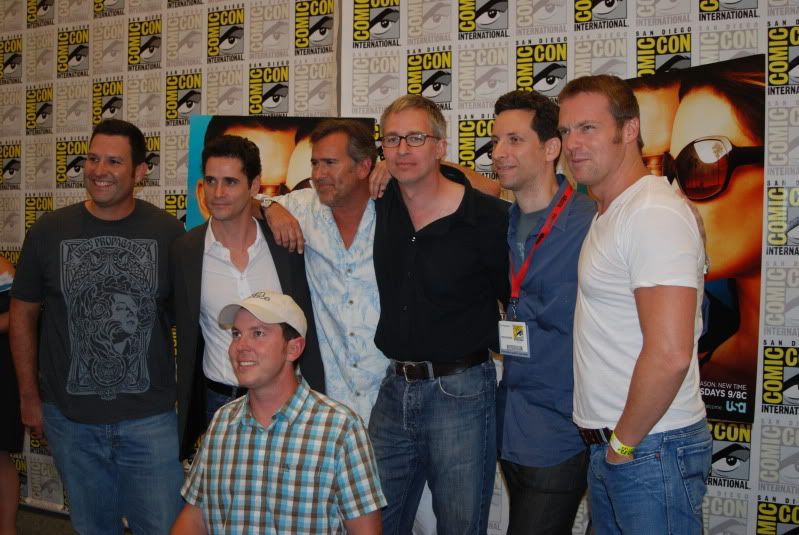
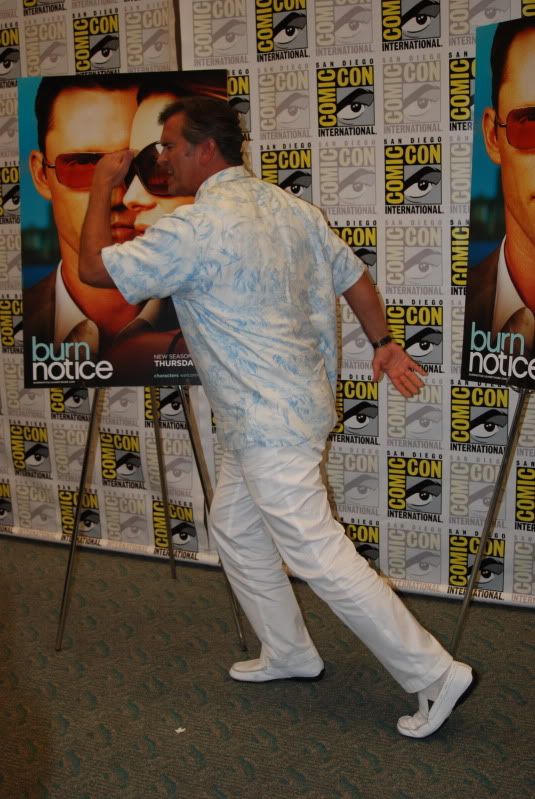
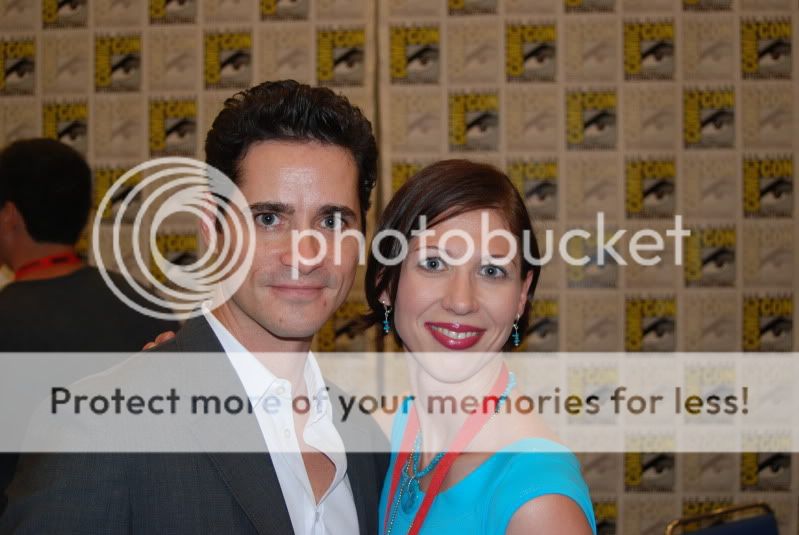
Bruce Campbell (Sam Axe)
ScriptPhD: You look, if I can say, like you just walked straight out of Miami!
Bruce Campbell: I did! I’m going back on the set tomorrow.
ScriptPhD: With the white outfit—
BC: This is from the wardrobe department.
ScriptPhD: Are you serious?
BC: Oh yeah! I said, “I’m going to Comic-Con! Hook me up! Give me the Miami whites!”
Futon Critic: So do you inform the shirts or do the shirts inform you?
BC: Well you have to wear the shirts, how it should be worn! I don’t know, I can’t answer that. I have no idea. I don’t even ask them what shirt I’m getting. They just come out. It’s an endless supply. I think we’ve done about 150 different shirts. Tommy Bahama. Haven’t had too many hats. I don’t know why.
ScriptPhD: So you’re already shooting for the third season. What can you tell us about some fun stuff to expect?
BC: Well, in the second season, Michael Weston had to answer to this evil woman named Carla. She’s gone. She’s dead. And so, the protections that she provided him are gone. In the big spy universe. So this season, he’s back on people’s radar, back on foreign agencies, even the local police, in Miami. So, he now has to deal with people from all over—old adversaries, new adversaries, anyone can get a piece of him now. It’s a bad place to be in.
ScriptPhD: And the shippers want to know if Fiona and Michael are gonna work their stuff out.
BC: they’re always back and forth, hit or miss, it’s the tortured relationship. It builds, it crumbles, it builds, it crumbles. I think you need that. It’s a bit of the Moonlighting thing.
Press question: well I love the vicious thing between you and Fiona, when you guys are in the car and just snipping at each other.
BC: That’s what we do! Because I think she’s crazy and she thinks I’m a loser. So the feeling is mutual.
Press question: How do you guys think of each other in real life, though?
BC: Good! She’s so different. She’s so not Fiona. She’s this very dignified Englishwoman, who’s very classy and cool and she plays this psycho bitch. Which is good. It’s good to have that.
Press question: What about Sam’s love life?
BC: I think it’s around. You never see much of the ladies, though. You see a couple of them. He just talks about them. Maybe it’s all just talk. He’s full of crap. I’d like to see that explored only because it’s fun to do as an actor. Wooing a woman at a café, or whatever. Watching your love go down in flames, or I don’t know. We’ll see what the writers come up with. I don’t bug them too much!
Press question: There’s been some great moments. What’s been a highlight for you from this past season?
BC: Well they always have us playing these dumb alternate characters. Like, my guy is Chuck Finley. He always plays this guy named Chuck Finley when he’s on a mission. That’s how he always lies to everybody. Chuck Finley. So that’s always fun because they have him doing weird things. A couple of episodes ago, he was a motivational speaker. So that all is way out of the box for us, so it gets us very excited.
Press question: What about the interrogations?
BC: Sam’s specialty. It’s becoming his specialty, tormenting his people. Which is fun, too, because you get to figure out how to crack that person. And my brother was actually at Guantanamo Bay as a military police guard. So, I pick his brain, but he doesn’t really tell me anything. He’s like, “I can’t tell you anymore, I’d have to kill ya!” So, those are fun too, because you get to see a whole other side, where you can either be serious or mean or intimidating or crazy. Why don’t we just some stuff in front of a guy and it drips blood in front of the guy, and you try to freak him out. That if I’m willing to do that to myself, what am I willing to do to you?
Press question: Relationship between Sam and Alex? Can you comment?
BC: It’s good, it’s increasing. She considers herself my friend now, and I go over there to hang out and Sam protects her all the time and lies to her a lot. Which is not good but. He’s moving out and moving to a new girlfriend, who’s living behind Madeline’s house. It’s his neighbor’s daughter.
Press question: Talk about the tone of the show a little bit, the humor, the seriousness. Where is that balance?
BC: A director once said to me, “You should be a different character in every scene. Because you want to show all the different sides. A spy when he’s crabby. A spy when he’s tired. A spy when he’s pissed. When he makes a mistake. So all of that just adds up into our mosaic of characters. But, it’s a serious show with trench humor. What soldiers would say to each other when the bombs are coming in. It’s a very dark, gallows humor. We all have to find it all the time. And it’s changing.
Alfredo Barrios, Jr. (producer) and Matt Nix (creator/showrunner)
ScriptPhD: I asked this of the actors, but I also want to ask you. Where and how do you compile the really cool gadgets and scientific material? Who do you go to for your ideas and how do you incorporate that into your scripts?
Alfredo Barrios, Jr: I think like Matt said, we have a number of different sources, we have a consultant on the show named Michael Wilson who is a former intelligene operative, who has been instrumental in helping us figure out the technical side of things, the gadgetry, the ideas. Oftentimes, we’ll come up with the goal that needs to be solved, or this is generally the principle that I think could be employed, but how do we make it work? How specifically, what will be build, where will we get it? Oftentimes, I joked during the panel that we’ll find a lot of stuff on the internet. And ultimately you have to verify it, but you have to take great pride in being accurate with our science and in not giving everything away, because we build some pretty dangerous devices along the way. But we really do our research, and we take great pride in that and we’re both kind of geeks, and we take great pride in being right about stuff.
Matt Nix: Growing up, I always thought that I was going to be a scientist when I was little. I was a computer enthusiast when I was a kid, and a programmer and I’ve always been really interested in that stuff. And so if I go to a party, I want to talk to the engineer, I want to the scientist. It’s been a good thing for the show that I live near the Jet Propulsion Laboratory and that my kids go to school with kids whose parents work as rocket scientists. So literally I’ll go to parties and be like, “Let’s have a beer. Tell me how drones work.” We also bring in people who work in various technical fields, and we’ll sit them down and buy them lunch and say, “Tell me everything there is to know about optics.”
AB: I think naturally, the whole writing staff, we like to read about all sorts of things, and oftentimes ideas come from where you don’t expect it. You read a story that has some science in it, and you’ll derive some interesting fact, which might build an idea for putting together a gadget or something like that. And we get excited about that and we bring it to the room and it’s kind of fun.
Press question: And yet, I love the gadgets, and I think that’s fun, but the characters are what’s so rich, all across the board. From the villains to the heroes and in-between. Every little character. Can you talk about that?
MN: The funny thing is that a lot of people, when talking about writing in Hollywood, will say talk about character and plot as if they’re two different things. And character is this really good thing over hear, and it’s what makes a show good, like character, some ingredient that you put into shows. And plot is just this afterthough, this mechanism that people will use. And we’re a very plotty show. We do a lot of stuff in 42 minutes. But I think tha tone of the things that makes the characters rich is that they have to do a lot of stuff. And creating a bad guy who’s a worthy adversary to Michael who can have the plan that Michael has to go to the ends of the earth to unravel, that bad guy is just going to get more and more interesting as you get through the script. Because how would he know how to get him to do that? Well, maybe he was a doctor, and we need to get from here to there. That’s going to demand a really dynamic scene between these two characters because this character has to get so mad that he’s willing to blow up that hotel. So, what’s that scene look like that would get you to blow up a hotel? Then we have to stop you, and so what’s exciting for us is making the characters. In the case of the ex-girlfriend of Michael’s, her son has been kidnapped, and she’s in this really extreme situation where she needs to trick michael into helping her. And if you start with “Woman needs to trick Michael into helping her”, that makes for an interesting character. Well how would she do that? Maybe she’d make him think that her son is his son. OK, that’s an interesting character. And that’s how it grows out a plot but it turns into character. And then, at the same time, who’s the bad guy that can trick this woman into doing this thing, well that’s a really formidable bad guy. And that’s how Brennan is formed. He’s a bad ass! And then it just goes from there.
AB: Yeah, and oftentimes, just trying to come up with as part of what Michael is doing in combatting these villains, is, he ultimately exploits a character flaw. Something that is borne of character, and seizes on it, and exploits it, and turns it on them. And that is always fun for writers to figure out. It is both the source of their power and the source of their demise. And it’s fun to see, what is that trait that is unique to each villain that Michael can kind of seize on. It’s a problem at the beginning, but then it becomes something that he can use to do that. And that’s character.
Press question: Did you purposely structure each season to have its own story and purpose or how did you plan that out?
MN: You know, honestly, I can be coy about it, but I’m a huge fan of The Shield and so is Alfredo, and he was the first writer I hired for the show and we kind of talked about it. And that show had a great structure of this overarching theme of is Vic Mackey going to get busted for being a bad cop, and then it had these seasonal villains of the season, a seasonal problem to deal with. And our structure, because we’re broken down into two seasons and it’s a different show, it turned out to be very different, because we had to do a lot of things that—we do things they couldn’t have done because of our structure, they did things we can’t do because of their structure. But, it was inspired by The Shield.
Press question: can you talk about how the break of the season structure works into the storylines that you want to tell?
MN: It helps in that it forces you to digest the material. It doesn’t feel like help at the time, but it feels like, “We just did a finale! God!” But yeah, think about it. If someone came to you and said, “All right, you’re going to do a nine episode season and a seven episode season. And a nine episode season and a seven episode season. And so on.” How? Why? But that’s what we do and we don’t want it to be like “Here’s a season of Burn Notice and we just took a really long break in the middle.” It’s got to feel like something resolved between seasons. It makes the writing harder and better.
AB: Unlike a 22 episode order, where you run 22 episodes from beginning to end continuously, splitting up the season makes for a more dynamic show. You have to come up with a mid-season twist that makes sense and sets up everything you’ve come up with in the previous episodes, and yet launches you to the next season.
Mad Science: The Science Behind Science Fiction
Moderator: Phil Plait (astronomer, Discover Magazine contributing editor and blogger)
Panelists: Jaime Paglia (co-creator/executive producer, Eureka), Kevin Grazier (science consultant, Eureka, Virtuality), Jane Espenson (executive producer, Dollhouse, BSG, Buffy the Vampire Slayer), Rob Chiappetta and Glenn Whitman (staff writers, Fringe) and Ricardo Gil da Costa (neuroscientist and consultant on Fringe)
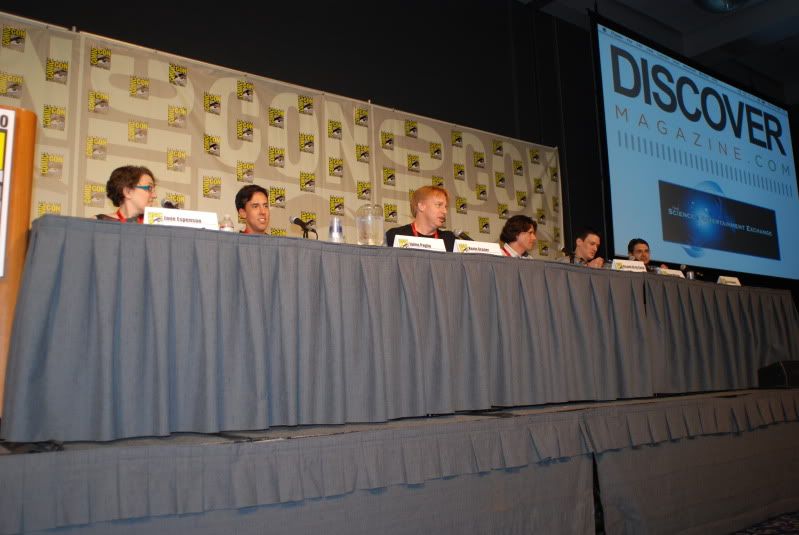
We ended our Day 1 coverage with a panel that embodies the epitome of what ScriptPhD.com stands for: the intersection of science and entertainment. Discovery Magazine, in concert with the Science and Entertainment Exhange, put together a panel of leading science fiction writers and the science advisors that make their shows happen. What ensued was a riveting discussion about the role of entertainment to educate, philosophy and moral extrapollations of topics covered by these shows.
Brief clip of Eureka
Jaime Paglia: Thanks fans for supporting our show, this past season we’re seeing the highest numbers we’ve ever had, thanks for coming.
Kevin Grazier: I had so much fun at the panel last year, I’ve been looking forward to it all year!
Clip of Fringe
Glenn Whitman: Farnsworth, our character, incidentally, was named after Philo T. Farnsworth, inventor of the television, not Futurama!
Rob Chiapetta: I love Comic-Con, because you can drink at 3 PM, and you’re not hallucinating if you see furry creatures walking all around you!
Glenn Whitman: This is the first time I’m on a panel rather than out in the audience so this is really special.
Ricardo Gil da Costa: I want to assure everyone that the neurobiology happening at the Salk Institute is actually a lot more tame than what you see on Fringe!
Clip of Caprica
Jane Espensen: I wish we had something new to show you, but only in the 2nd week of shooting post-pilot material. But we’re wrriting and shooting as much as we can. Hot robot action coming soon!
Phil Plait: Let’s talk about the good and evil of science and how it’s used on television, particularly on Caprica. This idea has been around for a long time. If you could create a duplicate of someone, how would it work? And is it right?
Jane Espensen: We actually had this discussion in writers’ room. How similar it is to downloading, what the Cylons eventually did fifty years in the future. Versus this version where two of you live simultaneously. And we had a big argument about is this afterlife or on the road to afterlife, and how do you squeeze the maximum drama out of that. What I love is that you’re having very ethical and philosophical discussions in sci-fi environment.
Jaime Paglia: In Season 2 of Eureka, Wlater Perkins loses wife, Susan, they buried her and she shows up again in the future. But he is living with a clone of his ex-wife, and had a child with her. Susan discovers this child is genetically hers but has no connection with. Does she have an obligation to this child?
Kevin Grazier: Legally this poses interesting questions too because she couldn’t prove it wasn’t her child in a court of law if she were to reject it.
Glenn Whitman: We’ll do that on Fringe! Season 5! [laughter]
Phil Plait: Transporters—if they destroy you and reinstate you, if you could do that, be dead and brought back to life? Then what happens?
Glenn Whitman: We need to have a Law & Order: Fringe, to debate the ethical issues. I came across this web site that’s actually some company like reincarnation.com, and you go there and put assets in escro for a future life for an inheritance. But what kind of proof would they accept when you came back to cash your money?
Phil Plait: In the Fringe clip, they scientists are trying to extract info from a guy who was dead, and it seems a bit like torture. Sci-fi is a reflection of our current standing in our moral decisions. We don’t torture because we don’t get correct info when we do. But imagine if you could torture AND get accurate info? Where does that leave us?
Jane Espensen: we’re thinking about a torture ep for Caprica, and we keep pulling ourselves back, but ethically, we don’t want to promote that. This is one of those places where drama and the real world, you sometimes have to work to make them work together.
Ricardo Gil da Costa: How we extract info from the brain if they’re not willing or dead is actually an interesting question. But there’s a lot of fMRI and brain imaging techniques that are already out there, and we assume that we can outsmart a polygraph. You can really get this information right now. Sometimes you use it in courts. But it’s very tricky to interpret because we don’t understand the brain fully yet. The brain doesn’t lie, but what we get is our biased interpretation. You cannot always directly transpose laboratory advances socially and legislatively.
Phil Plait: In the show, the guy was dead, but do you have the right to your thoughts after you’re dead? What if you could download their thoughts and put instructions?
Jane Espensen: Well you put them into a robot and get it to do what you want. [laughter]
Kevin Grazier: In Caprica, Zoe made the claim that you can download the personality information that you need to rebuild a person from online, so you don’t have to necessarily violate them directly. But is that still a violation?
Jane Espensen: It’s a dicey area. I think we should all worry about being downloaded and put into robots.
Kevin Grazier: Think about all the things that are “out there”, though, and freely available that reflects on your personality and who you are. It’s kind of scary!
Phil Plait: I’ve never been involved in the writing of a TV show. I advised for a children’s show called Zula Patrol, but didn’t develop the storylines. When you’re in the writers’ room, do you find what’s morally ambiguous, and then apply the science? Do you do plot and then science or vice versa?
Jaime Paglia: On Eureka, we look at everything: newspapers, magazines, news, and then come up with our own ideas that are little homages to books and movies. We basically try to find a unique way to approach it. Eureka is a ¼ turn different that makes it fun to explore. Everything depends on how we approach it. We want a story arc for our characters and want them to develop, and then ask what can we marry thematically to advance those developments? Then we pop in a science fiction idea into it.
Kevin Grazier: My interaction is, it depends. Different writers will come to you beforehand, but most people will come to you after the script is written. Remember when we toyed with Attack of the Killer Tomatoes on Season 1 of Eureka?
Glenn Whitman: We’ll do it on Fringe! Season 5! Sometimes we start with the science—recently we wrote about a transgenic animal made into an eight-part beast, and that came from reading articles about real transgenic hybridized and engineered animals. Some episodes definitely come from those science headlines. Sometimes someone will have a crazy idea for an episode, and you better figure out a way to make it work and justify it. Why would someone’s head explode? Because J.J. Abrams thought it was cool, now justify it scientifically!
Kevin Grazier: And usually the response on our end is Oh Cool! or Oh my God! A great example is the Eureka season finale coming up. We worked on that for a long time to justify the science.
Jaime Paglia: I knew what we wanted to happen storywise, because it’s pretty big [story development], but it was one of those moments where Kevin was able to help us out, and it turns out that this theoretical thing was already out there that couldn’t have been more perfect for this episode.
Rob Chiappetta: That’s a double edged sword, because if it already exists, then the producers want you to “think harder on it” and make it work, because they want it to seem made up and implausible. They don’t want to believe that it’s real or that you came up with it too easily.
Glenn Whitman: Sometimes it’s disappointing to hear that it exists, because you want to push the limits of what is out there as a writer.
Ricardo Gil de Costa: I think there is still some cool stuff that is exciting, realistic and not out there. Just recently we were talking for an episode, and using an already-researched application of TMS (transcranial magnetic stimulation) to inhibit brain areas. So I think we can still do this feedback both ways.
Rob Chiappetta: From an audience perspective, you want to start with something that’s more grounded, “Oh yeah, I think I’ve heard of that” and then take them on the ride. Start with familiarity, easy to understand concepts, because then you get the opportunity to push people’s buttons.
Jaime Paglia: In our show, the manifesto is that we don’t want to cross over into magic, things that are not yet scientifically possible at all. But do you guys on Fringe have hard and fast rules?
Rob Chiappetta: We want to be “science next”, 10-15 minutes into the future as opposed to a year in the future. Visual [appeal] drives our show a lot. We get frustrated because we can do everything you want in terms of the really cool science, just give us more time to explain it [than a 42 minute show].
Glenn Whitman: There are plenty of us in the audience who geek out and think this stuff is really cool when we see it and want those in-depth explanations, but too many people in the audience want the story and tune out the science if it starts getting too complicated. So the trick is to feed just enough that people believe what will happen and want to go along for the ride.
Rob Chiappetta: Show your precedent, show what you want to do, and then show all the things that you want to do to get there.
Glenn Whitman: Rob used to be a lawyer, and he just have a lawyer’s outline for writing. I used to be an economist, so I should come up with a similar manifesto.
Phil Plait: I wondered when you’d have an astronomer on the show, and when you did, he bludgeoned his wife with a tire iron. Is this someone I need to know about?
Glenn Whitman: Fringe is a horror show, partly. Creepy and gross is easier with biology and virology, than astrophysics, usually.
Kevin Grazier: You haven’t hung out with many astrophysicists. [laughter]
Phil Plait: In 1998, Armageddon came out, and the only thing scientifically accurate about that movie is that it had an asteroid and yes, asteroids do exist. But Deep Impact also came out, and that movie was fairly accurate about predicting the future. What scientific breakthroughs will you put in there that you’d like to see or wouldn’t like to see happen?
Kevin Grazier: I can justify the glowing spines from BSG. I’m not going to, but….
Jane Espensen: We’re doing something on Caprica where we’re saying technology is accelerating so fast that it’s not reaching everyone quickly enough. Rich people have robotic butlers, but poor people have answering machines. Instead of reaching for big concepts, we are approaching little bitty things in the high-tech house that would be really cool to have. The little things are as cool as the big things.
Jaime Paglia: We play with that with the character of Sarah, who has had her good and bad moments. We also had people monitoring what technology gets out in the world. Those are the kinds of things that are fun to explore, not as dark as Caprica and Fringe, but good drama nonetheless!
Fan question: Do you ever consult visionaries, because sometimes science catches up to the visionaries. Do you ever look beyond the science to the spiritual to get ideas?
Jane Espensen: We certainly do ask what our wildest dreams would suggest. That is related to that, since their dreams come close to ours. But that’s as close as we go to consulting visionaries.
Glenn Whitman: We thought we were the visionaries!
Fan: We sane fans generally don’t think about trying the science at home. Do you ever worry about disclaimers for those that would?
Ricardo Gil da Costa: It goes both ways. You could have great synergy between these two fields, people like Michael Crichton who certainly do go both ways.
Jaime Paglia: With our shows, we pick normal scenarios that you’d see aywhere, but when you add the geniuses and the technology, that’s what makes it special. You could say, “Don’t create a second sun at home!” but most of those projects that we approach couldn’t create danger or couldn’t even be attempted.
Rob Chiappetta : The general rule of thumb is that if you see Walter do something on Fringe, don’t do it at home!
Fan: What is the correlation between science fiction and science fact: who drives whom?
Kevin Grazier: Yes. [laughter]
Jaime Paglia: Well it depends on the idea… you could read about something in Discover Magazine and say, that would be a great episode.
JE: Also design elements from science.
Kevin Grazier: I work at JPL, and I see two influences: you’d be surprised how many action figures abound in people’s offices. So many scientists go into science because they want to be Captain Spock. But then we get the picketers who are all the conspiracy theorists carrying the placards saying “Tell us the truth!” and it’s like, “We are!”
Fan question: Portrayal of evil robots versus good robots? Why the disproportion?
Jane Espensen: Stories sometimes trump idealism. Killer robots are just a lot more fun to watch. Serge, the butler robot is actually adorable, though on Caprica!
Fan: What does your role as a science advisor entail? How much time does it entail on top of your full-time jobs?
Ricardo Gil da Costa: Very dependant on the project and the show. Sometimes not that much time at all, other times you’re involved from the get-go. I really like my day job, but it’s a great compliment to it to be able to help the writers on Fringe.
Kevin Grazier: I’ve ranged from writing two sentences for an episode, versus spending a lot of time on Eureka developing ideas. But on a show like Virtuality, I did more on that 2 hour episode than for the entire half a season of BSG.
Fan: Are you going to talk about the solar system of BSG?
JE: That will definitely be addressed in Caprica, but Kevin came up with a beautiful system for how these 12 colonies can be so closely put together.
Fan question: Pertinent to BSG and the episode of DS9 that Jane wrote. You try to ground these stories in science and make it believable, but also weave in mystical elements. How do you reconcile those two?
JE: I was talking with my writing staff about this just the other day. I like the mystical stuff being downplayed where the magic is technology. For example, I would say Head Six and Baltar aren’t angels but so advanced that that’s the only explanation we can come up for them. We are so limited that we grasp for magic when it’s physics we don’t understand yet.
Fan: As an educator, I can definitively say we have a problem with communication. We are not taking the mystery out when we explain it. You’re in an important position to be educators working through entertainment. To say “Isn’t this stuff cool” through entertaining stories.
Kevi Grazier: I’m an educator as well. Lots of students are turned off of science because it’s too nebulous for them to understand. But other kids will listen to you because you work in the entertainment industry, because it’s a tool that allows me to talk and have them listen to what I say for an hour so that at the end, they can ask that burning question: “Do you know Tricia Helfer?”
Jaime Paglia: The closer that you look, the more magical the science is. That’s how I think of it. Heck, I want to know how my iPhone works because it’s magic to me!
Rob Chiappetta: Science and technology is such a forefront in our pop culture, that you have people now like Steve Jobs and Bill Gates as people who are making a difference and people want to hear from them and what they have to say. So that’s why on our show we have scientists and engineers who are portrayed as trying to figure out how stuff works. And more importantly, they’re normal, real people. All we have to do [to promote science and scientists] is show people living lives as scientists and they’re real people too: husbands, fathers, in relationships. That they do their jobs but then go home at night and live real lives. That’s the one thing that we can really bring to scientific education. I can be an inventor and a hero and be a helpful part of society. That’s an important message for us to be bringing across every medium: video games, movies. That today’s heroes aren’t ballplayers or movie stars, but techies and engineers.
Phil Plait: And on that note, let’s end with a pertinent quote to our discussion: “It does no harm to a sunset to know a little bit about it. –Carl Sagan”
ScriptPhD.com caught up to Jane Espensen, showrunner of Caprica, writer on BSG, Buffy the Vampire Slayer and Star Trek: Deep Space Nine, to get exclusive scoop for the upcoming season of Caprica:
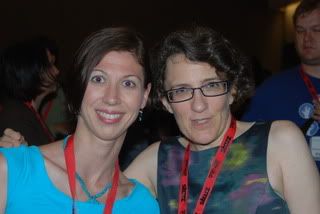
ScriptPhD: Are you guys going to go into the religious monotheism and where that stems from for the original three students in the pilot (including Zoe the avatar)?
JE: Yes, we absolutely will! But there is a lot of that explored with their mentor and school headmistress, who really got them involved with the one god philosophy. But we definitely touch on the idea of where that stemmed from and what are really the roots of the Cylon monotheism culture. Where did that really stem from?
We also caught up with Glenn Whitman, staff writer on Fringe and chatted about some exclusive scoop. He was nice enough to oblige!
What exclusive Fringe scoop can you give to ScriptPhD.com that isn’t out there but that won’t get you into trouble with your bosses?
GW: [laughs] Oh I have to think about that one! OK, well, next season, I can definitely tell you that we are going to be exploring the relationship between Peter and Walter, the father-son relationship and going much more into what drives those two. We love their relationship and dynamic and can’t wait to explore that!
That’s it from Day 1, folks! Same bat time, same bat channel tomorrow. But before I leave…. I believe I promised you guys a Comic-Con Costume of the Day:
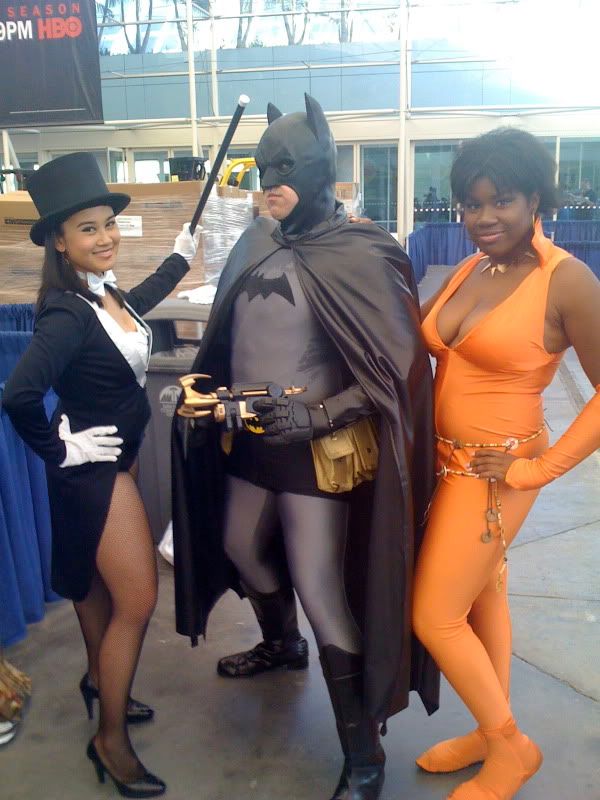
It was a tough choice out of the many…er…unusual outfits we snapped photos of today, but remember, you can find all of our pictures as supplementary coverage on our Facebook page.
~*ScriptPhD*~
]]>
